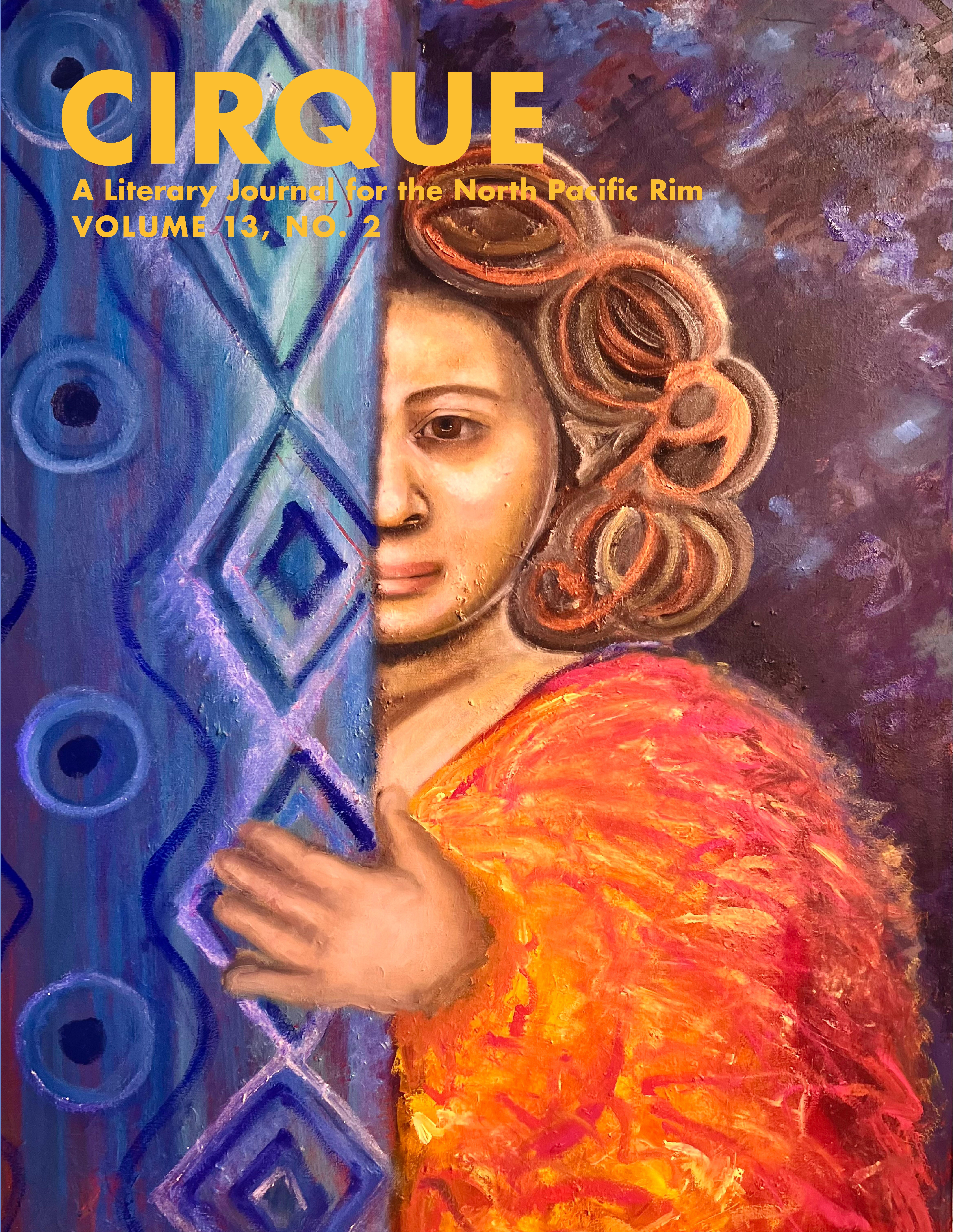
CIRQUE
A Literary Journal for the North Pacific Rim
Volume 13, No. 2
Anchorage, Alaska
© 2023 by Sandra Kleven & Mike Burwell, Editors
Cover Art: Elizabeth Belanger, "Sarah" Table of Contents Photo Credit: John Coyne, "Yukon" Design and composition: Signe Nichols
ISBN: 9798862101331
Independently Published Published by Anchorage, Alaska www.cirquejournal.com
All future rights to material published in Cirque are retained by the individual authors and artists. cirquejournal@gmail.com
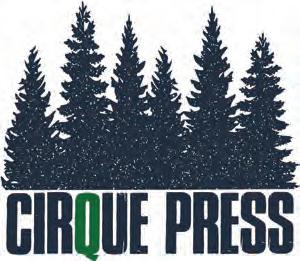
Yosemite Dawning
Poems of The sierra Nevada
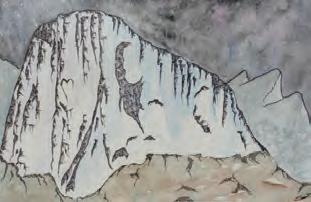
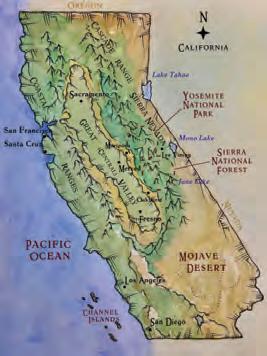
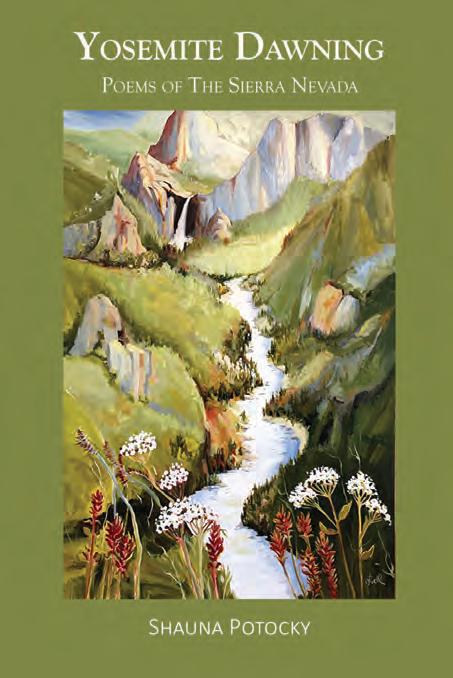 By shauNa PoTocky
By shauNa PoTocky

Shauna Potocky’s debut book of poetry takes us from the edge of the Central Valley, California with its wildlife refuges and agricultural fields, through foothills and into the realm of summits within the Sierra Nevada, including colorful and scent-filled meanderings on the Eastside of this spectacular range. It is a journey of landscapes and time—cultural connections, histories, climbing and contemporary questions. The poet connects us to the unseen, to the tangible, to textures and tales, from the dusty past to today, and thoughtfully asks us how we will forge the future.
Shauna Potocky’s book calls us to join her travels through public lands that await us, know us and are part of us—trails, crevices, rivers, animals and mountain peaks. The fauna and the flora in each poem are a discovery, a relationship, a new life and an enlightenment. You will breathe deeply as you trek through her poems and drawings. You will become part of the earth’s true life, you will want to leave behind the manufactured freeze-dried urban-scapes. You will be at peace. Every poem is a new height, an unexpected vista, proof of her deep knowledge and love for the environment and its wiggly lives and grand miracles. The poems and drawings, the trails and compassion all lead us to a magnificent dawn indeed. This is a most necessary collection and a sure prize-winner.
—Juan
Felipe Herrera, Poet Laureate of the United States, Emeritus
Shauna Potocky has a deep love of high peaks, jagged ridgelines and ice. Her poetry reflects a remarkable connection to the natural world and her writings have appeared in a variety of publications and journals both at home and internationally. Her forthcoming book of poetry Sea Smoke, Spindrift and Other Spells is scheduled to be published by Cirque Press. Shauna Potocky is a poet and painter who lives in Seward, Alaska located within the traditional homelands of the Sugpiaq people.
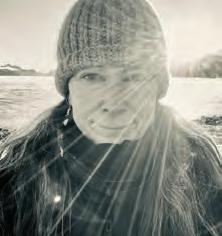
Yosemite Dawning is an epic love poem for Yosemite National Park. These are not sentimental lines but rather a caretaker’s loving astonishment of Nature with one eye towards environmental despair and the other towards hope. The poet finds a legacy among the park’s jagged peaks: “Every route, they say, is a signature line.”
—Tawhida Tanya Evanson, author of Book of Wings
Map and Interior Images by
by Penny Otwell
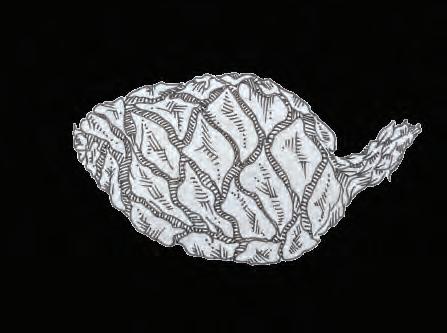
Published By:
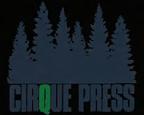
January 2023
$18 on Amazon
In the Winter of the Orange Snow

In the Winter of the Orange Snow captures a era of freewheeling adventure in southwest curiosity and courage, and the phrase “only in Bethel” was coined in response to events
Diane Carpenter captures the spirit, the oddities, the bizarreness of characters and happenings, as well the unique and beautiful environment and indigenous people of the Kuskokwim. She does so with humor, sensitivity, and clear recollections. It’s a tough land. One cannot help but greatly admire this woman. No tourists here in Bethel, Alaska, where primitive ways became modern times in the span of a lifetime.
Sky
Changes on the Kuskokwim
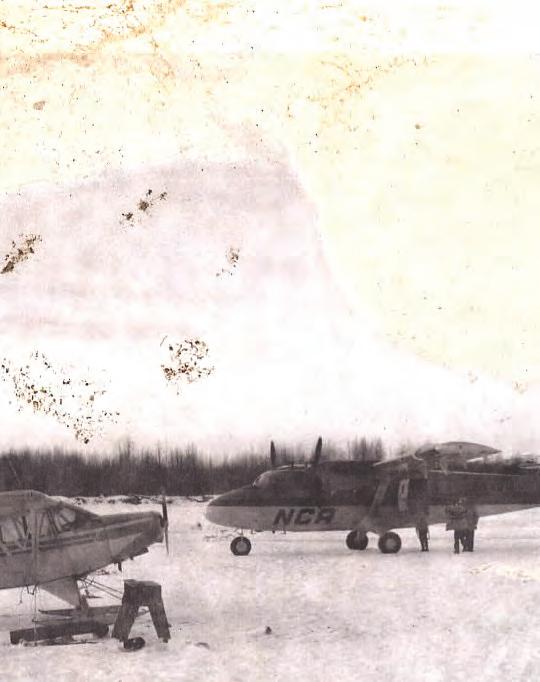
Diane Carpenter’s book is a delightful tramp through the Alaska bush country in the 1950s and sixties through the eyes of a great storyteller. The tales are sobering, hilarious and very informative, each a window into the details of the storyteller’s life and times. For many Alaskans, the book will be nostalgic. For others, it will bridge the gap between those who live on the road system and the bush. For readers in the Lower 48 states, this book will be an astounding ride on boats, airplanes, and dog-sleds through the
James H. Barker, author of Always Getting Ready / Upterrlainarluta: Yup’ik
–
She was a state delegate to the National Women’s Conference in Houston and lead organizer of the Alaska Village Electric Cooperative (AVEC). She taught in public schools and the local college. As she approached retirement, she set up the Pacifica Institute, a non-profit educational organization that developed many innovative programs. In 2007, Diane retired and moved from Bethel to the historic town of Alamos, Sonora, where she renovated a 250-year-old villa. She recently celebrated her 90th birthday there.
$20
Available on
Infinite Meditations

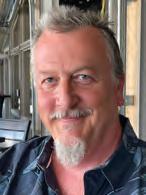

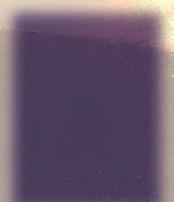
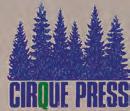
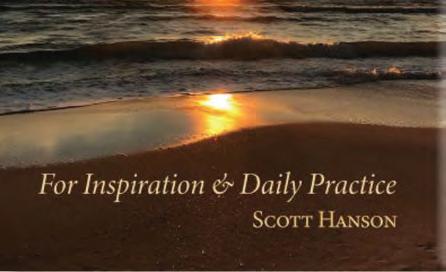






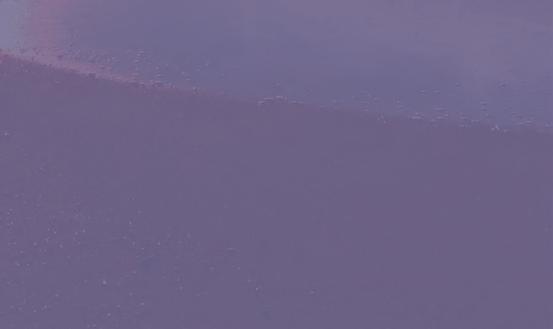







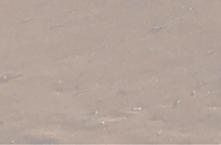





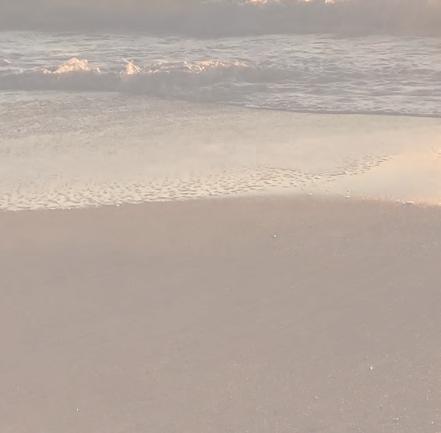


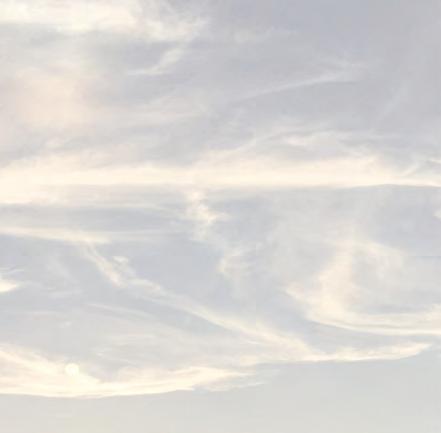
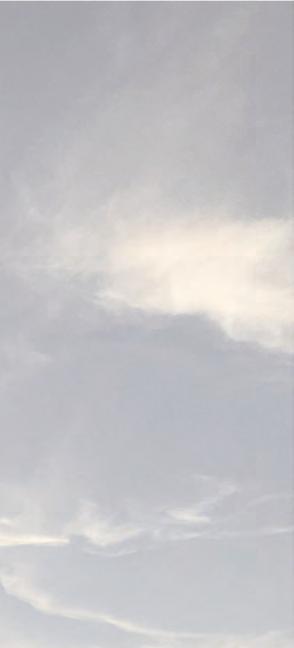
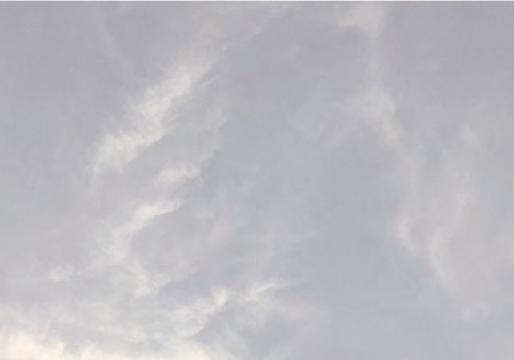





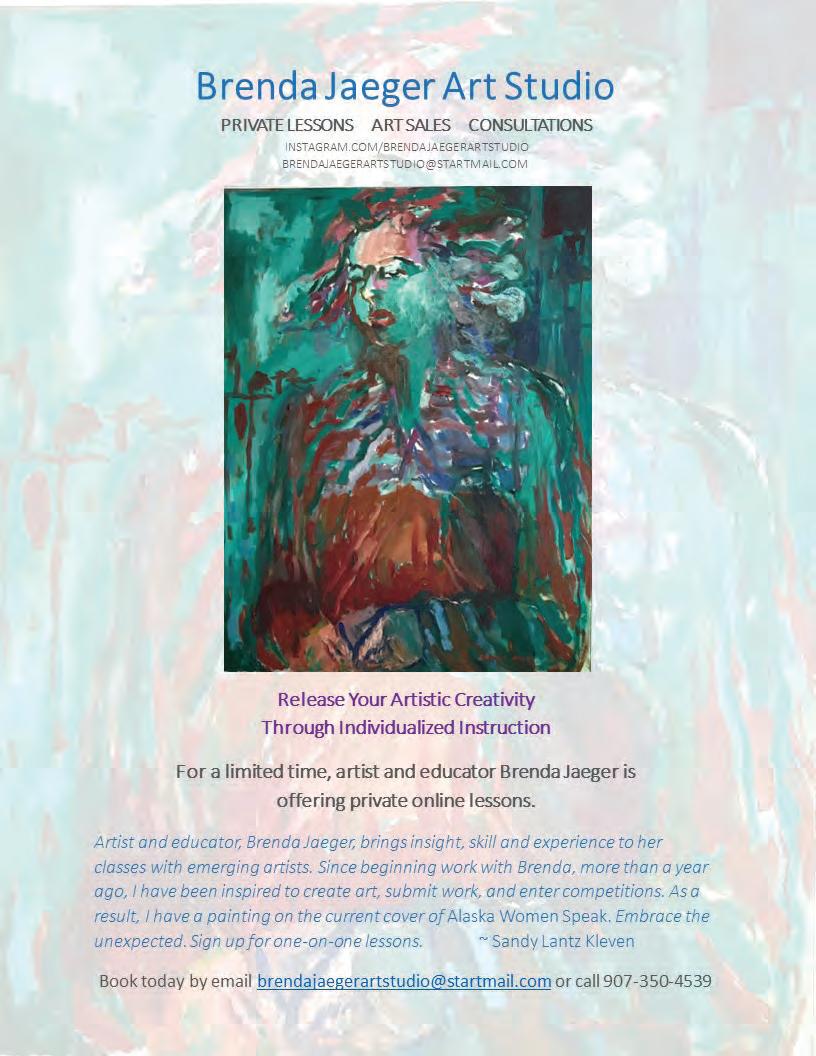 Kleven Michael Burwell Editors & Publishers
Kleven Michael Burwell Editors & Publishers
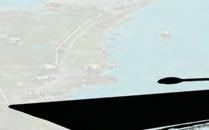
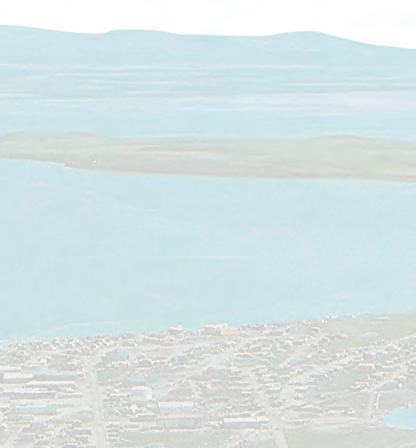
About the Author
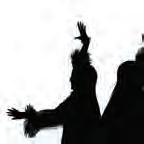

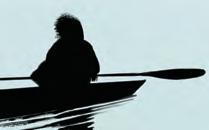
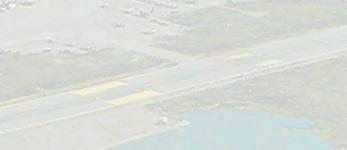
Sue Lium (nee Robinson) was born and raised in Calgary, Alberta, Canada. She moved to Alaska a er graduating nursing school from the Misericordia Hospital in Edmonton, Alberta and worked for the U.S. Public Health Service in hospitals in Kotzebue and Barrow. A er leaving the Arctic, she worked at Cottage Hospital in Santa Barbara, California before marrying and returning to Alaska. She retired a er working thirty years at Bartlett Regional Hospital in Juneau, Alaska. Now widowed, she is the mother of two boys and grandmother to ve grandchildren. She can be reached at suelium@hotmail.com.
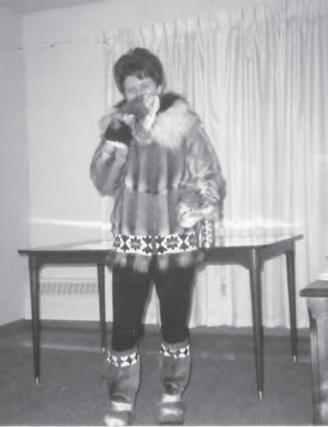
About Mail Order Nurse
is is the lively memoir of a young, city-bred nurse who ew to Kotzebue for her rst job in 1969. It is an engaging read about ingenuity in medical care, the author’s fascination with the land and her crosscultural pleasures and mishaps. e book covers the rst two years of her nursing career, including time in Barrow [Utqiavik]. It bene ts from the author’s photos and from her current perspective as a longtime Alaska nurse. Highly recommended for readers interested in Alaska history, medicine, and memoir.


—Sarah Crawford Isto, MD, author of e Fur Farms of Alaska: Two Centuries of History and a Forgotten Stampede and Good Company: A Mining Family in Fairbanks, Alaska
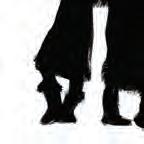

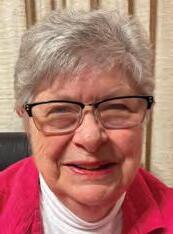

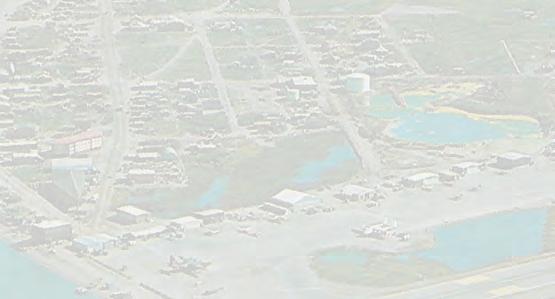

Settle in for a fascinating tour of a culture on the edge of the world, the Inupiat people of Northwest Alaska. Join Sue in fun activities from partaking in a caribou hunt, to racing across the sea ice behind a dog team, to learning cultural di erences like why the Inupiat never say goodbye. Sue also shows us another side of life in this remote region, from struggles with alcohol, to culture shock to murder.

—Stan Jones, author of e Nathan Active Arctic mysteries


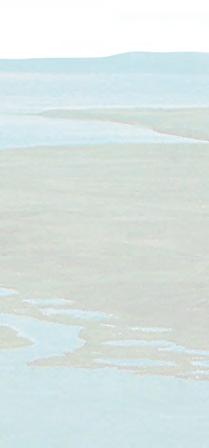 Sandra
Sandra
❅ ❅ ❅ ❅




Getting Home From Here o ers forty-seven stunning, thought-provoking poems covering a woman’s life whose personal history re ects much of the ethnic complexity, familial joys/sorrows, social strains, and natural beauty of the U.S. Anne Ward-Masterson writes of her New Hampshire girlhood, Wading into cool water/ sinking soft sediment of the river bed oozes/sucking at our toes. And of Alaska, her home now, Spring cries storms against/My window all through twilight/Sunrise brings damp calm. She also calls out the racist history of the U.S. which foisted shame and confusion upon her mixed-race childhood, but is now a source of pride. An inspiring and compelling read.
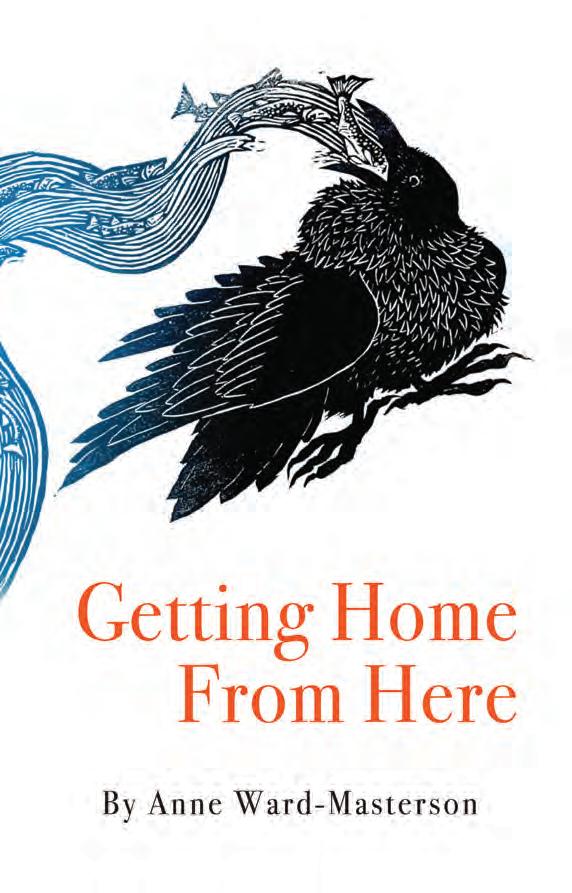
—Kerry Dean Feldman, author of Alice’s Trading Post: A Novel of the West, and poems in e Woman Within: Memory as Muse
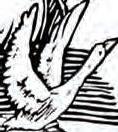


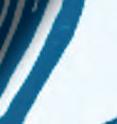
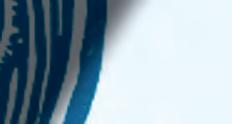
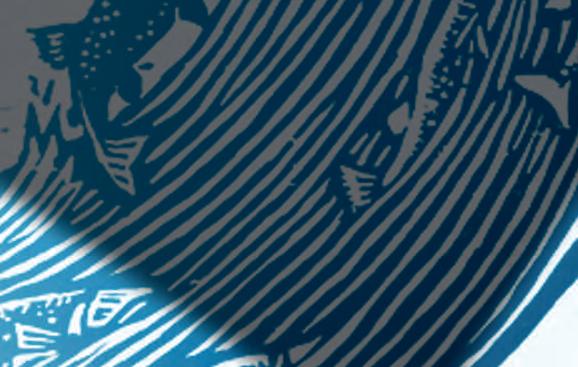



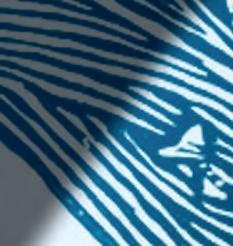


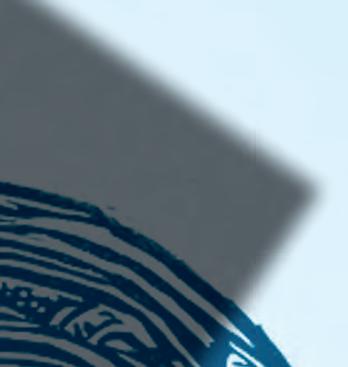
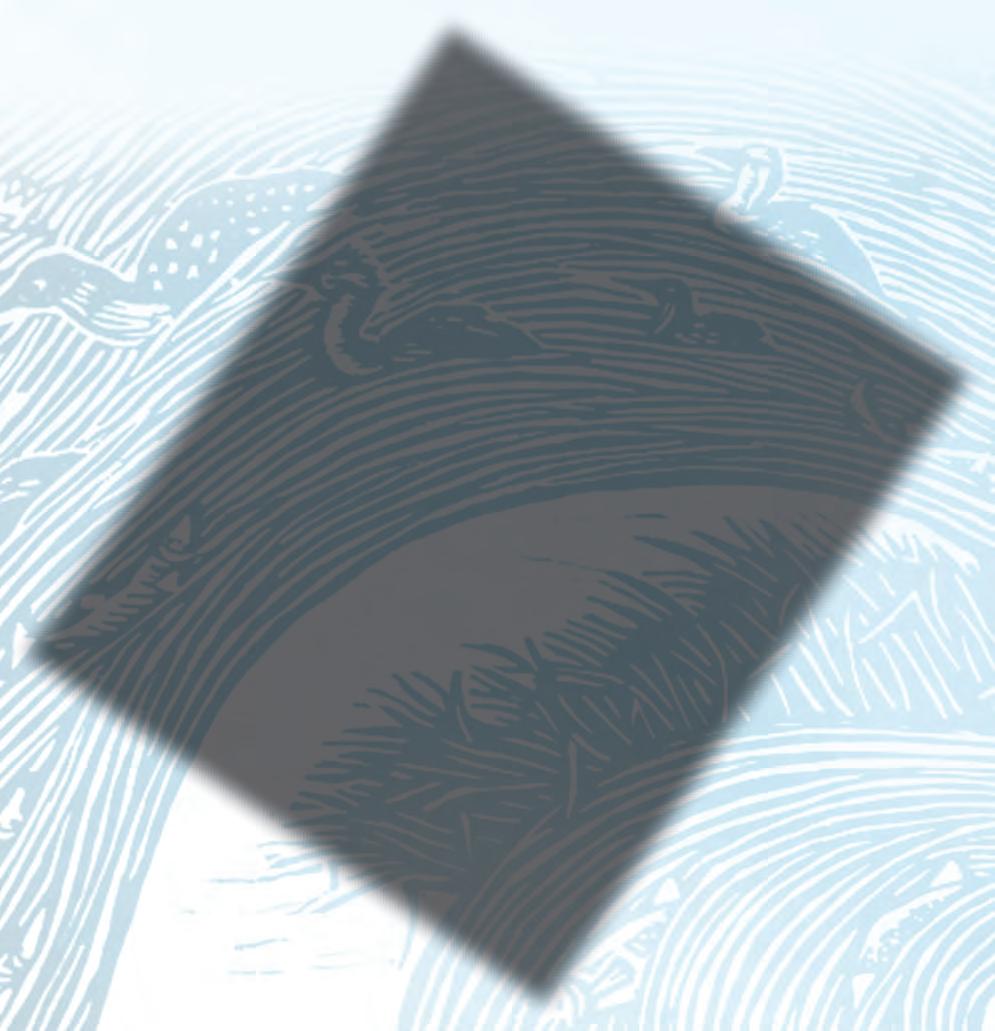




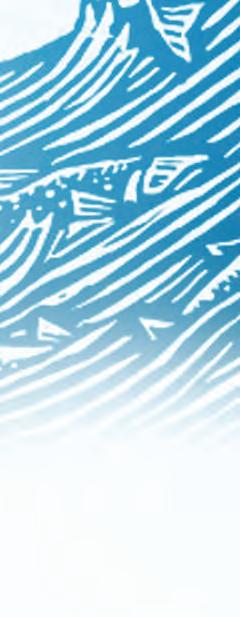








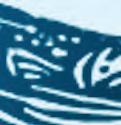
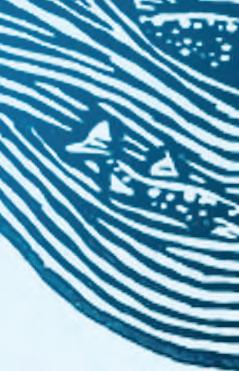
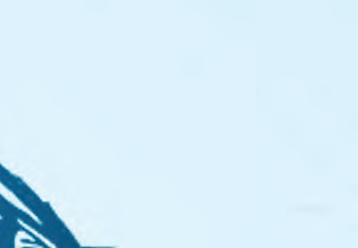
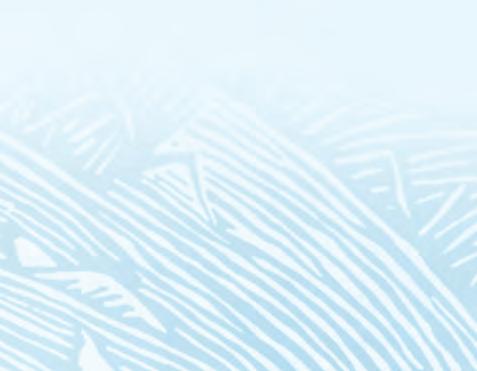


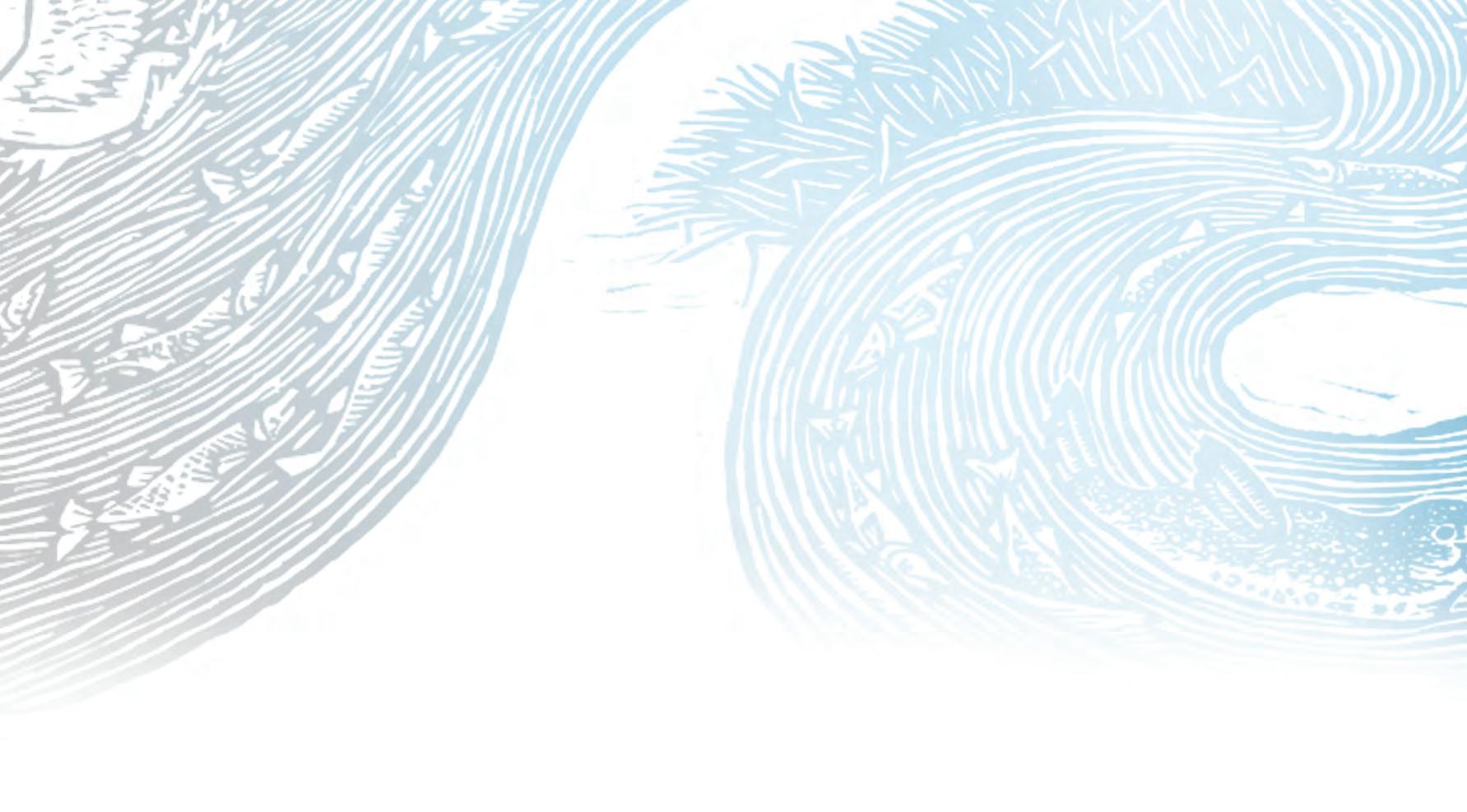
Anne Ward-Masterson grew up in New Hampshire in the tame woods, shing, canoeing and swimming in the Lamprey River and reading books on cold rainy days. Attending Brandeis University and later marrying into the USAF gave her a broader view of people, religions and food. She currently resides in Eagle River, Alaska, where there are no tame rivers or woods.


In Getting Home from Here, especially her poems about race, Ward-Masterson calls out schools, the military, and people who make assumptions about her. She questions how people perceive blackness (“why won’t I tone it down?”). She describes the cab of a pickup truck or a riverbed with equal clarity through sensory language. Her natural, occasional rhyme threads a consistent, melodic quality through several moments of soft, poignant sadness. A rewarding read.
—Cynthia Steele

 Sandra Kleven Michael Burwell Editors & Publishers
Sandra Kleven Michael Burwell Editors & Publishers
BOOKS FROM CIRQUE PRESS
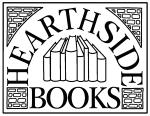

Apportioning the Light by Karen Tschannen (2018)
The Lure of Impermanence by Carey Taylor (2018)
Echolocation by Kristin Berger (2018)
Like Painted Kites & Collected Works by Clifton Bates (2019)
Athabaskan Fractal: Poems of the Far North by Karla Linn Merrifield (2019)
Holy Ghost Town by Tim Sherry (2019)
Drunk on Love: Twelve Stories to Savor Responsibly by Kerry Dean Feldman (2019)
Wide Open Eyes: Surfacing from Vietnam by Paul Kirk Haeder (2020)
Silty Water People by Vivian Faith Prescott (2020)
Life Revised by Leah Stenson (2020)
Oasis Earth: Planet in Peril by Rick Steiner (2020)
The Way to Gaamaak Cove by Doug Pope (2020)
Loggers Don’t Make Love by Dave Rowan (2020)
The Dream That Is Childhood by Sandra Wassilie (2020)
Seward Soundboard by Sean Ulman (2020)
The Fox Boy by Gretchen Brinck (2021)
Lily Is Leaving: Poems by Leslie Ann Fried (2021)
One Headlight by Matt Caprioli (2021)
November Reconsidered by Marc Janssen (2021)
Callie Comes of Age by Dale Champlin (2021)
Someday I’ll Miss This Place Too by Dan Branch (2021)
Out There In The Out There by Jerry McDonnell (2021)
Fish the Dead Water Hard by Eric Heyne (2021)
Salt & Roses by Buffy McKay (2022)
Growing Older In This Place: A Life in Alaska’s Rainforest by Margo Wasserman Waring (2022)
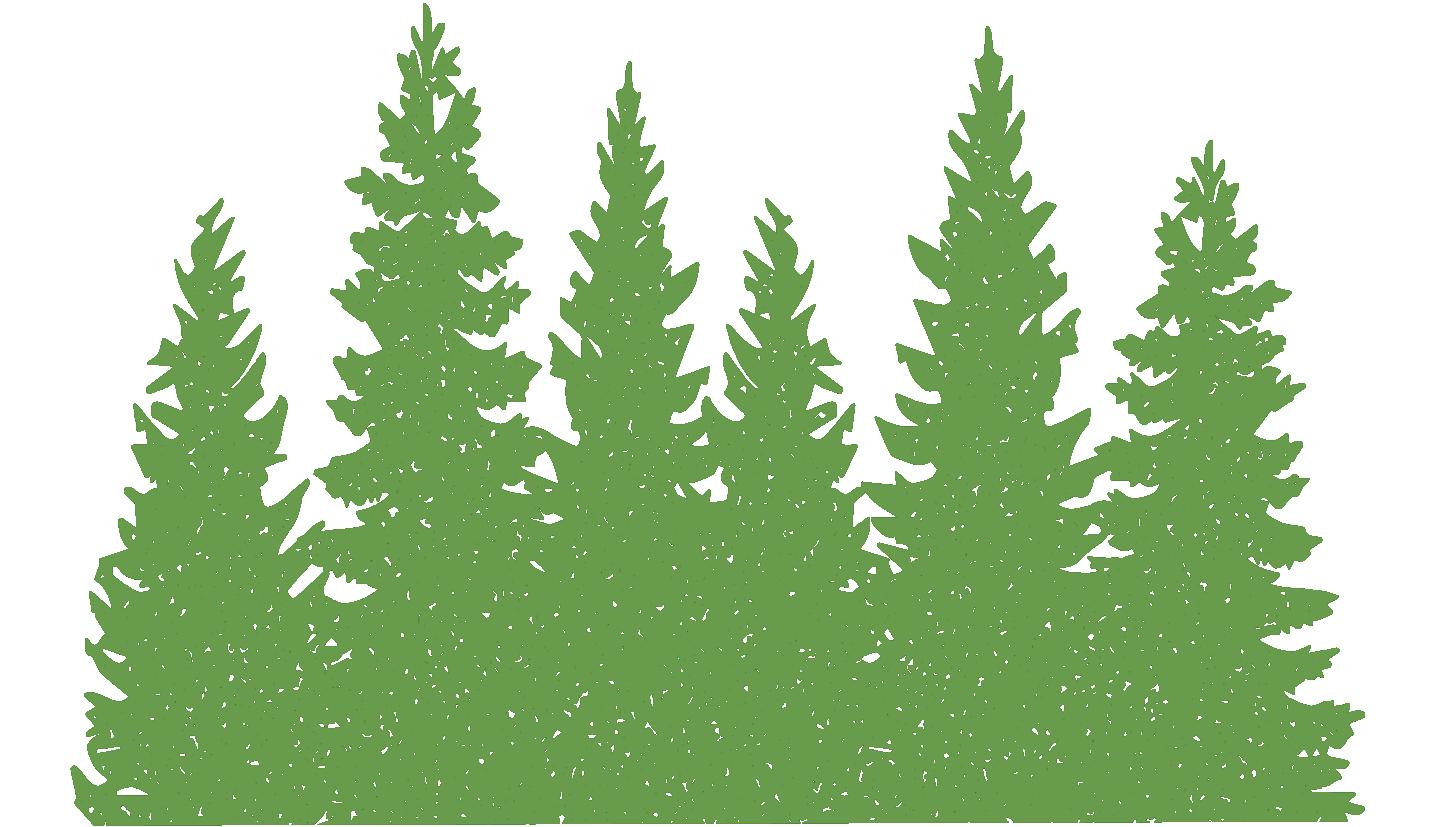
Kettle Dance: A Big Sky Murder by Kerry Dean Feldman (2022)
Nothing Got Broke by Larry F. Slonaker (2022)
On the Beach: Poems 2016 -2021 by Alan Weltzien (2022)
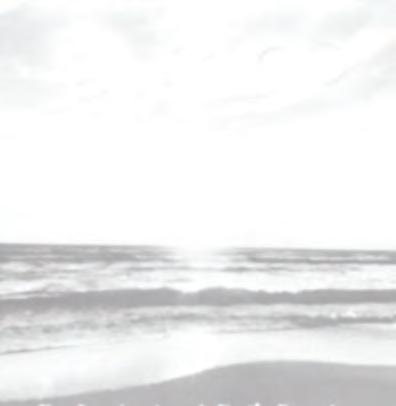
Sky Changes on the Kuskokwim by Clifton Bates (2022)
Transplanted: A Memoir by Birgit Lennertz Sarrimanolis (2022)
Between Promise and Sadness by Joanne Townsend (2022)
Yosemite Dawning by Shauna Potocky (2023)
The Woman Within by Tami Phelps and Kerry Dean Feldman (2023)
In the Winter of the Orange Snow by Diane S. Carpenter (2023)

Mail Order Nurse by Sue Lium (2023)
Infinite Meditations: For Inspiration and Daily Practice by Scott Hanson (2023)
All in Due Time by Kate Troll (2023)
Getting Home from Here by Anne Ward-Masterson (2023)
Crossing the Burnside Bridge by Janice D. Rubin (2023)
May the Owl Call Again: A Return to Poet John Meade Haines, 1924 -2011 by Rachel Epstein (2023)

CIRCLES Illustrated books from Cirque Press
Baby Abe: A Lullaby for Lincoln by Ann Chandonnet (2021)
Miss Tami, Is Today Tomorrow? by Tami Phelps (2021)
Miss Bebe Comes to America by Lynda Humphrey (2022 )
Order via Amazon or your local bookstore. Venders may order from Ingram or via email to cirquejournal@gmail.com


Keeping Up Jim Thiele
From the Editors
Celebrating the Literary Bio: a paragraph you write in 3rd person making yourself look good
We are embarking on the Cirque Press Book Tour of 2023. Five events are set and the first one is tonight in Bellingham. I have been wrangling bios all week, seeking updates from those set to read. It’s a hassle, especially when fresh printed lists are in hand and an email arrives with a missed update. I correct the master and print again, only to get an email from another reader, delighted to join us. Sure, please send your bio.
This effort assures that everyone knows who’s who. There are few places where you get a brief synopsis of those sharing your space. It doesn't happen at the beach. It doesn't happen at lunch (not in a box, not with a fox). You don’t get this info at a reception where you can make the social error of asking what someone does for a living. Or to avoid talking work, you look for something handy to explore, like “Have you seen any good movies lately? Barbie? Oppenheimer?” No winning entry here.
When we conduct book launches, soirees, and poetry readings, the literary bios we place in your hand help with our central goal of building the literary community. We don’t read them aloud when introducing readers because they sound too similar. They can put you to sleep even when detailing great accomplishment. Held in hand, though, like a Tesla “Easter egg” they offer a bright surprise and shortcut the getting-to-know you process. Like the writers and artists detailed in the concluding pages of this issue, those we feature are the literary lights of Alaska and the Pacific Northwest, honoring Cirque with writing and images. Check out the bios. Great folks there. Get to know them.
Find Inside
Inside you will find coverage of the Cirque AWP experience and associated readings by Cynthia Steele. Paul Haeder has reviewed The Shape of Wind on Water by Anne Chandonnet. Sandy Kleven interviews Diane Carpenter about her new Cirque Press book In the Winter of the Orange Snow. We continue our feature about the artists of Cirque with Cynthia Steele’s interview with photographer Jim Thiele. Jim has provided us with art for almost every issue of Cirque and many covers. See, too, full page ads for new books from the busy world of Cirque Press.
Sad to Note
We sadly acknowledge the passing of Kathleen Smith a poet published many times in Cirque. From Cirque 10.1, we have these lines by Kathleen. “Time changed the morning I met the moose…Just as I came around the small dunes…her eyes met mine. When I saw the calf, I knew that she would kill me if she had to though she wished me no harm. She looked me straight in the eye, passed on the primal message: all is as it should be. Death need not carry meaning in the wild.”
Cirque: A Literary Journal for the North Pacific Rims
Sandra Kleven and Mike Burwell, Editors
Cynthia Steele, Associate Editor
Paul K. Haeder, Projects Editor
Signe Nichols, Designer
Published twice yearly near the Winter and Summer Solstice
Anchorage, Alaska
Our mission: to build a literary community and memorialize writers, poets and artists of the region.
Our thoughts are with the people of Maui in the aftermath of 2023’s catastrophic fire and the terror filled flight toward safety.

15 Vol. 13 No. 2
Maui Fire
Joe Reno
CIRQUE A Literary Journal for the North Pacific Rim
Volume 13, No. 2
POETRY CONTEST
Vivian Faith Prescott Journeying with Poems of Place 18
Contest Winners 19-20
Finalists 20-35
NONFICTION
Francis Opila Refuge at Dungeness Spit 37
Connie Feutz All Because of Errol 39
Lisa K. Harris Spastic Dog Woman 43
FICTION
Joe Aultman-Moore Forest Notes 49
Ben Kuntz The Springs of Life 50
Jack Cubria In the Torkel 55
PLAY
Kemuel DeMoville On the Crest of the Wave in the Sea of the Dead 60
POETRY
Luther Allen mary oliver died yesterday 71
Alexandra Ellen Appel My Garden 72
Jennifer Bisbing Release the Hammer, Put Down the Weapon 72
Kristina Boratino Mississippi Cypress 73
Wendy Brooker The Inspiration Cycle 73
Randol Bruns Lace Patterns in The Sand 74
Cindy Buchanan Between the Lines 74 How to Pronounce Grief 75
Abigail Calkin Fog 75
Margaret Chula Potholder 76
Nard Claar Place 77
I.M. Cordova When your tía who’s not your tía has had one too many modelos 78
Mary Eliza Crane After the Bolt Creek Fire 79
Chris Dahl The Stream Beneath Us 79
Nancy Deschu Ephemeral 80
Ann Dixon Scenes from a Wet Life 80
Amelia Díaz Ettinger Siletz River Pantoum 82
Leslie Fried History Lesson 82
Christien Gholson Bees, Faeries, Souls of the Dead, Maitake Mushrooms: how the world was made 84
David A. Goodrum What We Bring to the Ocean 85
Jim Hanlen Between the Creases 86
Scott Hanson A Middle-Aged Love Story in Haiku 86
Lesley Rogers Hobbs My Son’s Namesake 87
Brenda Jaeger My Response to Lorca’s Question in My Dream 88

Marc Janssen The Clock Has Lost Its Way In The Sisyphean Night 88
Jaqualyn Johnson Slaughterhouse 90
Susan Johnson This Fourth of July 90
John Kooistra I Love This House 91
Gary Lark Hannah's Berry Patch 92
Eric le Fatte Steady State 93
Linda Lucky Love Of A Booth 93
M.C. MoHagani Magnetek Falling Star, Make a Wish Gumbo 94
David Mampel When all else fails 94
Malia Maxwell Side Effects 95
David McElroy In Which Mrs. Freizinger and Louie Adams Are Revealed 95
DC McKenzie Untitled Poem no. 238 96
Karla Linn Merrifield Litany of That Time of Year in Kent, NY 97
Al Nyhart Montana Barn 98
Mercedes O’Leary Together We Break Coffee Pots 98
Francis Opila High Desert Rendezvous 99
Shauna Potocky This Clay Earth 99
Diane Ray Pumpkin Alchemy 100
Bethany Reid In the Beginning 101
Richard Roberts The First Blizzard 101
Barbara Rockman New Year Beside The Playa 102
Lois Rosen Mrs. Cooper, 1958 103
Seth Rosenbloom Harbor 104
Ryan Scariano O Beautiful Asteroid 105

Linda Schandelmeier For Our Brittle World 106
Tom Sexton Caw 106 Quiet 106
Craig Smith The Donut 107
Leslea Smith and Bill Wuertz Fire and Ice 108
Mary Lou Spartz Wake Up Call 110
Kim Stafford The Big Empty 111
Kathleen Stancik Yellow Columbine 111
Richard Stokes Emily Wall Reads from her Breaking into Air 112
Jim Thielman Random Beauty 113
Georgia Tiffany Sheltered In Place 114 In The Night The Rain Begins 114
Lucy Tyrrell I witness 115
Devon Van Essen Symbiont 116
Anne Ward-Masterson Fire Not Kindled By Men 117
Allison Akootchook Warden Attata sets the tone 118
Patty Ware Lola 120
Sandra Wassilie Ruby Ring: Its Bond 121
Alan Weltzien Norwegian Wood 122
Robin Woolman Passing Glances 123
FEATURES
Cynthia Steele Artists of Cirque—The Camera Points Both Ways: A Profile of Jim Thiele—Photographer 127
INTERVIEW
Anne Haven McDonnell An Interview with Anne Coray—Late Fall Bucolics (The Poetry Box, 2022) 132
INTERVIEW AND REVIEW
Paul K. Haeder Touching Furrows Toward Understanding a Life in Poetry— A Sandpiper on the Edge of Continents: An Interview with Ann Fox Chandonnet and a Review of Chandonnet’s The Shape of Wind on Water (Loom Press, 2023) 136
INTERVIEW
Sandra Kleven Like a Mountain, She Creates Her Own Weather System: An Interview with Diane Carpenter, author of In the Winter of the Orange Snow (Cirque Press, 2023) 143
REVIEW
Melody Wilson A Review of Bruce Parker’s Ramadan in Summer (Finishing Line Press, 2021) 147
FEATURE
Cynthia Steele AWP: Cirque Press Sparkles in the Emerald City 150
CONTRIBUTORS...154
POETRY CONTEST: POETRY OF PLACE
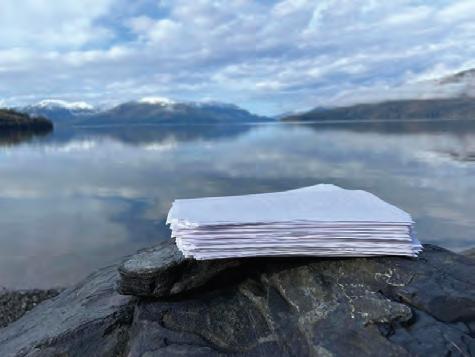 Vivian Faith Prescott
Vivian Faith Prescott
Journeying with Poems of Place
Judging this contest was difficult, but also rewarding. There were hundreds of entries! I printed out the large stack of poems, held them to my chest, and said to the universe: I’m going to take good care of these. Being a poet myself, I know each piece of paper represented a lot of hard work. It takes money, time, effort, and expectation when entering a contest.
Each morning, next to the ocean at my fishcamp, I sat with a handful of entries, drinking my coffee, and journeying with the poems. Some of the poets brought me across the country, some poets traveled to far off places, and others were musing close to home. Many of the poems explored the inside landscapes of being human within the context of place.
Over the last couple months, I read and re-read the poems. I considered how the poem made me feel, what images the poet painted, and what language and form they used. In other words, how “place” was evoked. Numerous poems stuck with me throughout the selection process, and I returned to their images and words, remembering them throughout the day. Congratulations to the three winners and all the finalists. And to those poets whose work I did not choose, I am grateful you shared your beautiful words with me. They are a part of me now. Your entries support the future work of Cirque. For sure, it was an honor to serve as a judge for this contest. Dear Readers, you will enjoy journeying with these poems as much as I did.
18 CIRQUE
Contest Winners
Jim Hanlen
West Queen Street
Ty Cobb lived across the street. That’s what his dad called him but I called him Terry, my friend. When the circus came down Queen St. we sat on the hot curb chewing tar, that the street bubbled up. The calliope swerved like the music. A sweaty man next to the ring master wore full-body, dirty white tights, his arms and chest muscles bulging. We rolled the tar into balls, then covered our two front teeth. When the clown on stilts came by, we smiled. The elephant got big, then bigger and we couldn’t see all of it at one time. What I remember most were its toenails.
Tim Barnes
Urban Renewal
I hate seeing a building torn down where I once made love Jeffrey Lane, about the Goose Hollow neighborhood
where you made love is now a place in the air, angels float there like cumulus over concrete slabs and twisted beams, sinuous now in a certain light.
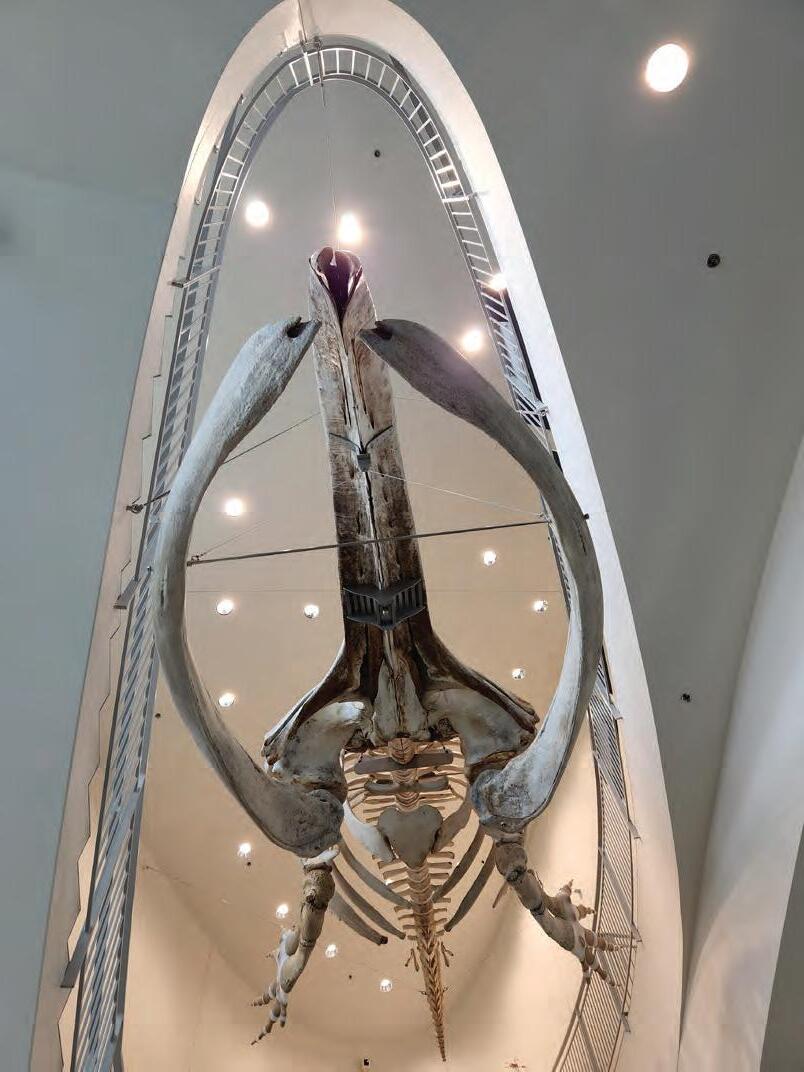
The old romances are rubble, an archeologist’s dream: history, castles to cobblestones, a shadow romance leaves in the sky blue rooms where you once loved Willow, or Kathy or Paige, beautiful women, vacancies the light stalks through the cracked cement and musty secrets of basements where houses enter the ground.
The bare floors of your toe-touch groan with crowbars and sledge hammers. A wrecking ball busted through the walls that held you close. Those posters of Jimi and Che and Janis burst into dust. Every cobblestone of the castle your loves fashioned in your mind pummeled back now to gravel troubadours trudge from Carcassone to the Goose Hollow Inn.
You loved someone beautiful in rooms now deeply naked in the gaping light of concrete hunks and hulls of broken pipe, swirls of incense ash whirl away in the wind of bulldozers dizzy with dust.
19 Vol. 13 No. 2
Janet Klein
Oval within oval. Bowhead whale skeleton in lobby. University of Alaska Museum of the North
Patrick Dixon
Western Washington November
2:00 pm, dark already— thick blanket between us and the sun, fifth day in a row. This is why friends laughed when told we were moving here from Alaska twenty years ago: Get a good umbrella Why the state’s biggest music festival is called Bumbershoot Winter on the west side.
With it, depression. Lewis and Clark wintered here, named places Dismal Nitch, Cape Disappointment. My first year it rained 105 straight days. I almost slit my wrists, I tell people with a laugh, shake my head. Thing is, it’s true.

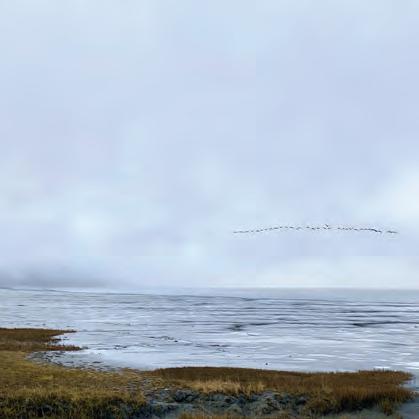
The barometer is dropping. Another storm, hard on the heels of this one arrives tomorrow just in time for Thanksgiving. After guests leave, I’m working on a plan: tabbed on my web browser is a page: Washington’s 100 Best Waterfalls I’ll pack a waterproof cover for the camera. Wear raingear. Pretend I like living here.
Finalists
Sarah Aronson
Aubade (In the Garden of a Thousand Buddhas)
Through resin sleep, wake to each other’s weathermaking, wet pennies’ domed offerings: skygod, heartgod, god of chickadee song. Pace like the sucker hole of sky, yawning at each pass of the prayer wheel. Winter droplets bejewel dogwood, shower easily when shook. White stones send back the story of hands in heat. Toss the russet earth worm to tamped weedlings. Be certain it lives. Point child-wise at geese now gone. Catalogue each look on Buddhas’ face. The titter of birds in bare trees. Theirs, but not only.
20 CIRQUE
Annekathrin Hansen
Foggy Morning Near Point Woronzof
Janet Klein
Just beach pebbles
C.W. Buckley
Comedia, Canto III — Next Stop: Paradise
My secret heaven’s only part-way home
I’ll disembark this bus before the end No one’s turned away into the gloam
The one-man kitchen welcomes every friend
His skillet’s music like the spheres soon sings
Mark how upon such grace poor souls depend
There’s bread and wine and Edith Piaf sings
Her pain perhaps like ours, perhaps her own
A gnat above chianti, angel’s wings
Rain slicks the street that soon I’ll climb alone
But first, this meal to Gypsy Kings’ guitars
Bill paid, I shoulder bag and so atone
I’ll gather warmth I pass through window bars
And kiss your brow to sow a dream of stars
Zouave, Ravenna District, Seattle, WA
Gabrielle Barnett
Peninsular Erasure
Can you recall how it started, not an unfolding, as of spring, but more as fog thickening, the alders insisting it’s been here all along, as unremarkable as lichen extruding from cracks in the bark, or dust collecting at the turning of the stairs, while the 99 B-Line shrieks again, dashing to Clark, Cambie, Granville, Alma, Sasamat, Allison and back six times an hour, rushing by raindrops dangling reckless from utility lines, paused on a determined descent seaward, where flotsam and jetsam beach haphazard twice daily with the incoming tide, washing past container ships queued for port, processing along the inlet at a stately pace towards the cranes, their solitary arms swinging girders ever skyward in slow motion, now two blue and four orange beyond the offset shingles marking the corner line of last century's roof, second story view not yet blocked by high rise complex amassing to house ever more of us, though redcedar groves, arrayed horizontal, still line the patient Fraser's mouth, as since long before steel spanned first or second narrows, bridging lands unceded by the Sḵwx wú7mesh, Xwm θkw y' m and Tsleil-Waututh peoples
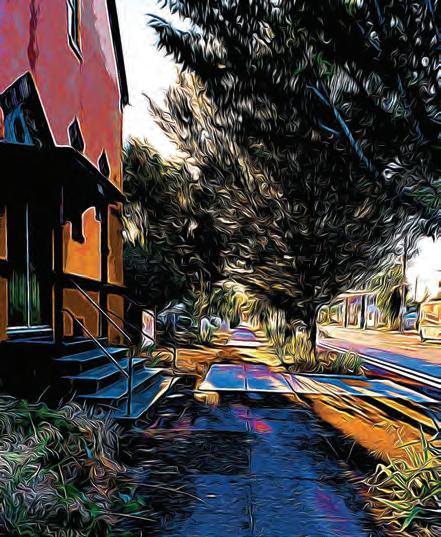
21 Vol. 13 No. 2
Lindsey Morrison-Grant
Summer Sidewalk Respite
Toni La Ree Bennett
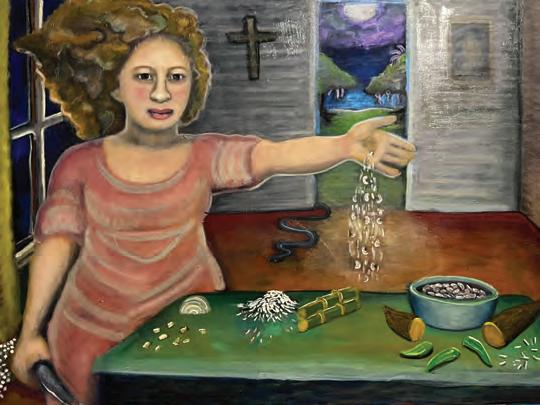
Confetti
The perfume behind me was not you after all; it was only the waitress.
I hear a parade booming and brassing down the street. That might be your breath in a gust of flute. Excited children flash neon past the cafe windows.
I don’t even know what you look like anymore, but you could soon be coming with your baton, leading the rest of the town behind you.
My heart slams against my spine, my breath suspended at the top of this roller coaster. A bus stops, but you don’t materialize. A waiting man
deflates like a disillusioned balloon. After so many wrong buses, he thought his was coming at last. The parade is not coming down this street.
Under the thinning layers of my skin hot blood percolates, threatening to detonate. I will search for you everywhere at once.
I am uncontainable, like those manic asters spreading through your chain link fence to populate ever-expanding galaxies.
And when I finally find you, I’m going to tear you to pieces and throw you in the air like confetti.
22 CIRQUE
Elizabeth Belanger
What We Remember
Jeffery Brady
The River of Taking
Láx' (heron) rises, taking flight from gravel bar at river’s mouth.
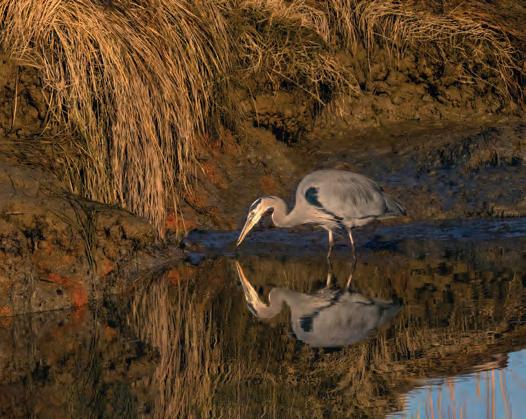
Talk to me, in your old language, which, only now, I seek to learn: Deiyáa, Taiya, Dyea, Dyee Héen—trail river, pack river.
Late, you say, too late to give back.
Your source, deep snow, on the high pass, runs clear in spring through canyon walls; then glacier-fed, grey, slinging silt, uprooting spruce, slamming boulders.
Unseen dangers for those who cross.
And then you rise and take whomever stumbles in: son, daughter, medicine person, soldier, guide, packer, cheechako— they sink under your banks, disappear.
The canoes search upriver, downriver.
And from the water, the Lkoot see: Héen—their river will take their land, not the dléit káa (whites) who think they took it— but the river, forever changing.
Swelling, cutting, widening, jamming.
The first peoples leave the village, graves of ancestors left behind; the white trading post is claimed first, boomtown structures fall down, fall in.
Take your time with the silent graves.
River exposes remains along bank: old wood, cellars, ancestral bones— Héen washes clean, curls in new arc, crossing tidal flats, out to sea.
Gulls on dock ruins fight for spoils.
Flood waters, more frequent now, come spring, summer, fall, even winter— the river takes old trails, new roads, bridges, campsites, park lands, dwellings.
Foolish, you say, but they still build.
The Lkoot from old Deiyáa know. The bald eagles, the raven, even the salmon know—what the river knows and savors from this journey.
Taking back what was never given, as sure as Láx' knows when to fly.
23 Vol. 13 No. 2
Jack Broom
Heron on Fir Island
Helena Fagan

Old Geezers Around the Fire
We borrowed Sally’s wheelbarrow to haul the stones from the front yard to the side lot under the trees, away from the road, carefully selecting the largest with the most promising angles.
The black plastic wheelbarrow, a sissy barely up to the task, flipped often during each trip so that we lifted the same stones over and over before they found their homes in our growing fire pit.
The next night friends gathered for the initiation. One brought wood, one a thermal carafe of spiced cider that most of us drank rather than the merlot. We had marshmallow sticks at the ready, graham crackers and cheap chocolate; rusted deck chairs ringed the pit for those too stiff to sit on stumps.
The night was clear and cool, the conversation of discovery rather than reminiscence, the fire enthusiastic, the bugs nonexistent and yet our new-old tribe disbanded at 8:30, Bob the first to leave, a raised hand his only goodbye. Later, as I lay in bed, I remembered other parties at this house, too many to count during our twenties, the throb of Credence Clearwater, the pot, the Old Bushmills,
the floor littered with guests in the morning, sleeping off the spirits and the night. Now I am pleased to not step over anybody on my way to the kitchen, anticipate drinking coffee in silence rather than making omelets for a crowd. The aroma of the ground beans mingles with timeworn echoes as I breathe in nostalgia free of wanting or regret.
24 CIRQUE
Worn Nard Claar and Sheary Clough Suiter
Nancy Fowler
My World This Morning
Tieton, Central Washington
A woman sits on a concrete wall at the edge of the park, her leather purse held tightly. The sun nears its peak.
In the distance, a loudspeaker announces the end of a shift, muddled from several blocks, but clear enough
to the fruit packers inside the corrugated steel plant. Wildfire ash blankets the nearby orchard of pears waiting to be picked.
Blustery exhaust trails a passing truck. While a lively ranchero song escapes through the open windows of a gun metal gray SUV.
I tap my feet to the rhythm. A red-haired boy waves. He slows his pace to linger behind his mother,
as she pushes a baby carriage across the grass. The aroma of roasting meat to be shredded at the carcineria
fills the plaza. A large yellow Lab, cream to almost white, wags his tail, and drools. A woman with a cane walks out of the grocery
with one small brown bag, and a newspaper folded under her arm. As she crosses the street to sit on the wall with her friend, a crowd of bicyclists swerve around her. Each whoops or hollers
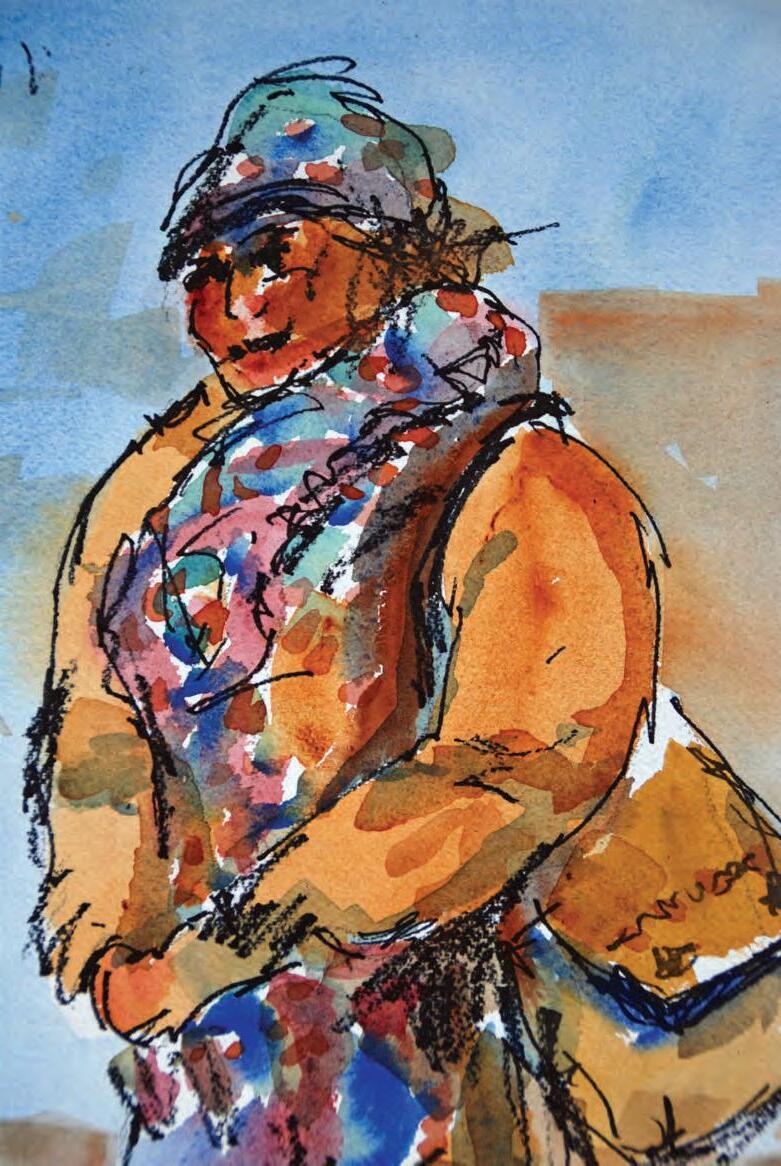
“Good morning!” “Buen dia!” A girl in a white fringed blouse
lifts her arms from the handlebars. The bike keeps a steady course. Angel wings from maple trees spin downward. They touch the grass,
the friends on the wall, the red-haired boy and his mother. They drift into my upturned hands.
25 Vol. 13 No. 2
Wendy Nard Claar
Linn Foster
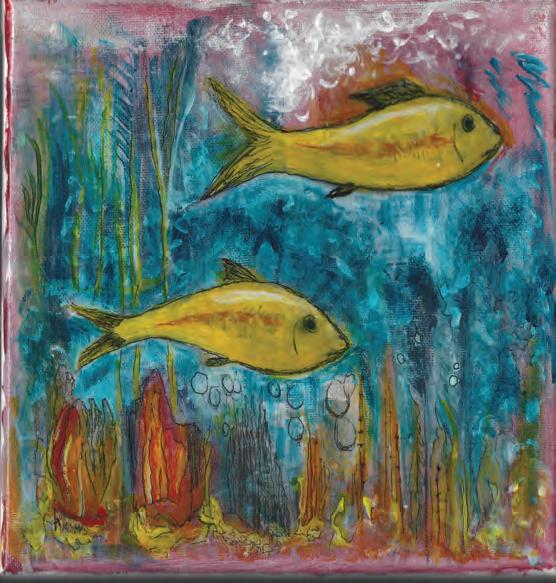
Guts and Other Internal Mechanisms
A shark washed up on the shore of the black sand beach where the grains are so fine; a walk over a cashmere sweater forgotten on the bedroom floor. I found it lying there, a sad, hollow thing, empty socket gazing skyward, mouth wrenched open. Someone before me saw this primordial work and decided the only value it had were the teeth in its head— ripped out— and the eyes as black as the land it died on, now pried from the skull. Across its belly, a gash, evisceration, intestines strewn across the grains like a map of gore leading to the sea. I stepped aside and watched as the ancient beast lifted itself, following the trail back to a home that did not care. It no longer mattered to anyone but it went anyway, disappearing into the foam.
26 CIRQUE
Deep Fish
Sandra Kleven
James Garland
Cooking Out — Winter in Oregon
1. After seven days of rain
We choose tonight to cook outdoors. Vegetables go on first- they take longer To cook than the chicken. Porch lights and a bottle of red For illumination. There’s a lull in the weather, And for a moment the clouds overhead break, Reveal stars, the Pleiades in velvet black.
Across the valley the Eola Hills, lights blinking on, And all along highway, 22 heading west, to the coast. Then the clouds close back in, Food ready to come off the fire, Rain recommences, Smattering on the porch, Dripping from the somber boughs of Doug Fir, Running into the streets reflecting The night, the rain, the light.
2. My father taught me everything I know About barbeque. I still Hear the sizzle of patties
Atop the hot coals, more summer Weekends than I could count at the grill, The only cooking he ever did, Grease dripping, fire flaring up As he flipped the burgers And turned the dogs.
What would he think — here I am
So many years later, a glass of Merlot
In the dark, thousands of miles away, Blue mountains of the Coast Range, Silhouettes of magnificent Deodar Cedar and Fir, buds on the Big Leaf Maples, And all the heroes gone, Or dead, and the skewers Need turning, what would he say, Mr. “pickle in the middle And mustard on top.”
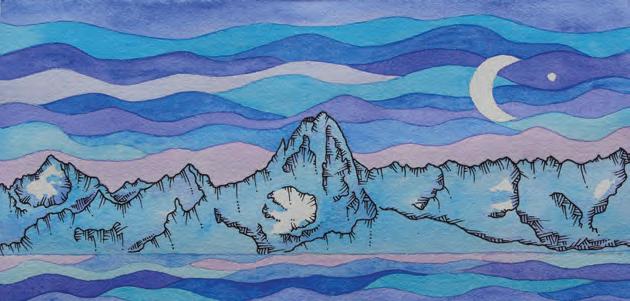
27 Vol. 13 No. 2
Shauna Potocky
Mount Alice Winter Moon and Jupiter
Mary George (Samson)
Place Name Up the Kasigilagaq River (For John)
It’s autumn again
The trees have turned color
I want you to take me camping
Take me to the Kasigilagaq River
To our fall camp
We can take the skiff up
I’ll pack the grub box, make agutaq (ice cream), brew a thermos of coffee
And pack our jarred and dry fish
I want to fill our buckets with cranberries and wiinaqs (mushy tundra cranberries)
We can sleep along the riverbank
And listen to the beavers’ tails
Lapping against the water
At night.
Our canvas tent will house us and Our wood stove will keep us warm
When the night’s chill chokes our comfort like When the water swallows the land come spring
I need to go and walk beneath the trees
As the leaves fall when the wind blows
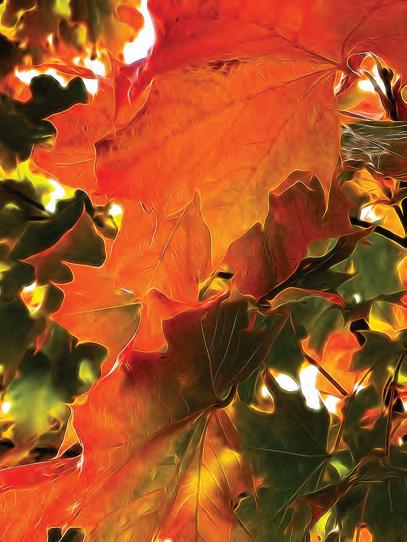
Cranberries everywhere reddening the layers of land
Like an artist’s pallet, I want to be there once again.
Up the Kasigilagaq River, around the river bends
Over on the right side where the river rises and falls
And gathers momentum as current and eddies
And then, that slender slough, bringing peace
Last time I wanted to stay and not return back to the Village. But you made me pack up.
I chuckled and told you,
“Let me stay. I’ll marry the beaver and be his bride.”
You didn’t laugh.
Is that why we’ve stayed away?
28 CIRQUE
Beauty in Transition
Mandy Ramsey
Terry S. Johnson Stratum
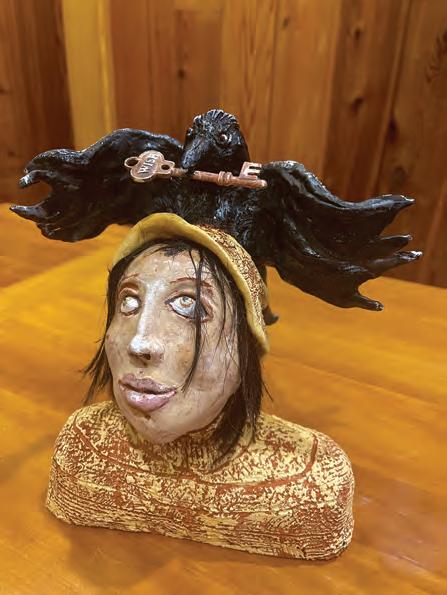
Mumbai, India
I fall asleep in this huge anthill of a city under an antique ceiling fan. Its mechanical hum, a lullaby. In the morning, I awake to crows cawing in exclamation, wings beating from banyan to sumac. When one lands on the window sill, I am grateful a screen separates me from dark plumage, piercing bill. Street vendors begin their rounds, push unwieldy wooden carts. A few tomatoes, greens of some sort or possibly cheap pots and pans. In between their frequent summons, I detect the swoosh of a street cleaner, resuming her Sisyphean efforts. I can also hear couples chatting as they walk or run, such exercise a luxury for most. Suddenly, an intermittent crack, cricket bat. And if I listen carefully, I perceive the pulse of the nearby slum, one of the largest in the city. A low hum of ceaseless activity, below the soprano car horns, tire screeches, the high-pitched descant of uniformed children rushing to school. Then, chanting. A group of celebrants on their way to a temple? More likely, a funeral procession. Body lifted, enshrouded in white, honored with marigolds, jasmine, roses. Cremation on a bier of timber. Sparks snap into silence.
29 Vol. 13 No. 2
Keep Your Wishes Under Your Wings Monica Devine
Penny Johnson As if the sky can be pressed
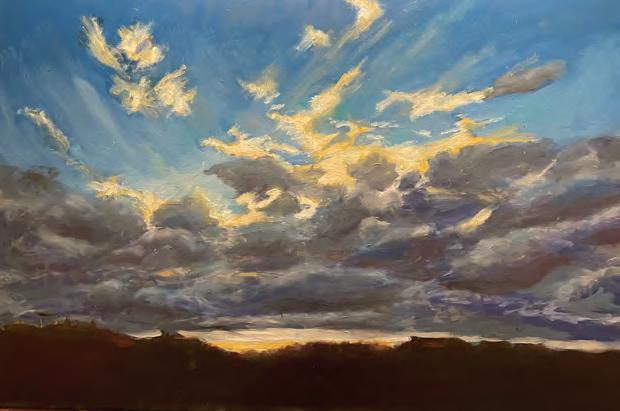
As if land can hold still. Look here. Where it bubbles up. Where the elk discriminate between fingertip leaves of sage and bitterbrush. And the soft petals of pink or white. A life cycle that crests in spikes that rip your eyes blind
where wings of wind turbines machete. Knife into the waves of navy blue. Silk rivulets. Pockmarked clouds.
Go ahead. Try.
Hold the sky.
Press the land flat.
The deep fur of us. White dogs. Spice and cream goats. Sweep of their horns. Get out of my path you. I still fight just to walk forward. To keep on while you snake my ankles and tongue my fingers.
And the men that derail. Are they any different? The way they ice over for a flat-rock hand-skipped? The curl of my mother’s cigarette smoke as she watches on. Eggshell promises where I am the raw egg with a broken yoke slipping between ring and middle finger.
All of you crouch with me in this garden that is only allowed catastrophic weeding. All of you cling like sticky vines. All of you whimper in my ears even as I watch you nibble crisp crackers. With salt. Oh this wind is howling. Until at last I will find you all tooth-picked into the corners of barbed wire.
One more fall I will wrap my arms around. These decimated sticks and branches of you. By the bushel-full. These bare bones of you. This brush-fire exploding into the next dry season.
30 CIRQUE
September John Coyne
Charleston Boat Basin
The sky opens up over the Pacific, and I understand for just this moment, things will never be this way again. The little kingfisher flashes over the boats rocking in the surf, a long trail of cirrus clouds shimmers in the diaphanous blue sky.
Three boys coast down the ramp, their fishing poles wobbling, the echoes of their footsteps reverberating off the cedar plank dock, seagulls weaving in and out overhead.
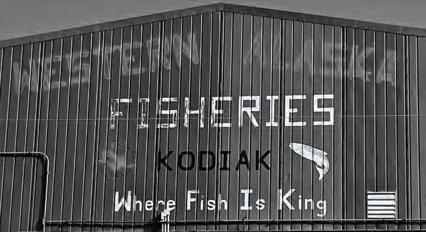
The Jolly Dee eases away from her berth, groaning in increments, stalling, then starting again, trails of black smoke drifting eastward. Her rusty hull slowly revolves into the sunshine.
An old woman rises from her pink -white webbed chair. She’s been straddling the shadow of the Linda Sue all day. Slowly she begins to pull a crab pot to the surface. She sees ribbons of kelp streaming with the tide, sparkling in the foam, and something else, a glimmer of what used to be.
Half a mile out, a red buoy sways in the swells, a study of repetition, its bell reluctantly clangs with each pitch of the waves.
Sue Fagalde Lick South Beach, Oregon
Where is downtown, my mother asked of my patch of ground in the woods. On 101, she’d see flashes of ocean, an occasional house or trailer park, storage lockers, an RV repair shop, the seafood deli, Hoover’s bar, beach signs, the one-runway airport with little planes like dragonflies, but where were the shopping malls, churches, gas stations, and city hall?
At the postal stand, we’d stop, say hello to Valerie, coo at the baby on her hip, nod to the neighbor mailing a box, pause to scan the bulletin board. This is all there is, Mom.
I could see she didn’t understand as we drove down the gravel road and turned right at the Douglas fir. A moss-covered house, an old dog, a circle of mother trees standing guard, a party of robins feasting on worms— downtown as far as I’m concerned.
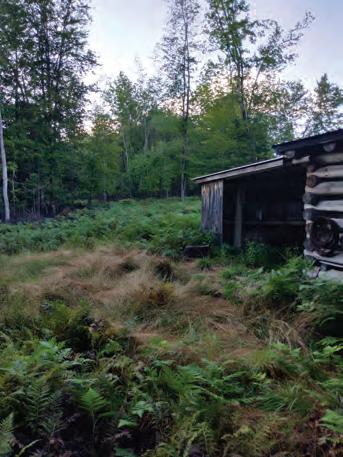
31 Vol. 13 No. 2
Thomas Mitchell
Out back of the hangar Cheryl Stadig
Where Fish Is King, Kodiak Shauna Potocky
kjmunro Yukon summerization

sum-mer-ize – adapt or prepare (a home, cottage, car, etc.) for use in warm weather
√ clean windows
√ vacuum window screens
√ re-install window screens
√ open windows
√ remove grille blanket on front of car replace with bug screen
√ wash winter coats fleece jackets fleece pants hats scarves neck-warmers mitts & gloves from downstairs closet switch with raincoats & summer jackets in upstairs closets
√ trade felt pack boots & ‘goin’ to town’ boots in downstairs hall for sandals & shoes & runners from upstairs closets
√ detach snow basket from walking stick
√ cover ice-spike on walking stick with rubber foot
√ collect snow shovels & sleds from garage & back deck & store in shed
√ move gardening tools from shed to garage
√ shift patio furniture from shed to back deck
√ check supplies of sunscreen
√ stock up on bug spray
• grab a sweater & wait
32 CIRQUE
Along Hart Lake Nard Claar
Justine Pechuzal
Turnagain
You are beginning to bare yourself: tufted, dull, scratched, eroded, scrapped the bones of winter's emaciation.
Day by sun dripped day day, a white shawl frays. Your children use their teeth to scrape towards marrow.
Dark veins crawl up ravines, rivers of melt in steadfast reveal. Newly released rock warms its face in the sun.
The alders probe, bristly fingers thrust through broad snow flanks. Makes a mountainside five o'clock shadow at noon.
Ice floes stranded, shorelines littered with the gravel scattered corpse of cold. High tide shushes, it's time to come home.
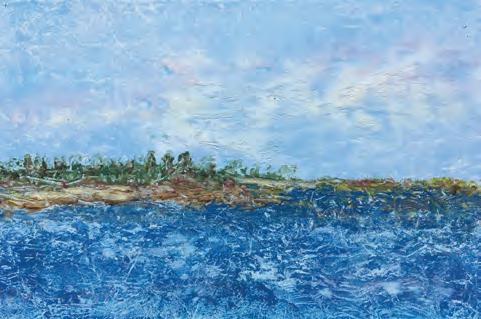
Dead grass, leaf litter, dry moss—relics. So many hungers linger in the woods. Even the trees are naked with desire.
Changling landscape, we wait with leaf bud blossom impatience as light dynamites her way through your pass.
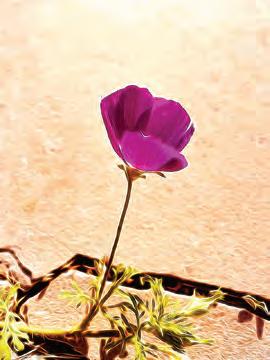 Kathleen Stancik
Kathleen Stancik
How I Lost the Wilderness
Flies sip the sweat on my forehead. Him, goading: Go ahead, pee in the trail. I’ve seen little girls before.
The old packer’s chin, tobacco stained, skin leathery as our saddles.
Alpine Lakes Wilderness, fourteen miles deep. (I don’t know the way out.) (I’m only twelve.)
The air so hot I barely can breathe. (His eyes on me.)
Waptus miles behind us. (His eyes on me.)
Stop to rest. (His eyes on me.)
If you want me to show you the way home If you want me to show you the way home If you want me to show you the way home
you’ll have to come kiss me.
No trillium, no lupine, no sparkle on Escondido Lake. Only
tobacco flakes on lower lip, filthy denim jacket, glaze of thirsty eyes.
I walk toward him. I want to go home.
33 Vol. 13 No. 2
Welcome Ashore 2
Tami Phelps
Resilient Mandy Ramsey
Joanna Streetly
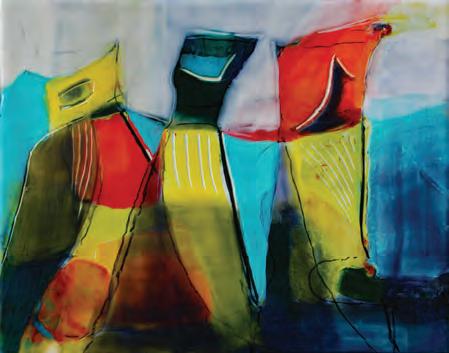
Dear Island (location withheld)
You were never much good at letters, preferred the semaphore of the blowhole, geysers of spray— how many? how high?—warning against my solo canoe your outer shore a pinballer’s fancy of reefs detonated by rolling ranks of swell celery heads of sea palms torn from the frontlines tossed aground with stinking mussel shells a no-man’s land of sun-warmed endings, wave-dodging black oystercatchers, shrieking Morse code—grievance & woe!—from tweezer beaks.
Will you take me back after all these years?
I too was torn from you, tossed to a further shore, endured the stink of endings. But still I long for your cliff by the sun-bleached whalebones looking at you with that first gasp, while sunset deer file out to the meadow, ears & tails aflicker, silent in the telescope of memory.
Don’t worry, I know you too have changed —that instead of whale skulls, I might find fragments of the children we raised, the bay still singing with their bones Perhaps that’s what I’m asking for—the tweezer beak of a song to pry me open, expose the grit.
Tim Whitsel
Whosoever
Someone burned the old church down last week. It was not a revival service, it was a volunteer fire department practicing for something more urgent.
Sure, it was only a shabby white shell, the stained glass windows salvaged, replaced with plywood.
A crinkled foil shield as tall as the average man kept the fire from igniting the classroom wing that now belongs to the new imposing sanctuary.
Its hulk had risen in stages, summer by summer. The exterior shows a dark teal so even passersby
in cars or in crew cabs with toolboxes and extra diesel onboard will know this is a new Pentecost.
The building costs would have been unthinkable without a few old timbermen dying and leaving their bequests. What quest? Which flickering calm?
Volunteers barricaded Hella street all burning day. Steps call to the basement, empty wisdom socket.

34 CIRQUE
My Three Secrets Sheary Clough Suiter
Oh, to have seen the barn when red Janet Klein
Tonja Woelber
Dancing at the Seaview Café
Beer-soaked floorboards ripple as river-rafters stomp in time, a toddler does a break dance, rubber boats in rhyme.
Two plump women splice the crowd, tango arms in fleece, scoot their tevas ‘cross the deck to a funky bluegrass beat.
Hippies sporting tie-dye, woozy with delight, fling their partners through the air this bright midsummer’s night.
Singer belts her heart out, sings into the din, a jelly jar with ones and change is stuffed above the brim.
Clouds turn purple over Baldy, against the inlet seagrass waves, slow sunset turns to amber as the last song plays and plays.
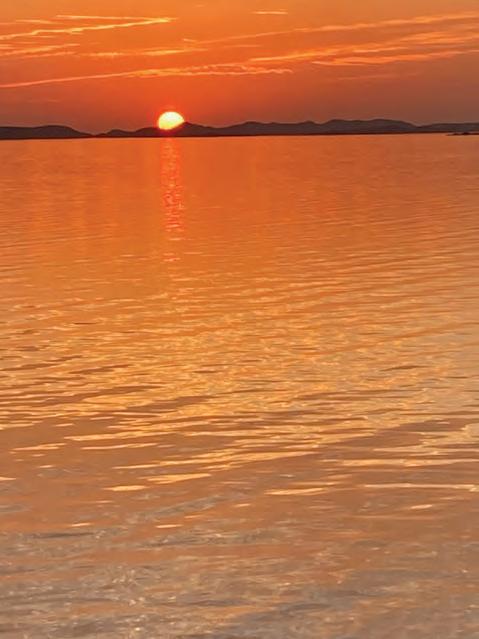
35 Vol. 13 No. 2
Sunset on the Flooded Nile (Lake Nasser) Lucy Tyrrell
 Arctic Fox Monica Devine
Arctic Fox Monica Devine
NONFICTION
Francis Opila
Refuge at Dungeness Spit
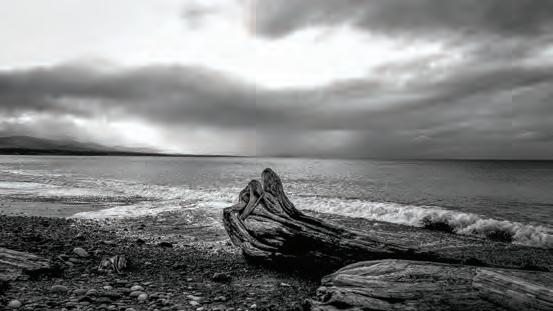
Olympic Peninsula, Washington state
Spit: a small point of land especially of sand or gravel running into a body of water
—Merriam-Webster
everything. Awareness rises beyond thought, imbibes in the brisk breeze, the Olympics out in snow-covered glory, silhouettes of the Vancouver Island Ranges across the strait.
***
***
Sweat is slow to evaporate. Hot hazy sun, no breeze. Rafts of noisy gulls and black scoters feed 200 yards offshore, perhaps following the path of a submerged gray whale. Scores of sandpipers swirl in formation along the beach, pivot onshore, flash black & ivory, vanish in white-washed blur of sand, sea, and sky.
***
Dungeness Spit extends over five miles offshore in the Strait of Juan de Fuca. The spit was formed by the action of wind and water on glacial sediments deposited about 10,000 years ago. Sea currents carry sediment along shorelines in a process known as longshore drift. As the current passes the headland, it is diverted offshore, slows down and drops its sediment load. Over time sand is gradually moved out from the headland, creating the spit. It continues to grow about 15 feet per year.
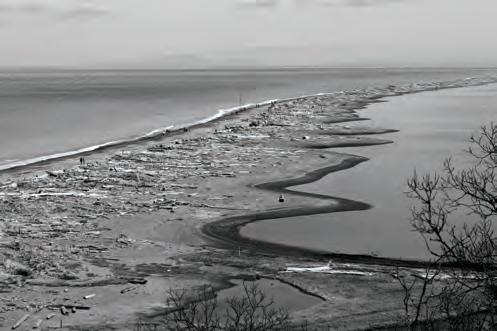
***
We saunter, hand in hand, along the sandy beach. Warm afternoon sun calms our skin, our nerves, our overthinking
For ten thousand years, Native people lived and prospered on the lands now known as the Olympic Peninsula. At the time of European contact, the native Klallam people occupied the ridges, forests, rivers, and shorelines along the northern peninsula. They fished for abundant salmon in the strait and rivers. They gathered camas, bracken fern root, and other plant foods in nearby prairies. ***
Woven ripples of wind & current paint the surface. High tide rolls in, retaking the flat sand, churning smooth pebbles & rocks that fold under the thunder of breaking waves. Harbor seals & mergansers dot the water surface, plovers skitter along the water line, snagging sand flies on rotting kelp. Driftwood, sun bleached & sea washed, lies helter-skelter on brown sand & stone.
37 Vol. 13 No. 2
On April 30, 1792, Captain George Vancouver anchored the HMS Discovery near the spit. He named it New Dungeness Spit after a famous headland on the south coast of Kent in England.
***
In 1874 to avoid forced relocation by European colonizers, Chief James Balch led the Klallam to purchase their own land and create their own community. They purchased 210 acres along the Strait of Juan de Fuca, now called Jamestown, after James Balch. In 1981 the federal government finally agreed to official recognition of the tribe, resulting in the Jamestown S'Klallam Tribe of Washington. S’Klallam is a Salish term meaning “The Strong People.”
***
Surf surges with storm, high tide, and spray. Gray clouds are swept on their winter journeys. Today there are no sea birds in the nearshore. We scramble along the backshore over logs and sea worn stones, careful where we place our feet. The south wind propels us until we reach the landmark pole lodged in the sand. We turn back, gusts bite into our faces, we pull up our hoods, listen to this squall—a song in a different key.
***
Dungeness Spit lies entirely within the Dungeness National Wildlife Refuge. President Woodrow Wilson established the refuge on January 20, 1915 as a breeding ground for native birds and a wintering refuge for brant, a small sea goose, and other birds. The refuge comprises a variety of habitats, including sand beaches, protected bay waters, seagrass beds, mudflats, along with forested uplands. Over 240 species of birds have been noted in the refuge.
***
Today the Jamestown S'Klallam tribal members live throughout the Sequim-Dungeness Valley. The tribe preserves their cultural and historical legacy. Their work includes restoration of critical habitat for the recovery of salmon and native shellfish. There are several other Klallam groups living on the Olympic Peninsula and in Canada.
***

Dance of sun & shadow, wind & waves, green sea & azure sky. A warmer day, a cloud bank hangs offshore, the bay side calm. As we walk, we shadow a loon who dives out on the strait, surfaces, preens, dives, vanishes for stretched time. We traverse driftwood logs & root wads, tangled piles of giant kelp. The sea breeze croons, we sing along. As fog floats in, our perception wanders. We breathe the spice of salt & sea grass.
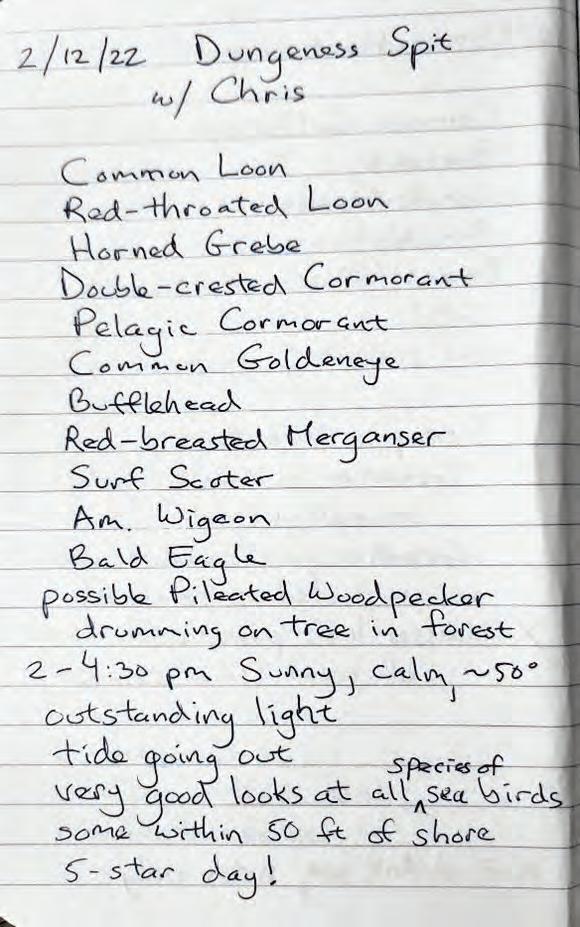
38 CIRQUE
***
Connie Feutz
All Because of Errol
I see her every time I walk into my home through the back door. At the end of a short entry hallway, upon a green-painted cupboard is a framed black and white eight by ten photo. Taken in New York City in the summer of 1948. A closeup. She’s twenty-two, in a striped, loose blouse, clasping a photographer’s light stand against her shoulder, its electrical cord gathered loosely in one hand. The photographer caught her in a full laugh; he caught her in her glorious youth at a momentous time of her life. She’d been invited by Life Magazine to come work as a stringer—from Missouri—for the summer. She’s brimming with joie de vivre. She’s beautiful. She’s my mother.
Errol Flynn—yes, the dashing, raven-haired Golden Age Hollywood superstar, known for his love of drink, cocaine and woman, who had starred in more than fifty films such as The Adventures of Robin Hood (1938) and Adventures of Don Juan (1948)—sparked a cascade of events that resulted in Life Magazine inviting my mother to work for them that summer. That same cascade also pulled my parents into one another’s orbit. For evermore.
In the spring of 1948, Errol Flynn got into a public spat at the Los Angeles Airport with his wife, causing him to miss his flight to New York City. At the airport, Flynn ran into Peter Stackpole, staff photographer for Life Magazine Flynn and Stackpole knew each other well as Stackpole had photographed Flynn on numerous occasions, including extended visits on Flynn’s yacht, The Sirocca. Five years earlier, the prosecution in a trial accusing Flynn of statutory rape of two girls called Peter Stackpole in to testify. Stackpole, who had been on the yacht at the time of the alleged assaults, testified that he had driven one of the girls home and that “she appeared ill at ease and cried most of the way home. She talked a lot but it didn’t seem to make much sense. She was very emotional and upset.”
Flynn was acquitted.
Now five years later, Errol Flynn impulsively decided to join Peter Stackpole on his flight to St. Louis and from there, take a train ride west to Columbia, Missouri where Stackpole was on assignment for Life. (Not quite in the direction of New York.) In the narrow confines of a transcontinental airplane, and later on a train, where no doubt the liquor had flowed, one wonders just what these two men might have talked about. Alas, we shall never know. What we do know is they checked into the Daniel
Boone Hotel in Columbia, Missouri.
My mother, Dorothy Jean Estep, grew up in Columbia, Missouri. Her lifelong dream was to be a journalist, inspired by female pioneers in the field such as Margaret BourkeWhite and Martha Gellhorn (who had smuggled herself onto a hospital ship, unceremoniously locking herself in a WC, thus becoming the first woman to report on the landing at Normandy in 1944). In high school, Dorothy began working at the local Columbia newspaper, The Tribune, continuing there throughout her time studying journalism at the University of Missouri in Columbia (Mizzou)—the first University to teach journalism in the U.S. It was, and remains, renowned for its journalism program.
On May 6, 1948, as a third-year student at Mizzou, The Tribune editor, Jack Hamel, called Dorothy into his office. Errol Flynn had surreptitiously checked into the Daniel Boone hotel. He instructed her to get the story.
She found the hotel lobby crowded with local gawkers. Hotel officials were blocking the stairs and elevator, only allowing hotel residents to pass. Through a contact at the hotel’s front desk—someone she had known in high school—Dorothy Jean was able to sneak up a back stairwell, becoming the first reporter on the scene, the first one to file the story. She interviewed the debonair Mr. Flynn as he stood shirtless in front of a mirror, lathering his lean face: a shaving brush in one hand, long razor in the other. We know this because Peter Stackpole snapped her photograph.
Errol Flynn slipped out of Columbia before dawn the next day as stealthily as he had slid in, hiring a driver to take him to St. Louis. Flynn’s life would continue along its well-established trajectory: More movies, more scandals, another marriage. Whereas for this young female reporter, his impulsive decision to descend upon Columbia, Missouri for scarcely twenty-four hours, changed the course of her life.
Peter Stackpole’s assignment for Life was photographing young coeds at the University of Missouri and Stephens College. He hired Dorothy Jean to be his assistant. A week after her piece about Errol Flynn ran in the Columbia Tribune—and was picked up by other national newspapers—Life Magazine sent Dorothy Jean a telegram, inviting her to New York to work as a researcher
39 Vol. 13 No. 2
over the summer.
Ecstatic, she rushed to share the news with her longtime mentor and editor.
A slight, bespectacled man, Jack Hamel read the telegram, raised his eyebrows, then handed it back. “Dorothy Jean, there is no reason for you to go to New York,” he said solemnly. “You’ve got a good job right here until you get married. You’re meant to be someone’s wife—not a career woman.”1 Stunned, she stared at the man whom she had worked for since high school and whom she deeply respected. She turned and left the newsroom fighting back tears.
Confused and heavy-hearted, she walked to the student boarding house where she rented a room. On the front porch, she ran into another student who also lived there, whom she had not yet met, Emil Feutz, aka Fritz. Fritz knew Dorothy Jean was the Tribune reporter who had made it into Errol Flynn’s room and who had scored the first interview. Everyone in town knew that.
He congratulated her. She looked away, eyes swollen. He asked if everything was OK. She shook her head and handed him the telegram, telling him what her editor had said.
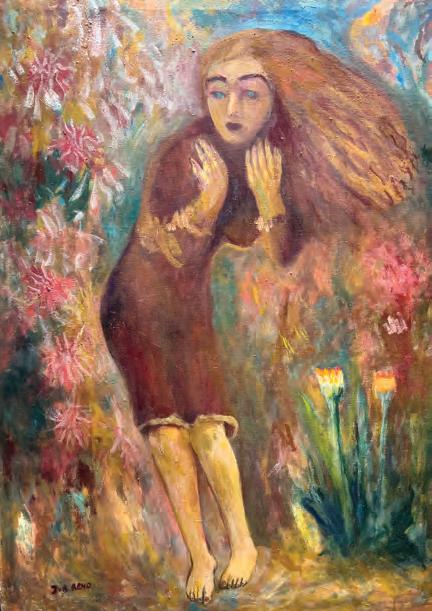
Unbeknownst to Dorothy Jean, Fritz Feutz was someone for whom dreams mattered. Obsessed his entire life with airplanes, by the age of seventeen he had acquired a commercial pilot’s license and an instructor’s license. After the bombing of Pearl Harbor in 1941, the FAA grounded all small private planes fifty miles inland from the West Coast. Fritz, not yet eighteen, hitchhiked or hopped trains (paying only when he got caught) from Missouri to California, to buy small planes at rock-bottom prices. He then flew them back to the Midwest—over the Rockies—to sell for a profit. He did this until he received his draft notice in 1942.
Fritz tried to join the Air Force but was denied entry because he had only one kidney (one had been removed because of kidney disease). Missing one kidney did not keep him from being drafted into the army, into the 66th division and stationed at Fort Rucker in Alabama. Not particularly happy about ending up in the Army rather than the Air Force, Private Feutz got into an argument with his commanding lieutenant about the most effective infantry maneuvers. The officer threatened to court-martial him for insubordination. Ever defiant, Fritz wrote a letter to the War Department in DC. requesting his commission as a 2nd lieutenant. As a graduate from an accredited Military Academy, Fritz knew he was entitled to one. He also knew if they didn’t give him the commission—which would put
him on par with the officer trying to court martial him— they would have to discharge him.
The Department of War (as it was aptly called back then) granted him his commission, but on limited service: He could not go overseas. That fluke decision, very likely made by some War Department bureaucrat, in response to this uppity private, saved my father’s life. On December 24, 1944, his division—the 66th—was on a ship crossing the English Channel on their way to France when they were torpedoed. Seven hundred and forty-eight infantrymen and fourteen officers died. No one survived.
Once the war ended, Fritz decided what he really wanted to do was to test airplanes. This meant returning to school to study aeronautical engineering. In the fall of 1947, at age twenty-four, Fritz enrolled at Mizzou and shortly thereafter moved into the basement of the student boarding house where he met Dorothy Jean.
On that front porch in May, he told Dorothy Jean in no uncertain terms, “Life Magazine! In New York City? Are you kidding me? How could you say no to an opportunity like that? Who knows when it will ever come your way again?”
His confidence, his conviction, was startling. “You’re right…”She paused, and with a broad smile added, “You are right. I am going to take this job. I’m going to New York City!”
40 CIRQUE
Joe Reno Goddess
Fritz responded, “Good choice. And I’ll fly you to St. Louis to catch your flight.”
That is how my parents met. Two weeks later, my father did fly Dorothy Jean to St. Louis—in a Stinson Gullwing, pale yellow with grey trim. (This my father easily recalled sixty years later. When asked what my mother had worn that day, he stared at me blankly.)
This is how I imagine it. They drove to a local, regional dirt airstrip. I can see him: 6’4”, lean, wearing dark aviator glasses. Once they were seated (the Gullwing is a small plane) reaching over with a long arm making sure her door was properly latched. With a sharp “Clear prop!” he started the engine.
Her first time ever in an airplane, Dorothy Jean was not prepared for the sudden clamor and shuddering as the propeller ramped up. The din was deafening as they taxied down the dirt runway. At takeoff, Dorothy Jean sat bolt upright, gripping her seat. Fritz flew over Columbia, pointing out their home, the Tribune building, the Daniel Boone Hotel: Everything in miniature, the streets in a perfect grid, the people and the cars so very tiny, moving through their day. The world she had known her entire life was moseying along, without her, while she gazed down from a gracefully banking single engine airplane. She felt a tug, a recognition, that she was now leaving that world behind, for places unknown. For a whole new life ahead.
Beyond Columbia, the colorful and quilted landscape of fields, forest and the rivers had to have mesmerized and captivated her. As did the handsome pilot’s confidence and skill. By the time they had touched down at the St. Louis Lambert airport, Dorothy Jean was smitten.
(This I DO know.)
Life had hired her for an internship for talented and ambitious journalism students. Though they were expected to return to their respective universities at the end of the summer, all hoped—upon graduation—that Life would offer them a position as a staff reporter.
On her return to Columbia in the fall, Dorothy Jean found Fritz friendly, but not interested in dating. To Dorothy Jean, he remained an aloof, attractive and intelligent enigma. And the only man who had outwardly demonstrated support for her intellect, her abilities and her aspirations.
Dorothy Jean Estep graduated in June 1949 with numerous job offers, including one from Life Magazine The pace and the intensity of New York City had been overwhelming, but while there she had visited and
enjoyed Philadelphia. So when The Philadelphia Inquirer offered to interview her, she said yes. She was waiting until after her best friend’s wedding in August, where she was the maid of honor, before leaving for Philadelphia.
In the receiving line at the wedding, wearing an orchid pink, strapless dress, Dorothy Jean turned and was surprised when the next person in line was Fritz. Unbeknownst to her, the groom—who lived in their same boarding house—had invited him. But she was even more astounded when Fritz put his hands on her shoulders and warmly kissed her. It wasn’t unwelcome; it was just so uncharacteristic for him, this public display of affection.
In the days that followed, Fritz, who had one more year at the university before graduating, actively pursued her. They played tennis; they picnicked; they danced to “Night and Day” by Bing Crosby and “Mañana” by Peggy Lee.
Shortly before Dorothy Jean was scheduled to depart for Philadelphia, and on one of her last days working for the Tribune, she was in the newsroom late. Over the Associated Press wire came news that a plane had gone down near LaSalle, Illinois and that the plane had burned. A crop duster by the name of Emil Feutz had been pulled out from the wreckage, with serious burns. Dorothy Jean called the La Salle News Tribune and learned that Fritz had been taken to a nearby hospital.
At dawn Dorothy Jean was behind the wheel of a borrowed car, maps splayed on the passenger seat, driving the three hundred miles to the hospital in Peru, Illinois. She had never before driven outside of Boone County; the trip took her seven hours. At the hospital, she told the staff she was his sister. She found Fritz bandaged and recuperating in a room with three other patients. Amazingly he had not broken any bones, although he did suffer severe burns on his arms and legs.
He managed a weak smile when he saw her. “So, Miss Dorothy Jean Estep. Just what brings you to this neck of the woods? Is Errol Flynn in the next room?”
She cracked a smile as she sat on a chair next to the hospital bed. She asked him what had happened.
He explained he had been crop dusting, killing corn borers. He had let himself get distracted, trying to not dust the farmers in the nearby fields and didn’t see “that bloody telephone cable until it was too late. Pretty damn stupid of me.”
They conversed briefly on other topics when Fritz blurted, “Well, Dorothy Jean. Would you like to get married before school starts in a couple of weeks or wait until Thanksgiving?”
41 Vol. 13 No. 2
She stared at the man before her, still captivating even in the ragged state he was in. This was her fourth marriage proposal. There had been no question that “No” was the correct answer to the other three. Her heart pulsed in her throat. “Are you serious?”
He smiled, squeezed her hand and nodded.
“My… ”She struggled to catch her breath. “Well, Mr. Emil Feutz, I think I might like that idea… Why yes, I think I do. Let’s do it. Before school starts.”
My mother believed that had they waited two months, until the break at Thanksgiving, that Fritz might have changed his mind.
They married three weeks later. My mother wore an elegant green satin dress for her wedding, defying all tradition. Given this storybook beginning, one might assume this was the start of a long and happy marriage. Sadly, no. Once they married, Fritz forbade Dorothy Jean to work (“No wife of mine needs to work.”). Her doctor told her douching was contraceptive. (Well, not exactly). She was pregnant within a few months. Four children within six and a half years, while her husband worked building his career as a test pilot, which included frequent short and extended travel.
My father, a staunch conservative and my mother, a liberal Democrat2 who received The New Yorker until the day she died, fought most nights over the Vietnam War, the fights only ending when she rushed away in tears. I can remember as a child, finding my mother in the basement, holding the door of our huge chest freezer open. She was hanging her head into it crying. It was the only place she could have a sliver of privacy with the blast of cold air aiding her in stopping the flow of tears. When I was seventeen, once over dinner, after consuming too much wine, my mother confessed she had never felt my father loved her (she apologized later for disclosing this to me). After my father passed away at the age of ninety, my mother and I were cleaning out a space where he had had a desk on the second floor. A desk he couldn’t get to for the previous fifteen or so years because of advanced Parkinson’s. The desk drawer was deep: I pulled it out and in the far back found three cheap Hallmark cards with string necklaces. Dopey cards, with goofy dancing dogs saying something like Had a great time last night! Stunned, I showed the items to my mother. Calmly, she shrugged it off, telling me, “I know your father had his women, his onenight stands. None of them were serious, or so I believed,” she told me.
I turned away, blood boiling.
My mother and I were two peas in a pod. We could talk for hours about anything and everything. We cared about books, about world events. She supported me in every interest and endeavor of mine, no matter how hare-brained or pie in the sky. Our laugh is the same as is our love for creating simple, elegant meals shared with loved ones, where you linger for hours. Our time together, our relationship, remains one of the most cherished and meaningful of my long life. I have photos and mementos of hers all over my home. I don her jewelry, her scarves, favored jackets. When she died, she graciously left me her wedding ring. She modeled for me how to be a strong, loving and compassionate woman and mother. Someone who could laugh at herself.
My father and I fought until I left home, and then some. I was not the demure, petite, feminine daughter he wanted: I was more like him (tying sheets around my bed as an eleven-year-old, scaling out the window of our twostory house, dropping onto the attached garage, to dash off into the night; a skilled and reckless horseback rider; challenging him on the rules and curfews bestowed upon me as a daughter that my brothers didn’t have; dropping out of college and traveling solo internationally from the age of twenty for two and a half years, starting with a solo bike trip on the East Coast, from Baltimore to Novia Scotia and back, on a three-speed Schwinn, my calves snug against the cargo pants I had picked up at an Army surplus store.)
Yet now, I do view their sixty-six-year marriage as a good and successful marriage. True, the first forty years were awful, but the last twenty-five or so redeemed that. I know my mother thought so as well. And I have to credit my father for this change. My father in his late fifties and early sixties went through a drawn-out and difficult emotional period. He admitted he had no clue how to love. And it was to my mother that he turned. He saw that his entire life had been wrapped up in achieving his professional aspirations (which he did), and that as a result, he had no meaningful personal relationships: not with his wife, his four children nor any friends. He spoke to me about this as well: how he feared he was creating the same tense and distant relationship with his two sons that he had had with his own father; that he had no memory ever of any tenderness from either parent. He was an only child to a frail woman, who quickly became infirm with kidney failure. She had doctors and innumerable surgeries. My father remembers her as cold, unapproachable and bedridden. Very likely in pain.
My father was born in 1923. The family farm—in the
42 CIRQUE
family since 1865—was foreclosed during the Great Depression (1929-1941). His father, my grandfather, worked two jobs to buy the property back. With an absent father and a sickly mother, my father was on his own. He told me he was “hungry all the time.” Viewed as wild and undisciplined (I’m sure he was), upon the death of his mother, at age fourteen my father was placed into a military boarding school where he was the first cadet to solo an airplane.
No one could have anticipated that graduating from the Missouri Military Academy in 1941, combined with some characteristic headstrong behavior, would later save his life.
After his difficult emotional time, in his own idiosyncratic and at times fumbling way, my father strove to let each of us know just how much he loved and appreciated us. But especially so my mother.
My father contracted Parkinson’s in his late sixties, and my mother was his caretaker until the very end. Her wish was that he would die in her arms: And that wish was fulfilled. Even though he had been restricted to a wheelchair for months, he and my mother still slept together every night.3
A couple weeks before my father died, at the age of ninety, I flew out to Missouri to be with them. Some weeks earlier my mother had been out climbing and pruning fruit trees on the family farm and had fallen and broken an ankle. She was limping around wearing a protective brace.
The guest bedroom was just across the hall from theirs and throughout my first night I heard soft voices. A couple of times during the night I tiptoed over to their door and peeked in to see if either of them needed any assistance. My father’s long arms slowly swayed above them as they whispered and giggled.4 At daybreak I could still hear them, so I stuck my head into their bedroom. “Good morning, you two rapscallions.” They beamed. In turning toward my mother, my father had somehow thrown a leg over her protective brace. Since he no longer had the strength to lift it, she was pinned: My mother could not move. Her head on his shoulder, she said to me, her face as open and innocent as a child’s, “We’ve decided we are entwined forever.”
My father, his arms around her, holding her tight, nodded. “Yep. Yep, that’s right. Entwined forever. Nothing is ever going to pull us apart.”
“I can see that.” Eyes brimming, I said, “Well, just give me a holler when one of you needs to use the restroom.” I gently closed their door and went off to make our morning coffee.
Thank you, Errol.
The author was named after a Howard Hughes’ airplane, The Lockheed Constellation ("The Connie").
1 My mother’s best friend from the age of eleven until her death at eightyseven told me she had met Mr. Hamel numerous times. It was her belief, which she had shared with my mother, that he was in love with her.
2 My mother took me to my first demonstration when I was twelve. I grew up in Ferguson Missouri; we lived one block from a solidly Black community, Kinloch. Our city council wanted to build a wall at the end of our street. My mother took me, signs in tow, to protest that in front of City Council. I was told much later that a member of Kinloch’s City Council had told his Ferguson colleagues, “Go ahead. Build your damn wall. My boys can easily jump it.”
3 My younger brother, who lived nearby, told me when he would visit and either when they were napping or early in the morning, he’d check up on them in bed. He couldn’t see my mother: he wondered where she was. Then he figured out: her 5’4” petite frame was ensconced within my father’s long curved body, his arms wrapped around her.
4 When I asked him the next day about his waving arms, he matter-offactly told me, ‘Oh that. I was waving at my buddies who have gone before me. They’re calling me.”

Lisa K. Harris
Spastic Dog Woman
I set my sights on befriending Retrievers Couple. They live close and their yard is thick with the island’s native plants. Since I’m a biologist, I figure we’ll bond over sourcing hard-to-find rhodies and salmon berries for my developing garden. They’re into animals, too; both retrievers are Best-of-Show material: brushed-out coats, perfect gait, proud form. This late-September Tuesday afternoon, I time Noelle’s walk for 3:15, when Retrievers Couple promenade north-south along our road, hoping to meet at the crossroads.
I fasten the halter onto my Australian shepherd’s slender chest and imagine the conversation with Retrievers Couple. “You’re the woman who built the new house, aren’t you?” the reed-tall husband will ask. After I nod, his curly-haired wife will add, “Beautiful home, you certainly thought through every detail. It’s magnificent.” Well, maybe not this last bit, “magnificent” too fawning for first introductions, although I do hope they see my home as a work of art. Then the wife will say, “We’re so glad we’ve run into you, you must stop by. We’re just down the road.” She’ll pivot and point to their home, four doors down. And because having a glass of wine on the deck watching the sunset over the Puget Sound’s placid waters and the
43 Vol. 13 No. 2
distant Olympic Mountains is what I see them do, the husband will say, “We can have a drink at sundown.”
My friend-making opportunities are few. Most of the homes on Bush Point are vacation rentals or second homes. They’re vacant now, partially because it's fall and partially because Washington’s governor has told everyone to stay home, and their full-time residences are elsewhere. Of those hanging on, most keep to their pandemic pod, so my best shot of meeting anyone may be dog walking.
It’s a serious pastime here, elevated to a spectator sport with not much else to do these days: best groomed, best mannered, best gait; pure breeds alongside rescues. Any sign of malcontent—barking, lunging, even sniffing too long at one spot—is admonished. Poo removal, too, is a medaling event, with handlers folding at the waist and arm scooping with special bags, pick-up within seconds of steam’s first rise. The handlers are impeccable: sturdy shoes for inclement weather, pressed khakis, fluorescent-yellow jackets, wide-brim hats. Outdoorsy attire with matching pooch apparel: glow-in-the-dark collars and leads, and on brisk mornings, yellow fleece-lined rain jackets. Neighbors walk their dogs north-south along my street every day at nearly the same time. Major leaguers all, with Noelle and I at club level, free-style our specialty.
With our house perched upslope, I watch them with Ava, my teenage daughter, from our floor-to-ceiling windows and refer to them as Retrievers Couple, HoundBeagle Lady, Fluffy-Poodle Man. If my neighbors do the same, I am called Spastic-Dog Woman.
“Hurry or you’ll miss Retrievers Couple,” Ava says, not looking up from her phone, “Meet them so you have somebody else to talk to.”
“I’ll change first.” In from the garden to take a work call, I dust leaves from my sweatshirt. “I’m a mess.”
“It’s not like you’re going on expedition to Mt. Everest, which is the only reason anyone should wear the clothes they wear. You’re walking the dog. Be who you are. Don’t change yourself to appease others.”
I hate it when Ava uses my advice to advise me. After clipping the leash onto Noelle’s halter, I scurry out the door.
Noelle does not like to be rushed. She raises her snout vertically and sniffs. Born blind and deaf, her sniffer is all she has to read the world. I tug on her leash. She takes a step left, then right, a zig and a zag, then halts. My anxiety pheromones scream danger to her. I breathe and slacken her leash; hopefully communicating everything is fine, just fine.
But it’s not. “Newbie” emotions percolate: loneliness, insignificance. I'm the new kid in class without anyone to sit with at lunch. I'm skilled, though, at making the first move, as I’ve had plenty of practice, attending nine schools before graduating high school.
After moving to the island, though, I’ve procrastinated on trying to connect with others. Beyond construction workers and our immediate neighbors—both women in homes so close I smell their dinners: stir-fry to the north from Lisa, Hamburger Helper to the south from Elsa—I haven’t met others. We normally live eighteen-hundred miles away in southern Arizona and only visited the island to check on the home’s progress. So caught up in the hubbub of construction, which took three years, I hadn’t the desire to try connecting. Friendships would come after the house was done, I figured as I finagled timelines with plumbers, electricians, and cabinet makers. Eventually, Ava would leave for college; I would graduate to emptynester status and spend long summer days on the island making new friends. But the pandemic changed our circumstances.
Noelle walks on. I gently nudge her forward. But she abruptly squats and pees in the middle of our gravel driveway. I side-step yellow rivulets as they flow downhill and spot Retrievers Couple briskly walking, fast approaching Lisa’s driveway entrance.
“Come on,” I say to my dog’s bladder. But my words don’t register.
Three years ago, when I bought the 1950s ranchstyle home from Louise’s estate, both Lisa and Elsa asked if they could keep the house’s spare keys, keys Louise had given them for “just in case.” “Might be helpful,” Lisa said, “since you live so far away.”
I took them up on their offer, thought what a caring community I had landed in, considering after fifteen years I’d never been inside most of my Tucson neighbors’ houses, let alone felt comfortable granting spare-key status. I also needed Lisa and Elsa to open doors to contractors.
A year in, after an inspector found the house riddled with black mold, after architectural plans had been developed and county permits obtained, I hardly saw Lisa and Elsa. It was my fault. I had told them I was renovating, and given the mold issue, they nodded in agreement. But I took “renovation” to the extreme and bulldozed Louise’s former home. After the earthmoving equipment left, our neighborly chitchats of shifting pewter-colored clouds and farmstand finds morphed to emails, ”Would you tell your contractor to start later in the morning?” and ”Your grass needs mowing” and “Just to let you know…”
44 CIRQUE
After we arrived this year in late June, driving this time because we couldn’t risk flying or leaving Noelle with a housesitter, Lisa and Elsa barely waved at our arrival.
Ava said, “You need to meet other people. These two want you to be like them, like Louise: quiet and into mowing her grass,” Ava said. “That’s not you.”
Noelle and I reach the bottom of the driveway as Retrievers Couple approaches. With no shoulder and an overgrown gully on our side of the lane, there will be an awkward moment when we meet and decide who walks in the road. So I cross the lane and turn Noelle toward them. She wants to stop and sniff this side’s mowed grass but there is no time. One step. Two steps. Three. At six we will be opposite Retrievers Couple, them at Lisa’s mailbox, Noelle and I at the turnoff heading down to the Point.
About to raise my hand to wave “hello” and introduce myself, I stop as abruptly as Noelle had when she peed.
Retrievers Couple had scuttled into Lisa’s driveway and turned away. They shove both shiny-coated dogs between calves. With backs to us, they shun Noelle and I as if we are an embarrassment.
Sometimes I am embarrassed. Not for Noelle’s lack of heeling or uncontrollable barking, for she can spread the news like the Point’s foghorn. I am embarrassed when she poops smack dab in the middle of the road without warning, and I trip over myself to escape dirtying tennies, my performance visible to all and certainly disqualifying us in medaling.
But she hadn’t pooped and her behavior is tip-top, walking nearly as straight as a regular dog, and no barking. So it’s not Noelle. Then what?
With no explanation or acknowledgement of us, Retrievers Couple backs still turned, I tug Noelle left and head downhill.
Is it our house? Our purple doors, when all other doors are natural dark wood? Or our front thigh-high grass when all other yards are cropped to an inch high? Or our whopper-sized mailbox with its faded painted smileyface, dinged and listing sideways? A soldier marching to a different tune amongst the other boxes, regulation-sized and black, standing in formation.
Perhaps.
Or, is it me?
I am seven again and anxious after a week of scrutiny from classmates at a new school in suburban Nashville. My younger self wants to dart home, wants to escape from judgmental eyes. Escape lunchroom evaluation of my brown paper sack with its sliced green peppers, grapefruit, and peanut butter with pickle relish on whole
wheat, in a cafeteria replete with cartoon-character boxes filled with red delicious and bologna with mayonnaise on white. Escape kids circling, kids trying to figure me out. But I can’t avoid the pack of boys outside school. One asks, “What side of the war did your family fight on?” My younger self understands that whatever my ancestors did or didn’t do plays heavily in my belonging, even if I have no clue what war the boys speak of, for clearly they aren’t talking about the ongoing Vietnam War. After batting around my membership in “us” versus “them” as we leave school, one remembers that Oregon, where I’d moved from, was neutral in the Civil War, so they say I can walk with them and we can be friends.
Maybe it’s the entire kit-and-caboodle: Noelle, our house, me.
Maybe I don’t want to know Retrievers Couple. At hill’s bottom, Noelle and I face into the wind. At the end of the taut three-foot lead, she zigzags, points a white snout skyward. Her nostrils flare and guzzles air. She’s processing duck poop, dried seaweed, saltiness, and stuff beyond my sniffer’s ability.
Ahead, the low-slung bleached boathouse, to our right the brackish pond with dabbling buffleheads, and further along, 1970s ranches platted cheek-to-jowl, worth a fortune though, as property lines encompass beachfront and tideland rights. Noelle veers right. Left. Right. I turn her in a circle to the left, passing her lead behind my back, from one palm to the next, like exercising a trotting pony. She slows, finishes reading the news, and we walk on. A right zag, her paws hit grass and she corrects, repositions herself onto pavement. As she tacks left, I tug and she centers. We undulate forward, laying claim to lane’s middle. I hope all my neighbors see what a Good Dog she is.
Along this stretch last week, I missed a chance to befriend Trekking Couple. As Noelle ignored mailbox posts, grazing rabbits, a lone deer munching fallen apples, they passed on the lane’s other side. The woman in zipperat-the-knees pants and wide-brimmed canvas hat said of my herding dog, “What amazing training,” to the man beside her, dressed in a matching outfit and presumably her husband. I started to explain why, then decided my words emphasized Noelle’s shortcomings, like an apology for who she is, and the couple scurried past before I could say that Noelle acted true to self, not because she had adapted to training.
We arrive at the cul-de-sac, our halfway point, and the end of the lonely ranches. The wind picks up as we plunge into a blackberry-bush-stinging-nettle-lined cut-
45 Vol. 13 No. 2
through. Noelle stops when her paws discern the pathway’s woodchips. Though she has walked this exact route every day since late June and nothing untoward has happened, I must coax her, like Ava coaxes me to chat up strangers.
By the time I return home, Ava will be done with her calculus class, and her nose will be buried in her phone, texting about problem sets. I’ll soon have my eyes on refrigerator shelves, parsing staples and figuring out dinner. Will Ava complain if I sauté kale and roast sweet potatoes again, as I’ve bought too much on the last farmstand run? Probably. She’ll ask if I met Retrievers Couple. Roll her eyes when I say they’re not friend material. She’ll suggest I stalk Hound-Beagle Lady, time my walk to hers.
Back onto pavement, Noelle takes the lead. The only noise is her padding feet and a cawing raven. We pass year-rounder homes: no view or beach-side barbeque. The cottages were built for fishermen in the 1940s, back when Bush Point was the place to fish on the island, maybe in the entire Puget Sound, back when it was more important to be on a boat then watching boats from a ranch-style deck, back when there were fish to fish.
Our mile-walk nearly done, we tackle a steep lane, an alley really. Noelle slows. Maybe it’s the acute grade, maybe the scents suddenly changed in the wind-free space between cottages ringed with lush red dahlias, maybe because it’s sprinkling. I tug. She sticks snout vertical.
Two gray-haired women gossip; one from over her fence and the other by her mailbox, their chatter lively, even in the soft rain. I nod as we approach, feeling envious of their fellowship. They fall silent and study Noelle and me.
I am back in sixth grade, attending a school in St. Louis, and at my first sleepover. Everyone watches as I pick up a bagel slathered with cream cheese, thinly sliced fish, pickled onion, and capers. “I didn’t know shiksas liked lox,” my new buddy says after I take a bite.
“Can’t beat this rain for our gardens,” I say to the two women, with the same exuberance as when I gobbled the lox on bagel and arrived on the other side of middle-
school hazing.
Fence-Hugger asks, “How old is your dog?”
I stop. “Twelve,” which might explain her skinny ass, but because of Noelle’s sniffer, she’s a picky eater and often refuses what I’ve dished in her bowl, like Ava and sautéed kale.
Undeterred by the incoming storm, Mailbox asks where I live, says she’s seen us walking. It’s a small community, and with only a few year-rounders, everyone knows everyone. Except me, who hardly knows anyone, even after being here since late June.
“The house at the top of the hill.” But I haven’t given them enough information to place me. “The new one.”
“With all the windows? The one where Louise’s house was? The one with the tall grass?”
“That’s the one.”
They recoil, as if they touched nettles. Floor-to-ceiling glass, green roof with live succulents, recycled materials, solar. Grass let go for bee habitat. Modern. Not cottage. Progress-ive. Change. Say it ain’t so.
The two don’t know what to say to the woman, me, who they’ve surely talked about since I bulldozed dead Louise’s house, in a neighborhood where no one has built since the ranches sprouted on the beach like so many bits of washed-up plastic. Amazon deliveryman, postman, garbage man, Lisa, and Elsa, all have said something akin to, “You really did something different,” and not in a positive way from their tone, so surely other neighbors talk.
The women eye one another. Mailbox shuffles through delivered envelopes and Fence-Hugger mumbles about dead-heading dahlias. I have yet to learn to carry on in drizzle, like these year-rounders, and maybe I never will. We stand far enough apart to fall within CDC outdoor guidelines, yet close enough that not talking is awkward. Overhead, on Fence-Hugger’s deck, a wellgroomed Golden Retriever barks, communicating my unwelcomeness.
Noelle zigs. Zags. Twists. Inhales, snorts, sneezes. Golden barks. Noelle snuffle-barks. Both women stare.
Fence-Hugger asks, “What happened to your dog’s eyes?”
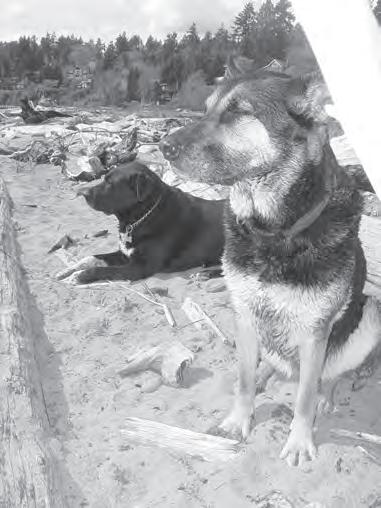
46 CIRQUE
Free Day at the Beach Todd Hamish
“She was born without them.” Noelle’s orbits contain bits of vestigial eyes deeply buried. “I found her in Mexico on a sand bar.” I haven’t talked to someone who isn’t simultaneously staring at her phone for days, and these two lean in. “Somebody put her out so the tide would take her away.” With my left hand tightly holding her lead, Noelle whips sideways to catch the Golden’s scent. I stretch out my right arm. “She was a puppy and fit in the palm of my hand.”
“You’ve had her for twelve years?” Mailbox asks. I nod. She and Fence-Hugger exchange glances again.

“Well, aren’t you a godsend.”
Fence-Hugger shouts to her Golden to shut up.
“Where are our manners?" Mailbox introduces herself, introduces Fence-Hugger.
Gladys, formerly known as Fence-Hugger, sticks out her hand, then retracts it. “We’ll have to wait until the Current Situation passes, then have you over for a glass of wine.” She points upward, to her house, “On the deck, lovely place for the sunset, if it’s not raining.”

47 Vol. 13 No. 2
Sheary Clough Suiter Passage
 Stoned Circles Jill Johnson
Stoned Circles Jill Johnson
FICTION
Joe Aultman-Moore
Forest Notes
—In memory of Barry Lopez
Here is the path, step in and tell me the first impression that hits you. (It is like entering a church or cave—the wall of trees gives way to the inside like a room.) It is the multitude of greens and browns. Absinthecolored light, rough brick browns, deep dark greens like underwater colors, the chlorophyll seems to produce a light of its own.
It was from deer that I first learned to be afraid. Now I no longer make noise, eyes searching for movement, scanning, probing. To make watching easier, you make trails with careful, silent hooves. (They carry weight, though, I know: I have seen prints sunk in fresh mud, tiny fawn prints in wet, black sand.) And this way I know that you can be caught, why you live in fear.
The trick is to sense deer before they sense you— difficult because their senses far exceed your own. Mostly it requires luck and patience. And silence, like the hunt of the spider.
I was watching a pileated woodpecker. (Red flame of feathers on the back of your head, clutching the dead branch as though it were the one with wings.) Here, walk up to the tree slowly—stop when he fixes his obsidian eye on you. He has resumed drumming. Now place your hands on the tree; can you feel it? (The drumming, almost like the heartbeat of the tree.)
Once I observed the shards of wood from the bird’s work showering down like broken crystal. I stood beneath him talking in whispers to distract him from my intent, my hands cupped as if to receive Eucharist or drink from a cold mountain stream.
I traced the patterns of leaves with my eyes, green veins forked like rivers or the marbled eye of a frog. I waited but no wood fell to me (they all turned to leaves). Eventually (after days), one was coaxed back into a shard of wood, brown and dry. I kept it between the dry parts of my lips feeling the texture and knowing perhaps the bird touched this.
One notices walking through woods, the patches of hot and cold air, light and dark. It is the same phenomenon as when you dive into a wild forgotten lake and swim
through warm and cold, light and dark. Sometimes you will step into sunlight and it will hit you sideways, stinging your cheek. It is no use looking for the place, the trees will laugh and move their branches. But if it happens, look at the sun—turn and face it, even though it will burn your eyes. Where the star comes through there will be a hole in the trees, like a match being held to the center of a spider’s web. You can see all the leaves at once. (Tiny gossamer threads of web shimmer like pieces of shattered rainbow in such a way that they tunnel to the center of the light.) I felt my brain lengthen like the shadow of a crow.
You may walk through spiders' webs without warning. Pull it off and keep going, though to anyone watching it may look like you are pulling on air. (Including the deer—they may laugh, but the flies will not).
Rain in the woods is different from rain on open ground. The sound is three-dimensional. Standing in a field, the rain: sound comes only from below (soaking shoes, wet slippery grass, the slick back of a frog). The forest floor is dry when it begins to rain, only the thirsty sound of raindrops hitting the canopy. (Drops gather, pool on leaf-tips, fall suddenly, splash below cascading down the leaves.) The water comes from everywhere at once, like a river.
I listened. White noise, like cattails scraping in wind. Took off my heavy, wet shirt and felt cold rain sliding down my back, pooling at the vertebrae. Rainwater streamed down my hair and into my eyes and mouth; the world warped like a Salvador Dali painting. I closed my eyes and tried to hear my surroundings, tried to hear where the rain wasn’t falling (a tree). Eventually I was washed into mud and became a shoot of wild violet, which a wren used for her nest. This is where I found myself, cushioning the tiny eggs.
Winter. It is the silence of the snow that is colder than the temperature. (Silent and light, catlike). A cardinal lands on a spruce (miniature avalanche) bright crimson like a splash of paint or blood against the snow.
There are also rocks here in the forest. They are a different species than the rocks one finds, say, in the desert or a river. Forest-stones (I am talking of course of
49 Vol. 13 No. 2
the great forest boulders clad in moss and lichen, silent and massive—a sleeping bear.) Climb on them, they will either hold you or let you fall. Here is a fragment of stone; plant it, it may grow. River-stones also have moss, but it is slick mud, algae. They cradle fish on their eddies.
Here are some secrets. See the crack in the mud? Try to follow it, find where it leads. Take this bit of bark and find the tree it fell from. Listen to the scream of the redtailed hawk, bite into a wild apple.
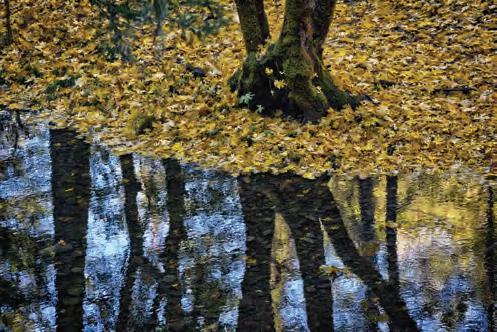
railroad: it rides upon us.” That said, if an authorized official from the state park should appear during our tour, don’t be surprised if I disappear momentarily into the woods. In the interim, reflect on the nearest tree, or compose a mental list of civil disobediences. If the rangers approach you, a quotation from Henry should serve to send them on their way: “If you mind your own business, you will stay busy all the time.”
Not only is this tour unauthorized by society’s dirty institutions, it also features occasionally poetic interpretations and renderings of the facts of Thoreau’s life. As Emily Dickinson, of whom we will hear more later, wrote, “Tell all the truth but tell it slant.” Henry valued liberty very highly, so this tour takes some liberties. The Thoreau quotation about minding your business, for example, is actually from Hank Williams, Senior. Bocephus’s daddy. But you can use it with the rangers anyway. They won’t know the difference.
Ben Kuntz
The Springs of Life

Hello! Welcome to the Free and Unauthorized Henry David Thoreau’s Woods and Walden Pond Walking Tour. My name is also Henry, and I will be your guide. To distinguish me from the other, primary Henry, you can call me Hank.
Although like Thoreau I wear a thick beard which seems to grow mostly on my neck, otherwise, in shape, looks, and my penchant for wearing sunglasses and a cowboy hat, I have been told that I much more closely resemble another Hank, Hank Williams, Junior. Or, as Hank Senior called Junior when he was a boy, Bocephus. You’re also welcome to call me Bocephus.
Before we begin, I’d like to reiterate that this is the unauthorized Thoreau walking tour, not the official tour led by rangers and historians from the Massachusetts Division of State Parks. I have no special training or credentials other than those conferred by reading Thoreau’s books and walking these woods. If you know those books at all, I don’t need to tell you what the man himself would think of an authorized, official tour, with its trolley car and seven official stops. As Henry said, “We do not ride on the
The man who opened his masterwork with a chapter titled “Economy” would no doubt appreciate the irony that the official park tour costs $11.99, more than he spent on eight months of food during the experiment in living that he wrote about in Walden, or Life in the Woods. This tour is free, though gratuities are warmly accepted. They do not need to be cash, either. If you have any dried beans, that would be more than adequate. Henry grew beans, of course, but preferred rice for his own staple, so rice would be great, too. I have gratefully accepted tips of rock salt, scrap lumber, used motor oil, and old blankets. But please feel no pressure to tip at all.
Let’s begin with a brief safety moment. Our tour will take us on several trails through the woods, and Eastern Massachusetts is at present something of an epicenter for Lyme disease, which is spread primarily by deer ticks. Long sleeves and the use of tick repellents are advised. If you discover a deer tick on your person after the tour, you should see a doctor. Long sleeve overshirts and overpants are available for borrowing in the duffel bag to your left, as are hair and beard nets. In Henry’s more innocent times, Lyme was unknown, and Henry often went shirtless or even nude on his walks through the woods. My own shirtlessness should not alarm you; I am accustomed to these environs and ticks do not bother me.
A further word on ticks: most wild animals in these woods are shy and unaggressive, but there is one dangerous exception. Moose are majestic and usually placid animals that have made a comeback here in Massachusetts, but climate change has made them much more susceptible to tick infestations, and it is not rare to
50 CIRQUE
Matt Witt
Taylor Creek
see almost hairless moose carrying thousands of ticks, which occasionally kill their hosts. As you might expect, these tick infestations can strain the good nature of even the mildest moose, so if you see a hairless or mangy moose, retreat immediately.
Our tour will occasionally follow the shoreline of the Walden Pond, made famous in Walden for the remarkable clarity and perfection of its waters. Indeed, as we see it off in the distance, it retains an attractive and startling blueness. Henry found spiritual exercise immersing himself at dawn in the pond, saying “It was one of the best things I did.” However, graphite and titanium mining in Middlesex County, along with centuries of emissions from coal-fired power plants, have polluted the pond to such an extent that it is classified by the EPA as a Superfund site. The state park strongly recommends against swimming in the pond, drinking the water, or eating fish caught in the region.
Finally, some of the less economically advantaged elements of Concord society use these woods as a place to party, a camping spot, or both. Though Henry was prone to strolling barefoot through the woods, and though you might have noticed that I myself am barefoot, the park cautions visitors to watch out for used needles, broken glass, and other hazards. Even well-shod travelers should keep a close eye out for the occasional pile of human excrement. Before we wrinkle our noses with too much disgust, we should remember that the homeless camper cobbling together a living from society’s castoff and surplus commodities probably lives a life closer to the spirit of Henry’s project than any of us. As Henry said, “Birds do not sing in caves, nor do doves cherish their innocence in dovecotes.” If you want the dovecote tour, stick to the visitor center.
On a personal note, though all the aforementioned dangers are very real, I would like to point out that these woods and this pond remain essentially pure, remain valuable refuges from the towns, conformities, and hypocrisies that Henry warned us about. He also warned against excessive caution. Even if, hypothetically, you were to walk barefoot and shirtless through the woods, or drink water straight from the pond and bathe in it, too, or sleep beneath the stars in the trees by the picnic area, eating rice cooked over an illegal campfire or scavenging mini pizza crusts from the state park’s snack bar trash cans, you would probably be just fine. If you intentionally tried to pet a moose, they might not even stomp you at all. In fact, through these risks and occasional hardships, you might find some rare breed of happiness, especially if
you have someone to share it with, as Henry perhaps had Emily. Henry might opine that the life thus lived would be both safer and fuller than the lives you will return to after this brief tour, with their HVAC and sunscreen and binge watching of TV shows, like, say, Battlestar Galactica.
So to conclude our safety briefing, please be careful. But at the same time, remember Henry’s warning: “Tell those who worry about their health that they may be already dead.”
Our first stop will take us not toward the woods or pond at all, but rather back to the parking lot. This is the shelter hut for the bus parking and unloading area. I’d like everyone to take out their phones. Excellent. Now throw them into this garbage can. I don’t need to tell you what Henry would think of cell phones, he who disapproved even of the telegraph, even of the post office. I presume there is a reason you are touring here instead of Disneyland. Henry went to jail for his beliefs. Surely you are willing to do this one small thing for yours.
Okay, okay. I didn’t really expect you to throw your phones away. I have one, too. Sometimes one has to make a choice to please someone other than the spirit of Henry’s writing, which even he did not truly live by, as his critics have often pointed out. Render unto Henry what is Henry’s, sure, but most of us have someone we really need to stay in touch with. The justification of compromises such as this is the process through which, as the man said, “our winged thoughts turn to poultry.”
But now that you have them out, on your phones, look up directions to Amherst, Massachusetts. You will find that it is 74 miles away, an hour and a half’s drive, or four hours by public transportation from this bus stop. But in Henry’s day, if you wanted to visit your secret lover, Emily, in her attic at The Evergreens, the Dickinson family home, and you publicly repudiated conveniences like trains and promoted simpler forms of transportation, then a trip to Amherst meant a minimum of a three day walk, a walk which Henry presumably made dozens of times, without complaint. Even for a famous walker, that is no mean trip.
Compared to difficulties such as this, modern day relationship impediments seem awfully petty, don’t they? If, for example, I told you that someone lived only as far away from this bus stop as Concord, a paltry 1.7 miles away, and that person owned a 2005 Kia Optima, an extravagant device Henry never could have conceived of, would you believe that still that person would often find excuses for not visiting someone who lived out here in the woods at Walden? That rather than have a bonfire on the hill, get up early, and go skinny dipping at dawn, she would prefer
51 Vol. 13 No. 2
to spend the evening in town at TGI Fridays, with people she met playing ultimate frisbee, except those people get mad if someone uses the word frisbee, insisting instead that one call a frisbee a “disc” and refer to the sport, such as it is, only as “ultimate”?
You can put your phones away now. In the trash can would be better, but silenced at the very least, please. Follow me.
This is it, the replica of Henry’s famous cabin. Though he writes at length about the possibility of modifying a simple crate or coffin to make an acceptable dwelling, you will notice that his cabin was actually pretty nice. He was a handy, capable person, and maybe couldn’t help himself. At 10 x 15, it is larger than many of today’s trendy tiny houses, and the rustic repurposed lumber is set off nicely by the clean, fresh plaster. Take a few moments to admire the stone fireplace, large windows, and cleverly designed doors.
This little building is the springhouse—isn’t it nice and cold inside? It functioned just as well as a fridge, and despite his purported abstemiousness—like Emily, he claimed to be an “inebriate of air and debauchee of dew”—reports from neighbors are consistent in noting that Henry always had at least a six-pack cooling in the spring. As you can see, someone has a twelver of long necks in there now, concealed beneath a handy slab of slate. Help yourselves.
Did Emily ever visit Henry here? Scholarship has not reached a satisfactory conclusion. No one has ever proved that her poem “Wild Nights - Wild Nights!” was not written about Thoreau. Though the poem posits a potential rather than an actual liaison, behind the subjunctive “Were I with thee / Wild nights should be our luxury,” one can perhaps discern the shadow of a real-life, Thoreau-like figure, smelling of pine pitch and pondwater, manning the rowboat.
And the one about the tide creeping up past her shoe, her belt, her apron, then her bodice, in order to eat her up? That’s pretty hot, too. That’s more than just imagination talking.
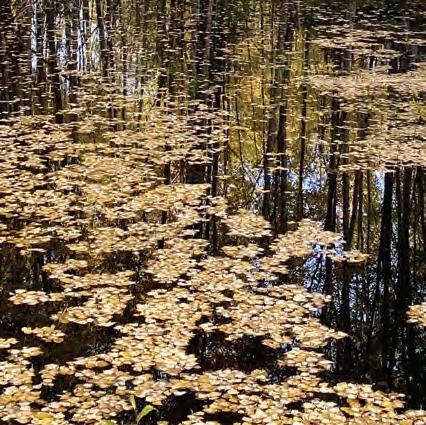
Much is made of Emily’s reclusive introversion in her alabaster chambers, her retreat from Mt. Holyoke College back to the safety of The Evergreens, and of course Henry staked his own famous claim to avoiding entanglements. Of all of his baldly confident statements, many of the most famous had to do with maintaining independence: “But I would say to my fellows, once for all, as long as possible live free and uncommitted. It makes but little difference whether you are committed to the farm or the county jail.”
Or, “A man is rich in proportion to the number of things he can afford to let alone.” Admirably stated, sir.
But looking at this cabin, can you credit that the man built it so well to host only the pleasures of his own company? Reading his tirades, reading her poems, do you not discern a certain reaching, an attempt at grabbing hold? “Futile – the winds - / To a heart in port,” as Emily wrote. I choose not to believe these two bold spirits never tasted the open sea. Why write at all, if you don’t long to be loved? We know that the solitude of Walden was largely a fiction. During his experiment Henry spent two or three nights a week in town, enjoying the company of the Emersons or the delights of his own family’s table.
Solitude, after all, can enhance the pleasures of company. Can you picture the joy, in the days before telephones and Kia Optimas, of seeing the woman you love, arguably the world’s greatest poet, arrive without advance notice on the doorstep of this cabin? And having these woods all to yourselves and unspoiled, no discarded syringes, no visitor center, no frisbee golf course in the woods? Disc golf, I mean.
I can personally bear witness to the romantic atmosphere of the cabin. Imagine it when everyone has gone home for the night. If, for example, you were very familiar with the park and had some way of getting in, and built a blazing fire in the fireplace, it would be a very romantic place indeed. Which would make it all the more puzzling if romantic nights didn’t happen, or if they did for a while, and then someone stopped responding to your texts.
In Henry’s day, of course, it would have been letters. If you could spend the night here, with someone who
52 CIRQUE
Annekathrin Hansen
Pond Reflections, September 18th, 2022
loved you, rude and intentionally simple though their ways might be, someone who occasionally has access to a comfortable and famous cabin, would you choose to spend it instead, for example, watching an entire season of Battlestar Galactica with new friends? A show about traveling through space on a fleet of ships, only to end up in the final episode on Earth? When in real life the earth is already right here, green with summer? Of course, the question is purely hypothetical.
You’re quite correct. I’m sorry for partially giving away the end of Battlestar Galactica. But here’s a spoiler alert for you: all roads end in the grave. That’s what is truly “ultimate.” It should add urgency to our days. But sometimes, urgent behavior prompts unflattering comparisons to those who are more “chill,” who know how to “hang out.” Henry would rejoin, “As if you could kill time without injuring eternity!” But apparently quoting Thoreau all the time, even when it is so clearly apropos, is also not very chill.
As we set out into the woods, keep your eyes peeled. This is an excellent place to spot a Walden woodchuck. Henry immortalized one of them in Walden: “I caught a glimpse of a woodchuck stealing across my path, and felt a strange thrill of savage delight, and was strongly tempted to seize and devour him raw; not that I was hungry then, except for that wildness which he represented.”
Though Henry claims he was only tempted to eat it, it is the official position of this tour that he definitely ate the woodchuck. I know the impulse well. He probably ate dozens of them.
We are going to step off trail for a few minutes now, so watch your footing and keep an eye on your neighbor. It gets a little swampy. If you step where I step, you’ll be fine. We all recall that Thoreau was known to be a connoisseur of a nice tree, whether for firewood or just simple companionship. He wrote, “Instead of calling on some scholar, I paid many a visit to particular trees, of kinds which are rare in this neighborhood.” These tree pilgrimages are a practice I have tried to emulate, and that is how I found this wise, ancient soul, a northern red oak. In a hollow at the base, which you can see is quite gnarled, I found a small canvas package, completely encased in wax. Inside—and this was truly the astonishing moment of my life—were six unsharpened pencils from the Thoreau family pencil works. Henry must have stashed them here for the convenience of his journaling.
Henry came from a family of pencil makers, and some speculate that too much exposure to pencil graphite contributed to his early death by tuberculosis at the age of 44. Of course, almost no Thoreau family pencils survive.
The last one verified fetched the handsome sum of $85 on eBay; six of them could represent quite a windfall for a person who lives in the woods without authorized income. Of the six that I found, this pencil stub is all that’s left. They were exceptionally fine pencils.
I used them to write letters to a certain person, countless scenes from these woods, invitations to come back to the way things were, memories of early spring days when we walked the wildflower meadows and made coffee and biscuits over a clandestine campfire. Maybe you all appreciate the import of the gesture, six priceless pencils’ worth of letters. I’m not sure the recipient did, given that she recently canceled plans to return here in order to instead “go to Outback Steakhouse and get appetizers with a friend.” Appetizers! Probably Outback’s signature Bloomin’ Onion. Fresh air was all the appetizer Henry needed.
If you follow me through this thicket—be careful not to bend branches forward and smack the person behind you—we will find a shortcut back to the trail.
This small outcropping of granite on a rise in the woods, the nearest point of relief to Henry’s cabin, receives no official recognition from the state park, but some experts are certain it was the man’s favorite spot. One would not call the view stunning—Thoreau, after all, had climbed Mt. Katahdin in Maine, and travelled to the wilds of Canada. But he thought Concord “the most favored spot on earth.” In the evening, you can catch the sunset over just a bare sliver of pond. Birds of prey like the spot, too, with its elevation and exposure. I have often seen them here, and found their pellets full of tiny mouse bones and fur. Here beneath the rock outcropping we see also a fire ring, dating perhaps to the time of the Wampanoag tribe, now used maybe by young people sharing a romantic evening, camping illicitly in a sacred spot in the woods. We can almost picture them here, unrolling sleeping bags beneath the stars, sharing a bottle of chilled wine, an inexpensive Sauvignon Blanc, $8 at Costco, and one of those rotisserie chickens.
Some Concord residents disdain the real hills and trails of these woods as not providing enough steepness or extremity, choosing instead to climb artificial cliffs in the climbing gym, or bicycle imaginary courses on machines that beep, talk, and go precisely nowhere. One of these pretenders, someone named Kevin, I’m told, works as a climbing instructor and spin coach, is really easy to talk to, has great taste in music, and plays on a championship Ultimate team.
Henry said, “If you would get exercise, go in search of
53 Vol. 13 No. 2
the springs of life.” As in many of Henry’s pithy statements, the sentiment is neatly expressed and logically unassailable. But for once, Henry’s pith provides me little consolation.

The timelessness of these woods does a better job of providing if not consolation, then at least perspective. Before Thoreau, this hill knew Pleistocene megafauna like the cave bear and the wooly mammoth, knew great tribes and communities of indigenous Americans, hundreds of generations of them, who eventually saw most of what they treasured here taken away. In recent years it has seen acid rain, tourists like ourselves, and a disastrous music festival titled Transcendapalooza. Thoreau carried his concerns to this hill, and so do I. Who knows what it has witnessed and what it will someday see?
If there was a secret romance in the stories of Henry Thoreau and Emily Dickinson, we know at least that it, too, ended. History does not record Emily as one of the two women who rejected Henry’s marriage proposals. Possibly neither Henry nor Emily’s life or art would make them easy to live with in the long term. The uncompromising bent, the idiosyncratic mind, the taste for solitude—they make for great art but poor relationships. I’ve come to accept that. Though I am captivated by Henry’s philosophy, Emily did a much better job than Henry at the simple human task of admitting she sometimes felt alone. And though I am grateful to all of you for your presence this afternoon, I admit, even with these woods for company, sometimes I too get lonely.
But I see that some of you are checking your phones, and perhaps you think we have lingered too long in this spot. However, the hill has even further secrets and surprises to disclose.
It was here on this small hill in the spring of 1849, two years after his experiment in living at Walden Pond, that Henry was introduced to Gandalf by their mutual friends Elrond the elf and Walt Whitman.
Yes, Gandalf the Grey, of Middle Earth, later the White Wizard. He called a council on this very hill, attended as well by representatives from the Elves, Dwarves, Hobbits, Kingdoms of Men, and Tree Shepherds. If that isn’t enough for you, you could include Dumbledore, Joan Baez, and Greta Thunberg. They all sang elf songs, and then Gandalf appointed Henry David Thoreau and his spiritual descendants as the guardians of the northeastern forests. So long as someone continues to live in these woods, bathe religiously in the pond, and devour the occasional raw woodchuck, the forces of darkness can never totally— Wait! All joking aside, I promise—do you smell that?
I need you all to follow me quickly back to the parking lot, as that is the telltale odor of a nearby moose. There have been several dangerous moose encounters in this area in the last few days, and this section of the park is technically closed. We aren’t supposed to be here. In the words of Gandalf, “Fly, you fools!”
Did we all make it? What an adventure! Well, that concludes our tour. If you borrowed them, don’t forget to return hairnets and long sleeve shirts and pants. Before you leave, I’d like to remind everyone again that this is a free tour, and now that it is over you are under no obligation to tip, drop out of society, grow a beard or other such body hair as you are able to grow, or devote your life to the ideals of wilderness and personal liberty. I apologize for the Gandalf stuff. I just get frustrated sometimes.
Henry said, “The one great rule of composition… is to speak the truth.” My name is not Henry, or even Hank. It is actually Diesel. My parents are big motorsports people. I have been, too, for most of my life. Most of the time I have spent in the woods has been ripping around on a dirt bike, making noise and tearing up the trails. And I didn’t really find the pencils in the tree. They were just some standard #2 Dixon Ticonderogas.
Also, if over the course of this tour I have dropped hints suggesting that I live exclusively in these woods, that isn’t true, either. I do not think Henry would judge someone too harshly for moving in for the winter with several guys he works with at Dunkin’ Donuts. I’m sorry if I haven’t been fully honest. A comment I get frequently, usually from the dads, is that we can’t all just run off and live in the woods. It is true enough that the Walden woods lack the infrastructure to support millions of campers, thousands of beanfields. Maybe there’s nowhere left for us to go.
Thanks for joining our tour today. If you enjoyed yourself, don’t forget to like us on Facebook and Instagram. For those who found material value in our tour, you can place tips in the cowboy hat which is currently passing around. I see that there is half a sandwich in there already. Many thanks. And please remember, when you get home, don’t forget to check for ticks. Lyme disease is no joke. Finally, although I am no longer welcome there and it will not be an official stop on our tour, the park’s gift shop does sell Henry and Emily’s books, which will take you further afield than any tour ever.
I don’t apologize for bringing in Emily. She belonged here, whether or not she actually made the trip. It could be she’s not coming back. Until she does, as the poem says, I dwell in possibility. Even more than the woods, that might be our truest home.
54 CIRQUE
Jack Cubria
In the Torkel
Two boys and a man waited in snowy woods somewhere out on the edge of the Empire. The boys sat with their backs to a fallen tree while their father watched the woods for a deer.
Willard, the younger, hissed at his brother to give him more room. Cameron punched Willard on the arm, and Dad growled and touched his nose with one finger, staring down at them until they were still and silent. Like hunting dogs, they were trained to obey the stern finger.
What light of the sun was coming through the gathered clouds that day shone pale and grey. Willard watched the snow falling in tiny clumps as crows kicked flurries from the tufts of pine needles hanging on the ends of branches. In the thin canopy between the crossing shadows, the powder fell every time the black birds took off, in near silence.
"When are we going to shoot?"
Dad didn't answer. He shook his head and put his finger against his mouth.
"You wanted to stay home and play cards," whispered Cameron.
The older boy's coat was unzipped, his sweater snow-covered, and he wore no hat. The cold seemed to only touch his eyes, red and narrow.
"Can I shoot first?" Willard asked.
"Your brother's shooting."
Willard looked at the footprints they'd made on their way to this natural blind. Fresh snow had settled in
the impressions. From where they sat he couldn't see any other change, after all the hours of waiting. Only Dad could see. When Dad was hunting, it seemed to Willard that he could see even farther than the woods.
"Look.”
Dad pointed two fingers at his eyes, then forward. There was an animal face between shadows. Cameron crawled over to Dad, and Dad held Cameron's arm on the gun, pushing his elbow to align straight with the barrel.
"No chicken wings," he whispered, and he adjusted Cameron's finger so that it pointed down the length of the barrel.
"Safety.”
The deer was in full view now, its wide tawny body upright in a clearing in the brush with its neck bending down and its nose searching under the surface for shoots of grass and moss that might have survived. Willard stared at Cameron's body, surging under the unzipped coat as he drew in a deep breath from his mouth, then the airy exhale that ended with a tiny pause like a hole in time, the quiet of the snow like nothingness smothering the substance of earth until the gun exploded and the shell fell on the ground.
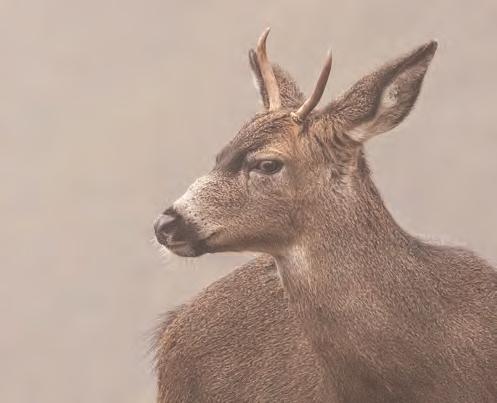
"Yes!"
"Come on," said Dad.
They climbed over the log. Willard tripped forward. Cameron said, "Yes, yes."
The wounded animal had run a short distance, leaving a trail of blood. There was a streak of mud where it had slid and fallen. Lying on its side now, stomach going in and out, it slowly poured out its life into the disturbed ground.
"You want to hit to kill if you can."
Dad stood over the deer and pointed the rifle at its head. It kicked at the ground.
"Let me shoot again."
"Wait," said Dad. He lowered the gun. "Willard wanted to shoot. Do you want to learn how to shoot now?"
"Dad, I shot it," said Cameron. "It's mine."
"Come on. I'll show you how to hold the gun."
"It's my deer, Dad."
"You both get to shoot the gun once. That's fair. Come on, Willard."
Willard said that he didn’t want to shoot the gun anymore.
"This is part of the job. It's cruel to let them linger. Come on."
Cameron reached for the butt of the rifle as if to yank it away. Dad yelled at him and put his finger on his nose
55 Vol. 13 No. 2
Jack Broom Yearling in Fog
again.
"Come on, Willard."
"We could just leave her alone."
"No. She's not going to live. She's going to keep losing blood and be in pain."
"I don't want to shoot her on the ground."
"This is just to show you how to hold the gun."
Willard started crying. Dad grabbed his arm.
"Come on. Don't do this."
He remembered how it had looked upright, holding the warmth and the breath inside its chest, safe from the cold like a fire sheltered in a rock ring. How would it look when it was not alive? This was the in-between—the sound and the suffering of it, the softly violent movements. The boy stood as if transfixed by contact from another world, a raptured oracle flailing.
When its legs stopped kicking and only the breathing remained he understood how it was certainly going to die. After that there was no feeling in him, as Dad stood behind him and held his arms.
"This is the safety."
They aligned the barrel together, pointing at the small head as one four-armed man with the metal shaft protruding.
"So you take a breath and push it all the way out so you don't shake. In, then out."
Before he was done exhaling, he heard the shot. Later he remembered a startled beating of the air, crow wings suddenly flapping, but not whether in the end it had been his finger that pulled down or Dad's finger pressing down upon his to do it for him. *
It was November when this happened, and the snow had already arrived. Drifts had risen on the shoulders of the northbound highway as they drove toward the cabin. When they reached the gravel road he stopped the truck to put the chains on the tires. Crouching by the wheel well in the bright white cold, he looked like a shade ferrying his sons, with his hair grown long down to his shoulders and matted from being unwashed, dark and bent.
When they arrived at the cabin he lit a fire, kindling it with old newspaper. After the fire was built up high, he went to the tall gun cabinet and extracted one of the three guns and began the process of cleaning the bore with the kit and wiping down the barrel. When that was done, he took a few shells and went outside and tested it on their target, a staple-shaped metal fixture staked
into the snowy ground with little swinging effigies of deer hanging suspended at waist height. He shot and the gun cracked, but there was no sound of the bullet striking metal. Months since he held a gun. Like the cabin the old rifles had belonged to his father, whom his two little sons had never met, and though the guns belonged to him now they were still his father’s, so that in coming here to shoot each year he felt that he returned to what he originally was.
His ambition was to live in the cabin year-round. He had insulated the walls so that it would be suitable for the deep winter when he retired. There was a little river on their property, down below the cliffs, where other sportsmen never went. That's where he wanted to die.
The cabin was a good place to not be bothered. But now to not be bothered was the most difficult thing in the world. If you could even manage it in your own one soul, then there were still the two boys. One of them was a weed. That older boy was all his bitterness unrestrained, yellow speargrass spreading to choke the summer hills. And the younger boy—he was a blue shadow made by clouds, an uncertain future not quite hopeful.
After he had put the gun back in the cabinet he made coffee and cooked sausages on the gas stove. The pan spat hot oil into the air. Willard went over to the fire and stood with his back to it, his palms toward the heat.
"Where's Mom?"
"She's in the bedroom," he replied, and he tilted his head toward the door beside the fireplace.
"She's keeping it warm for me," he added.
Coming back out of the bedroom, Willard asked, "When were we here?"
"We were here in July."
"That's a long time ago,” said Willard.
"It's not such a long time.”
In July he had taken them to the cabin with their mother.
They hiked down to the river with her, first over the field of tall grass and then through the deep ravine and between the aspen trees growing out at strange angles from the rocky soil. He kept the urn cradled against his chest. He was afraid of tripping over the rocks.
After they came to the river they walked downstream to the pool that had been her favorite place to swim. Below the pool the water spread like broken glass into shallow rapids, and a little waterfall swept the current against the
56 CIRQUE
*
sheer cliff on the opposite shore. Years ago they had taken the canoe down the river, and he had used his hand to push away from the rocks, with all four of them screaming and laughing as they tipped back and forth, the fishing tackle spilling in the bottom of the boat.
With the boys waiting on the bank, he took the urn and strode into the rapids. His legs were unsteady, each step slow, but he didn't fall. Willard and Cameron watched him fight it. When he had reached the middle, he took the lid off the urn and told them to say a prayer for her, shouting over the water…
Willard said one in his head, closing his eyes. He would remember forever how it wasn't very good. Dear God, please just keep my mom safe and happy. Dear God, please just help her be okay. Meanwhile Cameron, sweating, beat the flies away.
Their father stared into the rapids for a long time. At last they watched him return. He struggled through the water to the bank just as he'd come, and he sat down with his back to the dead tree, his arms crossed over his chest and the urn between his legs. He blew air out of his cheeks and blinked in the sun. Willard went to be next to him. Cameron looked at them searchingly and asked if they wanted to go fishing now. When Dad said no, Cameron walked off down the bank and cast his line alone.
With his thumb and his first two fingers, Dad rubbed the corners of his eyes, only once. He stared out at the black and green water and the white of the rapids with his dirty hair around his face. Willard saw a faint shine on the tips of his fingers.
"I just don't want the fishies to get her.”
Willard looked at the urn. His eyes had been closed, praying. He didn’t know whether Dad had done it or had changed his mind.
After several casts Cameron caught a good rainbow trout, ten inches. They took it home. Dad had to gut it because his sons refused. The older boy in particular didn't like the look of entrails. That was the one thing that repelled him.
like the pupils of their eyes, curved and huge almond eyes on their red faces, and they bared fangs and brandished pointed tongues.
"They're supposed to keep out the evil spirits," said Dad. "That's what Grandpa told me."
Before this, Willard hadn't ever thought about whether there were or weren't such things as evil spirits, but now he was afraid of both the spirits and the masks. There were so many things he had not been properly afraid of, until now.
Dad removed the heavy bolt on the door. Inside he kindled a fire in the iron fireplace. Cameron picked up an electric lantern from the table by the bed. It flickered once, then illuminated the room. A tower of old books rose from the lid of a leather chest. The skull of a small mountain goat stared down at them with vacant eyesockets. Below the skull there was an old rifle that had belonged to Grandpa, lying on its side on the mantel.
“Why is it called the Torkel?” said Willard.
Dad told him he didn’t know, and it was a German word.
“Are we German?”
“I don’t know,” said Dad. “Yeah. I guess.” Before he left, he showed them how to lock the door on the inside with another heavy bolt, made from a railroad spike. The wood was beginning to turn a rusty brown color where the cruel iron had been thrust many times into the aperture forming the lock.
“When you get cold in the middle of the night, somebody has to get up and put more wood on.”
"Will there be enough wood?" asked Willard.
"This should be enough."
At last Dad went outside. Willard heard his first departing footsteps crushing the snow. Then only the wind. He crawled onto the bed, took the side closest to the wall, and got under the cool sheets. Cameron poked at the fire with the skewer so that sparks and ash jumped out onto the floor, where he stamped them out.
"Can you turn the light off now?"
"I'm still up. Read a book.”
The snow came down hard that evening in November. They cooked beans. The deer was fully cleaned.
When it was dark, the boys begged their father to let them sleep in the Torkel. Under moonlight he took them through the meadow and down to the edge of the ravine. There was an old hut on a rock ledge, beneath ponderosas. Wooden masks hung on the walls of the Torkel, the nails
The younger boy reached for the books stacked by the bed, which were yellow-sheeted and stiff and all written in German. He couldn't read them. His brother took the old rifle down off the mantel and pointed it at the goat skull. Pretended to feel the recoil of a shot.
"Don't break it," said Willard.
"Why would I?”
"It's fragile. It’s old."
Cameron found a box of bullets on the leather chest.
57 Vol. 13 No. 2
*
He picked it up, and the box collapsed. The bullets spilled out on the floor.
"Those don't go in there," said Willard.
"How would you know?"
"They don't make bullets for that old gun anymore."
"Yes they do."
"They're not the right bullets."
"I bet they are."
As Cameron tried to put the bullets in the gun, Willard put a pillow over his face. The wind died down, or else he couldn’t hear it anymore. Later, a little sleet fell and drummed the roof.
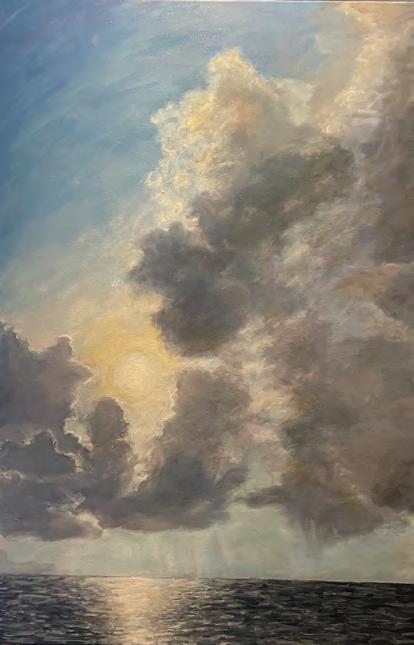
He woke up because he was freezing. The heat of the fire had gone out with the passing hours. On waking he thought about the masks. Might have dreamt about them. He was afraid to uncover himself and put more wood on the fire, and he thought he could hear deer moving about in the woods.
The big cabin wasn't so far away. A five-minute walk through the cold, faster if you ran. It would be warmer in there, in Mom and Dad's bedroom. You could crawl in. Only the masks and spirits and deer lay between.
He fell asleep again and dreamt he was running through the woods. It was summer now, and the snaps of twigs under his feet were louder than a storm. He felt his body being tossed about by wind and consumed by flames, but when he woke the heat was really the cold, gnawing his toes. It would be warmer in the cabin. The cabin was not so far.
Willard turned from the wall and started to uncover himself. Something touched him. He was all at once as shaky and cold as they had been in the snowy hunting bunker. The coals in the iron fireplace glowed faintly, only enough light to give texture to the black, in which he made out the absolute darkness of a long, outlined shadow, a reach that seemed to give off an extra sheen of cold, and it was aligned to his forehead like a pointing finger.
He mouthed his brother's name. No sound came. The skin of his forehead seemed to vibrate beneath the cold aura of that hollow point. His whole existence was concentrated into that ring for the stretched fabric of moments before the shadow went away, and then he heard the creaking of the wooden floor and the sound of it touching its resting place on the mantel.
In the morning he climbed off the foot of the bed and left Cameron there, naked and hot in the sheets. His

brother was a candle.
To get out he put his weight against the door and yanked the spike out of the hole. It clanged against the brown rings of the makeshift padlock. Outside, he propped a rock against the door to keep it from blowing open. Before he started to go down the steps he turned around and stood staring, shivering before the masks. Then he bolted the door from the outside. He wrapped his arms around himself, his sleeves swinging emptily at his sides, and he walked to the cabin through the wet snow. The morning moon was half full. When the wind passed across the grass it blew the new snow off the stalks.
Inside the cabin Dad was sitting at the table with Mom, drinking coffee. They had often slept in the Torkel together, keeping each other warm until the late morning, before she was gone. With still eyes and no breath, his father looked at him. Seemed to ask, without saying a word, what are you up so early for?
58 CIRQUE
The Drift John Coyne
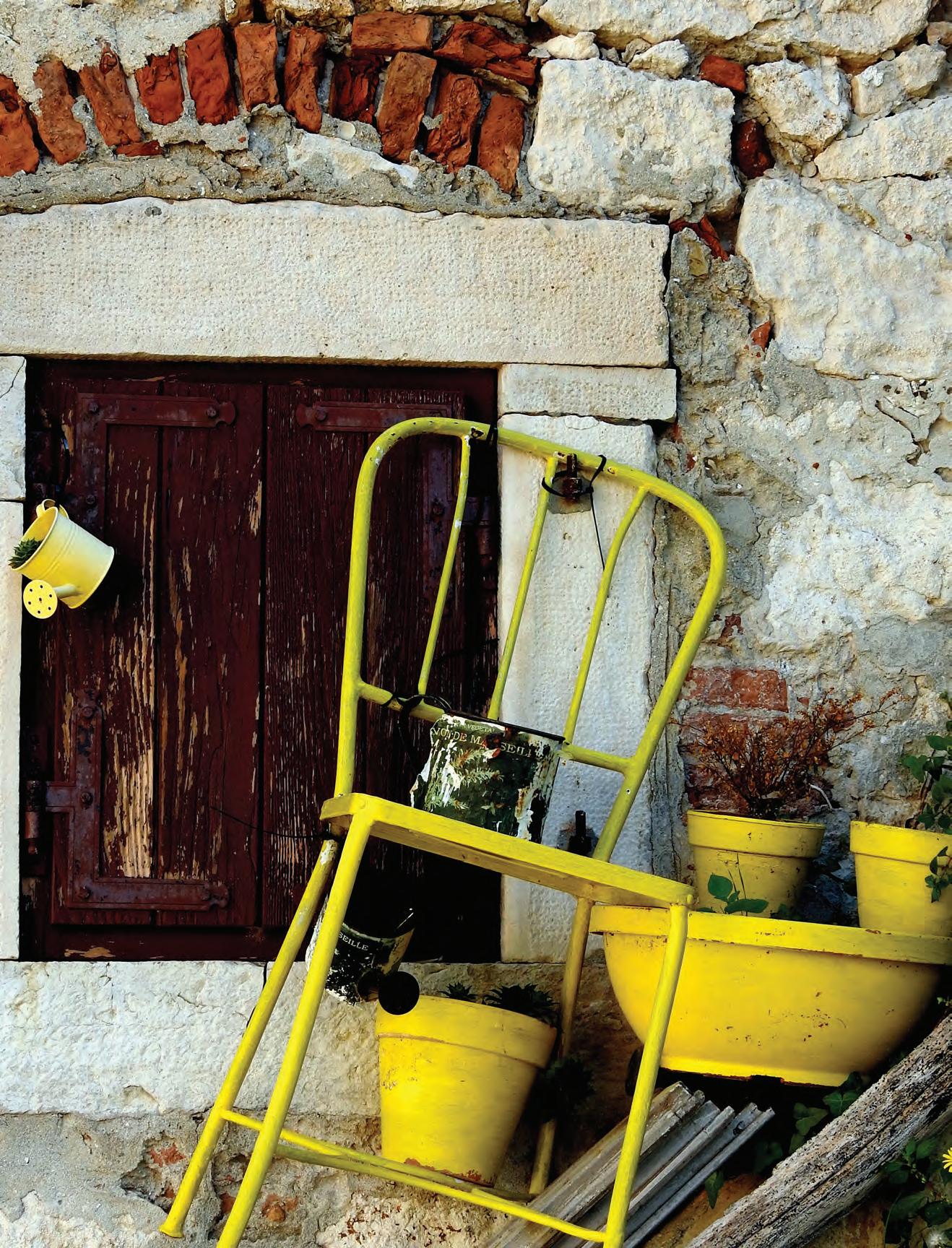 Yellow Chair Jim Thiele
Kemuel DeMoville
Yellow Chair Jim Thiele
Kemuel DeMoville
On the Crest of the Wave in the Sea of the Dead
CHARACTERS:
Zippy - (any gender) An anti-masking buttercream pie enthusiast.
Baker - (any gender) A masker.
Dr. Dwight Baldwin - (male) A missionary doctor from 1848.
Alice Augusta Ball - (female) An African-American chemist who is gagged.
Arthur L. Dean - (male) A chemist and the president of the Univ. of Hawaii.
Reverend S.E. Bishop - (male) A missionary.
A Large Flotilla of Hogs - (all genders) 400 hogs to be sacrificed to the gods.
John Lydgat - (male) A volunteer influenza surveyor from 1918.
Mary Atherton Richards - (female) A missionary.
SETTING:
We are adrift in the Sea of the Dead. The space is crowded with boats, surf boards, kayaks, canoes, rafts, and anything else that can be used to float on. People and animals on various floating objects drift in and out of the space. We’re also sitting at a table in the outdoor dining area for the Waikiki Buttercream Pie Emporium Restaurant & Souvenir Factory. Ideally there should be a large neon sign that says: “Waikiki Buttercream Pie Emporium Restaurant & Souvenir Factory” and features an image of a blond haired manic looking child holding two sticks of butter and staring at them with a look of both hunger and worship.
TIME:
annum mortuum and May 2022.
(ZIPPY is sitting unmasked at a cafe table in the outdoor dining are of the Waikiki Buttercream Pie Emporium Restaurant & Souvenir Factory. They are also floating in the middle of the Sea of the Dead.)
ZIPPY
Can I get some service? I’ve been waiting for… I don’t know. It’s so hot.
(BAKER enters, wearing a mask, and sits next to ZIPPY.)
BAKER
Hello.
ZIPPY
Oh. Um… Can I get a double stacked slice of Classic Buttercream Pie and a black coffee and some iced tea too maybe.
BAKER
Okay.
So. Are you gonna put it in?
ZIPPY
60 CIRQUE
PLAY
That’s what she said. Or he. Or they. I don’t judge.
What’s happening right now? Are you hitting on me?
BAKER
ZIPPY
BAKER
No. Gross. It’s gross enough here, don’t add to it.
ZIPPY
Are you going to take my order to the chef or something? I’d like to get some food.
BAKER
No. That’s not my thing.
ZIPPY
Do you work here?
No. Just passing by.
Oh. … …
BAKER
ZIPPY
(JOHN LYDGAT floats by.)
JOHN LYDGAT
I was given a thermometer with the simple instructions that anything over 100 degrees was to be sent to the hospital. At first the rural dwellers in that secluded valley, shut off from the rest of the world, laughingly, or even jeeringly, scouted the idea that any such epidemic disease could come to them, and also scouted the idea of making daily inspection. Inevitably the flu came.1
ZIPPY
… … I’m actually waiting for someone.
BAKER
Cool.
So you can’t have the chair.
ZIPPY
I don’t want the chair.
BAKER
61 Vol. 13 No. 2
Then why are you here? There are plenty of open seats.
ZIPPY
BAKER
I know, right? I guess buttercream pie is not a big hit with this humidity.
(A FLOTILLA OF HOGS floats by2. They are squealing and oinking in a way that resembles Essie Jenkins’s “1919 Influenza Blues” sung in the style of an old hapa-haole song. They float through the space unnoticed by ZIPPY and BAKER.)
ZIPPY
They’re going to be here any second.
BAKER
Who?
ZIPPY
The person I’m waiting for. The person whose chair you’re sitting in. They’ll be here soon. So… … … So can you please go?
BAKER
I want to tell you about a dream I had. We were all on islands. We were all dying. Alone. Screaming to each other but not hearing anything. We were all screaming so loudly we couldn’t hear any of the other people calling. Calling for help. Calling for comfort. Connection. It was weird. And I notice you’re not wearing a mask.
ZIPPY
Is that what this is about? I’ve got the shot. I’m fine.
BAKER
I’m glad you’re fine.
ZIPPY
And it’s over. The pandemic is over. We’re all done with it. We’ve moved on.
BAKER
Have we? People are still dying.
ZIPPY
People die every day.
BAKER
That’s cynical.
62 CIRQUE
ZIPPY
That’s life. We all know how our story ends. We die. We’re alone. Wearing a mask. Not wearing a mask. If you’re gonna die you’re gonna die.
BAKER
That's why the double stacked slice of Classic Buttercream Pie. You gotta death wish.
ZIPPY
No. I love life.
BAKER
So put on a mask. Let other people love life too and don’t spread nothing. I’ll give you a mask.
ZIPPY
Have you had it? COVID?
BAKER
Not yet. I wear a mask.
(The REVEREND S.E. BISHOP floats through the space.)
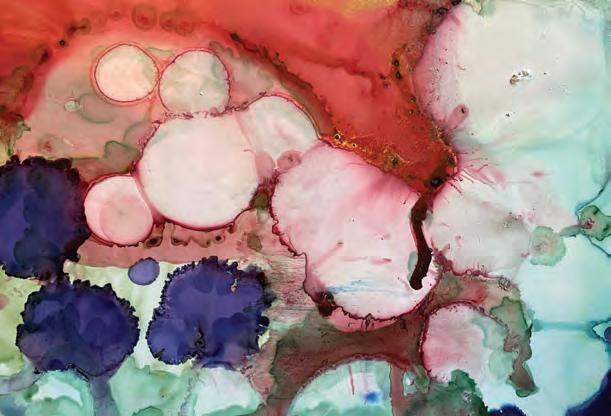
REVEREND S.E. BISHOP
It is the strange fact that, simultaneously with the arrival of white men on these islands, the Hawaiian people began rapidly to melt away. Why are the Hawaiians dying out? One: Unchastity. Two: Drunkenness. Three: Oppression by the Chiefs. Four: Infectious and Epidemic Diseases. Five: Kahunas and Sorcery. Six: Idolatry. And seven: Wifeless Chinese!3
63 Vol. 13 No. 2
Cynthia Yatchman
Covidcolor 2023d
(The REVEREND S.E. BISHOP floats away.)
ZIPPY
I had it. It almost killed me. It killed my brother. It killed my sisters. It killed my aunties and uncles. All of them. Rolled over them like a wave. And I wore a mask. All of us. We all wore masks and they all died. And now I’m alone.
BAKER
I’m sorry.
ZIPPY
I had it. But I’m still here. Now I can’t taste right. I can’t smell for nothin. I’m just waiting for someone to take my order. … Does anyone work here!
(DR. DWIGHT BALDWIN floats by, trying desperately to keep his head above water.)
DR. DWIGHT BALDWIN
My work through November, in trying to stem the diarrhea of our thousands, I can compare to nothing but a raging battle, with all its turmoil and its sad scenes of death and carnage. Never was I driven so to distraction, week after week, and month after month, with no respite. And never did I lie down at night, without the sad remembrance of some suffering individual or families, who had requested me to visit them - but whom I could not reach before night overtook me, or could not find.4
(DR. DWIGHT BALDWIN floats on… or maybe sinks.)
BAKER
Have you ever felt like you couldn’t get air? Like you’re rolling underwater, and you’re just powerless? One Christmas I took my little brother to Sandy’s. He was seven and got a little wave board. It wasn’t supposed to be bad. Just little waves. Nothing crazy. I figured okay. He wanted to take it out to Sandy’s like a big guy. So I took him. And he was fine. He didn’t drown or nothin. That’s not where I’m going with this. But while we were out messing around in the surf, like maybe knee high, not deep. But then - whoosh! - there was this big pull and a wave just rose up like a wall and came down on me. And it held me under. Like a hand just shoving my face down. And I couldn’t get my legs under me. I couldn’t just stand. It was like three feet of water but this crazy wave just pressed me under. I feel like that all the time. Like I’ve been rolling underwater for a hundred years. For more. And I can’t get air.
ZIPPY
What the hell are you talking about?! Why are you even talking to me!?
BAKER
I saw you. Saw you weren’t wearing any mask. I thought I’d talk to you. Maybe get you to see things different.
ZIPPY
See what different? You already got one foot in another world. You’re talking about dreams, and feelings, and time and junk. You act like you care about stuff, but you just want to be right. You want to feel right. Feel like you done something. Who sits down like this with a stranger and doesn’t leave? You want to put on a show or something? Make me fight you or something?
64 CIRQUE
BAKER
No. I care. I care so bad I can’t stop. I care so bad I can’t breathe. And I see you. Just ordering buttercream pie and mouth breathing. And I want you to care too.
ZIPPY
You don’t even know my name.
(ARTHUR L. DEAN and ALICE AGUSTA BALL float into the space. ALICE AGUSTA BALL is tied and gagged. Her lines are spoken as best as possible around the gag. ARTHUR L. DEAN is in the boat with her and interprets what she is saying.)
ALICE AGUSTA BALL
Avoid public gatherings. In case of headache, general indisposition followed by fever, congestion of the face, beginning coughs and marked prostration, go home and go to bed. If there is no cessation of the ailment, call a physician immediately. Persons having a cough or cold should isolate themselves from other members of the family.5
ARTHUR L. DEAN
She says: “Your Health will be protected against the dreaded Influenza Germ By the timely use of Ze Pyrol, the safe Antiseptic, as a throat gargle or nasal spray”6
ALICE AGUSTA BALL
Insist that whoever enters the sickroom wear a gauze mask, which may be made of four or six folds of gauze which should cover the nose and mouth and be tied behind the head. Remember that these masks must be kept clean, must be put on outside the sickroom, must not be handled after they are tied on.7
ARTHUR L. DEAN
Now she’s saying: “There’s no reason to feel alarmed over the influenza situation. If there even is such a thing as a real epidemic. And if you are feeling poorly, consider seeing a chiropractor. Last year chiropractors established the wonderful record of only one death in every eight-hundred eighty-six cases of 'flu.' Call a chiropractor early, and get well!”8
(ARTHUR L. DEAN and ALICE AGUSTA BALL float away.)
BAKER
You’re right. Kind of. In part. Not a hundred percent, but you got some good points. My name’s Baker.
ZIPPY
I don’t care.
What’s your name?
BAKER
ZIPPY
Please go away. Will someone take my order! I have money!
65 Vol. 13 No. 2
Just tell me your name.
BAKER
ZIPPY
… … … Zippy.
Like the restaurant?
Yeah.
Is that a fake name?
All names are fake names to someone.
BAKER
ZIPPY
BAKER
ZIPPY
BAKER
You got some darkness in you. Some smokeyness for sure.
ZIPPY
Just leave me alone.
Can I give you a mask?
BAKER
ZIPPY
Will you leave?
Will you put the mask on?
BAKER
ZIPPY
Will you take yours off? … Just for a few minutes. I’ll wear mine without another word. Just take yours off and then leave me alone.
(MARY ATHERTON RICHARDS floats by.)
MARY ATHERTON RICHARDS
Burning with fever, they would rush into the sea for relief, and died by the thousands.9 Burning. Burning. All of them. Rush into the sea. Died. Died. Died. Thousands. Died.
66 CIRQUE
(MARY ATHERTON RICHARDS floats away.)
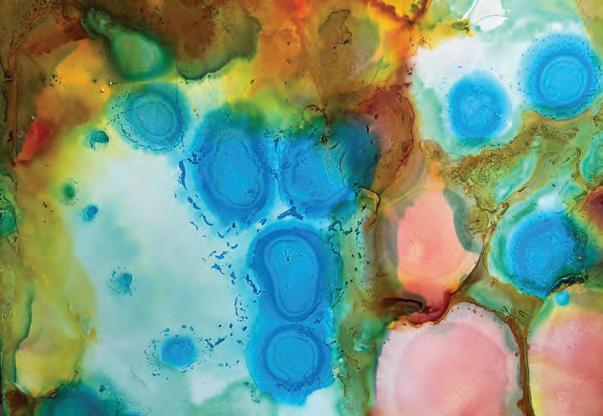
BAKER
No. No I can’t. That’s not what this is about.
ZIPPY
This isn’t about anything. It’s about nothing at all. We breath in, we breath out. Our breath. The tide. The day. The night. Stars. Time. Whatever. It isn’t about anything. But if you want me to wear the mask again. You need to take yours off.
BAKER
Why? What for?
ZIPPY
I said. I can’t smell. I can’t taste. You take your mask off for a minute and just. Describe it. Help me remember what it was like.
BAKER
Like a service? For you?
ZIPPY
Yeah. Like you’re helping an old person cross the street or something.
BAKER
Okay. Yeah. Okay. Okay.
(BAKER takes their mask off and breathes. Just deep, filling breaths.)
ZIPPY
What’s it like?
67 Vol. 13 No. 2
Covidcolor 2023a
Cynthia Yatchman
BAKER
I had forgotten. You forget how strong small is. Like, as a sense. It’s just. Wow. I can smell plumeria. It’s like I’m in a haze of plumeria and coconut sunscreen. Salt. Salt on skin in the heat. I can taste it in the back of my mouth. And maybe hot pigeon crap. Is that a smell? And someone is having pancakes and syrup somewhere. It’s not even morning but they are having pancakes. Guava syrup. You can really smell the buttercream pies. I think they’re going off because they don’t smell right. They don’t fit in. You can smell the air conditioners too. The machine oil and the hot metal. It’s just crazy how strong that plumeria is though. It just grabs you and shakes you, but then it lets you go. It goes off to find someone else. It’s with you for a moment. It puts you in the ground, and then it lets you go. And it’s hard to get back. I’m trying to smell it again, but it’s gone. All that’s left is pigeon crap, machine oil, people and pancakes. How weird. I don’t know what it means. I don’t know what any of it means.
(While BAKER is speaking ZIPPY puts on a mask, then gets out their phone and starts live-streaming.)
ZIPPY
Hey Fam! It’s the Zipster here. Zippy-bo-dippity. I’m just here chillin' at Waikiki trying to get my buttercream pie on — hashtag buttercream fiend — when I came on this anti-masker douchebag. What kind of asshole doesn't wear a mask when they’re out at a place like the Waikiki Buttercream Pie Emporium Restaurant & Souvenir Factory? It’s a public space. You got a responsibility to your fellow humans.
BAKER
What is happening right now?
ZIPPY
You’re getting called out by Zippy and and Zip-squad. Now the whole world sees you for your true self. You got no respect for your fellow humans. The world sees that now. You. Are. Done.
BAKER
That’s not what happened. I was wearing the mask. I had the mask! You didn’t!
ZIPPY
Now you can all see a wild douche bag out in nature. We see you. We hear you. You were just sitting there sniffing for pancakes like some creeper. Get your mask on creeper! Cover your face.
BAKER
This is not true! This is not what - I was wearing a mask! You! You weren’t —
ZIPPY
I was just trying to enjoy my pie, creeper. Use the code: Zippy underscore battles underscore pancake creeper for tenpercent off your next app order at the Waikiki Buttercream Pie Emporium Restaurant & Souvenir Factory. Wear a mask! I hate people like this. You know that fam. You know my truth: I speak it, I live it. Hashtag zip-isms. Hashtag truth.
BAKER
This isn’t. This isn’t…
68 CIRQUE
ZIPPY
What? This is truth. Right here. Truth. You know me fam. I care so bad I can’t stop. I care so bad I can’t breathe. And I see you. Just ordering buttercream pie and mouth breathing. And I want you to care too. That’s all I want. Hashtag care. Hashtag humanity.
BAKER
This is wrong.
ZIPPY
Sometimes it just seems like everything is wrong. But really, everything is just new. New to you. Because nothing is new. Don’t forget to smash the like and subscribe and ring that bell. I love you Zip-squad. I. Love. You.
(ALICE AGUSTA BALL swims over frantically to where ZIPPY and BAKER are. She climbs between them, grabs a knife off of the table, and cuts away her gag.)
ALICE AGUSTA BALL
Keep your hands clean. Don't shake hands, salute or bow. Wear a mask. Love each other. All islands wash away eventually. All ships sink in time. We float and flourish together.10
1 SEE: Schmitt, Robert C. & Eleanor C. Nordyke. “Influenza Deaths in Hawai'i, 1918 - 1920.” Hawaiian Journal of History, Volume 33 (1999): 101-117.
2 SEE: RC, Schmitt. “The Okuu—Hawaii's Greatest Epidemic.” Hawaii Medical Journal, 29 (1970): 359.
3 SEE: Bishop, Sereno Edwards. “Why are the Hawaiians dying out? Or, Elements of disability for survival among the Hawaiian people.” Read to Honolulu Social Science Association, November 1888.
4 SEE: Dr. Dwight Baldwin. Letter to Edward B. Robinson, Dec. 15, 1848. Hawaiian Mission Children's Society Library.
5 SEE: Schmitt, Robert C. & Eleanor C. Nordyke. “Influenza Deaths in Hawai'i, 1918 - 1920.” Hawaiian Journal of History, volume 33 (1999): 101-117.
6 Ibid.
7 Ibid.
8 Ibid.
9 SEE: Mary Atherton Richards, comp., The Chiefs' Children's School (Honolulu: privately printed, 1937) 317-318
10 SEE: Schmitt, Robert C. & Eleanor C. Nordyke. “Influenza Deaths in Hawai'i, 1918 - 1920.” Hawaiian Journal of History, volume 33 (1999): 101-117.
69 Vol. 13 No. 2
 Ancient Tools Mandy Ramsey
Ancient Tools Mandy Ramsey
POETRY
Luther Allen mary oliver died yesterday today, a man and his two sons came and felled seven cottonwoods.
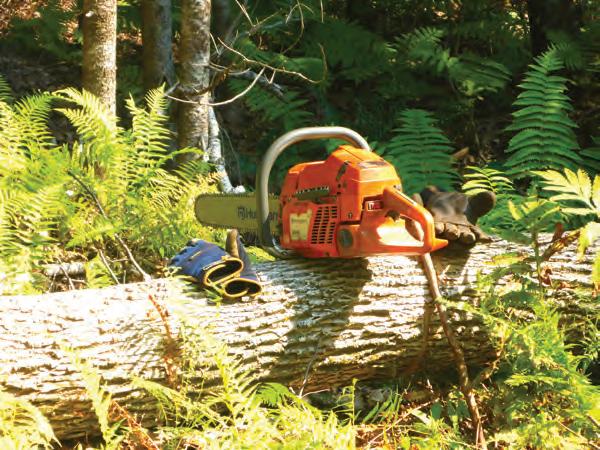
too tall, too precarious too dangerous in wetsnap brittleness when their stormworn agreement with the wind breaks.
the heavy thud shakes the ground, the heart, as they fall. the planet tilts slightly off kilter. entire astrologies must be rewritten.
there will be more light for the wild apple, the misplaced sequoia i planted.
after the men leave the wet sky drops. the wetness of a lost animal trying to find itself, touching everything, the cold and prone trunks, the baffled stumps.
because tonight the rain falls differently to the earth.
71 Vol. 13 No. 2
Cheryl Stadig
Getting Ready for Winter
Alexandra Ellen Appel My Garden
In the damp of a new morning in bare feet I navigate a star-strewn meadow
a thrush sings into the wayward sky I am rooted to this pale morning

the mist lifts a long-buried memory
a time when time held hostage and I prayed for freedom.
Today there are deer tracks in the sandy soil and the prints of fox an imprint of snail, echinacea sends her deep magenta stalks skyward and lavender becomes a lustier green yarrow, lacy with the strength of peace and protection guards my garden.
It is this, this first moment of Spring, and the thrush
singing a clear note into the early morning sky.
Jennifer Bisbing Release the Hammer, Put Down the Weapon
A million ways to be a woman in this world and I choose to walk with trees
I toss out my phone at the rest stop
Jump back on 90
Take the next exit, next grassy two track toward an unmarked trail
bury my burdens under the larch, the one that turns late partner with mud, walk together, up up, until we crest, boots pointed down to the other side of the canyon cut by its battle with change
One long look over the vista to Paradise Valley
One long look back to where we met
This is where we go beyond the finish line
Beyond anyone else’s markers
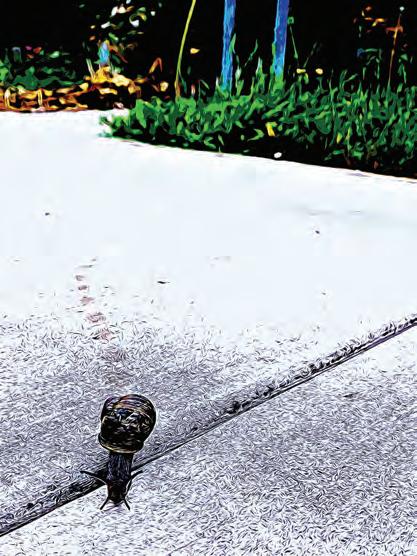
72 CIRQUE
Progress
Lindsey Morrison-Grant
Monica Devine Botticelli's Muse
Kristina Boratino
Mississippi Cypress
I can relate to the Mississippi Cypress tree— seemingly drowning in the home it lovingly created roots submerged in thick, quick tempered sludge swamp-swallowing-whole until rough woody knees pop out to breathe
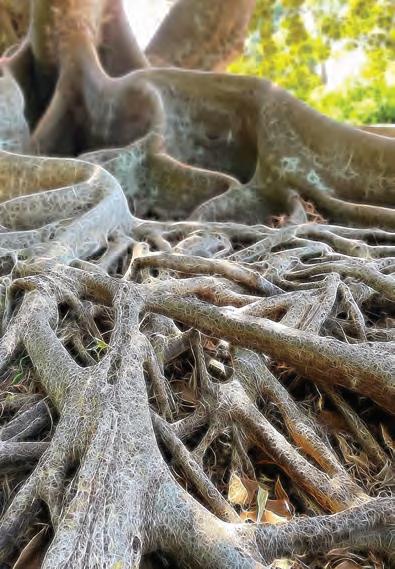
GASP
warmth slips in between relentless branch stretches and I find myself once again surrendered to the light
Wendy Brooker
The Inspiration Cycle
A spark in the hydrosphere warms and lifts itself imperceptibly out in the open evaporates from the choppy ocean surface sublimates from the face of a hanging glacier transpires from the green in my garden releasing the fragrance of growth
A glow in the biosphere mingles with our respiration as it rises in shouts and songs and yawns with barks and roars and calls steam rolling toward the sky Spirited vapors in the atmosphere gather around us mysterious in the fog climb to an ethereal peak above us condense to create floating animations capturing our imaginations carry us away in the winds of a brewing storm
A twinkling molecule of inspiration longs to be embraced cradled again by gravity precipitates splashes down to earth dropping ideas in a puddle at my door invites me to run off with it maybe go underground for a lithospheric lesson on renewal
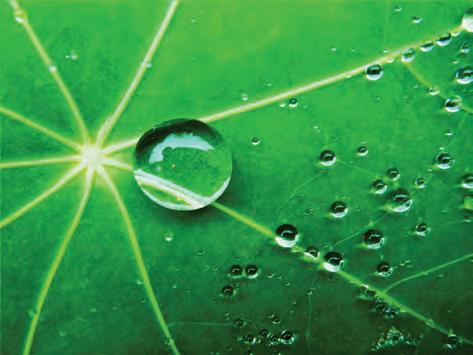
73 Vol. 13 No. 2
Mandy Ramsey Roots
Cheryl Stadig
World in a Drop
Randol Bruns
Lace Patterns in The Sand
Spawned out salmon, bodies limp left lying along the shore of a receding stream, a feeding ground for maggots. Black flies lay eggs in their eyes. Kneeling down I can hear the sizzling seething white ball of worms boiling, frenzied, diving deeper into rotting flesh. This feverish sound drowns out the rushing rocky noise of the little stream.
In two days' time, the worms turn a large sockeye into a delicate lace pattern of thin white bones balanced over a dark stain in the sand.
Screaming gulls swoop down peck at the maggots and fly off.
When the flesh is gone, the worms grow their wings, disappear in fall winds.
Cindy Buchanan
Two Poems
Between the Lines
after David Wagoner
I’ve doubted. I’ve stood still in hope I would be found by the flash of a phrase, an ember of sound, a seedling I could nourish until it spreads green ink across Arctic white. I’ve run between parallel lines until silence echoes so loudly
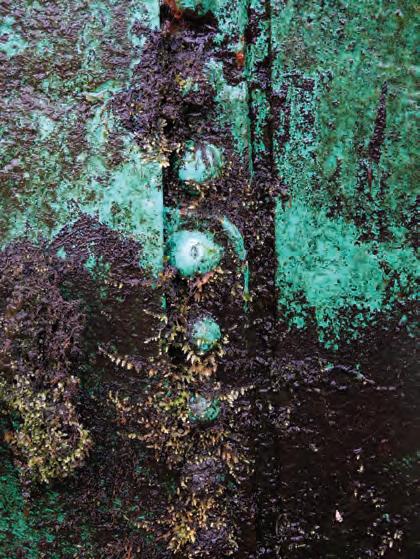
I can no longer recognize words. Most times, it feels like trying to walk through a mirror.
And still, I step into the forest. And still, I listen for the high call of a peregrine falcon, the murmur of ripples upon a rocky shore, the shush of pine boughs in the evening wind to find what
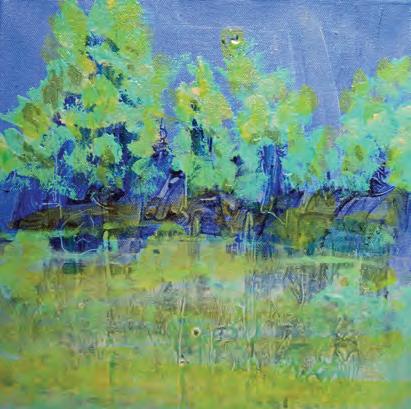 Jim Thiele
Jim Thiele
I do not know.
74 CIRQUE
Nature Reclaims
Nard Claar My Grove
How to Pronounce Grief
Go ahead. Say it slow so that it begins in the throat. You need to close the muscles around the sound as if to trap it there for as long as you can before your tongue touches the softness of your palate, your voice escapes, and grief begins: hard g, howl of r, then the eeee that travels into your mouth to lodge between your teeth and pulls your cheeks in a travesty of a smile. Your breath flows out, sends the final fffff across your lips and off into a space you are still trying to understand.
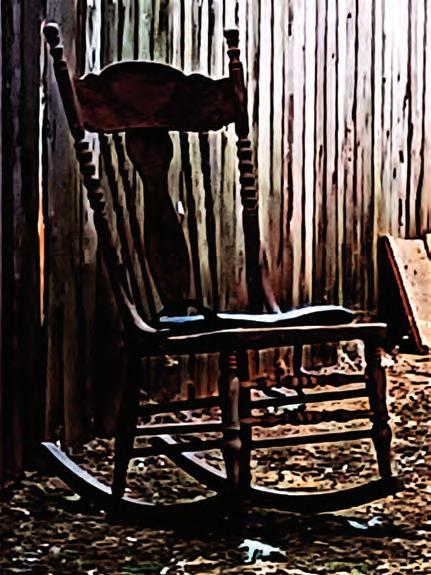
Calkin Fog
fog rolls hides envelops sandy shores
shrouds tops of tall masts it hides all rolls like a dragon tail rills valleys covers hills houses pathways docks it hides the mountains hides the waves hides boats in the fleet breaks into clouds below the hillside where I sit leaves phantom trails ties bows around vessels outlines the land the masts of neighboring ships till the wraith of wind sweeps it away turns the sun into a faint feint parts to reveal a rainbow jettisoned from a cloud parts to reveal sunshine laces around mountains or boats to deceive us till all is invisible

75 Vol. 13 No. 2
Abigail
Rocker in Transition
Lindsey Morrison-Grant
Prince William Sound V Annekathrin Hansen
Margaret Chula Potholder
I am the one they reach for when things heat up, boil over, spill out.
I am the go-between, on hand to shield them from disaster
ever ready to lift kettle, pot, baking sheet out of the fire—
while my crocheted kin still pristine, nestle at the bottom of the kitchen drawer.
Once I was blue and smelled of muslin.
Now I hold remnants of rib roast tomato soup cake batter.
I wear these stains like a topo map, my contour lines a crusty landscape frayed at the edges.
Stitched to my border, the white tag with Care Instructions burnt to a crisp.
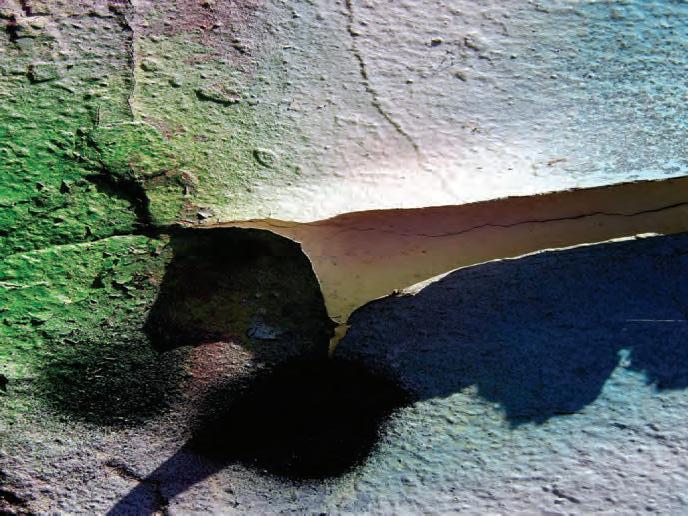
76 CIRQUE
Hidden Flaw Jim Thiele
Nard Claar Place
Every story starts In the beginning a person a tribe or society they must begin a creation story a sense of place where it begins where people were born of the earth the earth gave life as a hunter/gatherer as a farmer/ shepherd
the creation starts with a story of how it all began why we are where we are why we do what we do what makes us who we are
the sense of place gives meaning an anchor a connection to linking spiritually why we are here united with the land the place often sacred anchor a cave or mountain valley or river where life springs meaning for being border land to mark them from us
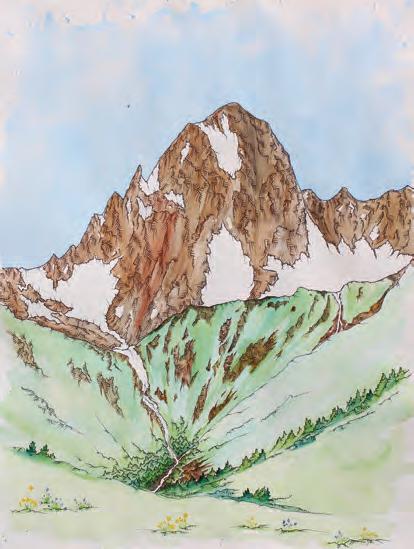
77 Vol. 13 No. 2
Mount Alice in Spring Shauna Potocky
I.M. Cordova
mija! come here, let me see you. my, my, look how you’ve grown. sit with me, it won’t be long for you now, let me teach you what it means to be a woman. always smile. speak in soft tones. think of others often. be quick to answer yes and do so happily. what if i get angry? an angry woman is a crazy woman. they already think the worst of us, you will not fuel their lies with your temper. you must help your mamá. you are the only girl, so it will all fall on you. pick up after your brothers. make sure your papá remembers to eat and watch how much he drinks. once you are old enough to have a man, you will serve him his plate first. what if i want to serve myself? that’s the bitch of it, mija. you’ll end up serving someone anyway, it’s better to have someone to serve than to end up alone. keep it tight. remember, a pretty girl gets what she wants; beauty well practiced will be one of the few weapons you’ll have. don’t forget to spray perfume in your hair. wear clothes that fit you well. stick your ass out, look at a man through lowered lashes. if you have something to say, well glossed lips will at least have them looking at your mouth. what if that makes them want me? they will want you regardless. if the worst comes, remember, you were given claws and teeth for a reason.

78 CIRQUE
When your tía who’s not your tía has had one too many modelos
The Garden Elizabeth Belanger
Mary Eliza Crane
After the Bolt Creek Fire
I drew ash from this charred tree into my body, inhaled fine particles into my lungs and my blood, its carbon stumbled on old lovers lodged in a chamber of heart. I want to fold myself into wet wool as darkness tumbles head over heels to the ground. Amid the stale scent of scorch and burn, I fumble for love in the night. The moon shines like a bone on the ravaged flesh of the forest, her ground laid bare, her secrets open. Birds vanish into silence. Each day breaks cold and damp as a sweat. My arms are empty and pale as the dawn surrendered with every drawn breath.
Chris Dahl
The Stream Beneath Us
Now we see these incidents clearly where they used to be distanced: the beheadings in the Middle East, the tourists on YouTube kicking the ground squirrel, toppling it into the Grand Canyon.
We see just how thin the veneer of civilization really is, how easily it mars, and how scratches reveal the base underlayment.
I, myself, have sprayed for cockroaches, set traps for mice, exterminated rats, eaten meat without apology. I have ordered lethal injections for pets.
I don’t know what to make of this world— does anyone?—such great beauty laced with cruelty: the neighbor’s cat slinking up the driveway limp vole in her teeth.
But then I come to these gleams of slurring, shadowed water, and what’s reflected there, some alternate version of this world, intensified by ripples and light, softens the stone bed, before proceeding toward the larger river, slowly and deeply moving, and not entirely illusion.
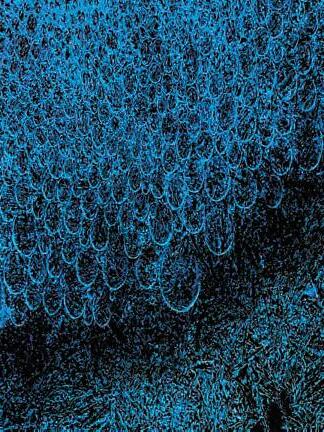

79 Vol. 13 No. 2
Teri White Carns
Umatilla River Ice
Jill Johnson
Nancy Deschu
Ephemeral
The white owl emerges from the fog, broad wings cut the milkiness, circling, in search of lemming, red vole, rapid-wing duck.
On the tundra, colorful spirit houses break the opaqueness, embrace the resting bodies. The owl floats downward
wanders northward scanning the snow - white hare, ermine, towards the ice pack, eider, arctic fox — pale sky and sea ice mesh
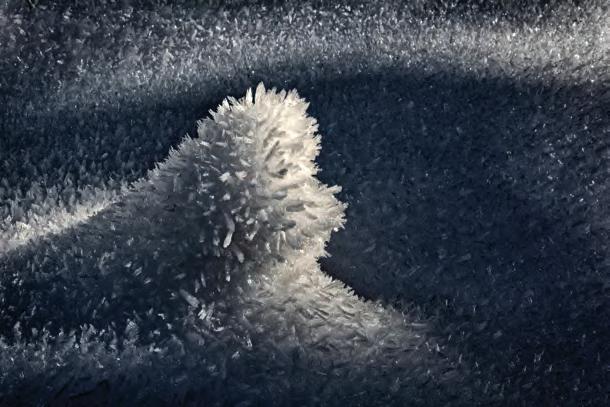
disappearing
Ann Dixon
Scenes from a Wet Life
I.
Puddle-stomping morning walks to school, fog horns pulsing through mist so thick it drips. Warning shrieks among girlfriends splashing knee-socks up to our knees. All bets off with boys. Watch out!
Soaked saddle shoe and penny loafer leather, drying to a classroom of feet just in time for noon recess. Aroma of hot lunch on trays
and socks, still moist, steaming radiator windows.
Wild storm nights, listening to gusting deluge batter the attic roof slung low over my bed. Toe-walking the sweet cedar ceiling slanting between dry and downpour, each board a familiar step I stretch to reach until
tempest-driven, slip-sliding into dreams.
80 CIRQUE
II.
Ice Dog
Matt Witt
Planting Doug fir in Coast Range mountains’ daylong drizzle. Dry enough, almost, inside rubberized gear. Green bonnet shedding moisture like a sturdy limpet. Jacket and pants, tough as the thwack of vine maple, crumpling with each bend of elbow and knee.
Caulk boots dried and greased to cure by the woodstove. All the dark nights long water drumming the tent top, cascading in rivulets, even streams. Canvas roof slanting, thin membrane between dry and downpour, shielding dreams of moss and fir boughs until morning
dew beading steel toes like iced berries.
Several lives later, Kachemak cloud burst plashing onto deck boards, calling through insulated walls, sturdy roof, and closed windows. Each splat a concentric bulls-eye, a shot of ripple, random and contained. Each drop a memory too slippery to hold, a voice in the wet green choir
drenching the day beyond the glass door I open wide.
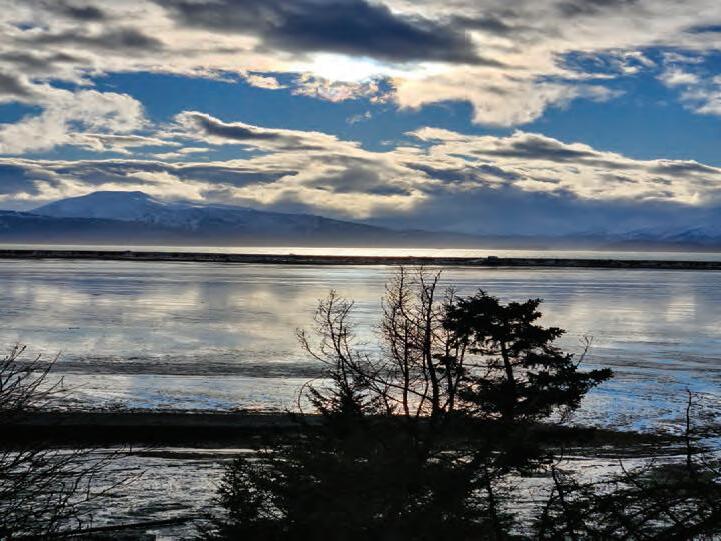
81 Vol. 13 No. 2
III.
IV.
Clouds and currents on Kachemak Bay Janet Klein
Amelia Díaz Ettinger Siletz

River Pantoum
Aechmophorus occidentalis
broken glass waves
refract sky and shore
a medley of gray and black moss the grebe patiently pauses
refract sky and shore
her mate to land along the way the grebe patiently pauses while the water rushes swift
her mate to land along the way such a simple request while the water rushes swift the wait grows woeful
such a simple request but even the shore feels her stress the wait grows woeful and it distorts her double echo
previously published in the 2024 Oregon Poetry Calendar
Leslie Fried
History Lesson
“Plus ca change, plus c’est la meme”
It’s the usual Saturday night at the Yukon Bar the same cast of characters hunched and silent shrouded in hoodies the Brotherhood of the Bay the had-a-few-too-many worshippers of the big fish casting side glances towards my end of the bar,
I’m drinking green tea deep into Janson’s History of Art inhaling the spirit of Michelangelo marrow of genius under the campanile di Yukon dollar bills taped to the beams by pilgrims from Nicaragua and New Jersey signed Hola from Nola! Wassup from Wendy in Wichita!
82 CIRQUE
Virginia
Elizabeth Belanger
Damn I love these guys their ciggies on the sidewalk between drinks basking in jukebox misery they don’t judge me for bringing my book to the bar mostly they are curious. The quiet one with noble chin and huge hands blistered chugs his beer most nights and wakes each morning to grip the oars brute strength arms longer than most mans the skiff from harbor to bay can skin a fish with his eyes closed or cut my throat without a blink blood blood everywhere,
Dio salvami I know him! here on page 141 the Dying Gaul in agony from the killing thrust naked muscles taut feet and hands straining to hold his torso upright heroic head hangs down crushed in the battle of Pergamon 230 B.C. “they knew how to die barbarians though they were,”
A girl in a dress at the end of the bar and a shawl of swirling indigo wrapped tightly ‘round works the ships regaling guests with tales of whales and glaciers their beauty and banishment a girl in a dress the color of night sea
wine-dark mysterious tense sits straight, face white a chalkboard with battle map but for a caress of pink on lip and cheek offensive counter-offensive capitulation,
La Delicata, page 239 knocked about for two thousand years the maiden from Pentelicus born in white quarries raised molded and mounted at the Acropolis to honor Athena goddess of battle strategy then thrown down and buried broken at thighs both arms missing fragment of head missing destruction by war by weather marble as flesh still standing,
Fish man you are brave a soldier still standing over black seas in battle for scaley prey girl in a dress you are queenly a wine glass your scepter its nectar from wormy flower teaching me history is yesterday yesterday is today,
I close my book sit back end my musings with a yawn and exchange my cup of tea for a bottle of nut brown.

83 Vol. 13 No. 2
Broken Sandra Kleven
Christien Gholson
Bees, Faeries, Souls of the Dead, Maitake Mushrooms: how the world was made
When I was five I was swarmed by bees; a blanket of bee bodies covered my head, torso; bee bodies searched up my nose, circled
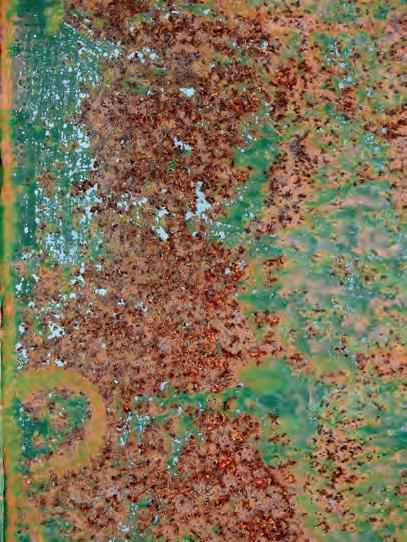
the roof of my mouth, spoke to each other inside my ears. I am perpetually caught between the terror of anticipating a thousand
stings and relief from feeling such closeness, the weight of all those bodies who had chosen me, chosen to touch me, cover me,
in a way that human beings, up to that time, had not. I still feel the brush of wings and leg-tines against my skin on the edge of
sleep. For weeks afterwards, late at night, I saw small figures with transparent wings spiral around the spindly apple tree in our
tiny backyard, each one able to generate their own wan blue glow, as if they had swallowed a sliver of starlight that had been hiding deep inside sandstone since the Cambrian explosion of life. For years I believed faeries were the shape bees take when they sleep and dream. Sometimes I think they were the souls of dead bees who had foreknowledge of all future pollinators, trying to digest and decompose their fate, before all the various plagues settled in. No answers, then or now. I still see them. I believe you do, too. Through mist after a night rain, in the ethereal almost-light beneath damp oaks, conjured from water, sorrow, invisible spores.
When we move slowly towards that light at dawn, sometimes we find clusters of small spoon-shaped gill-less maitake mushroom caps, yet another shape the dead take, sending us endless messages from the underworld.
84 CIRQUE
Pallet Jim Thiele
David A. Goodrum
What We Bring to the Ocean
On our approach the growing sounds of white crested waves whomping distant outcrops so much w I n d b l o w n sand wide-winged gulls screeching
and the song of undulating water over rounded stones. Solitary listeners attracted by narcotic tunes we pause grief sinking into sand.
Before our burden of inurned remains is tossed to the wind
we voice half-lives of remembrances caught in slack water pockets rough waves quieted for the moment

the salty ebb laying bare gooseneck barnacles clamped limpets
and the pantomime of tide pool stars.
Jim Hanlen
Between the Creases
I stand behind Dad and talk to his caregiver, cutting carrot sticks. Dad sits at the dinner table, busy, shuffling his family photo cards.
He stops and fingers a photo, a picture of my son, not seen in years. My son is balding now. Dad treasured him as a child.
Dad folds it over once, then folds it again, shaping a T crease. He folds it again, setting it aside.
85 Vol. 13 No. 2
Matt Witt
Stacks and Spray
Scott Hanson
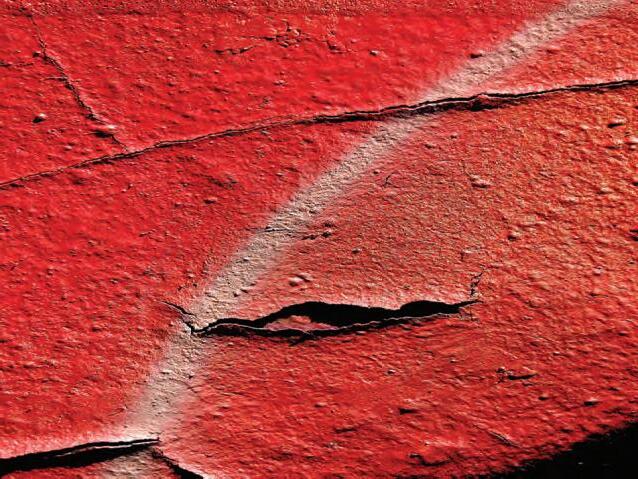
A Middle-Aged Love Story in Haiku
How’s the torn hamstring? Pretty much healed, but gets tight when the weather’s cold.
How does your hip feel? Replacement side is better but now the other…
How’s the hernia? Feels OK when I ice it. Groin like rotten fruit.
How is your bladder? Interstitial cystitis. Mostly good, thank you.
That party’s tonight. I don’t want to be out late. It starts at six, but…
You make the salads and I’ll fry us tuna melts? That sounds much better.
86 CIRQUE
Jim Thiele
White Line
Lesley Rogers Hobbs My
Son’s Namesake
In the foothills of the Dublin mountains grows a fifty-year-old chestnut beside the lake where I swam with my cousins. Their father (my uncle) is reserved, not given to softness or sentiment; he doesn’t believe
in the need for I love yous.
When I stayed with him and his oldest son – a man who will always be a boy — the leaves created shade and welcomed me home. There was a rigid schedule that soothed my jetlag — meals at 8, noon and 6 (tea with two digestives at 4.)
He visited his wife at 2.30 every day
except Saturday; I tagged along, always wanting more than she could give. In 2018, my aunt died which freed up his afternoons, though his Saturdays remained the same. A year later, his son died and
we buried him beside his mother and brother.
A cleaner used to visit weekly but she moved and now dust bunnies gather in corners and blue toothpaste smears the sink. I no longer stay with him; instead, he cooks me lunch and we sit under the tree he planted when
he was a young man unfamiliar with
the silence of loss. When we part I tell him, I love you. He presses three conkers into my hand, And I you, Les, and I you.
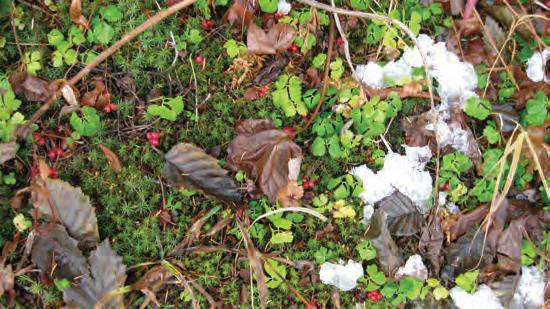
87 Vol. 13 No. 2
Nancy Deschu
Tundra, Chugach Mountains, Alaska
Brenda Jaeger
My Response to Lorca’s Question in My Dream
oh, where is my blue moon?
follow the rocket ship down to earth and look up without my blue moon my canvas would be empty either I yield to art or go to sleep and never wake
I am rocketing in the dark one hand mixes the blues of my dreams the other hand steers the wheel I choose paint
I embrace my chase I choose intuition
I paint the blue moon
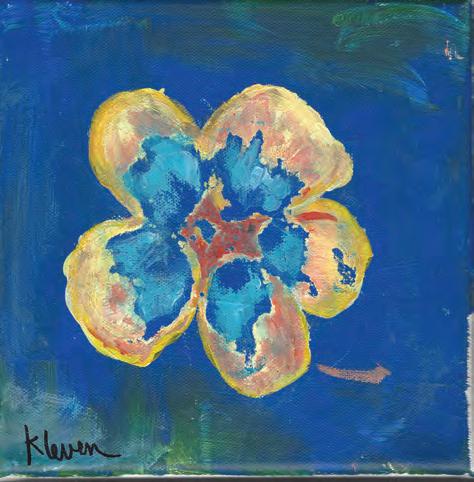
I choose imagination
I never stop
I am so happy
I am so happy
I am so happy
Marc Janssen
The Clock Has Lost Its Way In The Sisyphean Night
Its red numbers jumbled with tangled arms in exhausted electric half-tones. Nodding cars pass solitary and unblinking, They stop here, a rest in their pre-dawn pilgrimage Because everybody is going somewhere at this hour, And at this hour, no one is going anywhere.
The night people, the shadow people
Who look and smell of deepest nighttime, without the niceties of dusk jasmine or nightshade, But gas, and beer, and smoke make them
Barely human, transient.
And I, though motionless must be one of them
I look at my clothes, my hands on their money. Little separates us,
Just bullet proof Plexiglas
A few books
And my yearning for sleep.
88 CIRQUE
Sandra Kleven
One Flower
They sometimes make me think of that old drunk at the Trailways station so long ago.
He missed the seat of the molded plastic chair
And sprawled into the still hissing snow
Righted himself and brushed some of the crusted white from stained pants. Red eyes dumbly scanned for us behind him, lurking in the make-shift station: A converted second rate motel room.
I knew it would be trouble when he first came in. The smell proceeding him twelve feet;
Urine, cheap whisky, beer, wine, sweat.
Teetering on boots half-laced, their ends crusted with ice. Both knees wet from the ground.
Rotting breath, muddy hands and hair; Mumbled the town he wanted to go. Charles gave him his ticket.
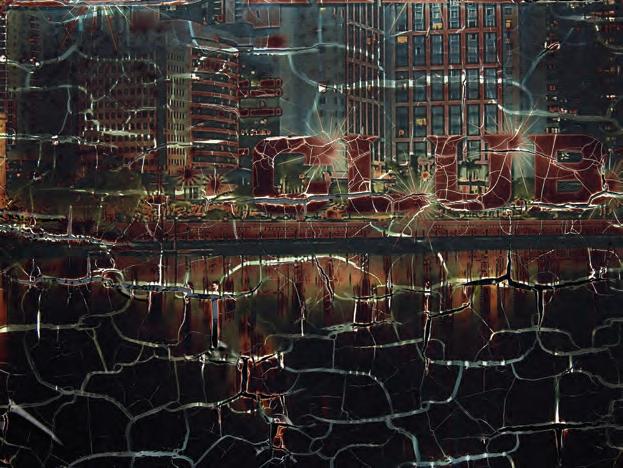
Now the bus has come and gone.
The driver refused to take him and the police are on their way. And with the police gone now
All that's left of him is the disappearing signs of a struggle left in still falling snow.
And Charles turns to me and says, "All he wanted to do was go to Susanville."
How many more men just want to go to Susanville, blind drunk, suffering, wet, and cold. Little separates me from him, only years and a few dollars.
Every day at the pumps I see him, wandering the streets or driving.
All any man wants is Susanville, with all the warmth, home, and comfort the name implies.
89 Vol. 13 No. 2
Jim Thiele Distopia
Jaqualyn Johnson
Slaughterhouse
Bulldozer belches from wounded woods
Claws prey jaws grind autograph despair in dirt to Gnaw ripe calves of hoop-skirted Ponderosa Pines. Animals flee. Silenced crows circle east.
River of Pleas drained dry silt skinned
Dismembered giants in fragrant graves. Bruised bodies lie like splintered pick-up-sticks
Fallen ladies among carcass-crushed fir trees.
Chains saw. Crippled stalks. Broken arms. Branches splayed. Leaves swayed. Help
Girl who stayed too long at the party her Blindfolded fate, a fecund forest. Man deflowers her virgin trunk Bark peeled raw in some bedroom cave
Rust stained ceiling bears witness sagging curtains
Undone he thrusts and pumps
Rhythmic sighs
Punctured cries
River of Tears heal hollowed hide.
He laughs at her
Zips his Levi’s Chugs a beer Fears nothing no one
Witness Supremely Courted justice tarnished
Gavel pounds tainted past Never mind those
Skinned women barren bodies silenced in a field of violets
Where the Slaughterhouse once stood.
Susan Johnson
This Fourth of July
Endowed by their Creator with certain unalienable Rights that among these are Life, Liberty and the Pursuit of Happiness
We rise to first light across the ridge, this day that yearns to affirm the selfevident truth that all are created equal.
Only song of chickadee and grumble of crow break the quiet, silhouettes of pines aglow along the rim. And sun spills its brilliance,

the self-evident truth, pours abundance on all, onto back of black bear, broad wing of blue heron, green bud of huckleberry, eye of every hummingbird.
And we? We too yearn to affirm that all. That all. Today we march for another unarmed black man, for another unarmed black, for another unarmed, for another.
90 CIRQUE
Lindsey Morrison-Grant
Orb 1
John Kooistra
I Love This House
its heavy beams, the ceramic tiger on top of the cupboard ready to leap at a plant's innocent throat.
From the next room comes music bright with the trumpets of morning. It brings the coffee and like a servant or your mother has nothing but good words to say.
But it’s not just the house and music. It’s everything: the sweet air outside the window, the dog asleep by the door, the daughter reading at the table, her face in some other room.
Downstairs, my son's pillow has him by the lapels and softly tells him a thing or two. Though the sun is searching for him in dreams he can’t be found.
While these beams will hold the roof up for two hundred years another harmony makes music here.
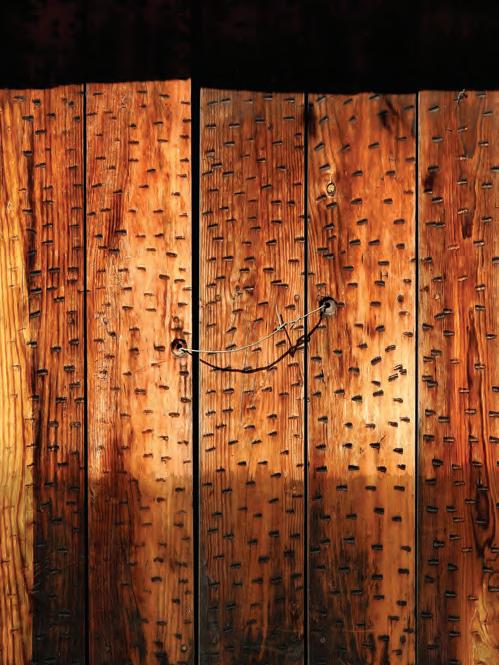
As if the Universe said, "Take these creatures and find them a good home."
And everything did.
91 Vol. 13 No. 2
Jim Thiele
C Fence Wire
Gary Lark Hannah's Berry Patch
Hannah Grove stood well over six feet and handsome as any in muck boots and purple fingers, causing Ben Claypool to say he wouldn't mind using a stepladder to give her a kiss, and her saying she could bend a little if she wanted kissing.
She had her own label, Hannah's Berry Patch. Boysenberries, blueberries, Loganberries, lingonberries, Arkansas Blacks and Currants— her jars of jams, jellies and syrups could be found across the county. Her boysenberry syrup graced many a table.
The hen house and rabbit hutches, she called poop machines, supplied manure for the rows of berries, and protein for her. There was a rhythm to the seasons— cutting old canes, weeding, harvesting each berry as it came.
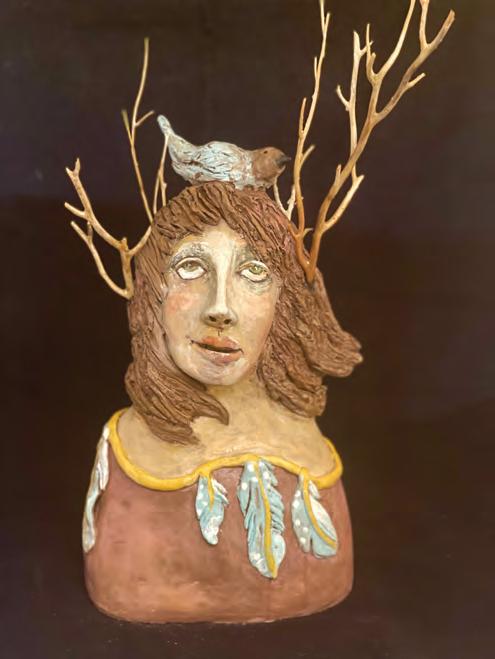
Monthly dances at the grange brought out hidden talents with fiddle and guitar and piano, and Hannah would whirl a different partner each dance but disappear before the final waltz. An eye or two watched her leaving.
Her climax season pulsed with a frenzy of canning, canning, canning, jars upon jars in cardboard slots stacked in the shed and delivered throughout the year to waiting tongues. Her love life remained a mystery.
92 CIRQUE
Monica Devine
Wendy
Eric
le Fatte Steady State
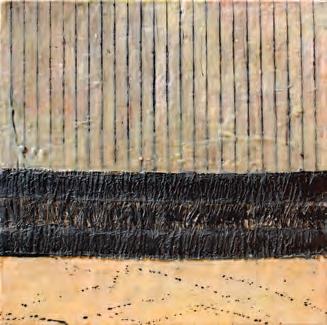
Against the stationary sky in the sagebrush canyon, resolute geese fly in a perfect V to the south for upwards of a minute. Then they waver, reconfigure, invert their formation and wing north with conviction. They splash in the heart of my field of vision, precisely where they started. A blue heron takes no notice. I’ve watched him dip his beak at measured intervals like a seesaw in the shallows. I’ve heard the calls of canyon wrens ascend rock walls and stick their wheezy landings. The lower Deschutes has rushed past for hours as though it’s in a hurry, while far above a peregrine with time to kill practices her circles.
Linda Lucky
Love Of A Booth
My friend says that I am the only person he knows who has two booths in a house and I’m not in the restaurant business
I loved the booth my father built against the wall of our garage Two posts supported a roof over it so we could play there in the rain
A booth means no chairs moving noisily about you slide in and stay put a booth invites lingering the conversation feels more intimate in a booth
In the house put a booth up against a wall and hang a sconce for atmosphere put a booth up against a window and enjoy the view
The backs of the booth are curved for comfort in long sitting bring on the wine and the crab from Dutch Harbor we could hang in there for hours
Booth people gravitate to booth people to this day at any restaurant in town any time we gather to meet we agree to this one command first one there gets a booth!
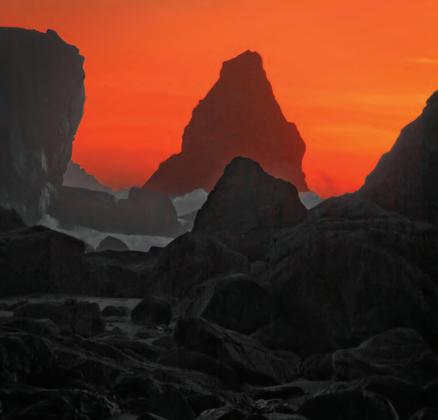
93 Vol. 13 No. 2
Sheary Clough Suiter Boudoir
Matt Witt Sunset Shapes
M.C. MoHagani Magnetek
Falling Star, Make a Wish Gumbo
In Memory of Colleen Wheeler
Before the sun and the creek rises
Up for auction highest bidder yet priceless Was that smile. That smile that illuminated With its own kind of brilliance fated
To fall from the sky like a rampant asteroid
Pummel the lackadaisical apathetic disregard That stood there and watched a falling star
Disintegrate into dust below detectable radar
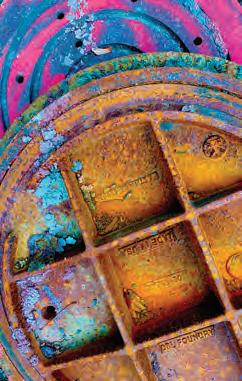
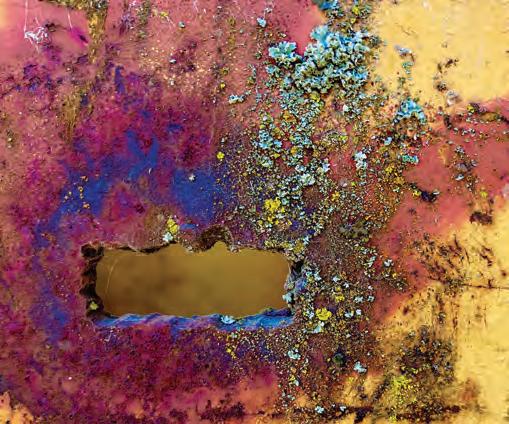
Until sorrow thickens air like filé powder
Burning browning roux butter and flour
Slow cooking left behind hearts
Boiling simmering tears for a soulful sweetheart.
David Mampel
When all else fails
A General Strike has been called at 2:18 p.m. for nobody but this pen, two chocolates, a cup of tea and a plastic folding chair I painted blue to match the fence behind my caretaker’s shack.
The chair, table, a protestor sitting with lumbar support, barefoot, surrounded by gopher dirt piles on City Light field, scattered peanut-shells, jet-feathered crows bopping heads on grass beneath trees and a jerking tail from a brown squirrel thief.
Morning coffee comes back to me now, a victory cheer for this critter crowd.
The strike’s been called off, an hour and ten, concessions made across the picket page, a bloodless negotiation, a livable wage.
94 CIRQUE
Jill Johnson
Punched
Jill Johnson ManHole Covers
Malia Maxwell
Side Effects
Days after treatment, it’s still hard to eat. You pat your stomach and say it’s for the best. Breakfast time: the two of us take our seats.
I sit across from you, clawing the sleep out of my eyes. I chew fast. Your turn next. Days after treatment, it’s still hard to eat.
You don’t stop cooking, I mean flashy feats from celebrity cookbooks, crepes, omelets— breakfast time: the two of us take our seats.
Digging through iris bulbs, a squirrel squeaks— empty-handed, he turns back to his nest. Days after treatment, it’s still hard to eat.
Some days nothing’s on your plate. I squeeze your hand instead of broaching the subject.
Breakfast time: the two of us take our seats.
We watch squirrels every day—for weeks— till winter turns the world white, senseless. Days after treatment, it’s still hard to eat.
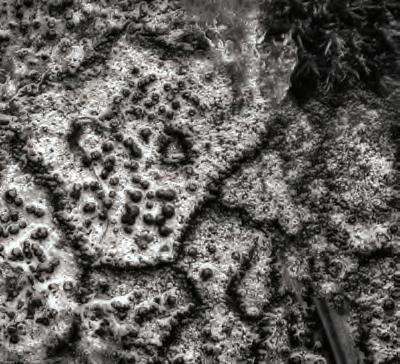
Breakfast time: the two of us take our seats.
David McElroy
In Which Mrs. Freizinger and Louie Adams Are Revealed
The Holy Ghost and I saw her panties at once when Mrs. Freizinger caught the spirit and threw herself in the aisle. Her dress hiked up. She waved her hands, lay writhing, and called out to Jesus, “Take me, forgive me, take me.”
Ed Sprague, who had piles so bad the inner tube he sat on was a comfort, called out “2-0-4.” His favorite hymn, “Hold the Fort.” Someone speaking in tongues barked like geese bursting up from a marsh. Mrs. Carlson whanged the zither, and we all sang our sinning hearts out.
Built like a twisted sweat shirt, Little Louie Adams jumped up for his biannual testimony beside his stunned wife Lucinda blowing her nose into a pink hanky. “I had a one-way ticket straight to hell. I smoked cigarettes, I drank beer, I consorted with scarlet women.”
More hymns, the singing and singing is a healing thing. And so is this throwing to the ground and pink rump rounding to the crowd, and to stand up and say twice a year what a cad, what a cad you are.
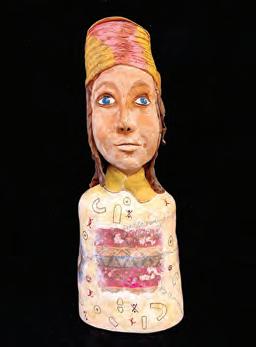
95 Vol. 13 No. 2
Monica Devine Tribe
Matt Witt
Frozen Ground
DC McKenzie
Untitled Poem no. 238
Edward Teller has died, at last, I shall curse him no more.
Still, I want to send him dead roses. Petals fetid, craven thorns and all, blossoms fattened on brine and nox. Yes, and with sick, withered leaves tied demure in a pink cardboard box.
For siring the hydrogen bomb he deser ves no less.
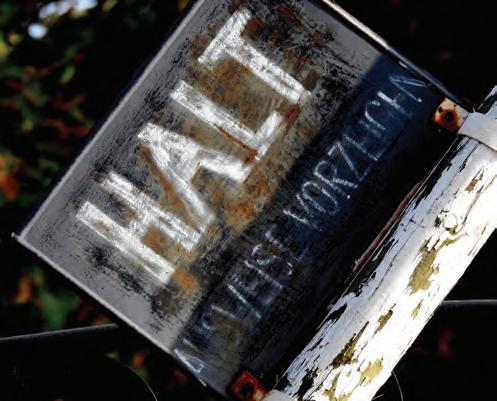
By now it has been explained to him that security is a fabrication, a rank superstition; that we can neither love nor even live without consequences; that, like electrons, life moves in a circle and what goes around…really goes around.
By now Edward has slurped the quark soup of our beginning and found all of his answers.
Maybe there are no superstrings to bind our hands. But perhaps there should be…
From Edward Teller, at least, there will not spring any further ghastly surprises.
He has become glass without bubbles. He has been struck on the Soul Collider —split, fissured, unharnessed
and I shall not curse him for he has enough to worry about as it is.
96 CIRQUE
Jim Thiele
Gate of Hell
Karla Linn Merrifield
Litany of That Time of Year in Kent, NY
The October in me awoke this morning with plans to thwart.
Too many leaves tatter the lawn after too much bitter wind.
The October in me aroused this morning not blood, but chill longing.
No fire — only low embers smoke in the old woodstove.
The October in me stirred this morning like feathers rustling in my heart.
Vees of geese veer away on a southern skyway now.
The October in me dislodged this morning my remaining cobbles of stillness. Ontario storms into shore, restless, greedy.
The October in me thinned this morning into glassy ice, brittleness.
First snow glazes moss and lichens and limns the grass.
Leaning into the maple tree, I witness the season succeed in laying claim to impossibilities. Coming November promises grayer, colder mornings than this.
wind chill, winter now ice-snow off Ontario: red squirrels hide
chickadees ride bare limbs in wild gale, clinging; hunger season strikes

97 Vol. 13 No. 2
~~~
Donald Guadagni
Winter Forest
Al Nyhart Montana Barn
It leans a little, tilting north toward the Bridger Range, its cracked weathered boards wearing their best silver patina.
In its uselessness the west wind refrains from taking it down, only teases the old barn with frequent gusts that rattle loose the rusted tin roof, blowing pieces of it down the hill & into the creek.
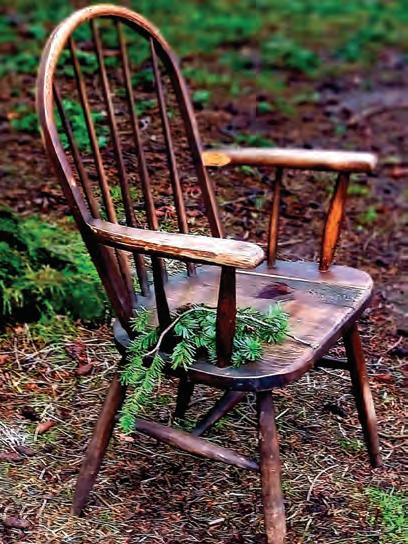
If I could forget the world & know the name of the horses who slogged in from the field at sunset; if I could smell the sweat on their wet backs as they entered the barn for their reward, then I would know how to be useless.
Mercedes O’Leary Together We Break Coffee Pots
—for B
Another one broken: it spits and snarls steam, threatens to wake our daughters. So, we pour boiling water over a basket of fine grounds. Dank black drips into the pot: we want something closer to silt than coffee. Makes middling thoughts appear like epiphanies. We are like bad insurance agents, sitting side by side, calculating the risks. Avoiding any more doom. It mostly worked. But still, things break with time: the thirty-year-old heater won’t be serviced; the shower requires pliers to turn off and on. Last week a water bottle rolled beneath the truck’s brake pedal. Accelerating to my demise, suddenly, it slipped back. By dinner, I had already forgotten my near death. You suggest getting a French press, but I’m still burnt about the one that spontaneously shattered fifteen years ago. We’ve tried hard to get it right, but still, there are gaps, our failing to each other, silences that replace conversations we vow not to repeat. Doom, it’s never what you think it is. Its monotony blinding us to fissures, the ways we stay the same while everything breaks around us.
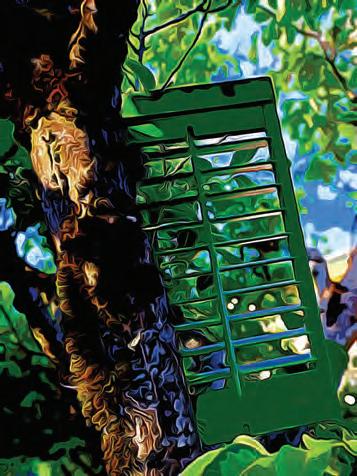
98 CIRQUE
Lindsey Morrison-Grant Park 7
Lindsey Morrison-Grant
Shuttering
Francis Opila
High Desert Rendezvous
When do you come out, my silver crescent in autumn sky? As afternoon wanes, I search
in fevered scrublands, circled by prairie falcons, red-tailed hawks, sage, juniper & prickly pear
amid billowing clouds & flash floods, I scramble up craggy rock canyons to a plateau of boundless sky.
At nightfall you rise in the east, croon in frigid luminescence, your love surging yet distant. I long
for lunar dance, for more than a tease of your fullness, serenaded by wails of coyotes in harmonious heat. I watch
Venus kiss your lower vortex. No matter the consequences of dawn tell me where to meet.
Shauna Potocky
This Clay Earth
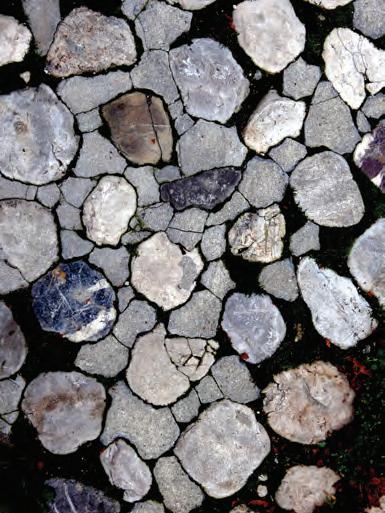
O’Donohue speaks to us of being clay.
It is a thing I have felt in my skin that we are Earth. No material thing will keep us from being Earth again. We are universe and god spirit and tangible in every moment. We are clay riverbeds of blood tissue meadows plasma wet, where the spark of our needs our thoughts our desires turned action push the seed bed of our lives into being.
99 Vol. 13 No. 2
Jim Thiele Mosaic
Diane Ray
Pumpkin Alchemy
Hunkered in a lead-gray loneliness with a windstorm breaching the suburbs, so, what if I dash out in my good red wool, my coat of encouragement before touch down?
Downhill I pass four rose buds and the elegant fade of hydrangeas, once fall’s improbabilities to a New York soul adrift. Hatted, scarved, gloved in my mobile cocoon, I step into Green Lake, Seattle’s processional with companion walkers, runners, rollerblades, bike riders unfazed by slick or slippery. Wetniks by now a whatever, nonetheless, I open the lone umbrella.
The bald and glistening creature before me sports shorts among the gortexed, and everyone circles round,
Blue acres of lake, and the natives enfold me—Doug Fir, Canoe Birch, Red Cedar, Quaking Aspen. And a splendor of interlopers before it was PC to ban tree citizens of the wider world like this Cedar of Lebanon, Sweet Gum, Oshima Cherry, or Tupelo,
non-natives all and flourishing, Like Canada’s gaggle who strut, swim, and fly here. And stay. Like me, wandered Jew, who nested here, too. I pass a neck-extended heron, her long gaze regally periscoped up, and a floating flock of coots
when I am stopped short by the boat house. There’s better than a hundred pumpkins: wet, sheen’d, ribbed, stemmed, circumferenced into an orange mountain range. Next to giant chunky beads necklacing a long-necked cedar.
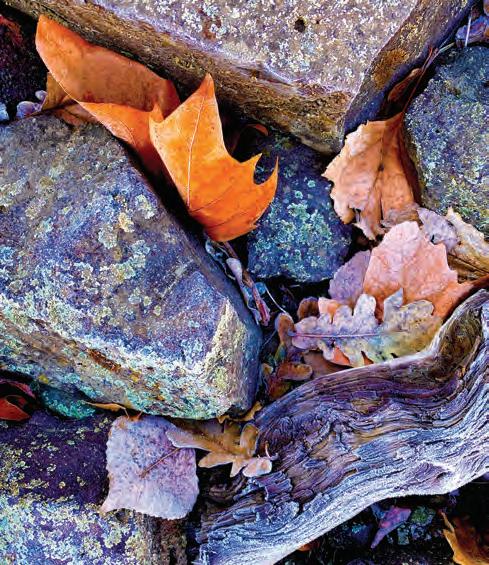
The lone albino squash dangles like a pendant cameo holding the illusion of a mini-spruce veined through palest rib and rind.
Is all this here by artifice or accident?
Leavings of Halloween dumped, then eye made art? Or chance chanced upon and played with, left to the future like sand castles?
100 CIRQUE
Jill Johnson
River Edge 1
Bethany Reid
In the Beginning
Willapa Hills, Southwest Washington State Everywhere, the smoke of other lives.
The farm belonged to our maternal grandparents and then to us, a quarter section of land logged
in the nineteen-aughts. My grandpa’s team of horses, my grandmother’s two-acre garden, their fifteen children.
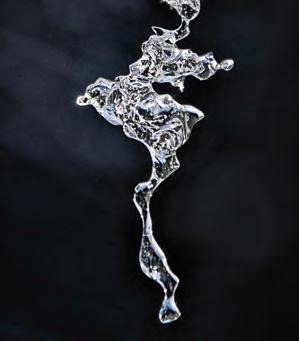
I knew the farm growing back in trees, seedlings sprouting in hayfields. We ran from fence-line to fence-line
every summer day, the farm peopled by our small herd of cows, our pigs
and dogs and feral cats, and something,
someone more, a thin membrane stretched between our days and the ephemeral past.
Strawberries freckled meadow grass. Above stanchions in the old milking parlor our mother and her sisters had penciled
names of favorite cows, Daisy, Berry.
What did we hear in the silence between notes of creeksong, birdsong, rain on leaves, shadows of black-tail deer,
beaver, coyote, bear? Had Klallam or Chehalis children once built
stone dams in our creeks? What was it belonged only to the land itself? What was it
that was ours?
Richard Roberts
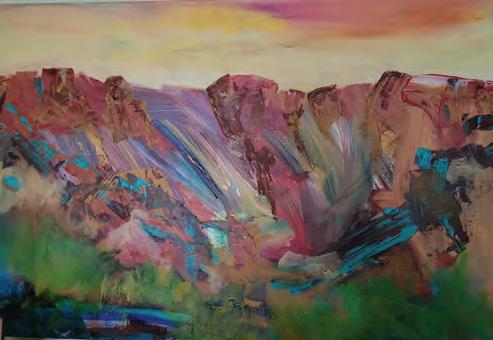
The First Blizzard
The snow so thickly fell pressed down the air and could not penetrate and formed an overarching stratum of itself high above Montana, shut out the sun and blueness. Our only light comes from its white. We skate well but cannot ski, and geese flying south bump their wings.
How shall we survive this dome from Canada to Yellowstone, from Bismarck to Spokane? Some North Dakota augurer must surely climb and bore a hole and monthly drop us news of national events and let escape the hearth smoke of our winter fires.
101 Vol. 13 No. 2
Nard Claar
My Valley
Matt Witt Ice Hanging From Tree
Barbara Rockman
New Year Beside The Playa
Great Basin, Oregon
My hands are small and sunrise vast. Pain stays in triangles between fingers. Old dirt stays under nails. My mother’s digging. My daughter’s smashed castle.
Sun just up and grief rises in alternating lines cloud and dust orange light and pond grass.
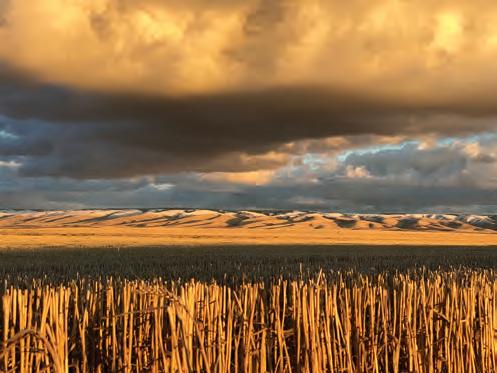
Night wind stretched strings taut and didn’t let go and when it did: rubber bands snapped back to cheeks.
Ricochet and slingshot. This dry lake bed, big as the universe, does not offer refuge: you have to make your own.
How fragile we are facing front straight into the new season with no old markers.
Nothing weather strips our crevices. All the layers of wool won’t shield us from what slams our flimsy gates.
Our doors no match for animals that pace and growl, wait until daybreak to push their tails and talons through chinks we’ll never putty up.
Frailty: our soft-boned destiny. We spend lifetimes layering insulation, talk and newsfeeds, somebody else’s business.
Ducks lift their wavering v, veer shore to sunrise. Shore’s fanged grasses transform clench to yawn.
Why not? It’s never the sleep of sweet dream, nothing we can do to grip against failure.
Monday asks for no one’s prayers, offers bird clatter but no wings.
Cloud called Do not look me in the eye
Cloud called Comfort a mother cannot wrap round her daughter
Afternoon rain natter and spurt, no true drenching. But it is the new year and God is close: rainbow over a snow-tricked playa, sun on chewed grass.
The thing is: you stayed long enough to see it.
102 CIRQUE
Stubble Afternoon
Jill Johnson
Mrs. Cooper, 1958
(after Kim Stafford)
No other teacher I know dyed her hair green for St. Patrick’s Day while we sat hands folded on desks, inkwells unused since we—with-it, slick fifth graders wrote our cursive with ballpoints.
We tried on grass skirts, leis, necklaces of shells from her travels to the gleaming beaches of Oahu. She played a record of Hawaiian ukulele music, while we swayed hula-ing down the desk rows.
Ocean surf whispered in our ears from conches. Our hands cupped a coconut she guided us to crack, drink the juice, eat the pulp. Using her map, we celebrated discovering our soon-to-be-50th state was all islands.
She read Greek and Roman myths to us because they were ancient and famous, and we students deserved to know what-was-what about Athena defeating Poseidon, Pandora and her perilous box, Atlas, shouldering the world.
She took us to Manhattan and gave us each real Strathmore drawing paper. Inside the Museum of Modern Art, she freed us to find a painting, photograph, or sculpture we liked, take a good half hour to sketch and write why we chose it.
She trusted us to go anywhere in the museum, just be back in the lobby at 2:00 PM to return to blah Yonkers. Though we lived outside the Big Apple, that school year, we stretched our mouths wide to relish the juicy bites.
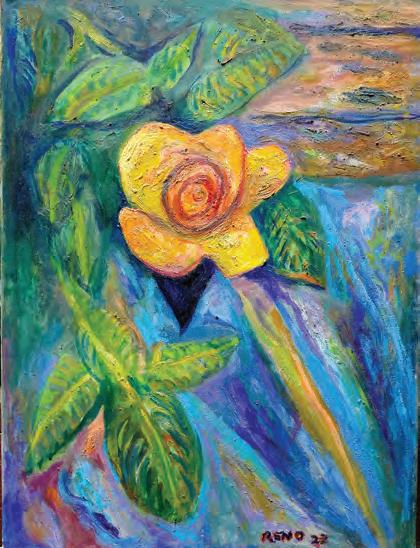
103 Vol. 13 No. 2
Yellow Modern Joe Reno
Lois Rosen
Seth Rosenbloom Harbor
There’s a watcher who watches me grip the wheel to remain inside the guardrail on the road— along the dented cliff, above the bay. Stop long enough and stare, the faces churn then foam into rocks.
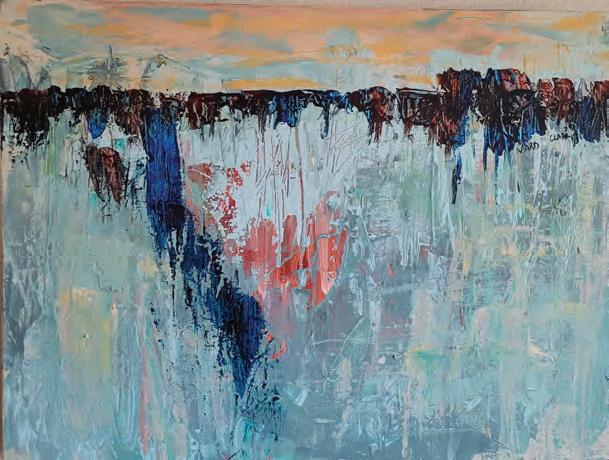
Drive, and with each turn, velocity demands one thing, gravity another. I know the singe of this gaze—
it’s always there, it always will be. What if I let go. And charge into the white sky.
But my foot falls carefully on the brakes and I take the left down the canyon towards home
where Gabriel plays. He buries me in cushions he hurls from the couch. Each wider than his pink arms
can reach across. His belly laughs above his Pull-Ups. Legs wobble atop the heap he makes, triumphant.
104 CIRQUE
Canyon Edge Nard Claar
Ryan Scariano O Beautiful Asteroid
Holly and Molly are identical twins. Even their mother can barely tell them apart, the only way being that Holly smashes every spider she encounters, while Molly, either leaves spiders alone, or relocates them to more suitable spider places.
—David Allen Dickens, Holly and Molly Save the World, Book 1
After another shooting, my 5-year-old nephew told me, if somebody is lying, it’s impossible for them to say rabbit three times in a row without laughing. This never fails?—I asked. No, it doesn’t, he assured me. I said, prove it, say rabbit three times, which he did with the straightest face I’d ever seen. It never fails.
Like how it rains right after you wash the car. Or how full moons amplify the crazy. Or Murphy’s Law or Xanax bars and Irish whiskey or blackout or only knowing a semblance of balance. I smoke weed and wonder about strident slogans and bumper stickers, wonder what Jesus would do or what Walt Whitman would do or what Bob Marley would do or what Frida Kahlo would do or what my mom would do or what I should do.
I climb the basement steps, with the spiders webbed into their corners, and imagine this is like the way an asteroid hurtles past earth—the spiders’ regard for me is like my regard for an asteroid. O beautiful asteroid, today I’m again walking past the news, past the only parents
I’ll ever know. The spiders are ignorant or apathetic or spiteful. Rabbit, rabbit, rabbit.
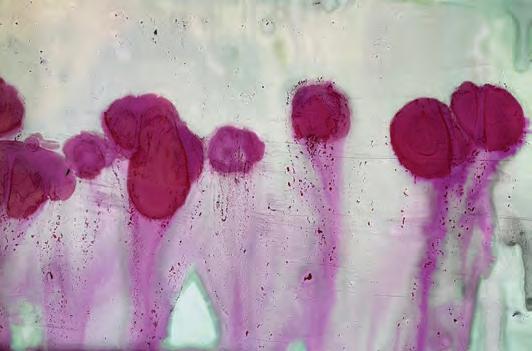
105 Vol. 13 No. 2
Cynthia Yatchman
Covidcolor 2023y
Tom Sexton Two Poems
Caw
A triad of crows sitting in a leafless tree chatting in Corvid about the day’s events while adjusting their glossy black gowns like oblates like magistrates. “Caw, Caw,” the one that looks like Johnny Cash insists. The others tilt their heads to look at me bent like a hook and making little progress through last night’s Labradorian snow. “Caw,” Johnny Cash repeats, “Caw, Caw, Caw.”
Linda Schandelmeier
For Our Brittle World

I look to trees anchored here in the winter forest, like ships waiting for crew. The path ahead unmapped. They are survivors, needing only light and water, the motion of the wind to sail the pale gray sky.
What about the rest of us, the sour costs of our lives that will us to be blind?
Small shadows of waking birds bring the morning awake. How I wish their voices could sing us whole.
Quiet
For John Kooistra
Thank you for your note saying my poems are so quiet some people don’t hear them.
I’ll take that as a compliment Years ago, I saw a wolf watching me
for a few moments from a clearing. My neighbor said it had to a coyote
not a wolf, but it had a wolf’s round ears, and it didn’t make a sound, not one.
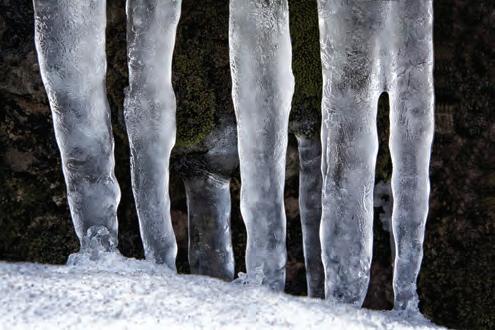
106 CIRQUE
Icicle Creek Matt Witt
Jill Johnson
River Edge 2
Craig Smith The Donut
I bought you a chocolate donut Because you looked despondent Sitting there on the curb Outside the suburban supermarket
You were a guy about 22 With a small travel bag And a gut-grabbing look Of dejection and rejection
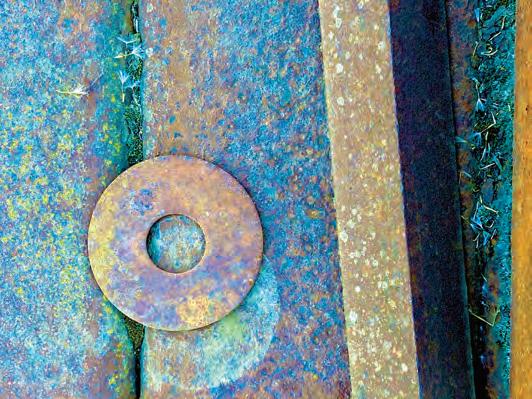
A better man Would have made conversation Or invited you to coffee And asked what was wrong
He would have tried to help By giving you his ear Or perhaps a 20-dollar bill I gave you the donut and left
My message was pretty simple: 'I don't want to hear your problems, but I hope your day improves; "Here, have a chocolate donut."
107 Vol. 13 No. 2
Lost Washer
Jill Johnson
Leslea Smith and Bill Wuertz
Fire and Ice
Leslea Smith (Voice 1) and Bill Wuertz (Voice 2)
1: I am from north and farther north, from west and farther west.
2: I am from south and west, then a stone's throw east.
1: I am from up and down the western edge of the country, but first from the north, my heart home, the Great Land, Alaska.
2: Through the mysterious algorithms that govern the Google searches of my emotions, the place I instinctively call “home” is a small desert valley in Southern California.
Both: I am from a place where it's hard to live, and when you leave, the blood remembers.
1: I am from a place in the far northwest called Southeast.
I am from an island named for a Russian trader three hundred years ago but called Shee by the Tlingit, people of the eagle and raven, at home with the gifts of the water.
2: I am from sun and sand, from sagebrush and saguaro.
I am from a pinpoint of green in a vast sea of rock and dirt, beautiful in its bleak austerity.
1: I am from “you can't get there from here”
unless you swim, float, fly or wait for winter to harden the waters.
I am from ships and skiffs, kayaks and ferries, from sea planes and bush pilots, from skis and sleds.
2: I am from “stop here so you can get there”.
I am from truck stops, fast food and mid-century motels clustered around a single interstate exit.
I am from pickups and semis, tractors and trailers, RVs and campers, golf carts and dune buggies.
1: I am from a watery land: water falling in big drops and droplets, stinging pellets and icy stones, and flakes (no two alike, they say);
I am from fresh water starting as trickles of ice melt flowing seaward through crackling cricks and mighty land-splitting rivers;
I am from giant mantle-crushing glaciers and ice so stubborn they call it permafrost; I am from saltwater gathered in seas and gulfs, sounds and bays, straights, passages and arms.
108 CIRQUE
2: I am from the river, ancient and wild, mighty carver of canyons whose broad alluvial floods spread layers of silt and sediment o’er caliche and stone; now a lassoed and hog-tied hydroelectric enabler of thirsty cities where none ought be; irrigator of farm and field, its precious gift meted out in measures of acre/feet to a patchwork of conflicting claims, leaving but a trickle to seek its home in the sea.
1: I am from rain-forested mountains lush with fir, cedar and Devil's Club, north to treeless tundra with its tiny flowers and low-bush berries.
2: I am from mountain, mesa and dune, their craggy faces unobscured by trees, their complexions ever changing with sun and shadow, now rose, now lavender, now chocolate.
1: I am from never night, from ever night, from midnight sun and Northern Lights that crackle unpredictably in arctic and subarctic skies, mysterious messengers of the power of solar energy to delight and amaze.
2: I am from heat-bleached blue-white days; from twilight ablaze with purple-orange-pink rays diffused through dust and rainless clouds; from clear ebony nights revealing stars like silver glitter carelessly spilled on a vast black shroud.
1: I am from northern people, Irish and Norwegian mostly, people who couldn't stay still – pioneers, claimers of prairie and tundra. I am from the unnatural harvest of natural resources, from gold-getting and tree cutting and log grinding; from oil extracting and pipeline building.
2: I am from Angles and Saxons, Vikings and Huns who long had turned their swords into plowshares; tillers of soil, Nordic braceros displaced in the great diaspora of Depression and Dust, a lost tribe of Protestants wandering forty years in the desert in search of the promised land. Both: I am from breath of the first breath, flesh of the first flesh, spirit of the first spirit, dust of the first dust…
1: …scattered all too soon on gales off the frozen Bering Sea, and Taku winds off Gastineau Channel…
2: …or carried heavenward upon the winds of Santa Ana.
1: I am from the same Hand that created water in all its forms, from ice to steam.
2: I am from the same Hand that released the river that carved the canyon and blessed the valley.
109 Vol. 13 No. 2
1: I am from the same Hand that waves the silk scarves of the aurora…
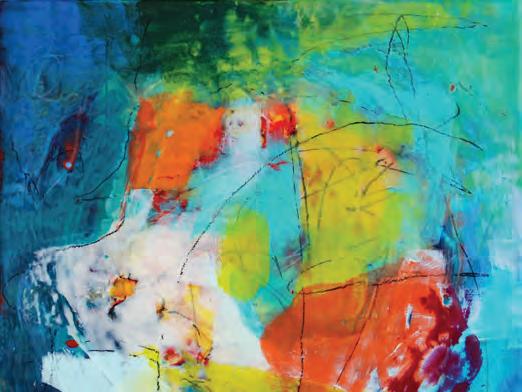
2: …that suspends the clouds that paint the mountains and mesas…
1: …that tilts and spins our earth…
2: …that sprinkles the glittering stars in the heavens…
1: …that names all the nameless worlds of the endless universe.
Both: I am from the Hand of God.
Wake Up Call
It is still dark in my house when Raven calls a warning dawn is near. I hear the two-note caw. A sentinel for the world Raven times his message. I stir, turn over, go back to sleep. His steady solo is welcome. I know there will be one more day to fold into my years.
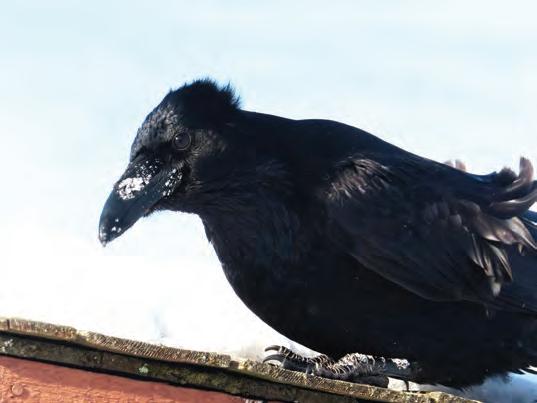
110 CIRQUE
Unbound
Sheary Clough Suiter
Mary Lou Spartz
Teri White Carns
Kim Stafford
The Big Empty
Some go to the sea so their gaze may venture far, unencumbered by roads or plans. Walking the tideline, they face wild essence of salt.
Some prefer mountains, a hut at road’s end where forest stretches unbroken to the peaks, so they can study a puzzle of twig, moss, and rivulet.
These are mystified by those who live in cities, in rooms, in cells on arteries of asphalt, skies tangled with wires, thought in gridlock.
I need the big empty east of the mountains, please—by night the next light on horizon’s hoop distant as a star. Give me the playa where I can walk blind to be lost and lucky.

 Kathleen Stancik
Kathleen Stancik
Yellow Columbine
Columbine in full bloom, pale yellow comets, tails trailing flames. Feel their sear, see the way they sail through the atmosphere, mouths open, rank and ravenous, a chorus of yellow throats gorged on hope, wolfing all that is left of our dreams. Taste the blade of their breath. How innocent.
111 Vol. 13 No. 2
Sandra Kleven Landscape Study 2
Nard Claar
Edge Of
Richard Stokes
Emily Wall Reads from her Breaking into Air
At the library we gather, four men among a drove of females, some pregnant. Emily jokes about reading birthing poems on Labor Day, starts with a found poem about the sound of fetal heartbeats, like feet running on wet sand, like hummingbirds in a snowstorm, like the sound of God, like horses, always, like hope.
Outside, the sky’s water has broken, fills the mountain’s wrinkles, drips from the library eves, Emily reads from Teagan’s Birth. You enter the room and see your granddaughter, crowning. Of course you knew when to come. Of course she knows how to push, how to breathe, how to reach down and pull her daughter up, up, into the light.
Emily and Lance Twitchell alternate reading in English and Tlingit of the birth of Lance’s daughter, a father’s voice in the sea of mothers, his desire for his daughter to first hear Tlingit. This is your language. This is you sliding wetly into my hands, your seal-soft mouth opening, and you have the most beautiful tongue … strong organ at the center of the world, strong voice at the center of my world. Gunalcheesh.
Outside, the limbs of a mountain ash droop with clusters of blood-red berries. Emily reads from In the Birthing Tub, Afterwards. Look at the broken blood vessels, in my face, in my eyes. Look at the torn door between my legs. We are not beautiful we are not lovely, but look at the way we are just beginning to shine.
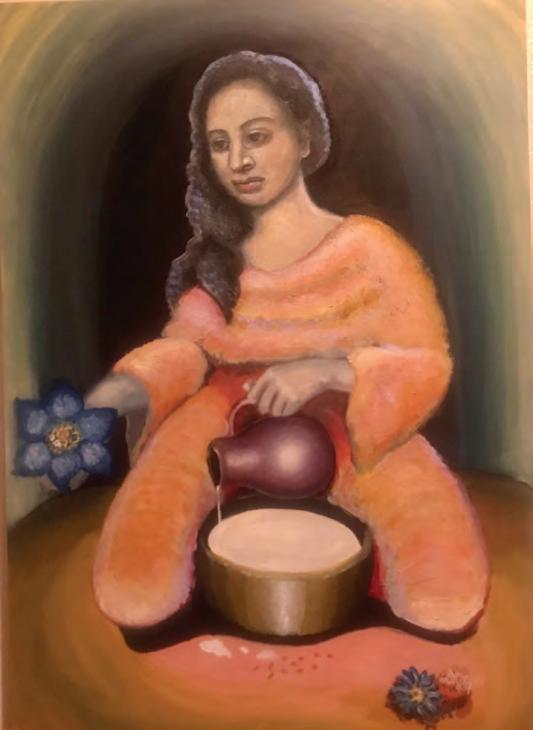
112 CIRQUE
Elizabeth Belanger
The Gift
Jim Thielman
Random Beauty
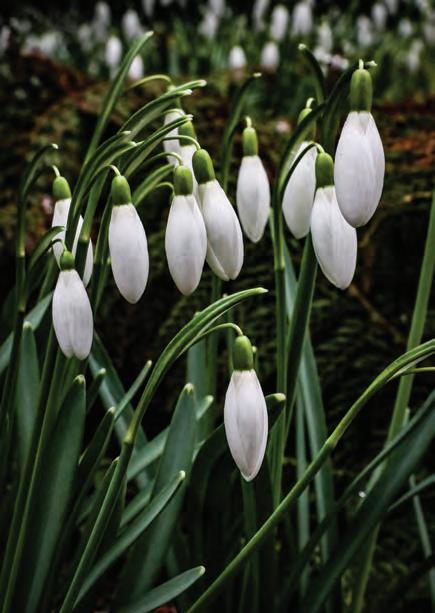
It’s how tiles in my house imitate natural stone with swirls and lines spilled, splashed or printed on the surface of clay.
Outside it’s the frosted tangle of tumbleweed, the clutter of a wild mix of trees torn by winds, or branches broken and left that way, like bones of wild beasts, ribs exposed.
In a land of chaos dreams awaken. Look long enough at granite countertops and see faces looking back at you, black dots become eyes, a smudge is a mouth and a subtle shape becomes a face of someone you’ve seen before. As a child, I saw faces in rough plaster on a ceiling as I lay in bed, or a monster by the window until Dad arose to quiet fear and led me to empty air.
We need chaos itself, like randomness of dreams, the surprise that catches our attention, the flow of water over rocky stretches of a stream. We can enter a trance state, wordless, where mother, who passed from us years ago, cradles a babe born last month.
We are seekers of wonders in a world whose complexity makes us curious enough to open door after door on a journey without end.
113 Vol. 13 No. 2
Jack Broom Snowdrops
Georgia Tiffany Two Poems
Sheltered In Place
You called them song dogs, painted them on road signs, carved them on church doors, twisted them from junkyard metal with elongated necks and engorged throats.
You said the moon emerged from their first howl and turned their howls to music. I listened hard for it. That was years ago.
Last night we thought we heard them out beyond Margret Eddie's place where lawns turn to prairie, and the last crossroad takes off east toward the foothills,
our bedroom window open to viburnum, crabapples, omens of a cold front bringing the storm that would seal us in. Then the wind all night,
all day, all night again, shaking branches free of blossoms, thousands of pink and white petals, choked gutters, confettied roads, patios, window sills,
our bed quilt heavy with petals. And still they fall, even after. We are familiar lovers lying together. Passion and words fold and unfold us gentler now.
Sometimes you say I sing in my sleep. Sometimes we pray to something unseen to save us from something unseen. But always the coyotes. From the quarantined quiet, we listen.
In The Night The Rain Begins
—for RBG
The smell of sleep around me and the sun burning out, basalt grates against the sky, September absorbing its grief, and that reluctant loss of heat.
Tundra swans out of the coulee, wide wings surprised by how heavy evening rides, attempt to inhabit a gesture upward, falter, and fail, eyes glazed with their turn from light we once embraced as what this land has loved and bled for.
I'm calling out, calling so hard my throat catches raw with sage, and rain, the first in months, begins as if I'd summoned it by some extraordinary will, the air above me flooding with the sound of rain.
Lost as any country now, as far as I can see mourned by these stumbling words. Winter waiting.

114 CIRQUE
Thursday
John Coyne
Lucy
Tyrrell
I witness
her eager, frenzied barking leaping, ready to run
musher folding my stitched webbing to place over her wren-colored head
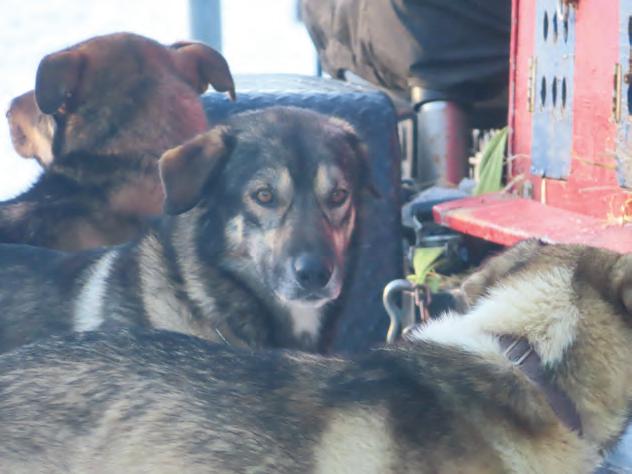
her paws finding the way to wear me
my red tug telling the size that fits her
brass snap of the tugline
brass snap of the neckline that links to mainline with husky lineup
autumn mud flung by paws
yellow aspen leaves spilling
thickening undercoats of fur
mile after mile of training
snowflakes accumulating
jangle of tags on collars
ears listening for commands
spruce trees lining the trail
booties protecting every foot
countdown to race start
painted lath trail markers
tuglines tight, pulling hard
spindrift of snow
swish of runners
musher headlamp glowing the way
caribou pumping over tundra
whiteout in driving snow
icy overflow to knees
green dancing curtains of light
Velcroed-on coat swaddles for minus 40 moose crossing trail, danger!
frozen meat snacks from Ziploc
caress from musher’s mitts for Dreoilín, but I feel it too
tongue lolling at trail’s end
curled copper coat sleeping on straw
seasons circling a dozen times
—too soon,
her stumbling legs slow
a warm place inside her final passage
I’m hung from a hook patina of her fur oils thick on my webbing
115 Vol. 13 No. 2
Teri White Carns
Devon Van Essen
Symbiont
The dying cow first appears as a juniper heavy with buzzards, then this single white egret a polite distance from the panting black mass in the shade.
Next hill over grazes the herd, leaving this one cattle egret, unwitting witness, to attend
while the cow labored, stalled, half-born calf died, dried in its blue sac. Glassed-over eyes, her breath short, the cow lingers, endures the hours, heat, desert wind while I
on horseback on vacation a thousand dollars from home, hurry past, the don’t-mind-me
hunch of a tourist just trying to get past not my problem to the beach.
This wasn’t on the website, prolapsed livestock, brute suffering with ocean view.
Still, that fragile upright bird, still as the needle whose shadow circles the dial, arrests my conscience, calls forth the child who cried
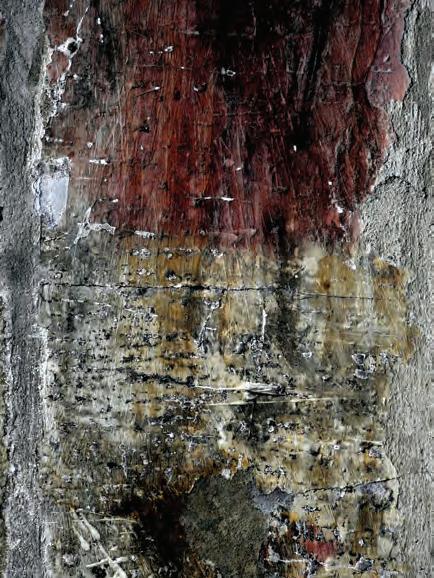
over pellet-felled barn swallows, hauled buckets of muddy tadpoles puddle to pond
cradled glass-stunned robins, searched for feral cats gone missing until
I learned not to ask my father such questions, not to feel for the frantic pulse of a moribund thing.
I thought I was grown now but I guess I still don’t know how to suffer
this heavy necessity, how to leave death to its slow, ugly accomplishment.
116 CIRQUE
Jim Thiele
Violation
Anne Ward-Masterson
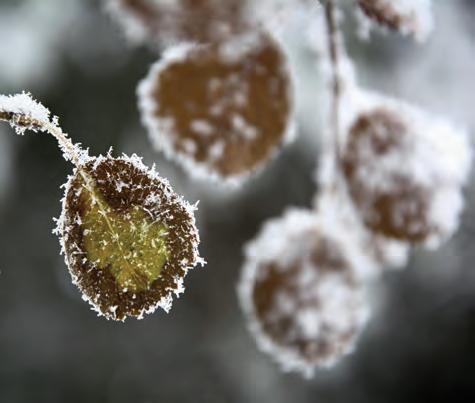
Fire Not Kindled By Men
I muddle through mid-winter, when most tasks are accomplished in man-made light. Sun peers over the horizon, 10:04 am, hidden by the mountains across Eagle River Valley. Until we get a peek: glowing orb rests in the South Fork Valley for almost an hour, then slips behind Highland Mountain. Sun sets, 3:35 pm. Full dark, 4 pm. Except, for the strings of colorful lights neighbors put up to add warmth to the sterile ponds streetlights make in the far-reaching night of December and January. Colorful night lights guiding us through abyssal winter. Once, we depended on stars for this. The street lights, meant to block out crime, blot out the constellations.
So, we create our earthbound approximation, homey waypoints on demand. When I need wonder unboxed, to sit in front of fire not kindled by men, I drive east along the braided Eagle River, park in the pullout near where the pumper trucks draw water from the ox bow in the river.
I lie on the hood of my Subaru, in inky early morning chill, bundled in a surplus sleeping bag and parka. Sing a sleepy call and response with Perseus and Cassiopeia, Hovering over Andromeda reclining on the southern horizon mostly obscured by the snowy Chugach Range; just before the long parade of headlights rumbling west toward Cook Inlet on studded tires, ends our concert.
117 Vol. 13 No. 2
Serviceberry Frost
Matt Witt
Allison Akootchook Warden
Attata sets the tone
sometimes secrets pop and unravel like sinew from the bottom of a boat or a mukluk
holding everything in so tightly and in these future times
unpacking as a shiny silver box sled (the ones) who carry the Elders in their blood and speak to them in the land of the dead have felt the protocols of sharing slip as a weight sinking down into Sumnas domain
she says it could be time reminds me of (the other version) of how the sun became the sun and how the moon became the moon
/the other story exposed as a cover to hide/ of what had become a worm passed down through brains or up the left side of Tuti’s foot
as you remember the g rated version of the sun and moon has no bloody breasts made into a soup for her brother to eat
a spectacle in front of the other men who were there to sharpen their knives (and we could just see how Tuqqaq could react) or his archetype
maybe it is his great great great great great great great great relative that made a copy of himself to witness the rebirth of palm trees in the Arctic
118 CIRQUE
and it appears that maybe Tuti’s biological grandmother is really close friends with the moon in the land of the dead where Tuti finds herself often
in dreamtime even naps push her into the depths grandmother stretched her face out wide a temporary moon mask that hid her husband who was just beyond sight a peek-a-boo revealed to their tutaaluk from here, he broke silence.
‘tell me a story about death, that one death’ he said, looking as if he was becoming more fully polar bear than human
but it is not our way to comment or take in appearances. a non-processing flat look. it’s natural that his face is more yellow and his wife can stretch hers out flat
(when needed) for effect.
and Tuti knew he wanted something very specific he was fishing for a story that he wanted to see if it could carry beyond veils
which felt like it could be rough waters going back so Tuti closed her eyes and said to her Attata and Aana (while breathing cold fog mist all around her heart space, hiding her heart in dense white noise.)
“I have too many too many too many stories about death. I have so many stories about death, I don’t even know which one to share. I have so many stories, I cannot even think of one single story right now.”
and somehow these words saved a life of a young man
as the people near took this as a cue. to tell their. own. specific. story. about a death.
119 Vol. 13 No. 2
that they had remembered they were helping her be released from and just like that she surfaced back to her dry cabin her virtual assistant, waiting yes Sumna, perhaps it is the time to pop
Lola
Not American standard, not hash browns, eggs and toast but raw chocolate unsweetened, sticky rice softened in a warm bowl.
She was mamma when my own mother called to her, Lola her Tagalog name, though neighborhood kids all called her gram.
We lucky true flesh grandchildren marveled at her steadfast no to our urges for her to secure a license. Brown legs strong, hands clutching coins,
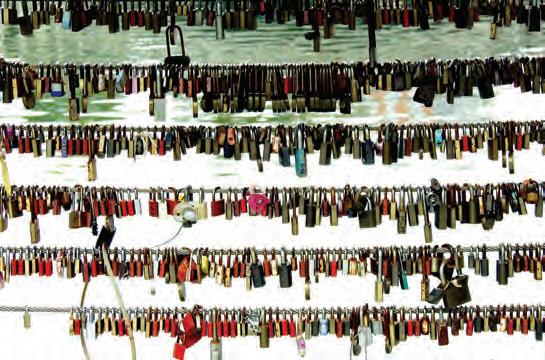
bus rides or walks fine—no need. New birthday clothes forever unworn, coffined in boxes stashed high at the back of her tiny brick tenement’s singular closet. She grew tomatoes and yellow squash, slick summer mugginess of Massachusetts her adopted land when my mother needed more hands to tend seven children in America.
Burnished beads of brown rosary wrapped in sinewy fingers, Gram sat in prayer on the stoop she shared with
Puerto Ricans and blacks, where bang, bang didn’t mean drop, hit the ground, run for cover, but slap of screen doors closed, then open, again and again and again.

120 CIRQUE
Love Locks Jim Thiele
(doors open) Edges Jim Thiele
Patty Ware
Sandra Wassilie
Ruby Ring: Its Bond
—In memory of Della
Chessman Fiske
A smooth rosy face its hard surface scratched a couple of tiny scars on one side the silver band a size too small for my ring finger.
Great-grandma Della wanted me to have it her daughter, my petite grandmother said. My great-grandfather Walter traded a horse for the ring to ask for her hand.
I may have met her when I was small.
I used to write to her at Chico, California from the northern edge of the continent my childhood spent where mosquitos reigned in summer but the lake provided restless dreams
and bitter cold stranded itself there in winter when the silences merged with deep space.
I wrote letters to pen pals and relatives to be known to the world beyond.
She was touched I wrote her.
After she was widowed she moved to Chico with her new husband Claude but she had lived a long time in the Palouse. I visited the wheat country once
and saw the surviving barn. An ungainly building, sheet-metal roof rusty and siding scarred, it stood red and lumbering over green hills rolling beyond the horizon.
I know she wanted me to see it.

121 Vol. 13 No. 2
Red nail and other detail, Michigan barn Janet Klein
Alan Weltzien
Norwegian Wood
In the single digits we rub silver glide wax a little green grip wax buff then set off, fingers cramped with cold After a half hour we turn along the Forest Service road, several new inches soft early season kick swish slide two miles then turn around
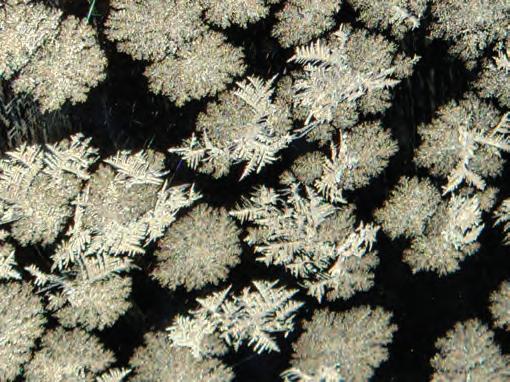
I lose myself in this addiction; sun fires lodgepole branches that occasionally part and the Grasshopper Valley glistens— salvation of Covid winters
My father’s Norwegian poles, wide leather baskets, as old as the Splitkein / Bass skis originally part of St. Mary’s College team and recently a retirement gift, red strip tapers in their middle slender strong
below my aging legs
Each time I push off these waxed skis arrow and I follow try to earn their respect in our easy kick-glide two-step:
irresistible dance my body has known since youth in which problems large or looming drop away and the world’s wobbly rhythms right themselves awhile, match my own.
“Isn’t it good, Norwegian wood?”
—for Ron Loge
122 CIRQUE
Evanescence - ice flowers on windshield Janet Klein
Robin Woolman

Passing Glances
I
A grizzled gent swings a Target bag wildly at invisible tormentors size unknown.
II
A small Achilles sallies down the cul-de-sac in polished helmet, swinging his gleaming sword. His Nana strolls behind. We share glances, knowing our place among such warriors.
III
On the pebbled asphalt driveway of the Self Storage Units, someone’s precious collection of baseball cards lays melting in winter rain. Spewed from the back of a pickup truck? Picking up or dropping off? Statistical lives thrown away intentionally? Hastily? An accident of wind hustling them, light as leaves, from a tattered box unsecured? Foreclosure, divorce, or the passing of the child who saved his money, saved these cards against the day his heroes became dispensable to the adults who drove away?
IV
The man I chose, whose genes waltz with mine in three offspring, leans on the bakery counter. I dodge into produce, unseen. I’ve heard his second wife craves confections. My memories stack like these Pink Lady Apples on sale.
V
The mountain princess Loowit burst her seams in 1980. Mud roared like a locomotive. Walking along the Willamette, I sight her, demure in pink light, framed under the rusted train trestle, their curves in complement. I am again the girl curled under my mother’s table— a lion in her den.
VI
Passing glance in the hall mirror: What gravity does to a face! Best to look past where pink buds bounce in the wind.
123 Vol. 13 No. 2
Oregon Dunes
Scott Hanson
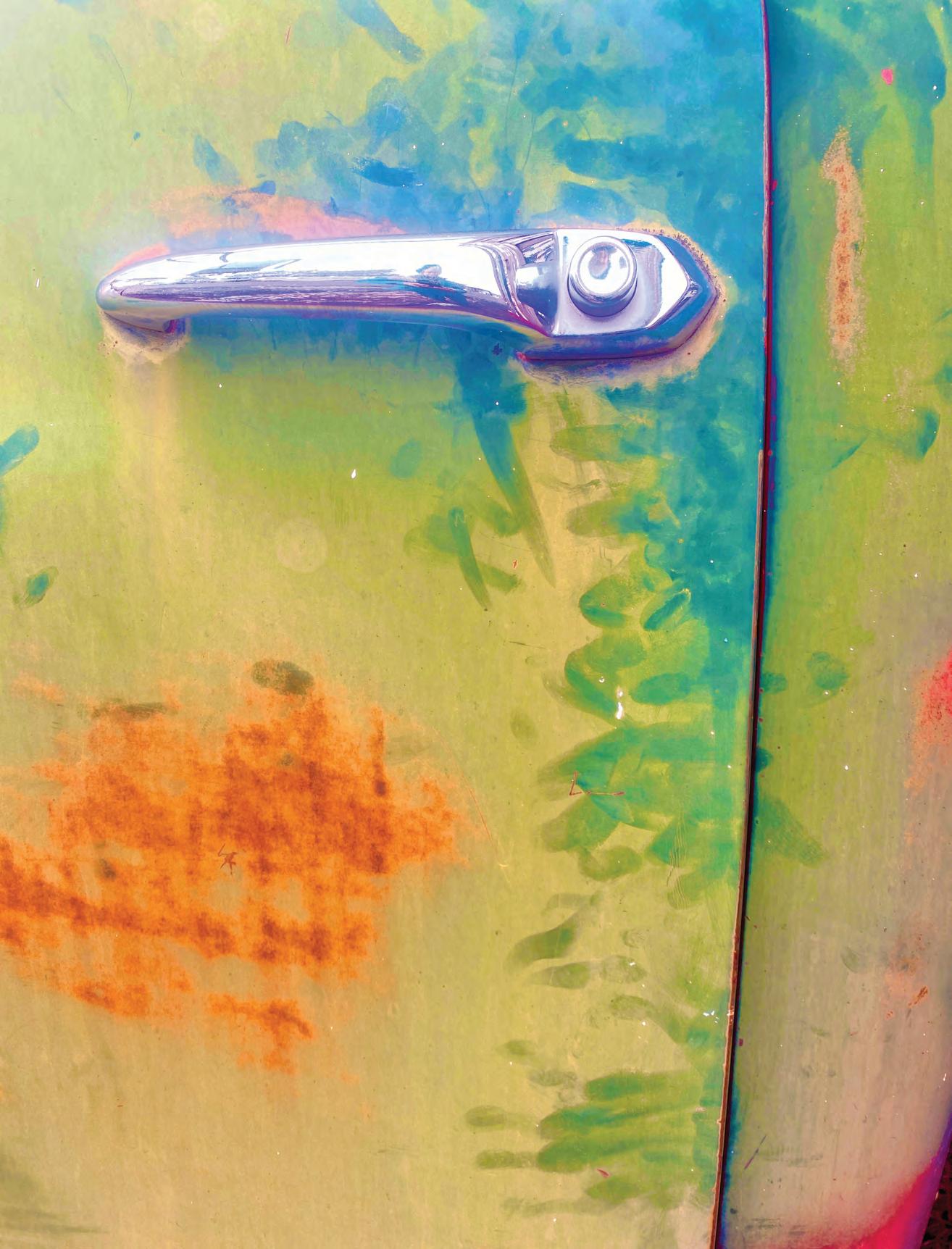 I Closed the Door Jill Johnson
I Closed the Door Jill Johnson
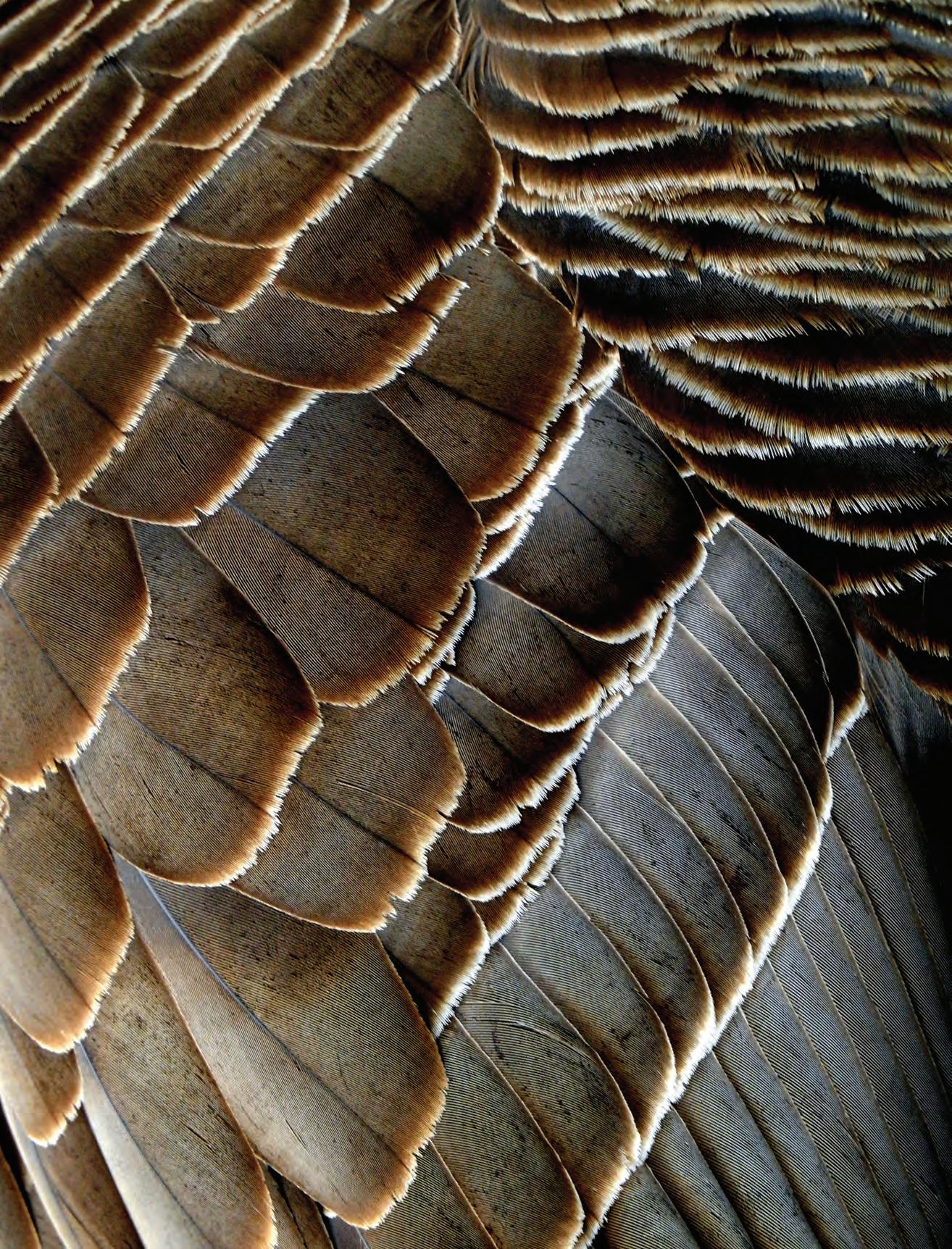
Fine Feathered Jim Thiele
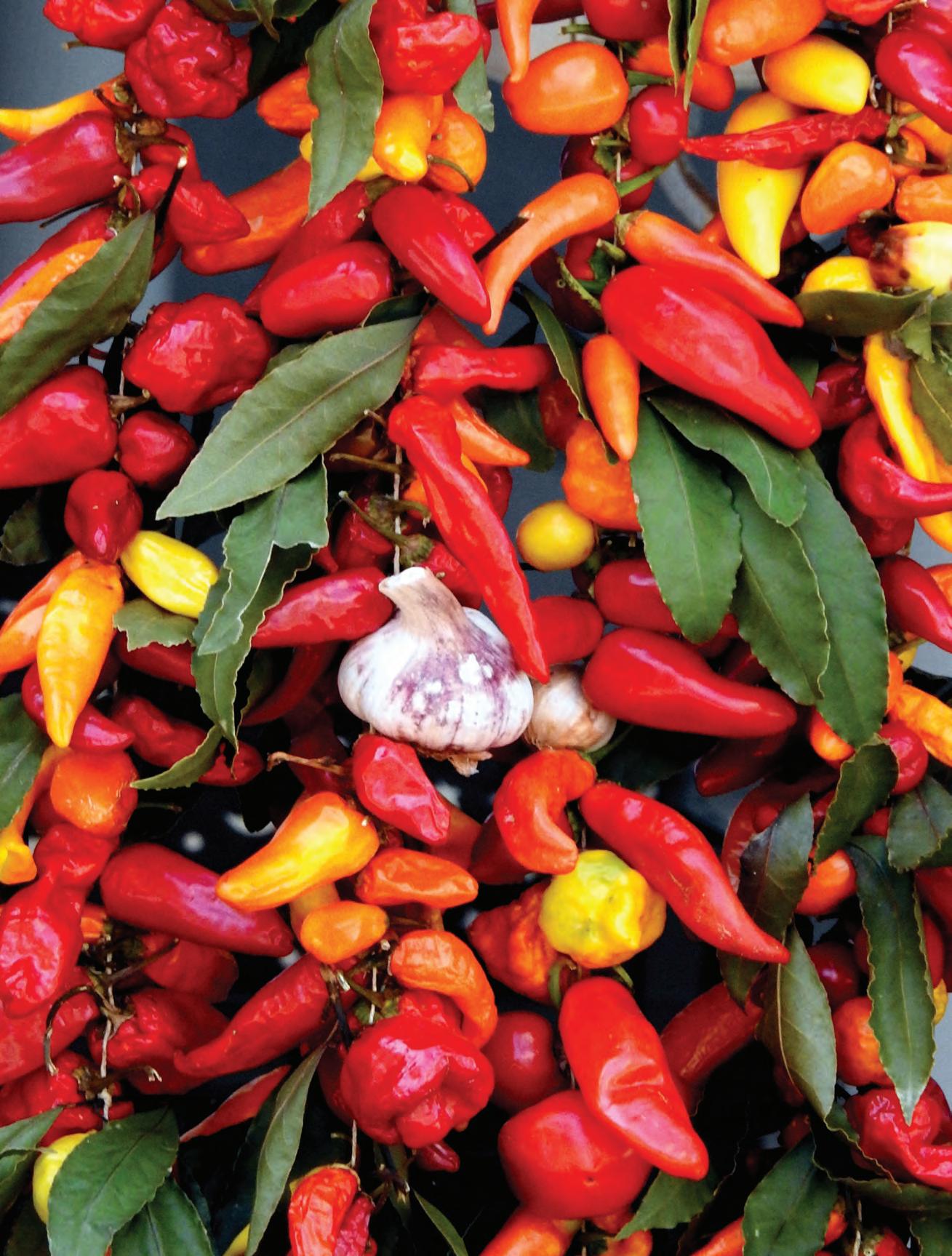 Garlic Jim Thiele
Garlic Jim Thiele
FEATURES
Artists of CIRQUE
Cynthia Steele
The Camera Points Both Ways: A Profile of Jim Thiele—Photographer
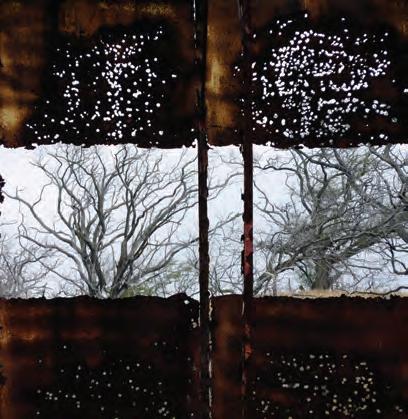

The camera always points both ways. In expressing your subject, you also express yourself.
—Freeman Patterson
Jim Thiele has six times nabbed Cirque’s seemingly illusive, certainly illustrious —cover shot, though he’s hardly tried for it. This series continues interviews with Cirque’s visual artists and photographers whose works Cirque has embraced. Jim, whose photographs also grace the pages of Alaska Magazine and Alaska Geographic, is a staple Cirque photographer. I met Jim in both Homer and Anchorage and chatted about his work, past and present, and his ideas about photography.
In 2010, his wife, writer Susan Pope, had an early issue of Cirque on a coffee table. Both discussed the journal and decided: “Yeah, let’s submit.” Cirque’s third issue picked up Susan’s “Women Picking Berries” and Jim’s photo for the cover. Four of Jim’s other submitted photos also appear in the same issue. And so it goes.
Cirque’s cover is chosen through a simple, though not fixed, methodology.
Editor Mike Burwell, former Alaskan now residing in New Mexico, typically chooses cover shots. Co-editor Sandra Kleven added the full-page section divider photos from other potential covers. Design and the photographer’s cropping help determine the choice.
Jim’s forte is that his style fits the journal.
It’s not that Cirque was looking for a shot-out, rusty bus. In fact, one can hardly tell that’s what the image is. An abstractness to Jim’s work is part of its appeal. His first cover, as Jim describes it, “a bus that was completely rusted out, so the sides had all those holes in it. I think somebody had been firing a shotgun at it or something. But it was just kind of a weird pattern.”
As it turns out, Mike Burwell was looking for just that: “I like his sense of composition. A lot of people send us visuals. Their subject matter itself limits where you can use them. If it’s abstract, often you can use them in many more places in the layout, and Jim’s images fit the bill, and they are so damn good. Sheary Suitor and Nard Claar—work similarly; their stuff is abstract enough to fit many places; it can either work subject to subject or mood to subject.”
127 Vol. 13 No. 2
Jim Thiele Cynthia Steele
Cirque Cover, Issue #3, Winter 2010
It's more in the way Thiele captures objects differently.
Burwell chuckles, “It’s like you’ve never seen a rusty nail before.”
From that point on, Jim’s work has appeared in Cirque consistently, including full page dividers that separate genres.
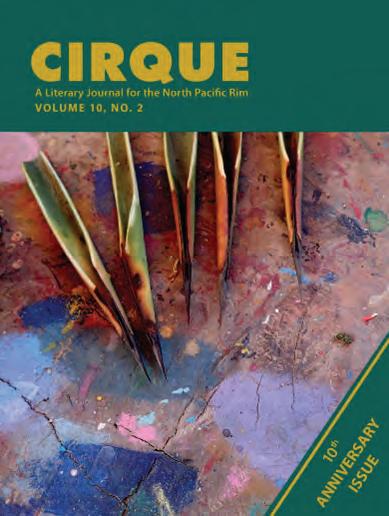
“I was almost a cover, once,” I joked with Jim. “I was a page divider. So do you regularly have this many covers in other journals?”
“Other journals?” He asked, laughing with a bit of a deadpan, “No.”
Jim described the 10.2 cover of the pens creating Alebrijes, Mexican wood carvings that are a traditional Oaxacan craft. “In painting these carved birds, they were using these objects to paint with. Really, sharp, tiny points (of Agave cactus leaves) to apply the dot-painting and intricate strokes. One of the most interesting places to visit. It's brilliant.”
The way Jim photographed the image with only the agave leaves applying water-colored paint and not the object itself is a road less traveled and creates a hazy piece with cool and warm tones melting into one another.
Jim divides his time between an Anchorage home and Homer’s East End Road. They call the Homer place “The Cliff House.” “McNeil Canyon is huge and drops off. You know, I think if we had to do it over again, we'd want to be closer to town, but we tripped over this place 20 years ago and fell in love with it and just bought it.” In Homer, he and Susan have the good fortune to share a boat and a cabin with another couple.
Jim’s daughter lives in Anchorage. A grandson lives in Anchorage and a granddaughter is in school at the University of Colorado.
Jim grew up in Lakewood and lived in Boulder, Colorado during college and for several years after.
Jim’s photography interest began when he earned a Boy Scouts’ photography merit badge. Second, he had the good luck of his father’s darkroom. Jim spoke of his father, Joe, whose experience with photography included his job as a Second World War Counterintelligence Special Agent. Joe had picked up a few cameras overseas. His father’s keen interest in photography remained strong through hobbyist images of family life.
At 12 or 13, Jim worked with his father to shoot film images. Joe used the cameras he’d picked up overseas, like the Voigtländer, which uses 120 roll film.
Jim brought three of his father’s old cameras to our final meetup at Potter Marsh where we posed the vintage cameras.
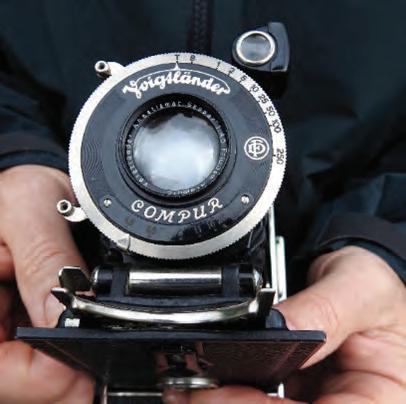
128 CIRQUE
Cirque Cover, Issue #22,
Cynthia Steele
Jim Thiele holding his father's WWI Voigtlander compur camera
I recalled my own high school and college experience with eye-stinging caustic chemical solutions and stark red lighting used in the black and white developing process. Our mixed-level class (I was 14) would listen to Cheech and Chong and hold the paper down gently, moving hands but never letting them rest on the slippery paper until images appeared. After waiting, we quickly pulled the slimy, thick rectangles out and hung them in a moment of revelation.
Jim spoke of his father’s darkroom, which acted as the catalyst for his own interest.
“I thought that was always magic when he would put his white picture in there. He had an old Kodak Twin Lens Reflex. A little box. He took a lot of photographs. The magic of the dark room was amazing.”
As a 20-year-old photographer, Jim captured assigned photos for a biology textbook company, working out of his basement and the back of his car.
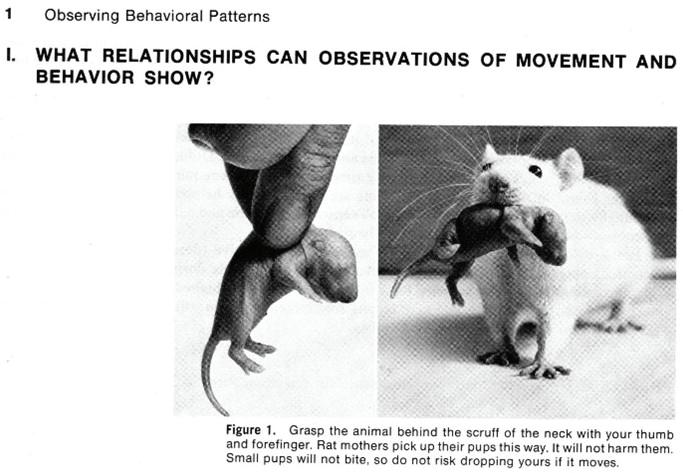
“I have a multi-layered college history. I lived in a garage in the basement of a house. I went in as a pre-med student. Then I worked in a hospital for the summer, and I realized I hated being around sick people. A good thing to learn before I went through that whole process. So, I became a biologist, and I put myself through college doing wedding photography and portraits, and, God help me, sorority pictures.”
Weddings and stills paid the rent for a while, but the textbook job piqued his interest, especially one of the writers on the project who is still a friend of Jim’s.
“He’d ask, ‘Can you get me a picture of a buffalo charging?’ ‘Sure,’ I laughed. ‘Why not?’ ‘Can you get me a picture of a beaver gnawing a tree?’ ‘Uh, no. Probably not.’”
Jim almost moved to Europe, but he came to Alaska instead. He sums up the very long transition in a typically Alaskan way: “I had a short-term opportunity in 1974 and never left.”
He worked for the Alaska Department of Fish and Game and the University of Alaska as a biologist, as well as a financial advisor in private practice but is now retired.
Jim’s not into fancy cameras, though friends and “fellow curmudgeons” and wildlife photographers Tom Collopy and Mary Frische, both retired from Wild North Photography in 2018, try to talk him into them. Tom is a technical wizard and perfectionist and will only settle for the best. Tom and Mary have been out on the R/V Tiĝlax taking photos for the U.S. Fish and Wildlife Service, and they have photos at the Alaska Maritime National Wildlife Refuge Visitor Center in the lobby, and one wall in the auditorium has multiple large format images.
Ironically, when Sandra and I showed up to meet him at Homer’s tasty, rustic Sweetgale Meadworks & Cider House, the same Nikon Coolpix P900 hung around my neck as the one Jim owns. The lightweight, compact camera features an 83x Optical Zoom lens and low light sensors.
The Coolpix is his “go to” as well as mine. Though I have a more serious version—the Canon Mark IV—the weight is prohibitive for me.
129 Vol. 13 No. 2
Biology textbook photo
Jim Thiele
Jim explains Collopy’s comment, “He’s always used high end Canon bodies and lenses and now has a Sony, but I don’t see the need for fancy cameras. Unless it will do the trick better, and even so, the Coolpix shots give identifying information for birds and flowers from a great distance.”
Jim’s experienced various cameras. In high school, Jim had a Pentax film camera and used off brand or second-hand lenses. “I had a wonderful macro lens that got close to flowers, and a zoom for taking high school yearbook shots. I got Nikon FM 35mm film cameras when I had a couple of bucks. Bayonet lenses made life so much easier. I went through a couple of the bodies. I drowned one complete set in a rafting flip when the “waterproof” box failed. I still have one body and the macro lens as ancient artifacts but sold off the 600 mm telephoto, zoom and super wides when digital became a reality. I also had a Bronica 2 1/4 X 2 1/4 film camera that was bought to shoot weddings and portraits. I gave that up after college and a real job. My first digital was a Minolta Dimage A1 with a built-in 28 to 200 mm zoom lens with a Macro setting. 5—count ’em—5 mega pixels. But the chip fried, and it was not repairable. I still have it sitting on the shelf, next to my dad’s old Voigtländer, as another artifact.
“I had a Canon digital pocket camera that was really fun—until it fell out of my pocket on a cliff in the Grand Canyon. It appears that bouncing down a rock cliff is hard on the optics, especially the viewing screen. I replaced that with an Olympus Tough—it has an amazing macro that you can use with a ring light that attaches to the lens. You want close ups —you got ’em. But, I mostly use that as my underwater camera—I did have an old Nikonos film underwater rig, but it was so hard to use; I hated it. The Tough is bomb-proof and simple. The Tough also has a really wonderful nighttime long exposure mode for getting star tracks.
“I’ve had a series of Nikon Coolpix super zoom digital cameras. Easy to use, lots of “scene” modes, decent macro capability, decent resolution, and a spectacular zoom. I am really rough on cameras and have broken several. Nothing as dramatic as dropping them off a cliff but smacking them against the rock or drowning them in the rain happens,” he explained.
“I never have been fixated on the best lens or the best equipment but rather what is the easiest way to get the image.” He admits that some of the newer cameras do get better quality, but he’s capturing an image and enjoying the activity, “so maybe someday I'll splurge on a Sony, but why?”
My own experience included various accidents and damage to versions of the Canon Rebel, film and digital. Our current camera-in-common interested me, so I benefitted from a few of Jim’s brief tutorials on the P900. He encouraged me to connect with the Anchorage Audubon Society, which hosted an event recently called the Potter Marsh-a-Thon Birding Smackdown. He could see I enjoyed taking plenty of time birding to get great photo choices though my knowledge is nowhere near as rich as his own.
Jim also enjoys the evaporating hours of getting a few great shots. “I have a really good friend who's a commercial photographer. He and I have gone on long trips together. In fact, he was wading through the weeds with me when I took that first cover photo. On the Grand Canyon trip, 15 people go on a hike. We're always the last ones and they're always going, ‘Come on, for Christ sake.’ We're paying attention to what's there, and he does some real interesting fine art stuff.”
……..
The two main photographers whose pictures hang in their home are Jim and Susan’s good friends Tom Collopy and Mary Frische. “Okay, I admit, I have a few of my own hanging on the fridge. We have very few photos; it’s mostly a menagerie of art from glass to quilts to baskets to turned wood stuff.”
Jim shared the names of some photographers and books that he finds enjoyable. First, Georgia O'Keeffe and Ansel Adams, especially the Hawai'i pictures. He finds the two “great and careful observers.” Adriel Heisey’s aerial photographs of ancient ruins are: “Truly a way of seeing that transforms archeology, rocks and dirt into fine, abstract art.” He also esteems David Muench, a preeminent 20th and 21st century American landscape photographer lauded for his National Park photographs and murals.
130 CIRQUE
Elliot Porter is known for bird photographs but more so for the intimate, color landscape photographs, and for these, he uses an exacting dye transfer process, which established a new model for viewing nature. Porter’s book on the Glen Canyon shows the pristine ecosystem before it was “buried” by the dam (The Place That No One Knew). Eventually, the dam will need to be re-engineered for the biological integrity of the Grand Canyon and the Colorado River. Porter also wrote the epilogue and included his photos in Down the Colorado: John Wesley Powell’s Diary of the First Trip Through the Grand Canyon.” Jim remarked, “His photos and epilogue in Powell’s book are awesome; he was a scientist, environmentalist, and an amazing observer of the natural world.”
Porter’s photography was featured along with quotes by Henry David Thoreau in the Sierra Club book In Wilderness is the Preservation of the World. This work set a new style and transformed nature photography itself. Porter’s photographs ultimately led to the passage of the Wilderness Act of 1964—the foundation of the laws governing wilderness management to this day.
Jim’s only real project right now is Eveline’s Crown Jewels a flower guide for the Eveline State Recreational Site, which began about four years ago. Carmen Field, a naturalist, inspired the guide, and the project is dedicated to her memory and to Jim’s wife, Susan. The Eveline State Park in Homer is known for panoramic views, hiking trails, cross country skiing, wildflowers, and gentle terrain. He’s added a couple of “new” flowers every year.
“The photos have been done by setting up a portable ‘studio’ with LED lights—many of the photos were taken on the dining table at our Homer cabin. I’ve tried to make the photos both useful for identification and a bit artsy fartsy.” This summer he hopes to obtain images of flowers that visitors have requested. “I would love to do the grasses, but that is way beyond my ID skill set. That is, I am not willing to spend the effort and eyesight to ID those buggers.”
While at Potter Marsh with Jim, he thought maybe he had found a patch of angelica, but without the flower in bloom he was not positive, so he will return if he doesn’t find it in Homer.
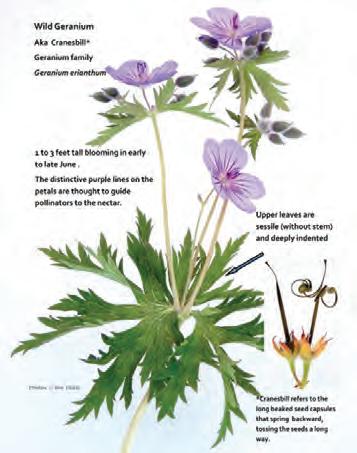
Jim’s philosophy of capturing images can be found in the words of Freeman Patterson: “On those frosty mornings when I grab my camera and tripod, and head out into the meadow behind my house, I quickly forget about me. I stop thinking about what I’ll do with the photographs, or about self-fulfillment… the result is a tremendous exuberance which helps me make the best use of my camera” (from Photography & the Art of Seeing).
“Damn,” Jim said. “I read this in the early 80s, and it completely changed the way I think about photography. The first chapter is “Learning to Observe.”

“So when I'm walking down the beach, I'm not just walking down the beach; I'm paying attention to the seashells, to the rocks and the seaweed wrapped around a tree. You know like that cover that we did for On the Beach: Poems 2016-2021 by Alan Weltzien [Cirque Press]: that piece of grass coming across the sand.”
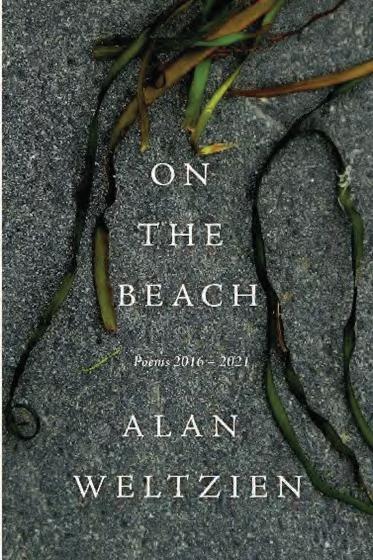
131 Vol. 13 No. 2
Geranium from Eveline State Park Project
Jim Thiele
Jim Thiele
Alan Weltzien book cover image
INTERVIEW
Anne Haven McDonnell
An Interview with Anne Coray—Late Fall Bucolics (The Poetry Box, 2022)
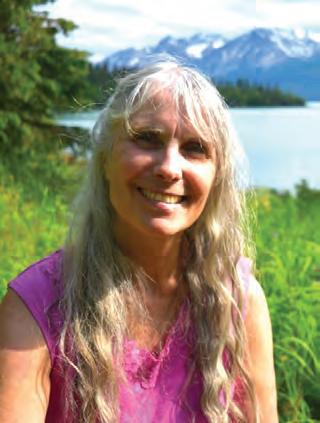
Introductory Note by Anne Coray
When Mike Burwell suggested I might want someone to interview me for Cirque regarding my latest chapbook, several poets came to mind. I thought it would be nice to correspond with a writer I’d never met. Anne Haven McDonnell rose to the top of my list, not only because she lives in New Mexico, but because she has an MFA from the University of Alaska, Anchorage. This seemed too geographically aligned to be true. That’s because Cirque editor Mike Burwell now lives in Taos but spent many years in Alaska. So the New Mexico/Alaska connection was strong. I had read some of Anne Haven McDonnell’s work in journals and was impressed. In the eco-anthology Rewilding, where our work was both featured, one of her poems in particular caught my attention. It’s titled “Once There Were Fish,” and I found it powerful in its use of language, rhythm, and imagery. I’m looking forward to becoming more acquainted with her poetry. The following interview took place by email. Perhaps someday the two of us—whose first names happen to be Anne with an “e”— can meet in person.
Anne Haven McDonnell: Thank you for the opportunity to spend time with this elegant and important collection of poems.
One of the first things that interests me in this book is the juxtaposition of form and subject matter. This a series of traditional sonnets, so skillfully made with careful attention to sound and rhythm within the boundaries of this form. Because these poems stay true to this traditional form and because they reference history and myth, they have a kind of timeless and ancient feeling to them, but they address our very contemporary moment of climate change. Can you talk about why you chose to work in this form to address this topic?
Anne Coray: I appreciate your comment on the juxtaposition of form and subject in my collection. I wish I could say that I chose the form beforehand, but here is what really
happened: I’d been on a long hiatus from writing poetry, both because I was working on my never ending first novel, Lost Mountain, and also because I’d sort of sworn off writing poetry again, due to multiple disillusionments.
But getting back to form: because I hadn’t been writing poetry, I found myself shaping a sonnet as I sat down to write. Then it became an assignment I’d tasked myself with. Using either full or slant rhyme sometimes helps a writer move forward, often in unexpected ways, and the 14-line framework dictates the need to stay concise.
I had only planned on writing a poem or two, and then I construed the idea of pushing myself to continue by re-using the same end-word, or its homonym, in the following poem. So the last word of the last line in poem one is the last word of the first line in poem two. And so forth. Only later did I learn that this is a modification of a classic form called a Crown Sonnet. Traditionally, the entire line is repeated, but that would be quite a challenge. I’m not sure I’m up to it! Especially not for 24 poems.
Regarding subject, I had actually started out trying to
132 CIRQUE
Anne Coray
write a “nice” poem that would perhaps make its way into Alaska Magazine as part of their annual literary (stories) issue. As is usually the case, I couldn’t help myself: I think the pen had a mind of its own. The poem veered, taking a dark turn with its exploration of climate change. It’s just that environmental woes seem to be a recurring obsession in much of my work. I remember a famous poet once said that we don’t choose our subjects; they choose us. That’s often true for me: at least, in this first poem in the book, it wasn’t a conscious effort. That, in a very large nutshell, is how this traditional and timeless form came to mesh with our contemporary catastrophic path: climate change.
One more comment on form poems: my first poetry teacher, Cirque editor Mike Burwell, had the class write a sonnet, and we learned the difference between the Shakespearian and Italian form. I kind of gravitated toward it. But later, when I worked with Tom Sexton, I was feeling resistant to form in general, especially the sestina, which is really hard to pull off. (I ended up writing two of them once I’d completed my MFA) By and large though, freeverse has been my go-to for most of my poetry to date. I now believe that many poets could benefit from working on traditional sonnets. Sonnets make the writer pay more attention to structure; they teach discipline.
AHM: You’ve lived your whole life in Alaska, and these poems reflect a deep intimate knowing of this northern landscape and ways of life that are necessary to live there. Your images show this intimate knowing of place and the changes you’ve witnessed in your lifetime. How do you think poetry can speak to an intimate experience of place and of how climate change impacts our specific home places?
AC: In some ways poetry has become kind of a diary for me…when I think back on my work, there are sometimes references to natural occurrences that seemed like givens at the time of writing. Such givens that I never thought they would ever be different. That was probably incredibly naïve of me, but when you’ve witnessed something take place for so many years, you tend to take it for granted. For example, in my poem “Sterna paradisaea,” from my collection A Measure’s Hush, there are these lines: the lake, whose color / —mountain blue in early summer— / is turquoise-emerald by July, as silt / moves down from the upper glaciers …” The “given” was that the lake (Lake Clark) would change color in July. It had always happened that way. Now, though, we sometimes see this color change
in early June. That’s because of warming temperatures, which cause the glaciers to melt earlier in the season. But nothing is a given anymore. Climate change, scientists like to remind us, is the right phrase, as opposed to global warming. The climate is so unpredictable now…big unexpected swings, and often large blocks of weather. In the past, we would get an east blow at the lake that would last for three days. That was it. Then we’d have a calm spell, or the wind would switch directions. Sometimes now it blows the same direction for weeks at a time.
In another example, my poem “One March Animal’s Desire,” from Bone Strings, begins “Warm days, we punch the snow with our footsteps / leaving the nights’ cool mercury to harden a crust./ Better to travel early, before the sun sends down / the weight of its heat.” When I wrote that I probably believed that the month of March at my Southwest Alaska homesite would always be characterized by snow on the ground.
My piece “-40” must have been written quite some time ago because those extreme low temperatures have not been seen for many, many years at Lake Clark.
In other poems, though, I bemoan the lack of snow, so climate change was already on my radar, even in the early 2000s. “December Rain,” “January Thaw,” and “Melt”” are titles that speak for themselves. In one particularly bleak piece from my collection Violet Transparent, I write: “It is one thing to love a storm. / It is another to know its cause / is the work of our own mad fingers / a trigger of freeways and hot steel.”
Occasionally—rarely—I am able to look at an odd climatic occurrence more through an observational perspective than disparagement. For example, “Night Light” begins “March 1st. The weather’s been so warm / leaf buds are forming on alder and rose. / Nights, the moths come out …”
At any rate, by the time I got around to writing Late Fall Bucolics, climate change was a deeply embedded theme for me. I think it would be fascinating to see what other poets have to say about this. Poets can be such good observers, documenting times and places and events in history.
AHM: Throughout many of the poems here, the theme of painting the landscape appears. I’m interested in how
133 Vol. 13 No. 2
this theme holds complexity and complicity in our human relationship to the land for you? How do you see this theme working in these poems?

AC: I do find this an intriguing idea: that humans are painting (remaking) the landscape. In my chapbook this is frowned upon, of course, because the result is climate change. I have to say that my undergraduate degree was in visual art, and I love it, especially drawing and painting. I’ve incorporated art references into a number of my poems over the years, sometimes writing ekphrastic pieces. But I’ve also explored the environmental impacts of making art. I remember some of those wonderful oil paints when I was a student at the University of Washington. Cadmium yellow & red, phthalo blue & green, zinc white, etc. I never considered, when I was in my late teens/early twenties where these came from. Of course the color bases were mined materials. Later I gave that more thought. In my collection and title poem “Violet Transparent” I write: “Even Matisse, most sensuous painter, / would not have traded his cadmium ore, harvest / born only with fissure: torn vein, cut lode.”
I took up this theme in a big way in Late Fall Bucolics, with the idea that there is a mad artist out there (sort of a manipulative God) turning snow to rain: “A covert / Painter laid the mountaintops with snow then loaded / His brush for us with rain.” In the following poem I claim that I am apprenticed to this master. I can’t wrest myself from his power. I am fated to become another painter who helps destroy the landscape. I even say, “I am complicit.”
It’s easy to blame politicians and big oil and industry for our climate mess. But the truth is, we all use petroleum products. I think some of the blame should be cast on the everyday citizen who doesn’t conserve. It’s incumbent upon us to drive less, carpool, take public transportation when we are able (although this is really tough in Alaska— there is little opportunity, and the state is vast.)
Nevertheless, I am not willing to give up my lifestyle, which includes flying with my husband in our Super Cub. It’s a great little airplane but it gets about eight miles to the gallon. My poem “First Infraction” mentions “the harm
the engine causes.” In another piece, “Rapt” I explore how taken I am with our wood-burning stove, my preferred source of heat. But I end by saying “our lifestyle we pledge to spare.”
So yes, environmental damage and to whom we should point the finger is extremely complex. One way to avoid didacticism, if that is a concern for a writer, is to implicate oneself. But don’t get me started on all the electronic devices we think we need.
AHM: You reference Jane Fonda and Greta Thunburg in these poems. Why did you choose to include climate activists in these poems, and why these two activists in particular?
AC: Hmm…I think Jane Fonda got in there because she was in the news, protesting climate change and risking time in jail, with “her loud red coat” as a symbol of fire. I always admire celebrities who take up environmental causes. If anyone can get people’s attention, it is celebrities. (Apologies, poets.) As for Greta Thunberg, her comment about hope really struck me when I first heard it, and when I landed on hope as a subject (“Gullible Hope”) her words were with me the whole time. She doesn’t want us to be hopeful, she wants action! I was delighted that I was able to work that into the poem. It’s a bit like responding to people who “pray” for families whose children were murdered with AK 47s. I love the few politicians who say, “I don’t want your prayers, I want gun restrictions.”
I know that Jane Fonda got flack for marrying Ted Turner and having sort of “sold out” after her strong protests against the Vietnam War, but I’m not sure what anyone had against Turner except that he was a billionaire. From what I’ve read, he’s always had fairly strong leftist politics and donated a lot of money to just causes. I think we need to give Jane credit. After her exercise gig, she returned to her deep sense of social justice, which now includes environmental justice.
As for Greta, oh my goodness, I can’t imagine being her age and being so astute. She also has an incredible wit. Above all, she knows exactly what she stands for, and she doesn’t back down. She is a role model to any environmental activist.
134 CIRQUE
AHM: I love how these poems travel and explore the match making industry and the human costs here, even as they ground and return to the speaker’s immediate experience in the land. I learned about the toxic impacts on workers in these early match making factories—something I knew nothing about. Can you speak about this historical exploration in the poems? How did you decide to include this research? Can you speak about your use of research and your process in writing these poems?
Anne Coray: The match making industry and the impacts on factory workers was something I too was completely unaware of before I wrote these sonnets. As I was writing, I became more obsessed with fire: how it came to us, the myth of Prometheus, and so forth—because fire and warmth have a direct correlation to climate change, right? All these questions came to me. What are our sources of heat? How do we heat our homes? Do we know the history of fire as technology? So I found myself intrigued by the simple match (which was a technological milestone). The research ensued as I was in the midst of writing the sonnet cycle.
I am both thrilled and appalled to have recorded the horrific disease known as “phossy jaw” in my collection. Thrilled only because I was able to bring something to light that is unknown to so many people, and appalled because I had and have absolute empathy for those afflicted workers. I can’t imagine being subjected to a disease like that, while knowing that your employer knows the cause but could care less about you because you can be so easily replaced. (“Fungible,” as George W. Bush once said of American soldiers in Iraq.) Because profit is the bottom line.
I do like the way the different themes in the book became interwoven: fire, art, myth, and climate change. But it wasn’t conscious. It was an organic development.
AHM: Who are some poets that inspire you? Did any poets’ work inspire this collection in particular?

AC: I admire so many poets, but I’ve found it impossible to keep up with what’s happening in contemporary writing. There’s just so much out there. I always loved poets like Lorca and Neruda (thanks again to Mike Burwell for introducing them in that first class—they have stayed with me.) And who doesn’t cherish a piece like Dylan Thomas’s “Fern Hill?” Generally speaking I’m drawn to poems that emphasize language over content. Sometimes I don’t
know what on earth a poem is “about” but I’m sucked in by the language. A good example is a poem by Deborah Digges, which I read recently at the Homer Library as part of an April Poetry month “Favorite Poems” celebration. It’s titled “Telling the Bees.” I just fell in love with the sounds and rhythm, and only later did I learn that telling the bees is an old European tradition, based on the belief that if the bees were not notified of a big event (a death or marriage in the household, for example) then they might die or stop making honey.
While I didn’t have any poetry in mind that inspired Late Fall Bucolics directly, I have a mental file of what I consider to be some of the best environmental poems written. These include W.S. Merwin’s “The Last One,” and pieces by William Heyen like “Canary” and “Fur.” Merwin’s is an amazing piece, filled with invective but successful because his outrage is directed at the entire human race. Heyen’s are quick-paced and rich with irony, and I’m always especially happy with my own writing when I too can work in irony or dark humor. I believe a few pieces in Late Fall Bucolics accomplish this: “Gullible Hope,” “Holos,” and “Soot and Goo.”
Lastly, I think the poetry that most resonates with us becomes a part of our identity, and those sentiments and expressions that others have gifted us become impossible to separate from how we feel and think.
AHM: How do you think poetry can speak towards the climate crisis in ways that are different than other kinds of speech and writing?
AC: I don’t know that poetry can say or do anything different except that the form is more compressed and therefore more immediate for those who read poetry. Perhaps we can take in a handful of new converts that way, but poetry is unlikely to change behaviors. If we are talking about reaching the masses, then nonfiction is the best written medium for attacking the subject. It’s good, however, for our “tribe” to put this stuff out there for other poets. It makes us feel less alone, knowing that others share our sentiments. Maybe it will prevent some suicides. (Dark humor.) Maybe it will engender some activists. Maybe, when our time is long past, someone will look back on what we’ve written and see it as a document, a diary of our era.
135 Vol. 13 No. 2
INTERVIEW and REVIEW
Paul K. Haeder
Touching Furrows Toward Understanding a Life in Poetry—A Sandpiper on the Edge of Continents: An Interview with Ann Fox Chandonnet and a Review of Chandonnet’s The Shape of Wind on Water (Loom
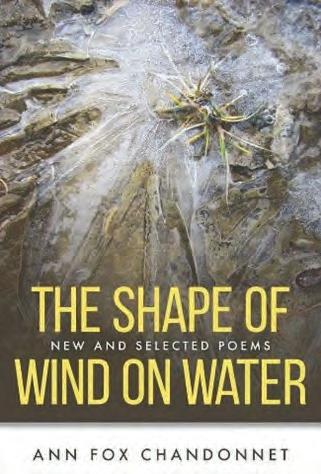
Press, 2023)
Dendrochronologists create master sequences of tree ring data going back thousands of years. Ann’s poem, “Snow Water under Culverts,” is that flow of seasons, the reason for her own hoeing of earth and time into the memoryetching of a poet:
The scent of new pine boards, fresh cement, manure of several species, scalded steel and sour milk in the milk room, ripening silage forked down the hemispherical ladder shaft (like ascending into a mine), moldering hay in the high mows.
I’m thinking tree rings as I reread the 93 poems in Ann Chandonnet’s Loom Press, The Shape of Wind on Water. Ann’s given us work that leaps back to 1968 in this bristle pinecone living catalogue of her own germination and evolution as a woman.
Can a poetry reviewer be like a dendrochronologist studying not tree rings but poetic energy? This collection is a field of dreams, a deep flow of nutrients from places under earth, into bark, high into Ann’s poetic canopy.
Think about land, hands, faces, family and the art of knowing (learning) and believing (philosophy, epistemology). Is there a foundational tap root of a poem in Ann’s collection that floods a reviewer’s mind?
The furrowing time of adulthood looking back to those formative years on a farm, and considering her father, we as eavesdropping audience find the embrace of youth holding steady as Ann the adult woman transmutes back to those years watching, holding, listening, feeling and smelling. We taste the air with her in this poem which is more than just a poem about a father.
Deeds were his speech: his 16 hours of sweat a day, his neck eroded into arroyos by weather, his shoes like Leninist bronzes of shoes, his shins knobby from cows’ kicks, the trim body he weighed every morning, the handsome hands tough as the emery wheel that honed axes and scythes, the sound of that wheel, and the hard water dripping onto it from a rusty can.
136 CIRQUE
Here is our work: to hold the very fabric of an adult poet in the shadow of her past, and those formative years observing, until one day she will hold high the tool of the poet: memory. The last line is the cut into the old bristle pine as we are called to gather Ann’s story:
Father, you are coming back under a different name: Memory.
The poet does settle into a type of ageless recall, and with her three-part John Muir poem, “Fine Shining Weather: Three Poems for John Muir,” Ann finds a man mostly forgotten (except for the Sierra Club aficionados) but relevant to her own ethos around holding ground for nature. Even in his time, 1903, Muir was treated like a lesser person:
Called “a tramp” by his foes, he said,
“Don’t pity me, pity yourselves. You stay at home, dry and defrauded of all the glory I have seen.
Our souls starve in the middle of abundance.”
The fight Muir undertook to preserve the glacial valley in Yosemite, Hetch Hetchy, did him in. For thousands of years before the arrival of settlers in the 1850s, this amazing valley had been inhabited by Native Americans who practiced subsistence hunting-gathering. Well, the valley was known for its natural beauty; however, the growing industrializing country wanted development, and development always brings with it a thirst for water to supply municipal and irrigation needs.
The river running through this valley was dammed, a symbol of much of the fights to preserve an indigenous way of life. It’s relevant today with Native Americans fighting pipelines, the so-called black snake.
Muir persevered against “ravaging commercialism,” “the Almighty Dollar.”
Eventually the long fight for Hetch-Hetchy wore him down.
“It’s killing me,” he said, missing Louie.
Pneumonia squeezed him in its vise, and he died, tipped out of life.
The “camping tramping tree-climbing scrambler: “the rank, cantankerous, and withal lovable Scot” was silent.
It was just as well. He never had to see those muddy reservoir banks here nothing grew.
This is hyperbolically evocative for some of us who see ourselves as deep-green environmental warriors, and for those of us who understand the power of capitalism to not just distort everything, but to put every aspect of our lives and every biological system on the chopping block for profits.
In Anne’s work, the drive to find meaning and to go beyond the mundane and pedestrian is copasetic for me as I look at her philosophy in the poem, “One Nest, One Burrow”:
I, poet, desire encyclopedias like the grand Britannica on a Jeffersonian stand or table. I dearly wish to be able to describe Nature’s miracles in stanzas lyrical. Every sense ablaze
I crave to mine each small fact splendidly packed into this pastoral scene. I lick clean the dewy plate of desire which reflects blinding sunrise fire.
Her goal is to continue “prodding,” and in that process, and in her word-carving and stanza-scribing, Ann’s audience is there within the muse’s—her own muse’s—beckon call. Her subsonic song is captured for me in her narrative poems, one of which, “I’m Harlan, Sorry to Disturb You,” which touches upon capitalism, colonialism, street people, Native Alaskans, and the poet’s repose:
137 Vol. 13 No. 2
They ban me at Brother Francis, but I can stay tonight at Rescue Mission.
You know Tudor?
I can pay you $2 to take me to Rescue Mission, Tudor Road.
I have money in this pocket, but I don’t want to spend it.
Sorry to disturb you.
My Mom die down there, cancer.
I can stay overnight free.
I’m carver, Harlan, from Gambell. It’s the best place there—beautiful!
You eat those murre eggs from cliffs?
You know those murre eggs?
South cliffs, those eggs: blue, yellow.
Ice at Gambell now, cold, colder than here.
From this poem onward, Ann explores her connection to Alaska: “Tishu’s Hair,” “Emma Black (Sklolok),” “Learning Eskimo Dancing/Lighting Up The World,” and throughout the rest of the manuscript. Alaska has seeded Ann the gift of glacial rebirth into another land, forced to contemplate a harsh and beautiful land, a territory where she defined herself in so many ways, and not just in literary ways.
As an interlude, Cirque readers might want some dropdead honesty from Ann to paint a more layered portrait of her as a human. She was at first reluctant to submit to an interview, but over the course of many email exchanges, in a nonlinear fashion, she riffed with my inquiries. Over the course of a year, Ann and I exchanged emails, shared our poems and stories. She did caveat the following responses:
“Surely, I have supplied you in excess. I am not big about hanging out the dirty laundry of my parents, but their bad parenting shaped me for a long, long time. Overcoming their influence was helped along by writing.”
People have no damn idea of what being a literary artist means. Having Loom Press offer to publish a collection like this, which covers at least 40 years, is a dream come true.
PKH: Why does poetry matter to you?
AFC: I wrote my first poem at age 10. At 16 I declared to myself that I would be "a serious poet for life." I have kept to that. My parents did not think I could make a living as a poet. And, of course, one cannot unless he/she is Billy Collins. But the rewards of art are beyond cash. And I have a supportive husband who speaks 3 languages and enjoys discussions of derivation. (I have been married 56 years now.)
Poetry is the way I explain the world to myself. Americans are racists. I deal with this head on because I have adopted a Black son. I just wrote a new poem about the 1921 Tulsa Massacre—which Tulsans have been denying ever happened. Three hundred people dead. Archaeologists have been at work since the "100th anniversary," in 2021. We celebrate the killing of minorities! Son of a bitch.
I could never stop writing poetry, even though now I am losing the use of my fingertips. (I can still type readily.)
PKH: Why should poetry matter to the average person?
AFC: Poetry is luxury in words. More people should crave it. Instead, they worship celebrity and sparkle—and women without underpants.
PKH: How has your life in Alaska changed you?
AFC: Life in Alaska made me fall in love with the Athabaskan people, grow to love some of the Eskimo authors I met. I won't say those years were "formative." But they influenced me in many ways—especially having my own kayak.
PKH: What does family mean to you?
AFC: My immediate family is my heart.
Paul K. Haeder: What does this collection mean to you now at the great age of 80?
Ann Fox Chandonnet: My work as a poet has not been widely reviewed/recognized for what it is. I just told a friend I was having a 200-page collection published in 2023 and she replied, "How could you write 200 poems?"
My parents were not suited to be parents. Very little affection or complimenting going on. My mother divorced my father when I was 14, and I had to take over all her chores (with four younger siblings at home). When I was undergoing infertility treatments, my Mom told me I had not tried hard enough to be pregnant. My Dad once told me, when
138 CIRQUE
+--+
I was 12 or so, "Your handwriting is so small; you'll never be successful."
Further, when I was a junior in high school, my Dad assigned me to fork a load of silage out of the silo every morning into a big cart at the bottom of the shaft. I had long hair, and not enough time to wash the silage smell out. Every teen girl's dream—to smell like silage. Then he started cutting my hair with the cow clippers. You don't need to use all this, but you get the gist. I was shy and unsure of myself.
PKH: Some of the big influences on your poetry?
AFC: Elizabeth Bishop, Robert Frost, Anne Sexton, Sylvia Plath (in her day), T.S. Eliot, A.J. Carruthers, Poe, Whitman, my "neighbor," Dickinson. Almost anything I read (not necessarily poetry) influences me. And anything I witness.
Further thoughts on this question: my Mom had the radio playing popular music all day long, so I learned the tunes and lyrics to many 30s and 40s songs. I especially liked the funny lyrics. I would go around mumbling under my breath things like: "Thirteen tons! Whatadya get? Another day older and deeper in debt." I also liked hymns and still have ear worms from my Congregational days.
PKH: How has your journalism, cookbook writing, and other forms of writing helped you as a poet?
AFC: Poetry comes first. Then I began to write cookbooks because I wanted to stay home with my boys and still have an income. Journalism training barely existed when I became a journalist. I worked up to full-time journalism by freelancing book reviews and food articles. Journalism gave me challenges in covering things sensitively, such as (1) coming upon a dry cleaner van on fire, melting the road, and incinerating the driver; (2) covering a Juneau murder trial and, through my reporting, getting the trial moved to Ketchikan. Of course, I followed.
PKH: What is the state of writing in the world today?
AFC: The ease of using computers and researching on the Internet has convinced the wrong people they are writers. So much dreck out there! And publishers don't take risks with newcomers, as I think they did in the ‘20s through the ‘50s. Now they want only one more gruesome murder mystery by the same author who has sold millions of
books for them.
I do not believe people can be "taught to write."
+--+
I broached Ann’s longevity and vibrancy, and she came back with her own take on what it means to be “doomed to live long”:
“My Mom lived to two weeks short of 90. My grandmother lived to 93. So I think I'm doomed to be around for a while longer. I am losing the use of my fingertips, which means I can no longer tie bows with Xmas ribbon. However, my typing is just fine.
I have trouble retrieving words a couple times a day, but my poetry vocabulary has not shrunk.
My balance is unstable… But what the hell, I'm still driving and walking around!
I have done a lot of hard work (as a kid) and a lot of outdoors stuff (as an adult, including hiking the Chilkoot Trail, having my own kayak and learning snow shoeing), and my bones are in great shape. Growing up on a dairy farm has to be good for something!”
+--+
Wouldn’t it be amazing if more people could live the advice old Walt gave us almost two centuries ago:
This is what you should do: love the earth and sun and the animals, despise riches, give alms to everyone that asks, stand up for the stupid and crazy, devote your income and labor to others, hate tyrants, argue not concerning God, have patience and indulgence toward the people, take off your hat to nothing known or unknown or to any man or number of me… re-examine all you have been told at school or church or in any book, dismiss what insults your own soul, and your very flesh shall be a great poem.
While I see a lot of Walt Whitman in her work, Ann has as her own talisman, a common birthday with “a tale of two cities” writer: “I feel I'm lucky because I have the same
139 Vol. 13 No. 2
birthday as Dickens: Feb. 7 (1812). Did you know Dickens was one of the first Londoners to install a shower? Other (less progressive) residents thought it was funny that he wanted to shower every day. Who needs cleanliness? Probably his mistress had something to do with all that washing.”
Over the course of our email exchanges, and phone talk, Ann came to me like geological strata, in an upthrust of discovery in several important places around the country, from her early childhood roots to her current situation. As noted in the description of her collection: She grew up on a 180-acre apple and dairy farm in Dracut, MA. Then there were four years in California, followed by a rich life indoors and out in Alaska. She has worked as an English teacher in Kodiak and a police reporter in Juneau. Chandonnet has two grown sons and three lovely granddaughters. She and her husband of 56 years are “retired” to Lake St. Louis, MO, where they share Ann’s rescue dog, Gypsy Rose.
You are welcome as murre eggs, welcome as sea urchins.
I show you to my small sister.
“Oh see his pretty large eyes,” she says. She snugs you into her own parka back. Your cold toes are little stars on her dark skin.
I sing you this lullaby.
This is one of Ann’s more powerful poems, centered around womanhood, puberty, the isolation in a girl-towoman transformation, and this persona’s own musings. This is truly touchstone for me, when reading Ann’s work, as impetus for me digging out of my own poetry ennui and back into engaging with smart, sharp and politically astute anti-racists like Ann. “In Velvet” is a poem that inspires my own creative juices. It’s subtitle: “An Athapaskan Indian girl, in a winter village in Interior Alaska before 1800, muses on her puberty confinement.”
The collection ends with her own essay/autobiography on what she wants us to know about herself, the woman, the poet: “On Becoming a Poet: Intersections and Adventures”:
Much of her poetry engages her own family with her shedding light and shadow onto stories, these poems. In 1974, she and her husband, Fern, adopted their second son, Alexandre Jules, from Juneau. One of her poems, “Aleut Lullaby,” is both tender and joyful, from the perspective of an Aleut mother raising that precious child.
The gift of Ann’s poem is the fire in a small space, the smell of fur seal suet, those deep observations, the telling personification of animals and land, and the people who are more than characters in a story, but true friends and humans in Ann’s heart:
Do not frown at uncles over my shoulder.
Do not cry in alarm.
We all work together in our village.
We are all relatives; we all feed one another…
But the strength of those of us sane human beings is lifted from the words Ann places in the Aleut mother:
It’s six pages and worth reprinting here, but I know we are pressed for space. The poem evokes a thousand images and ten thousand heart strings to our tribe, other tribes’ thinking and worldview.
Swaddle yourself in Ann’s images. Taste her vision. Hold the senses still as you dive into the black waters of the salmon:
No one speaks of me. I have not been immodest. I am pure. Why do they not miss me? Am I so worthless? Do they fear my new power, the might of the red clay they paint on the skulls at Ancestor Feast?
Ice formed on my hair when they washed it, and then quickly, quickly, quickly, they cast me inside this closet, mother only whispering a few words: that I must no longer be seen until married, that I am no longer a child because of this redness. They pulled this new hood (my velvet) on me; the ice beneath melted down my back. I must stay, grandmother says, until the end of next salmon season, through the time of darkness, and the time of birds’ eggs, the time of Fireweed greens,
140 CIRQUE
+--+
the time of lighted nights. Auntie says to be thankful I am not a princess, for then I would stay here longer.
When the red runs, I dream of slippery fish, slipping down my thighs to our nets. I dream of the crooked salmon, fish, fish, fish.
It’s that universality sluiced into a dream…fish, a young woman’s thighs, nets. It is more than elemental. This is the Eucharist of a truly heavenly people. At the edge of ice, inside the edge of light, braided into stars, and Ann captures her own intersection into the slipstream of indigenous life.
There is an authentic voice here, as there is in many of her poems conjured through the eyes and tongue of what countless victims of Western Culture consider the “other,” or “tribal,” as if there is a hierarchy of White Man/ Woman on top of some imagined ladder of goodness and worthiness, while all others stoop and stand below. So many poets, who transplant themselves into places like Alaska, or Guatemala, or in the Amazon, see themselves as separate from the people who are their hosts. Or they present themselves as seeing the “other” through their own eyes. Ann is another breed of writer.
In one poem, “Masks,” she finds the shape shifting of canine and shaman:
Under the salty, weathered surface the wood is soft, shines— viscera. My curved knife sinks in sweetly.
When I am not sure how deep to cut— above the chin, under the brow ridge— my fingers automatically measure my own face, my damp brow.
Thus the wolf and the bad shaman come to look familiar, like brothers— as they should.
That brotherhood—sisterhood—is laced into the mitochondria of Ann Fox Chandonnet. In the end, it all comes down to grandmothers, lessons, and, in this case, “Voice Lessons”/ For Addie Richardson Fox, 1862-1945. These are not the words of modern poetry-crafting, and Ann’s peeling photographic sense of her family’s history is captivating, charming in a conjuring way, even for a revolutionary like myself.
Maybe Ann’s journalism gigs in Alaska and her own travels connect to me more than I can admit. I feel those curled edges of her memory:
I am told Great Grandmother carried me about the house and yard, an hour a day, giving me what she called “voice lessons”— croonings and sillinesses and scales
and paddlings of hands. When I walked, we walked: up the quiet country road to visit neighbors;
We went to town in the car. I do not remember, really, but they tell me so. All I can see now is her photograph; she stands among bushes. dark they are, like her severe dress, severe like her face, like the musty covers of her methods books in the attic’s peeling trunks.
The power of poetry of this caliber transforms reader and transports them back into his or her landscape, those places of refuge and reclamation. History is a tender thing, malleable, and memory turns us into natural storytellers, and Ann embodies that gift of facilitation. We read her work, and she takes us by the hand, and sometimes she kicks the bow of a sturdy kayak we find ourselves teetering in, far into the bay of her imagination.
The mission of poets just might be to excavate deeply, to discover words, concepts, harmony and disharmony in this planet, with all those webs of life, with all our cultures in that basket, tossed around in our heads, until soon, a poem is created. The new cairns are Ann Fox Chandonnet’s poems. Our only hope is caring for our readers.
141 Vol. 13 No. 2
+--+
As a final note, I asked Loom Press’s editor, Paul Marion, to give me a short characterization of Ann the writer:

Ann is as energetic a writer as I've met, versatile and ambitious. Whether in perceptive short memory poems or extended takes on historical figures like John Muir, she finds the right words and the right tone for her compositions. She's fundamentally an American writer of her time. We get a sense of the country and the nation, the people, that is, in poem after poem. Committed to a literary path from the time she was sixteen, she has stayed true all this time.
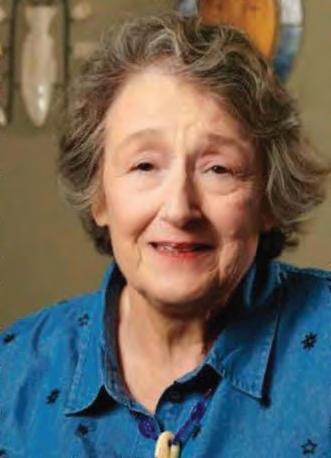
In the end, readers diving into this long-life collection will be fascinated by this poet’s journey, or her mere existence as a creative writer: “My poems can be queued by a mere sound, a single word, a photo in Life or Time—almost anything. The secret is that that clue must fascinate—and the fascination must not wane, no matter how much time passes.”
Let me conclude with the blurb I was asked to write for the collection:
Like a Chinook—both a wind and the salmon— her art almost levitates from home streams where she has anchored herself. Ann shapes us an enormous cut bank with her river of words. She is storyteller, as each poem is a chrysalis in Chandonnet’s narrative. I feel cool gravel beds where my life as a reader galvanizes onto hers. Ann’s attention to life encapsulations is the bedrock of her anadromous words. More than a hundred poems are celebratory as well as incantations for people, places, pathways taken. From the shape of her birth in Lowell, Mass., to her home haunts in Chugiak, Anchorage and Juneau, Alaska to her residence in Vale, North Carolina, and now in Lake St. Louis, MO, Ann is the definition of “word smith,” as she’s honed her ear and mind’s eye to revel in humanity and Earth. Her poetry is trawled from a multilayered observer of life, as she’s been a wife, teacher, mother, newspaper reporter, food historian, non-fiction book author, and poet. She collaborates with so many muses and historical narratives in this long collection. Yet, her voice is a mercurial shape of wind on water.
142 CIRQUE
Ann Chandonnet
INTERVIEW
Sandra Kleven
Like a Mountain, She Creates Her Own Weather System: An Interview with Diane Carpenter, author of In the Winter of the Orange Snow
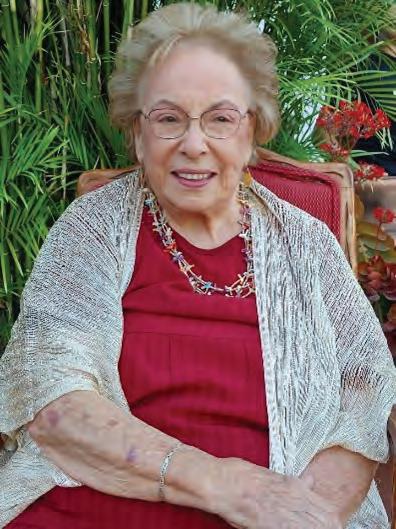
(Cirque Press, 2023)
I, too, lived in Bethel, intermittently, from 1984 until 2004. My time in Bethel totals ten years if you piece each stint together. I knew a Bethel of trauma and loss where, in national rankings bad things (suicide, domestic violence, child abuse), the region sits near the top. Diane tells an earlier story showing a rich history of (along with the partying) cooperation and caring.
Diane gives this overview in the introduction to In the Winter of the Orange Snow:
Diane Carpenter and I were working against a deadline. Cirque Press had to get her memoir into print and hard copies into our hands in time to manage a formal release at Bethel’s famous Cama’i Festival. Traveling from Alamos, Mexico, this would be her last trip to Bethel. A big deal for one with seventy years of history there.
In the Winter of the Orange Snow covers the pranks and parties that took place in 1950’s Bethel when Diane and Bob (the new dentist) were in their 20s. More than this, Diane’s Bethel is a town that delights in connection and community coexisting with pre-statehood lawlessness. She writes, “Non-natives who moved to Bethel were independent and adventurous and liked its no-rules environment.”
Bethel was accepting, diverse, creative, and non-judgmental. Alaska was still a territory then with a total population of 180,000. [Bethel was] a remote town of 900 people that was only accessible by a 1-hour flight across the Alaska Range… Our lives were enriched by the close interactions we had with the villagers in the surrounding Yup'ik and Athabaskan settlements… We had no newspapers, TV, or telephones. Because of all this, “the town developed a culture of its own.” What made it unique was the way it combined the best of both the 50s and the 60s. We lived for the moment…
Last Trip to the Tundra
Cama’i is a late winter celebration of Native dance held in March, while the river is frozen hard enough to bear traffic. Cars, trucks, and snow machines take the river route—the only route—to the hub town of Bethel, Alaska. Village dance groups take the stage in the high school gym until the school trembles with drumbeats and chants. This famous dance festival has been going on for 35 years. This event would provide a center to our Bethel trip.
143 Vol. 13 No. 2
Diane Carpenter
With others on the Cirque Press production team, we had been working via Zoom for months. As we wrapped up credits for photos, PDF reviews, and corrections, Diane celebrated her 90th birthday in Alamos, Mexico. Reviewing her writing, I marveled at the grit shown in her adventures.
Because there are no roads between Bethel and the 54 outlying villages, commercial flights provide everyday transportation. Not cheap. Back in the ‘50s, Diane confronted this transportation problem by buying a plane and getting a pilot’s license. Somehow that never occurred to me when met with similar circumstances in 1984. This kind of pragmatic daring leaves me shaking my head.
Unstoppable at Ninety
By mid-March, this hefty book was in our hands and the Bethel trip commenced. Friends drove Diane to Tucson, Arizona. From there she would fly to Alaska. Once in Anchorage, she told me, “There was a little mishap in Tucson.” When met at the Tucson drop off point by an attendant with a wheelchair, she was briefly left unattended. The wheelchair rolled backwards off the curb. “I fell to the street,” she told me, “and landed between the curb and the car.” Refusing a requisite 911 call to just to be checked over, she directed her aide to roll her to the jet.
On arriving in Anchorage, after six hours in the air, she said, “I’m kind of shaken up.” She spent the night in Anchorage then headed to Bethel for the pomp and celebration of launch events, media interviews and a last good-bye.
First up was a library reading where Diane was met by friends, some maintained for half a century. In the Winter of the Orange Snow was a hot commodity. Friday night, Diane met with a few fans and a radio reporter.
Emergency
Later that night, we shared a light dinner at our Airbnb, conveniently located across the street from the organic farm run by her daughter Lisa and son-in-law, Tim Meyers. In this stormy, muddy town, they were our wheels.
Saturday morning, we were set to start book sales with a table, signage, and the author on hand. Dating from her arrival in the mid-50s, this was it—her final appearance. In the morning, sounding a bit alarmed, Diane told me, “I am having trouble breathing.” A portable oxygen concentra-
tor had been left behind in Mexico. “I thought I could do without it for a few days.”
The wind was brutal hitting us with sideways needles of nearly frozen rain. Lisa and Tim came in a flash. Maneuvering into the gale, down the front stairs with a walker, we struggled to help Diane climb into Tim’s truck. Lisa and Tim took her to the hospital and left me at the festival to sell the books.
Corona Virus
They treated her breathing issues at the hospital and then sent me a text. “Mom tested positive for COVID.” Oh dear. I was absolutely exposed, too. Time to pack up book sales at the craft fair. Now what?
The next day, we quarantined at Meyer’s Farm. Diane had no symptoms—never did get sick. Neither did I. During that long Sunday, Tim and Lisa prepared soup and salads from their organic harvest. For an hour and a half, Diane and I talked. I recorded accounts from her early days as a pregnant and parenting music student to the ten years of homesteading at Stoney River.
What has made Diane the unstoppable, unflappable, force of nature that she is? Some mountains create their own weather systems. Some people do, too. Diane is like that.
Sandy: What shaped you? How was it that you developed your tenacity?
Diane: I think part of it I was born with and then circumstances affected that. My father was a musician and we traveled around all over. We moved from state to state. I was a voracious reader. I never had other people that I was trying to fit in with. I was reading Mills and Hume when I was 11.
Sandy: Sounds like this lifestyle freed you from the social forces of public school.
Diane: True. I had an interesting life. I didn't feel deprived. When my parents were divorced and the Second World War came, we moved in with our grandmother. There were four children and I had to help all the time. Then, my grandmother died, and my mother started working three jobs. As the oldest, I had to take care of the house and the children. That was from about ages 12 to 16.
144 CIRQUE
~~~
Sandy: Early responsibility does build competence.
Diane: It does. I had skipped two grades and I got a full music scholarship to the University of Louisville. In 1949, after my junior year in high school, I entered the university. Nobody knew I was 16. I looked a lot older. Then Bob and I fell in love. He was trying to finish dental school, before going into the service and so we got married. I unexpectedly got pregnant…
Diane: His parents paid his tuition, but we worked two jobs all summer to make expense money for the winter. It just wouldn't have occurred to either of us not to finish school.
Sandy: In the 1950s there were no programs for married or parenting undergrads.
Diane: Assistance had to be informal. Bob and I lived on $15 a week. Because of our shaky finances, the dean of the school found me a day job at an oil company. They gave me permission to sign up for classes, full-time, but I didn’t have to go to class. I would work all day and then leave the job at 5 pm to go out to the university.
Sandy: A demanding schedule when pregnant.
Diane: We made it work. At the stop where I changed buses, they would have a cheeseburger and a malt ready for me. I would run in with the correct change and transfer to the other bus. At school, other students kept class notes for me. My teachers would come out two nights a week to help me with practice and study.
Sandy: I can envision this. I, too, went to school while parenting. Requires lots of juggling and prioritizing. You had a lot of people pulling for you.
Diane: They knew that I was determined to get an education. I played my junior recital seven months pregnant. After the baby was born, Bob's mother babysat for the first six weeks; after that, I took the baby to school. My friends at the university found the biggest practice room. Everybody brought their old baby equipment, and I took Kathy to school with me.
Sandy: At this point you entered your final year?
Diane: Yes, this is how I did it. On my left arm, I had my
books, my music folio and my viola. On my right arm, I had my purse, my diaper bag, and Kathy. I had to walk a block to the bus like that. I had to get on the bus sideways. I would have the correct change in my coat pocket and the bus driver would reach over and take it out.
Sandy: Amazing.
Diane: I managed to finish a bachelor’s in music education. College was one of the best experiences of my life. I was around people who I could feel comfortable talking about things that are important to me. This was the University of Louisville. Louisville School of Music.
Sandy: The support you got in school was unheard of, especially with the dean who set it up, so you didn't have to attend class.
Diane: That was amazing and that's in 1951. I made four As and a B and got a good grade on my student recital…I learned fast.
Sandy: It seems uncommon for a guy of that age and era to be so accepting in a marriage to a resourceful woman —one with a mind of her own. What do you think made Bob the way he was?
Diane: Looking back, I would say he was so confident in his masculinity he did not have to be macho. We were just able to decide who is the best person to do this and who was the one to do that. I was an early feminist. I didn't think I was ever going to even get married or have children. It was rare for a man of that age to be married to a feminist.
Sandy: This is well before the women’s movement of the 1970s.
Diane: Our friends thought that we would never make it in marriage. We were just too different. They couldn't think of anything we had in common. Bob was more of a nurturer than I was. Bob was raised completely differently. For instance, his parents had this envelope system. If they had a bill due in a year, they would take 1/12th out of their income each month and put it in an envelope so that when the bill came due, they had it. I mean it's a wonderful idea but to me it seemed totally bizarre.
Bob died when Diane was 58 years old. Not long after,
145 Vol. 13 No. 2
she had a stroke, and a prior stroke was discovered then. To recover she went for six weeks to a spa in Mexico. At one point the instructor told her, “I've known a lot of people since I started working here and you have the strongest prana of anyone I've ever seen. Don’t worry Diane, you are going to get your health back.” These encouraging words had a tremendous impact on Diane. The unstoppable, Ms. Carpenter got better. ~~~
Sandy: As you began to think about writing this book what was your motivation?

Diane: It was such an amazing time. There were all these crazy people, interesting people, and events that happened that wouldn't have happened anywhere else or at any other time. There are probably similar oddball characters everywhere. It's just that you would never have had the chance to meet them. You might only know people who belong to your own church, or clubs, or your interest groups. At that time, community was everyone’s responsibility, and we had concern for others whether we knew them or not. Western culture’s priorities of acquiring money, status and power had not altered our world. I did not want these people to be forgotten. ~~~
Medical providers in Bethel moved in and out in an endless rotation. But Diane and Bob stayed. Until her move to Mexico at around age 70, the Bethel region was her home. Diane is now at work on a second memoir, covering the homestead years at Stoney River. Diane and Bob would homestead in Stoney River for ten years and set up a village there bringing in housing and electricity. They built an airport at Stoney River and set up a school. During the first year at Stoney River, she told me, “I had three kids under three in a one-room cabin. Every piece of cloth was put to service as a diaper.”
~~~
Diane: Every region had to set up an economic development plan. There were no organizations around to do it. I would have to write it. I was making it up, of course. Bob took time off and I moved out to a little guest cabin. It had a bed, a stove, a desk and a typewriter. I didn't leave that building for two weeks and I wrote this economic development plan. It's about an inch and a half thick.
Sandy: Bob knew you needed a room of your own.
Diane: Bob provided everything. Took care of the kids and he brought me meals. During the first five years in Alaska… I had absorbed a lot. I was asking questions and reading, so probably I knew more than I thought I did. We got the economic development plan in and qualified for all these federal programs. A year or two later the Alaska Federation of Natives hired an economist to prepare regional development plans and they built on what I had written.
~~~
Diane was an advocate for local jobs questioning the practice of outside contractors bringing in lower 48 work crews. She fought effectively to give local people a say in matters concerning them. Returning to Bethel, Bob ran his practice for years until his passing. In the 1990s Diane set up and ran a hotel and restaurant there.
In the Winter of the Orange Snow covers a pre-statehood, Bethel. A frontier kind of place where laws were few and enforcement unwelcome. Diane and Bob were young, and the social mix included everyone—Natives, non-Natives, old timers, newcomers. “Everyone helped each other. We depended on each other. We had to.” Also, as detailed in the book, they got away with everything short of murder. Aside from many accounts of raucous and risky behavior, a deep warmth and mutual concern prevailed. Diane wants readers to know that this kind of supportive community once existed in Bethel because maybe the vision of how it was can make Bethel better today.

~~~
Diane Carpenter is dauntless. Everything physical is a challenge for her now: walking, seeing, hearing, breathing, but she carries on. Getting dumped to the street at the airport? No impediment. COVID impacting the Bethel victory tour was too bad, but we carried on. As noted, I didn’t get sick, and Diane was never really symptomatic. She tested negative a few days later and flew alone to her hacienda in Alamos, Mexico. It was unceremonious but you take what you get and carry on. In the Winter of the Orange Snow is a Cirque Press top seller.
146 CIRQUE
REVIEW
Melody Wilson
A Review of Bruce Parker’s Ramadan in Summer (Finishing Line Press, 2021)
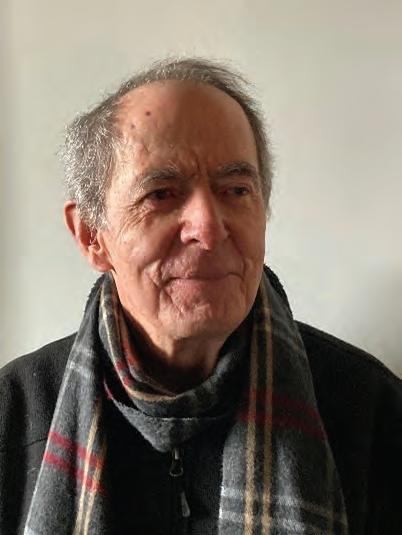
We first encounter the voice of the poet in Bruce Parker’s Ramadan in Summer as a witness, a lone worker in the title poem when he asserts, “the heat was not beautiful” and the “feeling of thirst and heat, hunger and dread, was not beautiful…But the call to prayer was beautiful” (1). It’s an invocation that begins this collection with the reader as the worker “listlessly” wandering the unfinished building of their life, “picking things up and putting them down.” Picking up, putting down, examining things becomes the theme of Section I: from Fasting to Dining.
A meditation on the transience of life, Ramadan in Summer invites us to let go in the first poem, but by “All Things Will Change,” the third poem in the chapbook, the question is truly called. The poet uses the traditional image of leaves falling, but then equates his mind to a leaf “losing its grip / on the body’s twig.” We presume the result of this release, but Parker inverts it—the tree doesn’t let him go, his mind “release[s] its hold on/those [he] loves.” But the poem closes embracing the change.
This acceptance of life passing is explored again in “Daffodils” (with an epigraph from Ted Hughes) as a Holbein miniature—all the parts are there, they are perfect, and for this instant still. Parker’s economy is present as always, but the turn is complex and engaging. The turn is used more overtly in “Jemez Mountain Cabin,” a lovely recounting of a family in an ideal pacific location where “Duff silences our voices, softened our steps,” and children are called in from play “like dreamy cattle,” we are mesmerized by the perfection, only to be undercut by the last line, the truth of it—that “no one cared how everything ends.”
This is an interesting sleight of hand, and it shifts us from the first theme, the plain passage of time and life, to the second, the transience, perhaps futility of all things. Parker tips his hand to this belief when he titles the second elegy to his friend, the poet Jim Harrison, “Oblivion.” In it, he honors the simplicity of Harrison’s passing as a “marvelous
nothing of no distress/no struggle, no bliss” but ends “It is there before the symphony begins/there after the poem’s last sigh.” And here we begin the consideration of Oblivion. “Chaos” another miniature so perfect that to describe it requires more words than it contains, uses the melting of snow and footprints “washed away” in surf as a kind of purification, and in six lines, we know we are in very deep. In “From My Window I See” we are led to believe we are looking at a hummingbird, a vision no poet can resist either in writing or reading but are left studying the space the hummingbird leaves behind on exit. The passing of the hours of light in Ramadan, the crumbling of a Daffodil, the years we live between the oblivion of before and after. Nothing is simple, we are the pause.
This sensation of interstices is perfected in “The Mind Gathers and Dissolves.” The poet invites us to imagine salt being stirred into a glass of water, and off we go; then we’re in the ocean, in the spray of a whale, sprayed into the universe,
147 Vol. 13 No. 2
Bruce Parker
gathered up, spit out
Swished and rinsed
By the general rule of entropy
Its constituents distributed
Unformed, forgotten.
We are at one with everything; we can even forgive our poet for his wandering eye in “Dining Out” when he questions whether “the server’s heart- / shaped tush is an illusion.” At the close of this first section, filled with such beautifully wrought grappling with existence, I found myself wondering if I had read that right. But I had, and with the final couplet (following four tercets) the section finishes perfectly:
Some sweet things
Are now untouched.
In the second half of the book, II: From Wine to Ice Cream, we are no longer discovering our transience but trying to suspend it. In this section we are introduced to an other, who I take to be the poet’s love, in the first poem “Wine Dream” in which the poet, old and dozing, has dreamt her profile and startled awake. The tone of the book shifts in the last lines of this poem,
Before I sleep again I will hold you like wine in the cup.
It’s as if we’re applying what we have learned in the first half of the book, when in “Just a Moment, Please,” the lover has arrived and the poet is “speechless/in [his] obedience to/some hunger for/what you mean/and how you are here.” But he does not let go of the intellectual rigor of the first section and turns this momentous event to:

one brief moment in the universe and time
is like a shower over us the good dripping off every moment running away.
Meticulous development of time and space are employed to provide this instant with the gravity it deserves. If I had read this poem without having just read the first section, it wouldn’t have had the same impact: I become aware of the cohesion of this collection.
Parker includes two long poems in this section of the book, but the one that calls out to me is “Poem Beginning with Erasure.” He begins by taking us back to the ocean, the waves and the tide, but this time he expands the world of the poem, then contracts it to “pistil, petal/cup like hips” and we are experiencing a moment with his lover. There are many elements, people, a boardwalk, but the two of them “spoon, bifurcated/alone as one/plus one. That space between them, pulls me back to the hummingbird, the space left behind, and I see that space between this couple, so bound but still two people who we know will be washed away but who, for now, are together in
the present eternal as it gets.
The poem Parker has used to close the collection, “Ice Cream” is a lovely coming of age poem that I will leave for you. Instead I will close with a consideration of the penultimate poem in the collection, “Winter is Coming Sure” where again, we are napping. We open with:
Going in coming out— the door’s the thing.
148 CIRQUE
Then we meditate on the coming of winter, the passage of seasons, the falling of snow, all of which we have considered before in this book, but then:
How shall I greet the absence of birds you upstairs asleep in the middle of the day knowing if you go before…
and the question has been called. With the entirety of existence studied in this chapbook, the acceptance of our lives as just a pause between two states of oblivion, that even when spooning the space between us is undeniable, after the quiet grace of this study, this question reverberates in a tone entirely new to the collection. And it is not answered. We know the answer, and we are inconsolable, though Parker does have an answer.
what is certain is that winter will come to think it won’t
is to think the leaves of spring have run away without waking up
The unstated admonition to live now is as beautifully said as I’ve ever seen it and it is unforgettable.
What a beautiful, thoughtful chapbook this is. Every word matters, the ideas are intertwined and fully realized. Each poem is meticulously specific and even when they expose a futility we try to ignore, Parker offers us some solace, even as he finds it himself in the close of “Winter is Coming Sure”:
winter comes leaves run— the door’s the thing.
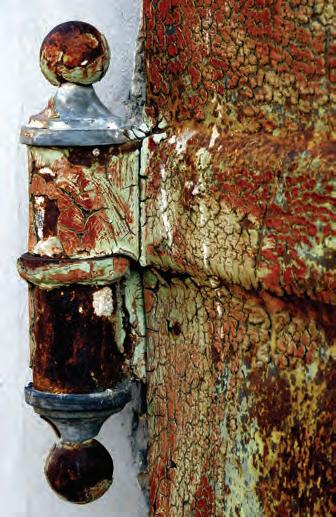
149 Vol. 13 No. 2
Jim Thiele
Hinge
FEATURE
Cynthia Steele
AWP: Cirque Press Sparkles in the Emerald City
Photos
by Cynthia Steele
Sandra Kleven and my great fortune this year was attending AWP—the Association of Writers and Writing Programs Conference & Bookfair—in Seattle, so close to home. The proximity drew hundreds of Cirque friends.
Seattle is just so much a part of Alaska’s same, big backyard and vice versa. Many of us who visit have lived there— as I did the first five years of the 90s—seeing Nirvana up close and personal in their heyday as well as Hootie & the Blowfish and about 50 other bands and publishing my first writings through a New Age bookstore in Redmond. Sandy grew up in Bothel and often returns, recently for a Bob Dylan concert. Seattle is our window back in time, and it’s filled with the good stuff and good people.
We were excited to go on this journey to network, but, of course, most of all to see our Pacific Northwest writers with whom we work regularly—Cirque Press and friends. We felt at home in the Emerald City, and this is the feeling we ushered in—warmth and comfort, looking forward to seeing our friends and friends to be. We would also be seeing Sandra’s son, Michael, and fiancée, Stephanie, who live in the area. We would be hosted and cared for by Sandra’s friend Kay from her graduating class at Bothel who lives in The Muk (Mukilteo).
A large part of the Seattle sentiment of welcome includes the publishing and bookstore world and bookish pubs. AWP roped in some lovely venues to host fellow publishers and authors of our area. An inspiration.
The light rail from the airport ran us to the rental car, the weather was mostly sunny with bouts of rain but abuzz with excitement. We had perhaps a little trepidation for the number of people before us.
AWP is the annual destination for writers, teachers, students, editors, and publishers of creative writing. This year, Sandra and I attended along with 9,037 others from March 8 to 11. Only six percent of the events were “virtual only.” Each year, the conference travels to a different city
in North America to celebrate those of the writing world.
With the two Sandra’s—Wassilie and Kleven—we made our way down into the hatch of the Rabbit Box, a bar and social, literary, music, and theater scene that appears out of nowhere off of Pike Street Market. This popular meet and greet with its lovely stage is playfully illustrated rabbit style—like a page from Alice in Wonderland by cofounder Tia Matthies, an aspiring children’s book author and illustrator who has transformed several establishments with her artwork. She and cofounder Robynne Hawthorne participated in AWP via their venue offerings, much to our delight.
Porphyry Press led the evening’s events with Jeremy Pataky and his lineup of readers for Compass Lines’ PreLaunch Party.
Literature, revelry, and signings (Oh, my!) and we were able to stay late enough to enjoy the first few readings before we had to dash off: CMarie Fuhrman read at the Prophyry event first and had been featured at last year’s Kachemak Bay Writers Conference in Homer, Alaska. I had been so compelled by both the KBWC keynote Jericho Brown and Fuhrman that I had immediately bought a book by each while still in Homer.
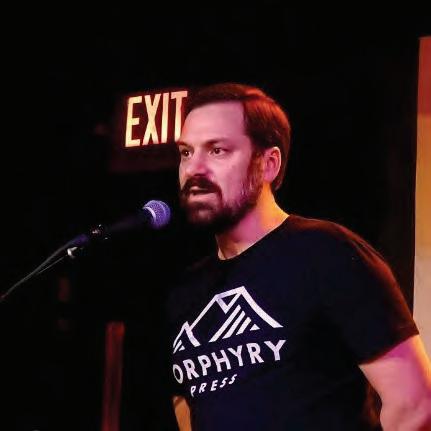
150 CIRQUE
Jeremy Pataky Publisher & Editor, Porphyry Press
Fuhrman’s “End Times” particularly moved me, which begins:
it's the last day of the earth and I rise and feed my dogs, water the Christmas cactus and spin off the dying bloom. This, I am told, allows for more blooms.
Fuhrman is so able to put herself in a myriad of situations. ”End Times” appeared in EcoTheo RCollective as their poem to celebrate Earth Day.
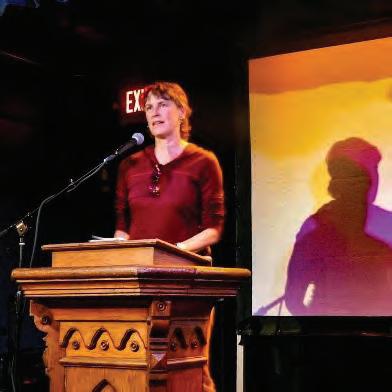
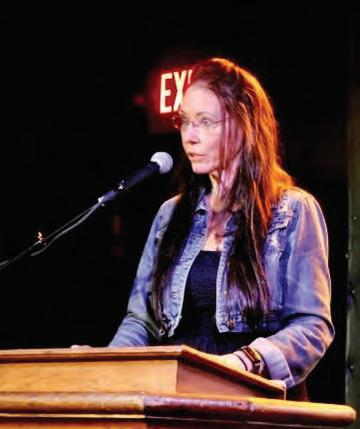
Spending the evening in a room filled with Alaskans and people from the Pacific Northwest was such a great treat. Many of whom are writers and writerly companions, and many appear between our pages, including Shauna Potocky, whose book Yosemite Dawning was recently and proudly published by Cirque Press. Shauna helped run our booth throughout the conference so we could take breaks and attend panels.
We were also able to see Elizabeth Bradfield before we left, which was an honor, as Bradfield is an excellent photographer and poet from our overlap in our UAA programs—mine in English Literature and hers in Creative Writing. I’d never miss her readings. Bradfield and Fuhrman are part of the triad that wrote the Cascadia Field Guide, a new book already on many shelves (the third author is Derek Sheffield). After the first two readers, it was time to take Cirque author Sandra Wassilie to catch the ferry to where she was staying.

As Sandra and I pulled the ropes of our Cirque and Friends banner up to adorn our booth, people trickled into the conference center, many asking to be directed to coffee or food in the vast area, but that’s just how many of our conversations began. Interested parties stopped to chat with the writer featured for the time slot, or other Cirque authors staffing the booth, or Sandra or myself. That booth would be our home for long days, where walking from one area to another took precious time in the multilevel complex. Panels and events during the conference were spaced far apart, on up to five floors, with the time between them just 15 minutes, but we managed to still squeeze in a few panel presentations.
A couple of these presentations were integral to my book completion. My book Thirty Before Thirteen tackles tough subjects, like moving multiple times at a young age. Understandably, the presentation “Creating an Author Platform Based on Tragedy without Sounding Perpetually Tragic” helped. This panel taught how to build authentic, sustainable reader connections that neither shy away from dark topics nor dwell on them. Another presentation I attended was “Misbehaving Memoirs” on intertwining research and memory. Sometimes the truth is funny, even
151 Vol. 13 No. 2
CMarie Fuhrman
Elizabeth Bradfield
Sandra Kleven, Shauna Potocky and Sandra Wassilie
when it hurts. Another presentation “Using Humor to Tell Our Stories” was about the tradition of Black, Indigenous, and other writers of color combining humor and wit to wrestle with heavy themes. I found this combination profound and more palatable. “Trauma in Unstructured Memory vs. Crafted Memoir” taught how craft transforms pain into art that connects.
The most fascinating panel for my book without a doubt was “Writing about Kith and Kin: Dos & Don’ts, Rights & Wrongs, Risks & Rewards.” Anne Lamott writes: “If people wanted you to write warmly about them, they should have behaved better.” Easy to say, difficult to execute. When it comes to writing about real people in memoir, some writers opt to tell all (Frank McCourt), while others avoid the intimate (Dinty Moore), change names (Stephanie Land), or create composite characters (Jeannine Ouellette). Authors have a passion for robust creative expression, but should we write whatever we want, even if it’s true? This panel changed my view of my entire book and allowed me to be certain I followed some specific guidance, including well-rounded characters and a grid of conscious thought processes to avoid legalities. I also attended Sober AWP and Yoga for Writers for which I am forever grateful for the conference’s opportunity for continued recovery; what a wonderful aspect.
Sandra Kleven, who attended a couple panels as well, emceed the March 10 Cirque Press reading at a local venue, Northlake Lutheran—the church she and Rich were married in—which we are so pleased has welcomed the artistic community, even putting on a recent production of Godspell, involving Sandra’s son, Michael. Northlake Lutheran has an “Imagine” component that supports the arts. Imagine also welcomed its second Cirque Press event. We celebrated the release of multiple books and Cirque journal #25’s release with readings for a full crowd and a book signing table.
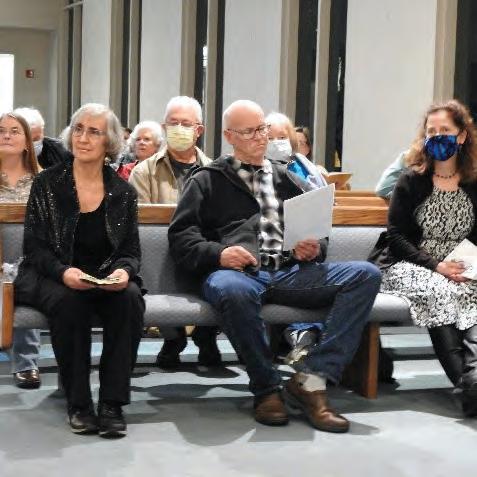
The following writers read from new Cirque books (or other writings):
Lynda Humphrey from Miss Bebe Comes to America
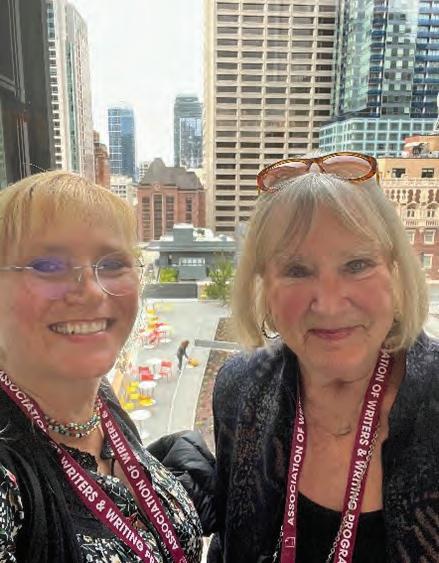
Alan Weltzien from On the Beach: Poems 2016-2021
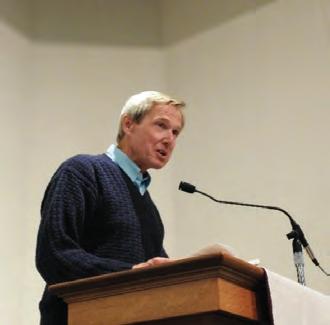
Shauna Potocky from Yosemite Dawning: Poems of the Sierra Nevada
Sandra Wassilie from The Dream That Is Childhood: A Memoir in Verse
And Dave Rowan from a new book he’s working on that follows his first Cirque book Loggers Don’t Make Love.
Readers from Cirque #25 included: longtime Cirque contributor, Sue Fagalde Lick, a prolific and well-published author, read from No Way Out of This, her memoir about the Alzheimer’s journey with her late husband, Fred, that will be published in June 2024 by She Writes Press. Scott Hanson (whose first book is Infinite Meditations: for Inspiration and Daily Practice is inspired from his experience with studying the Tao Te Ching) read a family story. Mary Crane read poetry published in Cirque and has two volumes of poetry, What I Can Hold In My Hands and At First Light published by Gazoobi Tales Press. Mary’s work has been translated into Russian, and she is translating contemporary Siberian poetry into English. Kristina Marie Boratino, a poet, fiction writer, and painter also read as did
152 CIRQUE
Cynthia Steele and Lynda Humphrey
Alan Weltzien
Sandra Wassillie and Dave Rowan
Tom Mitchell, Tom Brush, Martha Kaplan, and Bruce Parker.
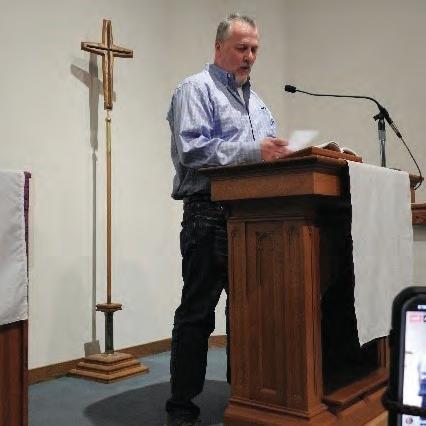
Another day, we stopped for phone calls near Broadway East and E. John St., near the new Conference Center. A perhaps 20- by 40-foot sheet of paper on it read “wall of questions” at the top. Scrawled on it were many sentiments; among the most interesting or timeless were:
Is this all a fever dream?
What is actually helpful?
Why are the people who are supposed to be protecting us hurting us?
Why do you trust the state?
Do you really love who you are?
How far would you go for love?
What makes you feel cared for and why didn’t we prioritize this?

Many of these become the topics of poems over the years. Some are just unanswered dilemmas that plague us. And some are contained in the plethora of books at the AWP conference.
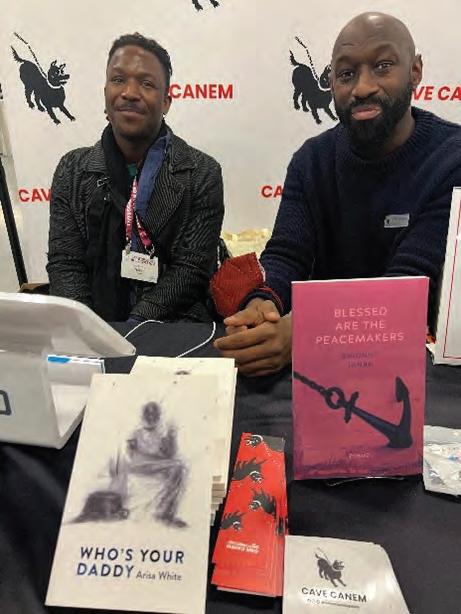
An important connection kindled at the conference was with David Onofrychuk, an Alaska Pacific University Professor of Writing. After funding for the University of Alaska
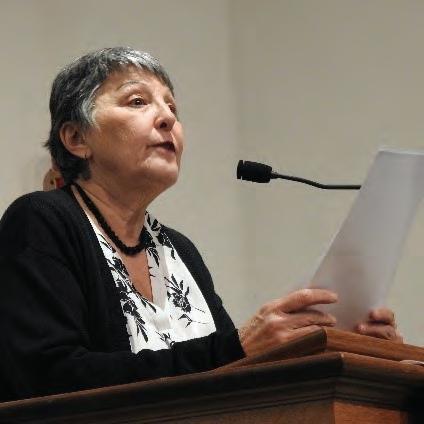
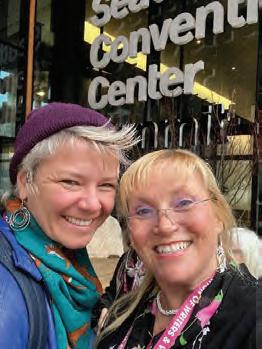
Anchorage’s low-residency MFA in Creative Writing program was cut, a great sadness prevailed. David is taking this tragedy on by creating a new space for writers as APU’s Director of their burgeoning MFA program. David attended the conference, and through our connection, Cirque was invited to speak this week at APU’s launch of the program. Along with principal owner Vared Mares, of Spenard’s own Writer’s Block bookstore, who published Sandra’s book Defiance Street: Poems and Other Writings, I shared my experience and hope about what opportunities post-UAA MFA in Creative Writing might look like. Laurie Evans-Dinneen, APU’s Chief Advancement Officer also shared her experiences and hope for the future. Also involved with the APU program are Tara and Chaun Ballard, poets who shared their writing with us through Poetry Parley and whose writing appears in the pages of Cirque Our world of the literary community grows and us with it.
Leaving the conference was a bit sad. The entire trip was full of people and opportunities to share our work with and especially facilitate the work of Cirque writers. Helping to foster literary community is always a deep honor for Cirque. We will be seeing many of you in August as we foray out into the Pacific Northwest yet again, mostly in local, public venues for more readings with our authors.
153 Vol. 13 No. 2
Nancy Knowles,
Sue Fagalde Lick
Scott Hanson
Homer Writer Libby Bushell
Josiah Aiken Yale scholar and poet and Dante Micheaux Director of programs at Cave Canem, University of Pittsburg
CONTRIBUTORS
Luther Allen writes poems from the flank of Sumas Mountain, Washington. He co-facilitates the SpeakEasy reading series, is coeditor of Noisy Water: Poetry from Whatcom County, Washington, and is author of a collection of 365 poems, The View from Lummi Island, available at http:// othermindpress.wordpress.com. His work is included in numerous journals and anthologies, including WA 129; Refugium, Poems for the Pacific; For Love of Orcas; Washington Poetic Routes; Solstice: Light & Dark of the Salish Sea; The Madrona Project – Human Communities in Wild Places and Art in a Public Voice; and Sing the Salmon Home. His short story, “The Stilled Ring,” was finalist in an annual fiction contest at terrain.org. He views writing as his spiritual practice.
Alexandra Ellen Appel: I have been writing all my life, publishing on, and randomly off, since I was 22. I earned a Doctor degree in a then, offshoot, world away from Education morphed into a philosophy of deep adaptation in a time of climate collapse, Eco-psychology. A small collection of my work, A Mouthful of Hardship and Honey, Hedgehog Press, Clevedon, UK will be released late spring/early summer 2023.
Sarah B. Aronson is an award-winning writer and radio host. She holds an MFA from the University of Montana, and her debut collection of poetry, And Other Bodiless Powers, received the 2018 New American Poetry Prize. Her writing has also won an Academy of American Poets University Prize, a Fishtrap Fellowship, and a Pushcart nomination. Her nonfiction can be found in Anglers Journal, The Flyfish Journal, and the anthology We Leave the Flowers Where They Are: True Stories of Montana Women. She lives in Missoula, MT where she maintains a climate-aware psychotherapy practice. Sarah was raised by a glacier in Southeast Alaska.
Joe Aultman-Moore is a librarian, guide, and writer living in Haines, Alaska. His award-winning essays and articles have appeared in Daily Science Fiction, Earth Island Journal, and Taproot, among others. Find his work here: https://jaultmanmoore.wordpress.com/publications-2/ and on Instagram @joeaultmoore
Tim Barnes taught in the English Department at Portland Community College for twenty-five years, where he was the chair of the creative writing department. He is author of several poetry collections, most recently Definitions for a Lost Language. His poems have appeared in Poet Lore, Abandoned Mine, Cloudbank and Basalt
Gabrielle Barnett lives and writes in Southcentral Alaska. She spent a formative year studying in Vancouver, BC. Her poetry appears in Cirque and Alaska Women Speak. Her prose appears in the anthology Building Fires in the Snow
Elizabeth Belanger: I am a self-taught artist living in Anchorage Alaska. I love painting portraits and mostly paint women who are a blend of myself and characters from my imagination.
Toni La Ree Bennett’s verbal and visual work has appeared in Cimarron Review, Caesura, Gold Man Review, Cirque, Gravel, Puerto del Sol, Hawaii Pacific Review, december, and Memoir with a poetry chapbook publication by Finishing Line Press, Solar Subjugation, among other publications. She lives with a feisty finch named Petey. Photography and writing samples can be seen at www.tonibennett.com.
Jennifer Bisbing is an award-winning book editor and photographer originally from the Midwest, now living in Montana. Raised by a renowned forensic scientist, Bisbing’s murder mystery Under the Pines reveals childhood memories of trips to the crime lab. And in her forthcoming poetry chapbook The Price of the Repair, villains still linger as she rummages through the high desert of Idaho and mountains of Montana. She currently writes for Montana Quarterly, edits for national and international publishers, and has poems published in several literary journals.
Kristina Boratino is a poet, fiction writer, and painter that has lived in the PNW her entire life. She is currently working on a third book of poetry. Kristina has been published in Route 7 Review, Cirque Literary Journal, Sonder Midwest, Erase MS, Compassion International Magazine, and more. She resides in Edmonds, Washington with her two children.
Jeffery Brady writes from his cabin on West Creek on the traditional lands of the 'Lkóot in Dyea, Alaska. He reached the honors class in creative writing at the University of North Carolina in the late 1970s before discovering Alaska and branching off toward a 37-year career running a community newspaper. Now retired, he has returned to his love of poetry and fiction, drawing from south and north. His poetry has recently appeared in Cirque, Tidal Echoes, and on the 49 Writers broadside during the pandemic.
Wendy Brooker travels around her corner of Alaska, writing reports, poetry, and short stories. She is a member of AWG, 49 Writers, and SCBWI.
Jack Broom is a Seattle native who retired in 2016 after 39 years as a reporter and editor at The Seattle Times. He earned a bachelor’s degree from Western Washington University in 1974. His work in photography began in the 1970s as a reporter/photographer for The Wenatchee World, where he worked before going to The Seattle Times in 1977. In recent years, his photographs have won awards at state-fair competitions in Washington and have been featured in previous issues of Cirque. He is a past president of the Edmonds-based Puget Sound Camera Club.
Randol Bruns: My first paying job was at the Globe Casket Company. One day I was back there driving nails. A woman came back, She said: “Would you lay down in that casket?” I said, “what?” She said, “Yes, please lay down in that casket. My husband was as tall as you. I always thought maybe the undertaker had to break his legs to get him in there.” So I got in one. It was an odd feeling. I’d never done it before, never even thought about it. To me, all I was doing was building a box. I never worried about death. When the body’s gone, I assume the soul goes somewhere. Nevertheless, I laid down in there. It was a strange feeling, I thought: someday you’ll be in one of these And you won’t be able to get out. Now, that’s something to think about.
Cindy Buchanan was raised in Alaska, has a B.A. in English from Gonzaga University, and was a preschool teacher until she retired. She studies poetry at Hugo House in Seattle, Washington where she currently lives, and is a member of two monthly poetry groups. Her work has been published in Chestnut Review, Evening Street Review, The MacGuffin, Hole in the Head Review, and other journals. Her first chapbook, Learning to Breathe (Finishing Line Press), will be published in 2023. Find her at cindybuchanan. com.
C.W. Buckley presents poems of gentle witness in powerful images. He writes about precious things, and what their loss brings to us all. Sustained by the Cedar River Watershed, his work has appeared in Image Journal, Cirque Journal, Timberline Review, and Dappled Things. His long-form investigative poem, “Horizon,” was featured in the anthology Undeniable: Writers Respond to Climate Change and his chapbook, BLUING, is available now from Finishing Line Press. Buckley earned degrees in Human Biology from Stanford University and Religion from Claremont School of Theology. A trained voice actor, he lives, works, and writes in Seattle with his family.
Mike Burwell’s poems have appeared in Abiko Quarterly, Alaska Quarterly Review, Ice-Floe, Pacific Review, Poems & Plays, and Sin Fronteras. His poetry collection Cartography of Water was published by NorthShore Press in 2007, and in 2009 he founded the Northwest literary journal Cirque. He’s been a Taos resident since 2013 where he finally found home among the wild landscape and its wildly generous poets.
154 CIRQUE
Abigail Calkin: I have eight or nine published books of poetry, fiction, and nonfiction. Segments of books, articles, and many poems have also been published in literary and behavior analysis journals. At present, I have three other books, too many, I'm writing that are in various stages. I live in Gustavus, Alaska and also spend a couple of months a year in the southeastern Oregon High Mountain Desert.
Teri White Carns publishes photographs, as well as haibun and tanka prose. She also writes law review articles and reports on justice system research and holds an MFA from Antioch University in LA (2017). She has lived in Anchorage, Alaska for fifty years, with childhood and college roots in southwest Michigan.
The tough landscape of the Yukon-Kuskokwim Delta required someone like Diane Carpenter. As the decades passed, Diane was a teacher, a social activist and statewide leader. She was elected mayor of Bethel. She chaired the Alaska Humanities Forum and the Council on Domestic Violence and Sexual Assault. She was a state delegate to the National Women’s Conference in Houston and lead organizer of the Alaska Village Electric Cooperative (AVEC). She taught in public schools and the local college. As she approached retirement, she set up the Pacifica Institute, a non-profit educational organization that developed many innovative programs. In 2007, Diane retired and moved from Bethel to the historic town of Alamos, Sonora, where she renovated a 250-year-old villa. She recently celebrated her 90th birthday there.
Ann Fox Chandonnet grew up on a 180-acre apple and dairy farm in Dracut, Mass. Then there were four years in California, followed by a rich life indoors and out in Alaska. She has worked as an English teacher in Kodiak, Alaska, and a police reporter in Juneau. Chandonnet has two grown sons and three lovely granddaughters. She and her husband of fifty-six years are “retired” to Lake St. Louis, Missouri, where they share Ann’s rescue dog, Gypsy Rose. Her collection The Shape of Wind and Water: New and Selected Poems is reviewed in this issue of Cirque by Paul Haeder.
Margaret Chula has published over a dozen collections of poetry including Firefly Lanterns: Twelve Years in Kyoto, which received a NYC Big Book Award in Multicultural Nonfiction (2022) and an Honorable Mention in the Haiku Society of America 2021 Book Awards. Her poems explore the interconnection between our everyday lives and the natural world. A featured speaker and workshop leader at haiku conferences around the world, she has also served as president of the Tanka Society of America, Poet Laureate for Friends of Chamber Music, and is currently on the Advisory Board for the Center for Japanese Studies. While in Kyoto, Maggie practiced Soto Zen and studied the traditional arts of ikebana and woodblock printing. She now makes her home in Portland, Oregon.
Nard Claar, nardclaar.com, is an artist, writer, and social activist that works with non-profits who value social justice, environment, arts, and community. He is an avid cyclist, skier and artist. His work is currently exhibited in Academy Art & Frame, Colorado Springs, Manitou Art Center, Manitou Springs, and Stone, Bones, & Wood, Green Mt. Falls, as well as at Stephan Fine Arts in Anchorage, AK, Attic Gallery in Camas, WA, and the Encaustic Art Institute in Santa Fe, NM. Nardclaar.com
Anne Coray’s debut novel Lost Mountain was published in 2021 with West Margin Press. She is the author of three full-length poetry collections and several chapbooks; coeditor of Crosscurrents North: Alaskans on the Environment, (University of Alaska Press); and coauthor of Lake Clark National Park and Preserve (Alaska Geographic). Her work has appeared in many literary journals including the Southern Review, Northwest Review, Poetry, North American Review, and AQR. A five-time Pushcart Prize nominee, Coray is the recipient of fellowships from the Alaska State Council on the Arts and the Rasmuson Foundation. She divides her time between her birthplace on remote Lake Clark (Qizhjeh Vena) in southwest Alaska, and the coastal town of Homer on the Kenai Peninsula.
I. M. Cordova is a Chicana writer hailing from Portland, Oregon. She is also an editor for the literary magazine, The Pointed Circle. Her current works include her poetry collection, Conspiracies of Myself, as well as her short fiction, Kinesthetic Learners, which will be showcased at Portland Community College's 2023 Groundswell Conference. When not writing she enjoys exploring the Oregon woods with her dog or curling up with a good book and her cat.
John Coyne: I have shown in numerous galleries throughout the state, and my paintings are on permanent display at the Alaska State House in Juneau, the Senate Office of Tom Begich, the Palmer Public Library, the Mountain View Public Library, Bartlett High School, Airport Heights Elementary School and Anchorage’s VA Medical Center. My influences include turn of the century Impressionists, Canada’s Group of Seven, and classic Alaskan landscape painters.
Mary Eliza Crane lives in the Cascade foothills in western Washington. A regular feature at Puget Sound readings, she has read poetry from Woodstock to L.A, and also with poets in Novosibirsk, Russia. Mary has two volumes of poetry, What I Can Hold In My Hands and At First Light published by Gazoobi Tales Press. Her work has appeared in journals and northwest anthologies, including WA 129 Poets of Washington (2017) and Bridge Above the Falls (2019). Mary co-curates and co-hosts the Duvall Poetry reading series. She has been translated into Russian and is translating contemporary Siberian poetry into English.
Jack Cubria is a writer from Missoula, Montana. "In the Torkel" is his fourth published story.
Chris Dahl cups handfuls of murky pond-water, examining another world half-hidden in this one. Her chapbook, Mrs. Dahl in the Season of Cub Scouts won Still Waters Press “Women’s Words” competition. Extensively published, she also serves on the Olympia Poetry Network board and edits their newsletter.
Kemuel DeMoville is an award-winning poet and playwright whose work has been produced internationally every year since 2005. Recently his work was performed in Winnipeg (Canada), Budapest (Hungary), and all across the United States. Kemuel is the recipient of both the Residents Prize for Playwriting, and the Hawaii Prize for Playwriting from Kumu Kahua Theatre. He is also the recipient of the 2017 Milken Prize for playwriting. In addition to this Kemuel is an Aurand Harris Fellow by designation of the Childrens Theatre Foundation of America. He has an MFA in playwriting from the University of Hawaii at Manoa, and his MA in syncretic theatre is from Victoria University of Wellington in Aotearoa New Zealand. His work has been published by The Kenyon Review, Cirque, Spider Magazine, YouthPLAYS, Heuer Publishing, Sediments Literary-Arts Journal, Meow Meow Pow Pow, and is included in '222 MORE Comedy Monologue' an anthology from Smith and Kraus Publishers.
Nancy Deschu lives in Alaska and writes nonfiction and poetry based on natural history, science, and sense of place. As she hikes and travels in wilderness areas; she takes photographs along the way.
Monica Devine is a writer and figurative ceramic artist. Her most recent book Water Mask (a Finalist for the Willa Literary Award) is a collection of stories that reflect on motherhood, place, memory, art, and perception in the natural world. She is a Pushcart Prize nominee, a First-Place winner in the Alaska State Poetry Contest, and her piece “On The Edge of Ice” won First Place in Creative Nonfiction with New Letters journal. Her work has appeared in four anthologies, and she has authored five children’s books. monicadevine.com
155 Vol. 13 No. 2
Ann Dixon: I'm a lifelong Northwesterner, born and raised in Washington, after which I worked in the woods of Oregon before escaping to Alaska more than 40 years ago. I’ve published poems in Cirque (vol. 1, issue 1!)
Alaska Magazine, Alaska Women Speak, Ice-Floe: International Poetry of the Far North, SIMUL, and the anthology Crosscurrents North. As well, I’m the author of nine books for youth, in addition to essays, nonfiction, and professional articles for adults. A former school and public librarian, I now volunteer with the Friends of the Homer Library bookmobile and blog occasionally at kidlitnorth.blogspot.com.
Patrick Dixon is retired from careers in teaching and commercial fishing and devotes most of his time to writing and photography. Published in Cirque Literary Journal, Panoplyzine, Raven Chronicles, National Fisherman magazine, The Smithsonian and the anthologies FISH 2015 and WA129, he was the poetry editor of National Fisherman magazine’s quarterly, North Pacific Focus. Patrick received an Artist Trust Grant for Artists to edit Anchored in Deep Water: The FisherPoets Anthology published in 2014. His poetry chapbook Arc of Visibility won the 2015 Alabama State Poetry Morris Memorial Award. Waiting to Deliver, published in 2022, is his first memoir. His website is www.PatrickDixon.net.
Amelia Díaz Ettinger is a Latinx BIPOC poet and writer. Amelia’s poetry and short stories have been published in anthologies, literary magazines, and periodicals. She has two poetry collections and a chapbook published. She has an MS in Biology and MFA in creative writing. Her literary work is a marriage of science and her experience as an immigrant. Presently, she resides in Eastern Oregon.
Leslie Fried was born in Tel Aviv, Israel and came to New York at the age of six. Her parents’ families came from Poland and Lithuania and ultimately settled in Brooklyn. In addition to her position as Curator of the Alaska Jewish Museum in Anchorage, she is also a writer who turned to poetry after thirty years as a scenic artist in theater and film, and a muralist working in paint and plaster. Her writing reflects her love of history and art as a means for addressing difficult subjects. Recently, she published her first book through Cirque Press in which she draws upon the themes of love, death, family, and history to weave her emotional tapestries. She has two sons, Daniel and Julien, and a granddaughter Sacha.
Helena Fagan lives in Juneau, Alaska where she writes poetry, memoir and young adult fiction. Influenced by the beauty of Alaska, her mother's history as a Holocaust survivor and her long career as an educator, her writing has been published in Tidal Echoes, Cirque, Alaska Women Speak, Ground, North Coast Squid, and Exist Otherwise, She most recently won first place in the Alaska Writers Guild Poetry Competition.
Connie Feutz lives, loves and writes in Bellingham, WA. She has been published in The Christian Science Monitor, The Philadelphia Arts Exchange, Rappahannonck Review and in the anthology, So Much Depends Upon She recently completed a multi-generational, historical novel of a Missouri farming family.
Linn Foster (they/them) is a queer, trans, and nonbinary individual currently earning their BA in Creative Writing at the University of Central Oklahoma. No stranger to the North Pacific Rim, they spent their formative years on Kodiak Island, Alaska, and returned later as an adult to begin college. While no longer living in the region, they think about it often and say their soul still resides in the evergreen forests and black sand beaches of the cold island they called home.
Nancy Fowler recently moved to California after living for almost seventeen years on the Olympic Peninsula of Washington. It was motivated by the need for proximity to family, but her heart is still in those northern forests and trees. Her writing reflects both the natural and social world. It asserts that acknowledgement of a specific place, feature, or person is the first step in understanding and love. Her work has previously been published in Tidepools, Songs of the San Joaquin, Naugatauk River Review, Cirque and other publications.
James Garland discovered both Ferlinghetti and Li Po as a teen. Scribbling notes ever since. Having moved from east coast to west and back several times, he and his wife Merren have settled in Salem with a recalcitrant Scottish Terrier and two white cats from another planet. James has work included in the OPA’s Pandemic Anthology. His work has also appeared in Art Times and The Raw Art Review. His poem, “Americans”, was a runner up for the Mirabai Prize in 2020. He is active in the Salem Poetry Project and Artists in Action. A collection of his work, The Cove, published in 2020, is available on Amazon.
Mary George (Samson) lives and writes from Akiachak, a village community along the Kuskokwim River.
Christien Gholson is the author of several books of poetry, including Absence: Presence (Shanti Arts Publishing), The No One Poems (Thirty West publishing), and All the Beautiful Dead (Bitter Oleander Press); and a novel, A Fish Trapped Inside the Wind (Parthian Books). He lives in Oregon, where he is engaged in an endless dialogue about birth and death with a local murder of crows. He can be found at: https://christiengholson.blogspot. com/
David A. Goodrum, writer/photographer, lives in Corvallis, Oregon. His poems are forthcoming or have been published in Tar River Poetry, The Inflectionist Review, Passengers Journal, Cathexis Northwest Press, Wild Roof Journal, Eclectica Magazine, among others. His photos have graced the covers of Cirque Journal, Willows Wept Review, Blue Mesa Review, Ilanot Review, and Red Rock Review. Even before his early thirties, he was certain he would never write poetry again. He continues, it seems, to be wrong. About most things. See additional work, both poems and photos, at www. davidgoodrum.com.
Lindsey Morrison-Grant: Self-identifying as a neurodivergent, two-spirit, elder storyteller and contrarian deeply rooted in the lore and roar that's become Portlandia of The Left Coast, The Artist attributes success and survival (if not salvation) to superlative supports, mindfulness practice, and daily creative expression in words, sounds, and images.
Donald Guadagni is an international educator, author, and writer currently involved with Human Rights Defender research and projects. His publication work includes human rights, fiction, nonfiction, poetry, prose, myth, science fiction, fantasy, humor, academic, romance, true crime, haiku, children stories, internationally published photography and his artwork.
A child of the Azores and Europe, Paul Haeder ended up in Arizona, in the Chiricahua Mountains as a newspaper reporter in Bisbee. He followed that avocation to Washington, Oregon, Mexico, Vietnam, Central America. He’s widely published as a nonfiction writer, storyteller and poet. His collection of short stories, Wide Open Eyes: Surfacing From Vietnam, was published by Cirque Press in 2020. He’s got novels under his belt, and lots of narratives from south of the USA border ready for unpacking. His penchant for social and environmental justice takes him places most people fear to travel. He’s been a college teacher, social worker, homeless veteran advocate, and faculty union organizer. He lives on the edge of the Pacific, in Oregon, with a wife, snake and cat. He is Projects Editor for Cirque.
Jim Hanlen has two books, 17 Toutle Haiku and Postcards to Jim. Originally from Spokane, Washington, he taught English and Humanities in Washington state. He was last published in an anthology of Alzheimer care, Storms of the Inland Sea
Annekathrin Hansen grew up near the rugged Baltic Sea beaches in North East Germany. She attended Waldemar Kraemer’s drawing and painting classes at Art School in Rostock and Heiligendamm, Germany. She studied and received an Engineering degree and worked in Germany and Australia. Anne interpreted aerial photos and created many types of maps in land surveying. She is skilled in sculpturing, photography, print making, painting, mosaic and Mixed Media. Anne graduated from various workshops. Further self studies led to her recent artwork. In 2010 she moved to Alaska. Her artwork can be seen at Georgia Blue Gallery and IGCA.
156 CIRQUE
Scott Hanson is a writer, philosopher, poet and wireless professional who lives in Kingston, WA. He is a lifelong resident of the Pacific Northwest, and lifelong student of meditation and the Tao Te Ching. Although he has been a writer of journals, poetry, family vignettes and short stories throughout his life, Infinite Meditations: for Inspiration and Daily Practice is his first published book.
Lisa K. Harris is a Pushcart Prize nominated author who writes about growing-up, outdoor adventure, and coping with speed bumps. Her work has appeared in the Boston Globe, Christian Science Monitor, Roanoke Review, Passages North, Black Fox Literary Review, Highlights for Children, among others, and has been anthologized in (M)othering (edited by Sorbie and Grogan, Inanna Press, 2022). Her writing has been workshopped at the Bread Loaf Environmental Conference. Lisa lives on Whidbey Island, Washington. She works as an environmental consultant and has two daughters, six cats, and a blind herding dog named Noelle. www. lisakharris.com.
Lesley Rogers Hobbs (she/her) is an Irish poet/artist living in the Pacific Northwest (US). She loves popcorn, sunshine, Pink Floyd and the ocean. Her poetry has been published by The Ekphrastic Review, Open Door Poetry and is upcoming in The Hyacinth Review
Among Brenda Jaeger’s publications are: Cirque; The Salal Review; Calyx, Written Arts/King County Arts Commission; Calapooya Collage 16; Fishtrap Anthology; Whole Notes; Lynx; Northwest Magazine/The Oregonian; Cowlitz County Advocate; Musher Monthly/Bethel; 8th Annual Collection of Haiku/ WPA. Her poetry readings include the Portland Poetry Festival Series, Portland, OR; Walla Walla Children’s Poetry Festival Presenter, It’s About Time Reading Series, Seattle, WA; Poetry Parleys, Cirque. She writes by mountains and moon in Anchorage, Alaska.
Marc Janssen has been writing poems since around 1980. Some people would say that was a long time but not a dinosaur. Early decrepitude has not slowed him down much; his verse can be found scattered around the world in places like Pinyon, Slant, Cirque Journal, Off the Coast and Poetry Salzburg. Janssen also coordinates the Salem Poetry Project- a weekly reading, the occasionally occurring Salem Poetry Festival, and was a nominee for Oregon Poet Laureate.
Jaqualyn Johnson, a grateful resident of Upper Kittitas County, Washington since 1998, enjoys reading and writing. She’s published in The Australian Basketballer Magazine, The Sun Magazine, and Shrub-Steppe Poetry Journal. Jaqualyn completed a memoir, The Girl Who Fell From the Clouds and a novel, Beside Still Waters. She thrives in nature and delights in shoveling snow. Jaqualyn lives with husband, Bob, and cat, Rudy, and sometimes gets the two confused.
Jill Johnson splits her time between Alaska and Eastern Oregon. Feels lucky.
Penny K Johnson is a 71-year-old on her own with a horde of animals in the brush outside of Ellensburg in the mountain’s shadow. She has published poetry in several small journals, most recently in Yakima Coffee House Poets, the Shrub Steppe Poetry Review and Cirque: A Literary Journal for Alaska and the Pacific Northwest. She has two novels on Amazon. Johnson has an MFA from Goddard College.
Susan Johnson writes in Roslyn, Washington, where she has lived with her husband and their children for over forty years. She hikes daily with family and friends on trails along the Cle Elum River Valley. Susan taught in the local schools and university and participated in state and national writing initiatives. She is grateful to be active in a vibrant poetry community. Her chapbook, The Call Home, will be out this spring from The Poetry Box. Her work has appeared in regional and national journals.
Terry S. Johnson recently settled in Alaska after a lifetime in New England. She performed as a professional harpsichordist before serving as a public school teacher for many years. Her poetry has appeared in numerous journals and anthologies including the Berkshire Review, the Chest Journal, Driftwood, Edge, Journal of the American Medical Association, Main Street Rag, Naugatuck River Review, New Verse News, Peregrine, Slipstream, and Technoculture. Her collection, Coalescence, won a 2014 Honorable Mention in the New England Book Festival, and her second book, Plunge, launched in 2019. www.terrysjohnsonpoet.com
kjmunro: I am a Canadian resident. Originally from Vancouver, BC, I now live in Whitehorse, Yukon Territory (since 1994). I have recently completed the Vancouver Manuscript Intensive program, where my mentor was Betsy Warland. My debut poetry collection is contractions (Red Moon Press, 2019), currently in its second printing. I also have two leaflets with Leaf Press, & co-edited Body of Evidence: a collection of killer ’ku - an anthology of crime-themed haiku with Catkin Press. My poems have appeared in Lake, Cirque, Vallum, Matrix, Literary Review of Canada, the anthologies
Sustenance: Writers from BC and Beyond on the Subject of Food by Anvil Press, 2017, & Sweet Water: Poems for the Watersheds by Caitlin Press, 2020, among others. My work was shortlisted for the 2018 Vallum Chapbook Award, placed first in The League of Canadian Poets ‘Very Small Verse Contest’ in 2019, made the Poetry Short List in The Federation of BC Writers 2021 Literary Contests, & has been nominated for the Pushcart Prize.
Janet R. Klein is celebrating over 50 years in Alaska. Her writings and photographs focus primarily on the natural and cultural history of Kachemak Bay although her latest book is about Alaska Dinosaurs and Other Cretaceous Creatures. It was co-authored with Deborah Klein, her daughter. Published in 2018 and updated in 2019, it contains scientifically accurate descriptions of Alaska dinosaurs. During her 40-year career working in Alaskan museums, Janet worked primarily in Homer and Anchorage. In retirement she’s enjoying her grandsons, volunteering in Homer, and exploring the abundant fossil flora of lower Cook Inlet.
In her late teens, Sandra Kleven entered the world of art at the University of Washington and Seattle's Cornish School. A few years later, in New York City, she was involved with the Art Students League and New York University. In Anchorage, Kleven exhibited and won some notice in the early 2000’s but set visual art aside, in 2008, to pursue an MFA in creative writing. In 2022, she started painting, mentored by Alaska artist, Brenda Jaeger. Since then, her work has been seen at the Anchorage Museum, the International Gallery of Contemporary Art and the Writer's Block. Mainly, though, Kleven is known as a writer and publisher. Her recent book, Defiance Street: Poems and Other Writing was published by VD&P House in 2013. Kleven manages Cirque Press with Michael Burwell and Cynthia Steele. They publish the journal Cirque, as well as, books by literary writers and artists. Find Cirque at www. cirquejournal.com.
John Kooistra first arrived in Alaska in 1965. He was a commercial fisherman for over thirty years and a university teacher of philosophy. He’s served as the artist-in-residence for Denali National Park and Holland America and published poetry and essays in various journals including Alaska Quarterly Review, Artful Dodge, and Cloudbank. His first book, Long Voyage Gathering Light, published by Cloudbank Books, was the winner of the 2021 Vern Rutsala Book Prize.
Ben Kuntz recently moved back to western Montana after almost twenty years of living in Bethel, Alaska, where he taught writing at the Kuskokwim Campus of the University of Alaska Fairbanks. He now lives in downtown Dillon with his wife, Sarah Angstman, and their pets.
Gary Lark’s most recent collections are Easter Creek, Main Street Rag, Daybreak on the Water, Flowstone Press and Ordinary Gravity, Airlie Press. His work has appeared in the Beloit Poetry Journal, Cirque, Rattle, Sky Island and others. https://garylark.work/
157 Vol. 13 No. 2
Eric le Fatte was educated at MIT and Northeastern University in biology and English. He has worked correcting library catalog cards in Texas, and as the Returns King at Eastern Mountain Sports in Massachusetts, but currently hikes, writes, teaches and does research on tiny things in the Portland, Oregon area. His poems have appeared in Rune, The Mountain Gazette, The Poeming Pigeon, The Clackamas Literary Review, The Raven Chronicles, Windfall, Verseweavers, US#1 Worksheets, Perceptions, Clover, Tiny Seed Literary Journal, Clade Song, Deep Wild, Pangyrus, Canary, and happily enough, in Cirque
Sue Fagalde Lick escaped life as a journalist in Silicon Valley to write poetry and play music on the Oregon Coast. Author of the chapbooks Gravel Road Ahead and The Widow at the Piano: Poems by a Distracted Catholic, she has published poems in many journals, most recently in Cirque, Untold Volumes, Better Than Starbucks, and From Pandemic to Protest She has also published several prose books, including Stories Grandma Never Told, Childless by Marriage, and the novels Up Beaver Creek and Seal Rock Sound. When not writing, she sings and plays piano, guitar and mandolin wherever people will listen.
Linda Lucky is a retired art teacher from New York. She is a mixed media artist known for her papier-mâché dogs and other critters. Lucky is also a monologue writer and performer and has appeared at Out North in “Under 30" and twice for Arctic Entries at the Alaska Performing Arts Center. She is currently a docent at the Anchorage Museum. What she is most proud of is her multi-room solo show at the igca International Gallery of Contemporary Art in September 2022. Her favorite place is New York. Her specialty is crazy parties, and this year’s Director party honors Mel Brooks. Her favorite Mel movie is “The Producers.”
M.C. MoHagani Magnetek: I am submitting a manuscript for a poetry book I have written titled, Poetry for Bag Ladies, Having Panic Attacks for publication by Cirque Press. This collection of poems derives from my experiences with Post Traumatic Stress Disorder and Bipolar Disorder over the previous 10 years. In these poems, readers will find poetic narratives written while I was either experiencing one of many symptoms, during mental health hospitalization stays and/or during moments of recovery, reflection and healing. These works were written as methods for my selfcare, yet they have universal value to anyone who has any experience with mental illness or knows someone has and yearns to learn more. This body of work aims to encourage, inform, and uplift its readers.
David Mampel is a former minister, semi-retired clown and artist. He writes fiction and poetry to bring a little sun to the cold, rainy darkness of the Pacific Northwest. His work has appeared in Copperfield Review Quarterly (Winter 2022), CommuterLit.com (January 2022), The Aurora Journal (Winter 2022), and The Remington Review (July 2022).
Malia Maxwell (Kanaka Maoli) is a writer from Seattle, WA. She is an MFA candidate in Poetry at the Helen Zell Writers' Program and holds a BAH in English Literature from Stanford University.
Anne Haven McDonnell lives in Santa Fe, NM where she teaches as an associate professor of Creative Writing at the Institute of American Indian Arts. A recipient of a 2023 National Endowment of the Arts Creative Writing Fellowship in Poetry, she is the author of Breath on a Coal, winner of the Halycon Poetry Prize from Middle Creek Press, and the chapbook Living with Wolves from Split Rock Press. Her poetry has been published in Orion Magazine, Academy of American Poets Poem-a-Day, The Georgia Review, Narrative Magazine, Nimrod Journal, Terrain.org, and elsewhere. Her honors include a Narrative Annual Poetry Prize, a Gingko Ecopoetry prize, the fifth annual Terrain.org Poetry Prize, and a special mention for a 2021 Pushcart Prize. Anne Haven holds an MFA from the University of Alaska, Anchorage and has been a writer-in-residence at the Andrews Forest Writers’ Residency, the Sitka Center for Art and Ecology, and the Wrangell Mountain Center in McCarthy, Alaska. She helps edit poetry for the online journal Terrain.org
David McElroy is a retired commercial pilot of small planes in the Arctic and a former smokejumper, fisherman, taxi driver, and English teacher. He is the author of four books of poetry, Making It Simple (Ecco), Mark Making (Fishing Line), Just Between Us (U of Alaska Press), and Water the Rocks Make (U of Alaska Press). He has been published in regional and national journals such as Alaska Quarterly Review, Cirque, Anteaus, Poetry Northwest, and Chicago Review. He is a recipient of the Andy Hope award for poetry.
DC McKenzie is a poet, and Human Rights activist, who abides in the magical realm of Spenard, Anchorage, AK.
Karla Linn Merrifield has had 1000+ poems appear in dozens of journals and anthologies. She has 16 books to her credit. Following her 2018 Psyche’s Scroll (Poetry Box Select) is the full-length book Athabaskan Fractal: Poems of the Far North from Cirque Press. Her newest poetry collection, My Body the Guitar, nominated for the 2022 National Book Award, was inspired by famous guitarists and their guitars and published in December 2021 by Before Your Quiet Eyes Publications Holograph Series (Rochester, NY). She is a frequent contributor to The Songs of Eretz Poetry Review. Web site: https://www.karlalinnmerrifield.org/; blog at https://karlalinnmerrifeld. wordpress.com/; Tweet @LinnMerrifiel; https://www.facebook.com/ karlalinn.merrifield.
Thomas Mitchell: I studied with Richard Hugo and Madeline De Frees at the University of Montana where I completed my MFA in Creative Writing. My poems have appeared in numerous journals including The New England Review, New Letters, California Quarterly, The New Orleans Review, Quarterly West, and The Chariton Review. My two collections of poetry, The Way Summer Ends (2016) and Caribou (2018) were published by Lost Horse Press. My new collection, Where We Arrive, was released in the Spring of 2021.
Al Nyhart: I received an MFA from the University of Montana and have been a painting contractor for over 40 years. My first book of poems, The Man Himself, was published by Main Street Rag Publishing Company in 2019. I live with my wife, Cheryl, in White Sulphur Springs, Montana.
Mercedes O’Leary lives in Homer, Alaska. Her poetry, essays, and interviews have appeared in Calyx, The Rumpus, Great River Review, Literary Mama, Anchorage Daily News, Homer News, and various publications on the social blogging site Medium. She is the editor of The Momologue Collective, a book-length collection of stories by self-identifying mothers. She works as a freelance grant writer and has an MFA in poetry from New England College.
Francis Opila is a rain-struck, sun-loving poet who lives in the Pacific Northwest. His work, recreation, and spirit have taken him into the woods, wetlands, rivers, mountains, and deserts. His poems have appeared in Cirque, Clackamas Literary Review, Soul-Lit, Willawaw Journal, Wayfinding, Windfall, in addition to other journals. He enjoys performing poetry, combining recitation and playing North American wooden flutes.
Bruce Parker is the author of the chapbook Ramadan in Summer (Finishing Line Press, 2022). It is reviewed in this issue of Cirque. He holds a BA in History from the University of Maryland, Far East Division, Okinawa, Japan; and an MA in Secondary Education from the University of New Mexico. He has taught English as a Second Language, worked as a technical editor, and for 23 years was a translator (Thai, Mandarin Chinese, Urdu, Punjabi, and Turkish to English) His work appears in Triggerfish Critical Review, The Field Guide, Blue Unicorn, Cerasus, (UK) and elsewhere. He lives with his spouse, poet and artist Diane Corson, in Portland, Oregon, where they host a critique poetry workshop, and is an Associate Editor at Boulevard
Justine Pechuzal is a writer, artist and educator living in Seward, Alaska. Wilderness is her muse, and creative work is a means to explore the individual and collective experiences woven within. Her work has appeared in Alaska Women Speak, Cirque Journal, Adventure Kayak Magazine and the 49 Writers 2021 Poetry Broadside Invitational. Her poem “Pilgrims” was selected for the Alaska Poems in Place program, and her essay “Dual Citizenship” was awarded the Grand Prize for the Alaska Dispatch News Creative Writing Contest. She studied Creative Writing and Art History at the University of Arizona.
158 CIRQUE
Tami Phelps is an Alaskan mix-media artist using cold wax, oil, photography, assemblage, and fiber. Her work has exhibited in national and international exhibits and is included in the permanent collections of the Anchorage Museum at Rasmuson Center, and the Museum of Encaustic Art in Santa Fe, NM. She is a regularly invited Artist-in-Residence at McKinley Chalet Resort, Denali National Park, Alaska. She grew up in Anchorage, Alaska, where she works in her studio loft. Online at www. tamiphelps.com
Shauna Potocky is a poet and painter who calls Seward, Alaska home. Shauna has a deep love of high peaks, jagged ridgelines and ice. She has a strong connection to the natural world—both landscapes and seascapes with their rough or subtle edges where life unfolds. Shauna is the author of Yosemite Dawning: Poems of the Sierra Nevada (Cirque Press 2023). Her work appears in Writing Through The Apocalypse (2023), Seward Unleashed Water and Wonder (2023), Beyond Words International Literary Journal and her forthcoming book of poetry Sea Smoke, Spindrift and Other Spells is scheduled for publication by Cirque Press.
Vivian Faith Prescott was born and raised on the small island of Wrangell, Kaachxana.áak’w, in Southeast Alaska on the land of the Shtax’heen Kwáan. She lives and writes in Lingít Aaní at her family’s fishcamp. She is a member of the Pacific Sámi Searvi and a founding member of the first LGBTQIA group on the island. She is a mentor/facilitator in two Alaskan writers’ groups: Blue Canoe Writers and the Drumlin Poets. She’s the author of several poetry collections, including Silty Water People (Cirque Press, 2020) and works of nonfiction and fiction. Along with her daughter, Vivian Mork Yéilk’, she co-hosts the award-winning Planet Alaska Facebook page and co-authors the Planet Alaska column appearing in the Juneau Empire and the Wrangell Sentinel
Mandy Ramsey is an artist, mother, photographer, and yoga teacher who loves to play with color, create and write. She self-published her first book Grow Where You’re Planted in 2019, which blends her poetry, photography and her love of yoga through the seasons in the Alaskan landscape. She has been living off the grid in Haines, Alaska since 2000 in the timber frame home she built with her husband. She holds a MA in Yoga Studies and Mindfulness Education, and believes that movement, flowers and the natural world can heal, connect, inspire and sprout friendships. Find out more on mandyramsey.com
Native New Yorker Diane Ray has lived in the Seattle area 31 years, longer than anywhere. Poet and essayist, her writing appears in publications including Poetica Magazine, Sisyphus, Canary, Voices Israel, The Jewish Literary Journal, Common Dreams, Beyond Nuclear International, Civilization in Crisis, and elsewhere. When not writing, look for her in the alternate universe of ballet class, grandmothering, or trying to save a piece of the world.
Bethany Reid’s Sparrow won the 2012 Gell Poetry Prize, selected by Dorianne Laux. Her stories, poetry, and essays have recently appeared in One Art, Poetry East, Quartet, Passengers, Adelaide and Persimmon Tree. Read more at http://www.bethanyareid.com.
Joe Reno is a well-known Seattle painter whose work has been published in Cirque several times. He paints in oil and egg tempera, favoring landscapes, florals, portraits and abstract imagery. When asked what is depicted, he has replied, "What do you want it to be?" His work appears in The Pacific Northwest Landscape: A Painted History, 2001. He has shown his work at several galleries including The Museum of Northwest Art, in La Conner, WA.
Richard E. Roberts (1919-2007) was a Montana native and lived his whole life there. He was always a poet, first published in 1944 (an anthology, “Spring Comes in Many Ways,” Bruce Cummings) and “Duty to Death, LD.” in Oscar Williams’ The War Poets). His later poems have appeared in The Christian Science Monitor, The Educational Forum, High Country News, Big Sky Journal, and Cirque. He lived out his life with his wife in a log house that he built off the grid near Superior, MT. He was a keen observer of life and nature as reflected in these poems.
Barbara Rockman is the author of two collections of poetry, Sting and Nest, recipient of the New Mexico-Arizona Book Award and to cleave, published by University of New Mexico Press and recipient of the National Federation of Press Women Poetry Prize and finalist for the International Poetry Book Award. Her poems have been published widely and received the Baskerville Prize, MacGuffin Award, and Southwest Writers Prize. She teaches poetry at Santa Fe Community College, in community workshops and at Esperanza Shelter for Battered Families and is co-curator of the Poets@ HERE Reading Series. She lives in Santa Fe, New Mexico.
Lois Rosen joyfully leads Salem, Oregon’s Trillium Writers, the ICL Writing Group at Willamette University, and co-founded the Peregrine Poets. Her poetry collections are Pigeons (Traprock Books, 2004), Nice and Loud (Tebot Bach, 2015), and Diving and Rising (Finishing Line Press, 2021). She was awarded first prize in the Crab Creek Review 2021 Poetry Contest and the Willamette Writers’ 2016 Kay Snow Fiction Award. She’s taught English in Oregon, New York, Japan, Ecuador, Colombia, and Costa Rica.
Seth Rosenbloom is a poet, and he consults with companies on leadership and management. His poems have recently appeared in UCity Review, Ilanot Review, River Heron Review, Sheila-Na-Gig online, ONE ART and other publications. Seth grew up near Washington, DC and has lived in Seattle since 1989.
Ryan Scariano is the author of two poetry collections: Not Your Happy Dance (Finishing Line Press) and Smithereens (Imperfect Press). Some of his recent poetry has appeared in The American Journal of Poetry, basalt, Rock & Sling, Phantom Drift, The Oklahoma Review, and SOFTBLOW. He lives in La Grande, OR and works at Eastern Oregon University, where he directs academic support services and teaches in the First Year Experience program. www.ryanscariano.com
Linda Schandelmeier was raised on a homestead near Anchorage, Alaska. Her life there is described in Coming Out of Nowhere, which won the Willa Award from Women Writing the West. She has been artist-in-residence at Denali National Park and the recipient of the Midnight Sun, and Anchorage Daily News-UAA prizes for poetry. Her poems have appeared in Alaska Quarterly Review, The Northern Review, Cirque, Ice-Floe, and Connecticut River Review and other journals. She is also the author of Listening Hard Among the Birches
Tom Sexton spends his days walking his Irish Terrier, Murphy, writing poetry, and making breakfast for his wife. Many years ago, he began the Creative Writing program at the University of Alaska, Anchorage and was the English Department Chair for many years. He is proud to say Mike Burwell was his student. His poetry collection Cummiskey Alley: New and Selected Lowell Poems was published in 2020 by Loom Press. Snowy Egret Rising from Chester Creek Press came out in 2021.
Craig Smith is a retired Seattle newspaperman who spent the final 32 years of his career as a sportswriter at The Seattle Times. He is a native of Kemore, WA, and a graduate of Bothell High School and the University of Washington, where he was editor of The Daily
Leslea Smith: “Fire and Ice” is an antiphonal poem to be read/performed aloud in two voices. It was written by Leslea Smith and Bill Wuertz. Leslea Smith lives in Hillsboro, Oregon and dreams of Alaska. Her grandmother was born in Teller, where her great-grandparents mined for gold. Her father was born in Nome the day the Great Depression began. By a stroke of luck, Leslea was born in Sitka in the year of statehood.
Mary Lou Spartz is a poet, playwright, and long-time Alaskan and Juneauite. Poetry, writing, or reading never ceases to challenge and delight her. Capturing the joyful and the not-so-joyful never loses its appeal.
Cheryl Stadig lived in Alaska for 18 years, calling several places home including Anchorage, Teller, Ketchikan, and Prince of Wales Island where her two sons were raised. Running the wilds of Maine in her youth helped prepare her for life in rural Alaska. Her Alaska resume includes work at a 5-star hotel, a university, a village general store, and as a 911 dispatcher/ jail guard. She would happily consider the job of hermit should a dot on the northern map be in need. Her work has appeared in previous issues of Cirque, Inside Passages, and other publications.
159 Vol. 13 No. 2
Kim Stafford is the founding director of the Northwest Writing Institute at Lewis & Clark College, and author of a dozen books of poetry and prose, including Singer Come from Afar and 100 Tricks Every Boy Can Do: How My Brother Disappeared. He served as Oregon Poet Laureate in 2018-2020.
Kathleen Stancik is a Northwest poet whose work has appeared in Shrub-Steppe Poetry Journal, Typehouse, Portland Review, Cirque and others. She is active in local poetry groups, including the Roslyn Winter Poetry Series, which recently celebrated its tenth anniversary. She is a past winner of the Tom Pier Prize from Yakima Coffeehouse Poets. She’s just begun writing again after helping to care for a family member with dementia. She is thankful for poetry, how it connects us to an emotional world that sometimes feels unreachable.
Cynthia Steele serves as Associate Editor for Cirque, wife of Bill, mom of Shania and Donte, and dog whisperer. She has an MA in English and a BA in Journalism and has published news stories statewide. Her new work appears in Cirque; Pensive: A Global Journal of Spirituality & the Arts; The Blue Mountain Review, and in the Anthology on Domestic Abuse “When Home is Not Safe.” Chapters from her forthcoming nonfiction book Thirty Before Thirteen have been published in Cirque and other journals.
Richard Stokes is a Juneau resident of over 50 years. His prose and poetry work usually reflects his love of nature, his aging or his boyhood in the sharply defined black-white world of rural Georgia in the 1940-50’s. He graduated from Emory in Atlanta in 1961.
Joanna Streetly's work is published in Best Canadian Essays 2017 and in anthologies and literary journals. Prairie Fire recently submitted two of her poems to the National Magazine Awards, adjudication pending. Her memoir, Wild Fierce Life: Dangerous Moments on the Outer Coast, was a BC Bestseller published by Caitlin Press. She's been short-listed for the FBCW Literary Writes Poetry Contest, the Canada Writes Creative Non-fiction Prize and The Spectator’s Shiva Naipaul award. This Dark (poetry) is published by Postelsia Press. She has lived in the traditional territory of the Tla-o-qui-aht people since 1990 and was the 2018-2020 Tofino Poet Laureate.
Sheary Clough Suiter grew up in Eugene, Oregon, then lived in Alaska and Colorado until her recent relocation back to the Pacific Northwest. Her encaustic fine art is represented in Anchorage, Alaska by Stephan Fine Art, in Camas, Washington by the Attic Gallery, in Green Mountain Falls, Colorado by Stones, Bones, & Wood Gallery, and in Colorado Springs, Colorado by Kreuser Gallery. When she’s not traveling in her camper van on the back-roads of America with her artist partner Nard Claar, Suiter works from her new home in Springfield, Oregon near the Willamette River. Online at @shearycloughsuiter and www.sheary.me
Jim Thiele worked as a photographer for a biological textbook company for several years before moving to Alaska in 1974. He has worked for The Alaska Department of Fish and Game and the University of Alaska as a biologist. He is a recently retired financial advisor. His photographs have been seen in several publications, including Alaska Magazine, Alaska Geographic, and Cirque. He lives in Anchorage with his wife Susan. Taking photos forces him to stop and really see the world.
Jim Thielman lives in Richland, Washington along the Columbia River and his poems appeared in two books, Postcards from Jim, written with Jim Hanlen and Reflections: Life, the River and Beyond written with Jim Bumgarner and Lenora Good. His poems have appeared in Cirque, Quill and Parchment, and Yakima Coffeehouse Poets Journal. He attended Gonzaga University where he won the Costello Poetry Prize. He studied at the Iowa Writer's Workshop. Inspiration for his poems often comes from walks in nature near his home or during travels to Santa Barbara during winter months.
Georgia Tiffany's work has appeared in various publications including Antigonish Review, South Carolina Review, Threepenny Review and the anthology Poets of The American West. Her book, Body Be Sound, is forthcoming from Encircle Publications. A native of Spokane, Washington, she now lives in Moscow, Idaho.
Hamish Todd: A fan of writing since a teenager, I started two newspapers: The Pioneer Square Independent & The Vashon Ticket which ran for nearly 8 years and had a readership of 10,000. It grew and grew, a real writer’s forum. In 1993 I read my poetry with Xavier Cavazos and Allen Ginsberg at The Act Theatre in Seattle. Some colleagues and I went and performed at The National Poetry Slam in San Francisco. We won the first round but went home disappointed. I’ve been writing poetry (and some prose) and reading out ever since.
Lucy Tyrrell sums her interests as nature, adventure (e.g., mushing and canoeing), and creativity (writing, sketching/art, photography, quilting). After 16 years in Alaska, she traded a big mountain (Denali) for a big lake (Superior) when she moved to Bayfield, Wisconsin in 2016. As Bayfield Poet Laureate 2020–2021, she organized and edited A is for Apostle Islands—a community collaboration of art and poetry.
Devon (Ora) Van Essen holds an MFA from Lesley University in Writing for Young People and an MA from the University of Oregon in English Literature. She teaches composition at a community college on the border of Idaho and Oregon. Her previous work can be found in Contrary Magazine
Anne Ward-Masterson grew up in New Hampshire in the tame woods, fishing, canoeing and swimming in the Lamprey River and reading books on cold rainy days. Attending Brandeis University and later marrying into the USAF gave her a broader view of people, religions and food. She currently resides in Eagle River, Alaska, where there are no tame rivers or woods.
Allison Akootchook Warden is an Iñupiaq poet and artist and a tribal member of the Native Village of Kaktovik. Her poem, “we acknowledge ourselves” was featured in Poetry Magazine's land acknowledgement issue of 2022. Also in 2022, her work was published in Alaska Quarterly Review and part of “insidious” a project by hyphen-abs for Google Arts and Culture. Her book of twitter poems, Taimanisaaq/Akkupak (The Long Long Ago/Right Now) was published by the Anchorage Museum in 2017. She is an alumna of a creative writing residency at the Djerassi Resident Artist Program. She resides in Fairbanks, Alaska.
Patty Ware is a fanatical believer in the power of practicing gratitude. She lives in the rainforest of Juneau, Alaska and is convinced the best part of each day is the quiet solitude of early morning. Her poems have appeared in Gyroscope Review, Literary Mama, and Parentheses Journal
Sandra Wassilie has spent most of her life in Alaska, most recently Seward. Currently she resides in Oakland, California, migrating north as circumstance allows. Her first collection of poems, The Dream That Is Childhood: A Memoir in Verse, about her childhood at Lake Minchumina during the 1950s, was published by Cirque Press (2020). Her poetry also appears in a chapbook, Smoke Lifts (2014), and in several literary publications. Wassilie has served as managing and poetry editor for Fourteen Hills, and co-founded the Bay Area Generations Reading Series. She has received the Ann Fields (2011) and Celestine (2014) Awards for poetry.
Alan Weltzien, a retired English professor in southwest Montana, grew up in Puget Sound country and returns, summers, to the family cabin on WA's Camano Island. Weltzien has published four chapbooks and eleven books, most recently his On The Beach: Poems 2016 - 2021 (Cirque Press, 2022).
Tim Whitsel: I am a geezer who survived the Pandemic and isolation thanks to a weekly writing prompt group in existence for more than fifteen years. Begun by the late poet George Hitchcock and his partner Marjorie Simon, my sustaining brilliant cohorts are four women poets. My book Wishmeal was published by Airlie Press in 2016. A chapbook We Say Ourselves appeared from Traprock Books in 2012.
160 CIRQUE
Melody Wilson’s work appears in Sugar House Review, VerseDaily and The Fiddlehead. Upcoming work will be in Kestrel, Crab Creek Review, and Archetype Magazine. She received 2022 Pushcart nominations from Redactions and Red Rock Review and was a semi-finalist for the Pablo Neruda Award. Her chapbook Spineless: Memoir in Invertebrates comes out in August 2023. She’s pursuing her MFA at Pacific University. Find her work at melodywilson.com
Matt Witt is a writer and photographer in Talent, Oregon. His work may be seen at MattWittPhotography.com. He has been Artist in Residence at Crater Lake National Park, Absaroka-Beartooth Wilderness Foundation, Cascade-Siskiyou National Monument, Mesa Refuge, and PLAYA at Summer Lake.
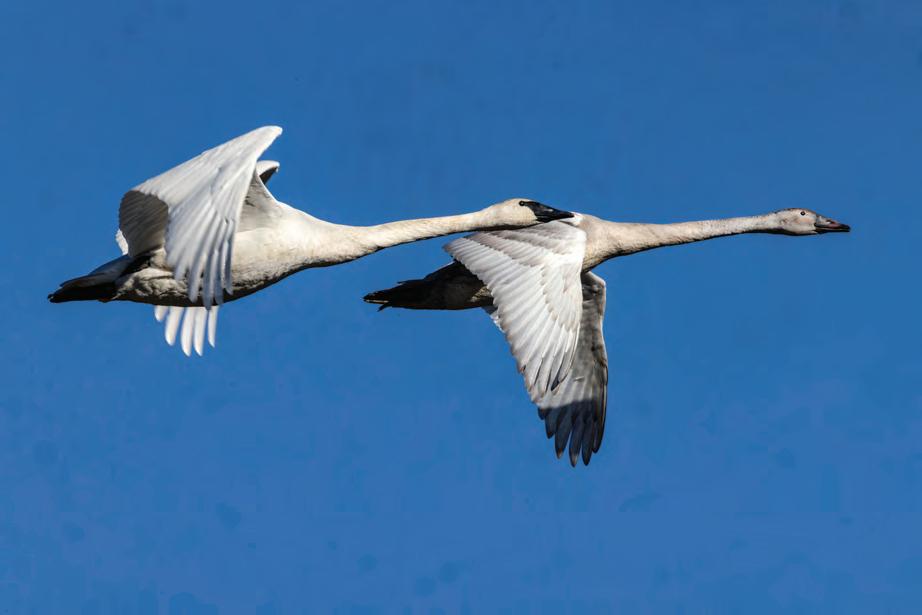
Tonja Woelber lives in Anchorage and enjoys the mountains in all weathers. She is a member of Ten Poets, a loose group of poets and dreamers who help each other through the dry times and celebrate the good stuff.
Robin Woolman has long been a performer and teacher of circus skills in Portland, Oregon. She loves backpacking in the high country of the Pacific Northwest or strolling the neighborhood while playing with words in her head. She dates her passion for writing back to Miss Mataroli's second grade class…More recent works have appeared in Global Poemic, Deep Wild, Cirque, Poeming Pigeon, West Chester Review, and Red Shoe Press's 2023 Oregon Poetry Calendar
Bill Wuertz grew up in a small desert community in Southern California. Life's path led him to Chicago, then to the mountains of rural Colorado, and ultimately to the beautiful Pacific Northwest. But all the rain in Oregon cannot wash the desert's dust from the soul as she whispers “Remember how I smell after rain…”
Cynthia Yatchman is a Seattle based artist.
161 Vol. 13 No. 2
Jack Broom Trumpeter Swans
Our Vision: A vibrant community of diverse Alaskan writers of all levels and ages, coming together to find and share our voices.

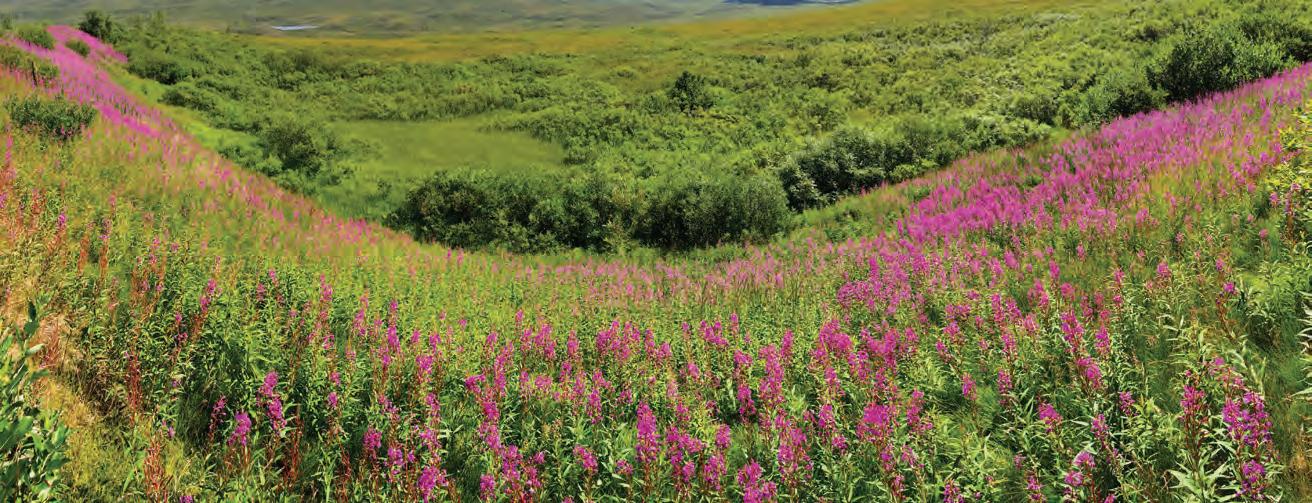
Our Core Purpose: Engaging, empowering, inspiring and expanding a statewide community of Alaskan writers.

We rely on member support to offer dynamic programming statewide:
Free Public Readings with Acclaimed Authors Classes & Workshops to Hone Your Skills
Generative Retreats in Beautiful Places to Foster Your Work
A Weekly Newsletter & Blog to Help You Stay Connected
A Community of Shared Support
Please Join or Renew Today!
www.49writers.org/join
Ann Fox Chandonnet’s keen eye and ear, her art and intelligence, are evident everywhere in these pages. Here are poems steeped in the cadence of place—be it of a childhood on a Massachusetts farm or adulthood in Alaska—as they consider history, memory, literature, and the hard truths of the present day. The Shape of Wind on Water gathers together a fine and substantial life’s work.
Jane Brox, author of Silence: A Social History of One of the Least Understood Elements of Our Lives
Here are stories infused with music and songs brimming with intelligence. Never sentimental and always grounded in life’s specifics, these are poems that open worlds of precarious delight. It was a privilege to be invited on this voyage. I was always in safe hands.
Ray Hudson, Vermont educator and author of Moments Rightly Placed: An Aleutian Memoir
The Shape of Wind on Water is Ann Fox Chandonnet’s substantial collection of new and selected poems, some from her rural childhood in Massachusetts, and many from her thirty-four years in Alaska. Place has always been important to her. In 1968, her first book of poems was published in Madison, Wisc. In the following years, she wrote two cookbooks, four food histories, and a tourist guide to the Panhandle. She also founded the Literary Artists Guild of Alaska.

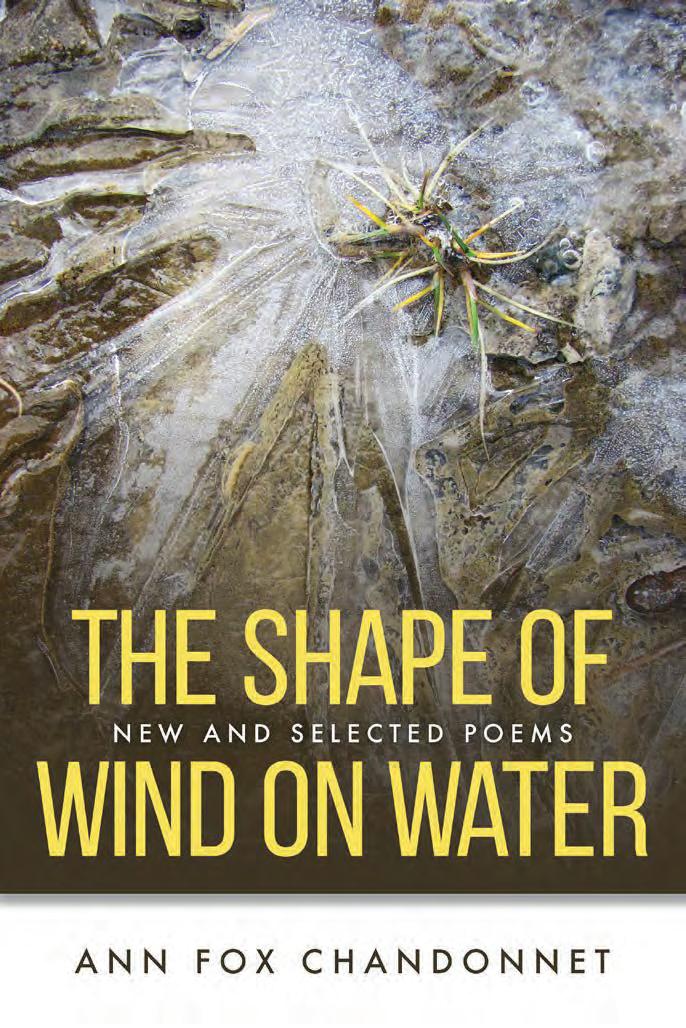
Genre: Poetry
ISBN: 978-0-931507-52-6
Pages: 209
Price: $20.00
Publication Date: June 1, 2023
Distributor: Pathway Book Service, pathwaybook.com
Binding: Paperback
ABOUT THE AUTHOR
Ann Fox Chandonnet grew up on a 180-acre apple and dairy farm in Dracut, Mass. Then there were four years in California, followed by a rich life indoors and out in Alaska. She has worked as an English teacher in Kodiak, Alaska, and a police reporter in Juneau. Chandonnet has two grown sons and three lovely granddaughters. She and her husband of fifty-six years are “retired” to Lake St. Louis, Missouri, where they share Ann’s rescue dog, Gypsy Rose.
CONTACT Publisher Paul
info@loompress.com www.loompress.com +1 (978) 551-8286
Marion
Author Ann Fox Chandonnet ann536chan@gmail.com
ANN
FOX CHANDONNET
Coming soon from Cirque Press!
May the Owl Call Again:
A Return to Poet John Meade Haines, 1924-2011
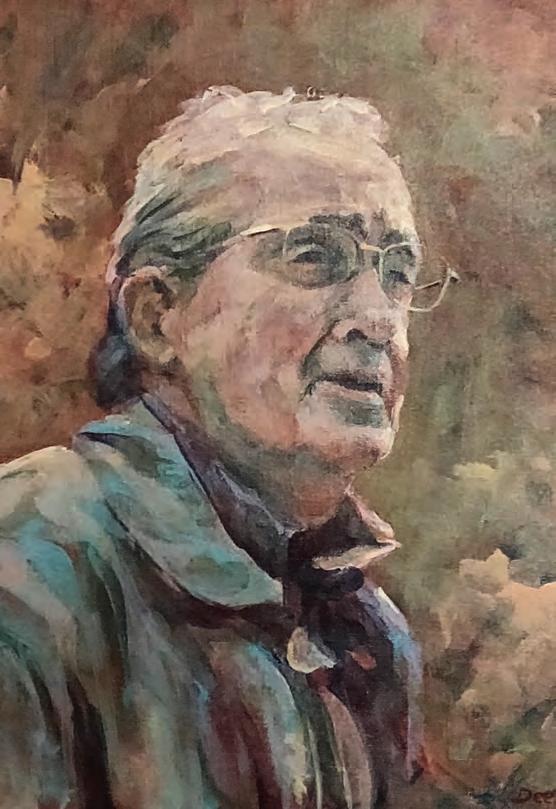
An intimate correspondence of words, writings, and letters with reflections on life, death, and friendship
By Rachel Epstein
Praise for
May the Owl Call Again: A Return to Poet John Meade Haines, 1924-2011
“
May the Owl Call Again: A Return to Poet John Meade Haines, 1924-2011
May the Owl Call Again is a moving and memorable collection.”
— Marc Hudson, author of East of Sorrow
“
May the Owl Call Again bears witness to the last years of Haines’ life...But above all it is a meditation on friendship and the solace of intimacy that can be found on the handwritten page. ”
— Freya Rohn, founder of Ariadne Archive
An intimate correspondence of words, writings, and letters with reflections on life, death, and friendship
Rachel Epstein
“John Haines will be remembered as one of Alaska’s greatest thinkers and writers.”
—Anne Coray, author of Bone Strings
Burwell Loop 99515 Alaska - $40
May
Owl Call Again: A Return to Poet John Meade Haines,
Rachel
the
1924-2011
Epstein
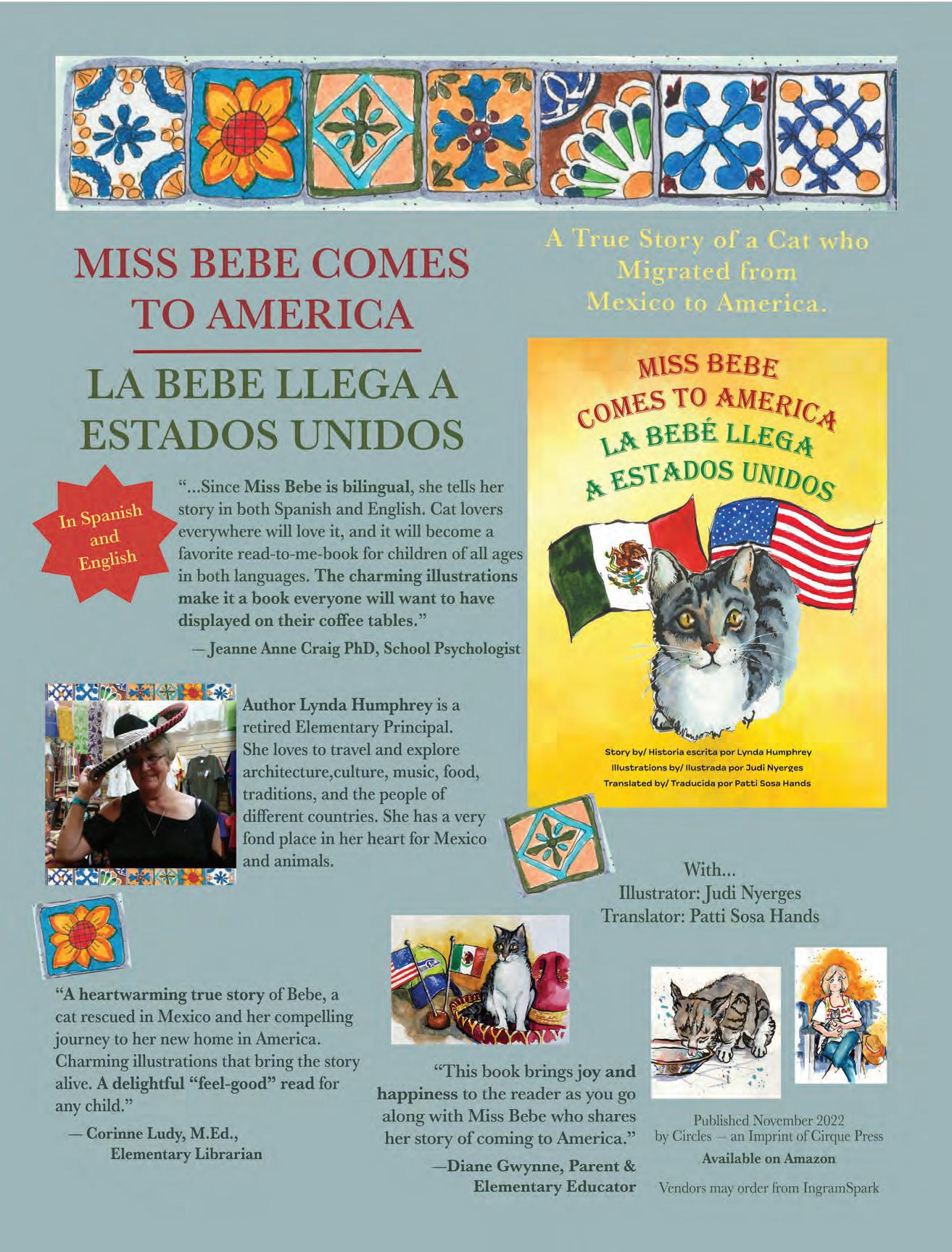 L. Kashi Attorney at Law
L. Kashi Attorney at Law

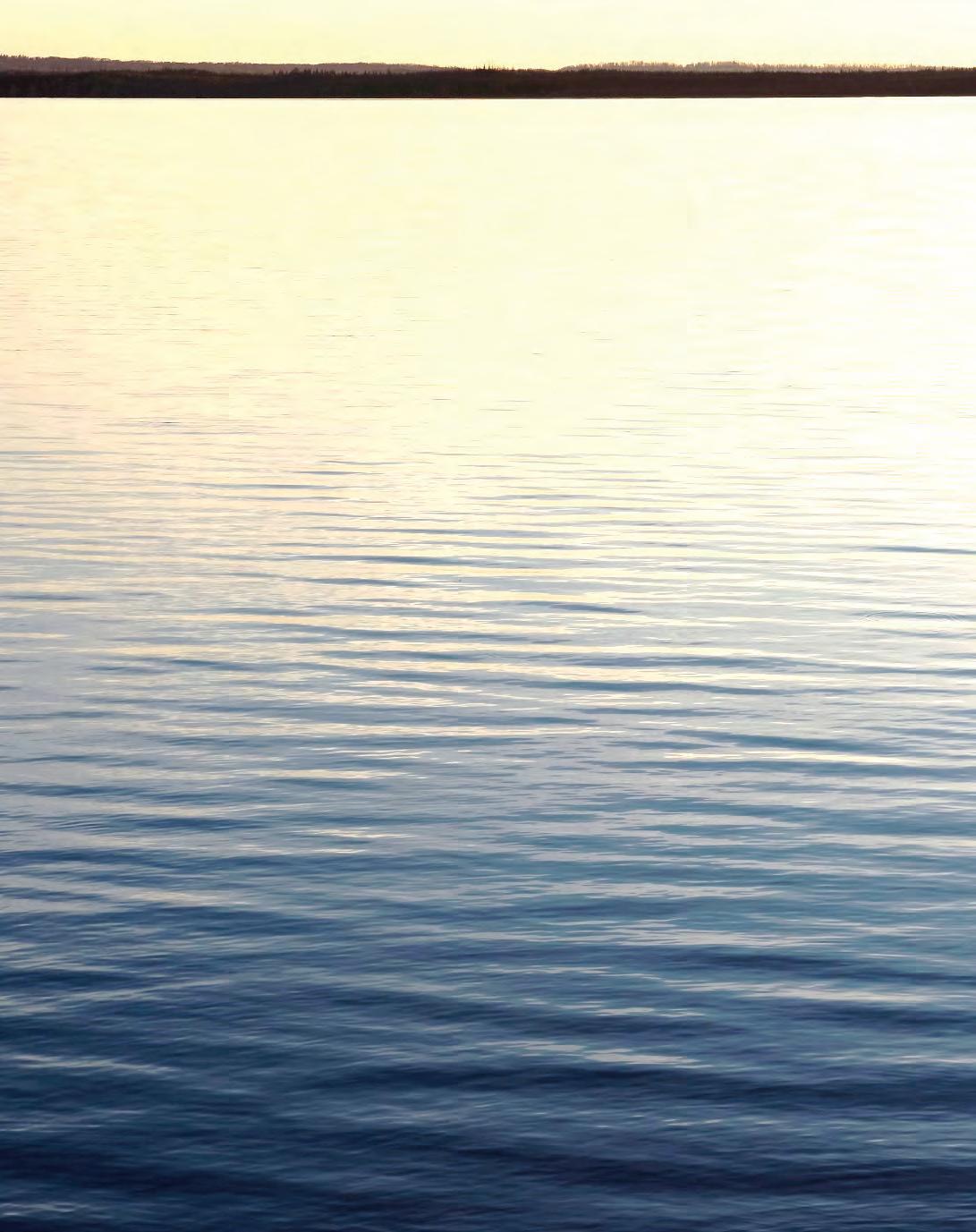
~ Accidents and personal injury claims ~ Business sales and purchases ~ Commercial and business law ~ Real property litigation 907 – 398 – 0480 kasha@alaska.net www.kashilaw.com 205 East Beluga Soldotna, Alaska
Joseph
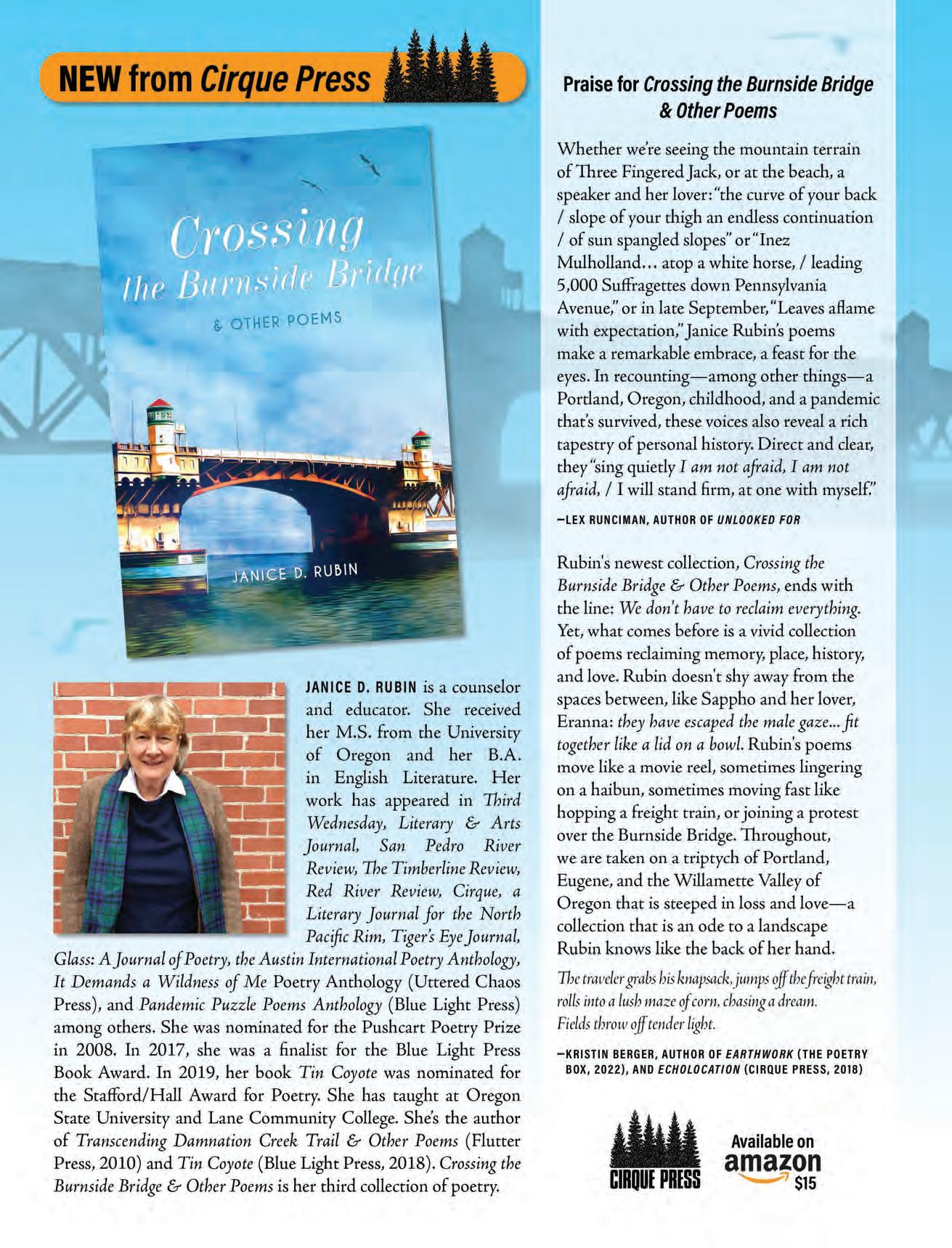
transplanted a memoir
Transplanted is an honest, frank and unsentimental memoir about a life-threatening leukemia diagnosis and an against-all-odds recovery. Birgit Lennertz Sarrimanolis is a skilled writer. She packs the pages with the kind of medical and logistical details anyone dealing with cancer in Alaska will appreciate, and yet this is no “how to” manual. Her story is deeply personal—and that is why it moved my heart and gave me hope.
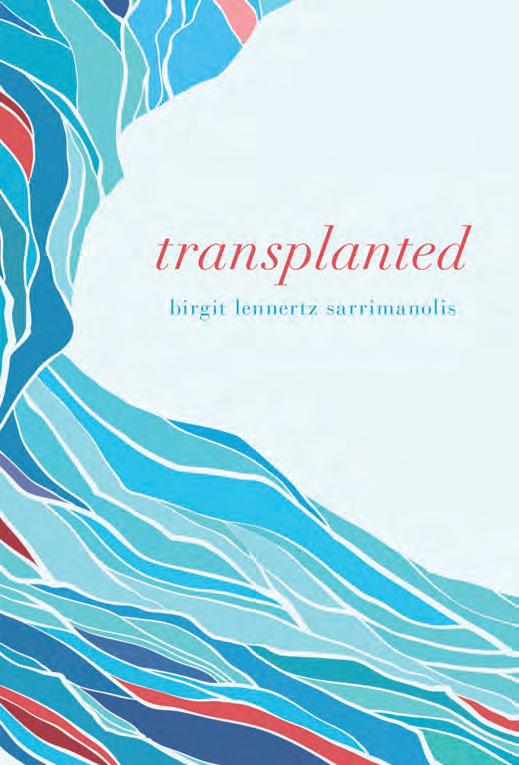
An exhilarating read, Transplanted is a braided story chronicling the author’s excruciating battle with cancer against the backdrop of Alaska’s far northern landscape, a place of wild contradictions and inclement weather. Engulfed in a wilderness of her own, made up of multiple hospitalizations and the weight of exhaustion and pain, the author takes refuge in the healing powers of the hills, trees, sky and trails she has so vividly come to love... The author’s eloquent language and crisp attentiveness to place, shine, both lyrically and poetically. As sure as permafrost resists the melt, she fights long and hard to regain her health, though her life will never be the same again. Quiet triumph can be found in the fog of loss, and this author artfully shows us how.
Monica Devine, Author of Water Mask
Birgit Lennertz Sarrimanolis holds a BA in art history and German studies, an MA in art history, and a PhD in art education. Her work has appeared in Cirque Journal, Five on the Fifth, 49 Writers, Shark Reef, and Medicine and Meaning . She was a finalist in the 2020 Pacific Northwest Writers Association literary contest and won second place in the 2021 Annual Writer’s Digest Writing Competition. She has lived in Indonesia, India, Chile, Argentina, Egypt, Germany, and Greece, but now calls Alaska home, where she writes overlooking the Tanana Valley. www.birgitsarrimanolis.com
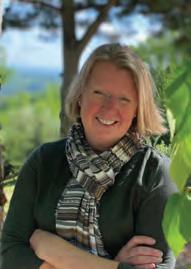
Available on $15
Heather Lende, Alaska State Writer Laureate and author of Of Bears And Ballots and Find The Good
When Joanne Townsend and I were introduced (by a poet, of course) over 45 years ago, we hit it off right away. After all, we had many things in common: a history with the Atlantic seaboard, raising sons, a reverence for history, flower gardening. But the most important thing we shared was a belief that poetry is a necessary component of civilization. Further, we weren’t kidding around: each of us was deeply committed to writing the best poetry she could. In particular, Joanne focused on helping the elderly struggling to express themselves. Her departure has left a big gap in my universe.
—Ann Chandonnet, author of Baby Abe: A Lullaby for Lincoln
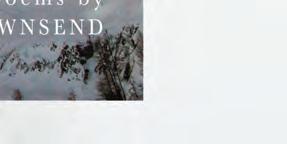 Sandra Kleven
Michael Burwell Editors &
Sandra Kleven
Michael Burwell Editors &

B
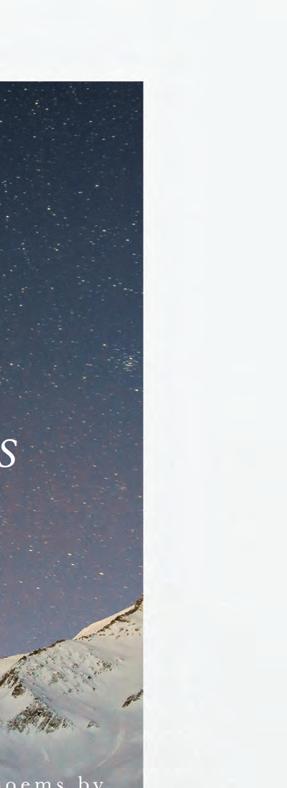
P ROMISE AND S ADNESS

 poems by JOANNE TOWNSEND
poems by JOANNE TOWNSEND
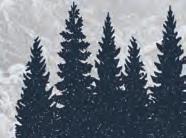
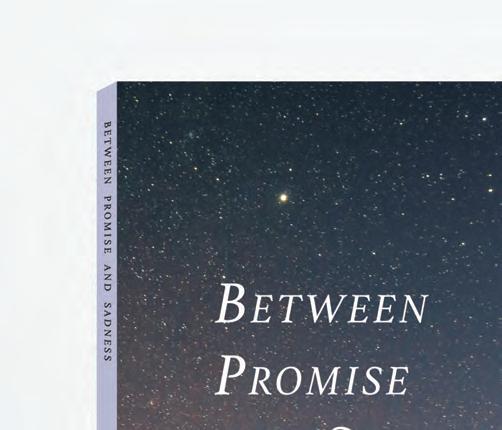
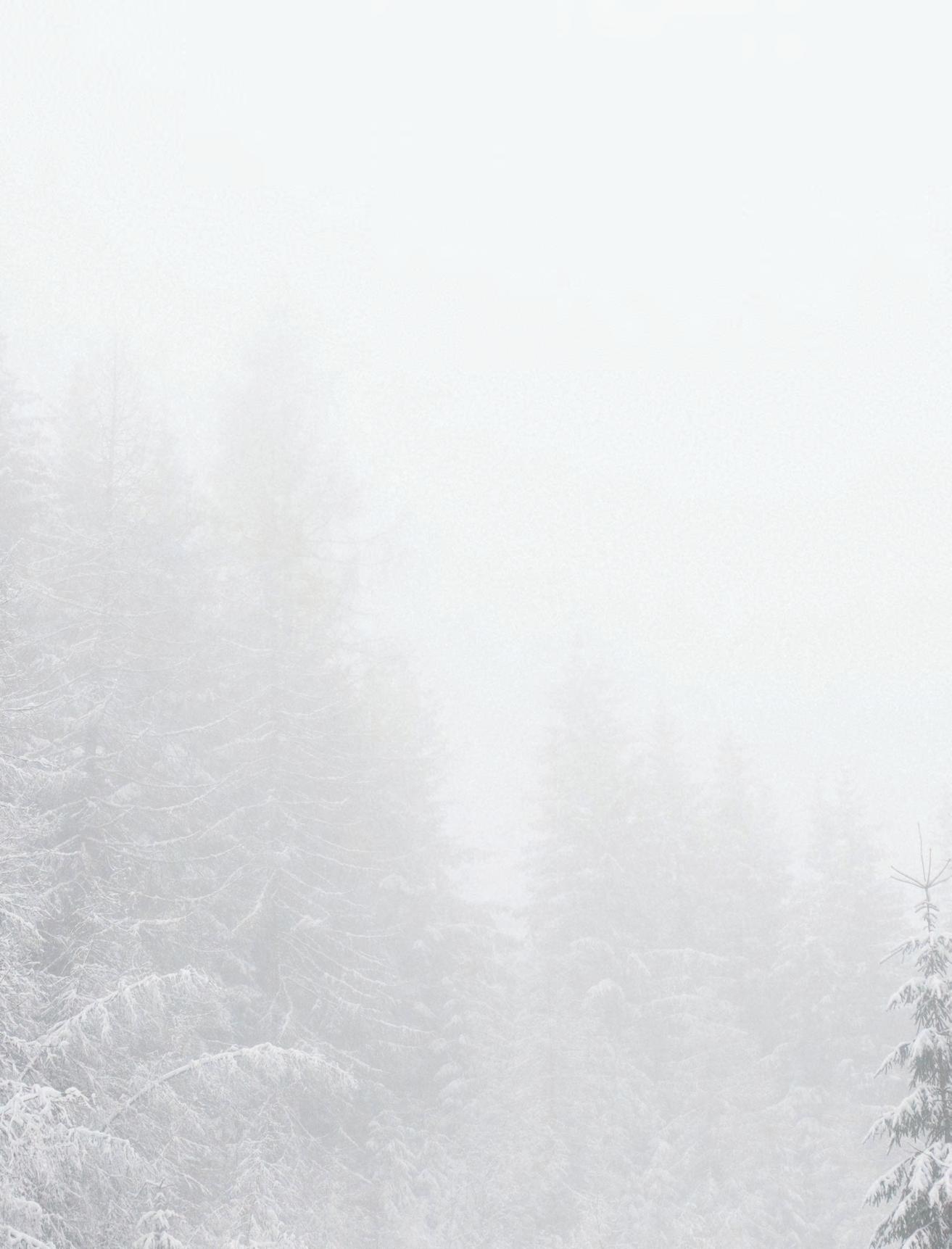
Former Alaska Poet Laureate, Joanne Townsend, had a naturalist’s eye and a poet’s ability to convey her emotions and love of nature. Her poems speak of pleasure as well as the sorrow of losing of her only son. When Joanne died, only a large unsorted pile of poems in hard copy was found. Her friends and colleagues in Las Cruces, New Mexico: Ellen Roberts Young, Christine Eber and Joseph Somoza, with assistance from Peter Goodman, F. Richard Thomas and Frank Varela composed this book. Joanne Townsend’s posthumous collection, Promise and Sadness , is a tribute to her life and legacy.
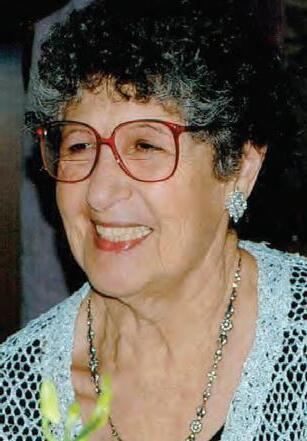
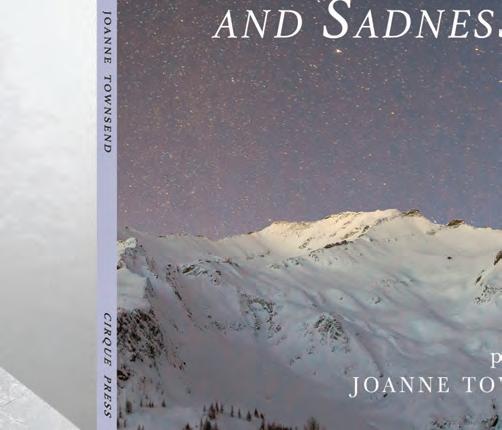
ETWEEN
Publishers
HOW TO SUBMIT TO CIRQUE
Cirque, published in Anchorage, Alaska, is a regional journal created to share the best writing in the region with the rest of the world. Cirque submissions are not restricted to a “regional” theme or setting.
Cirque invites emerging and established writers living in the North Pacific Rim—Alaska, Washington, Oregon, Idaho, Montana, Hawaii, Yukon Territory, Alberta, British Columbia and Chukotka—to submit short stories, poems, creative nonfiction, translations, plays, reviews of first books, interviews, photographs, and artwork for Cirque’s next issue.
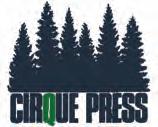
Issue #27—Submission Period March 22, 2023 to September 21, 2023
SUBMISSION GUIDELINES
Eligibility: you were born in, or are currently residing in, or have previously lived for a period of not less than 5 years in the aforementioned North Pacific Rim region.
-- Poems: 5 poems MAX
-- Fiction, Nonfiction, Plays: 12 pages MAX (double spaced).
-- Artwork and Photography : 10 images MAX accepted in JPEG or TIFF format, sent as email attachments. Please send images in the highest resolution possible; images will likely be between 2 and 10mb each. If you do not submit full-size photo files at time of submission, we will respond with an email reminder. No undersize images or thumbnails will be eligible for publication.
-- Bio: 100 words MAX.
-- Contact Info: Make sure to keep your contact email current and be sure that it is one that you check regularly. If your contact information changes, make sure to inform us at Cirque. To ensure that replies from Cirque bypass your spam filter and go to your inbox, add Cirque to your address book.
-- Submit to https://cirque.submittable.com
-- Replies average two to three months after deadlines, and we don’t mind you checking with us about your submissions.
-- Cirque requires no payment or submission fees. However, Cirque is published by an independent press staffed by volunteers. Your donations keep Cirque Press going. You will find donation buttons on Submittable and you can also support us via PayPal to cirquejournal@gmail.com.
Thanks for your poetry, prose, images and financial support.
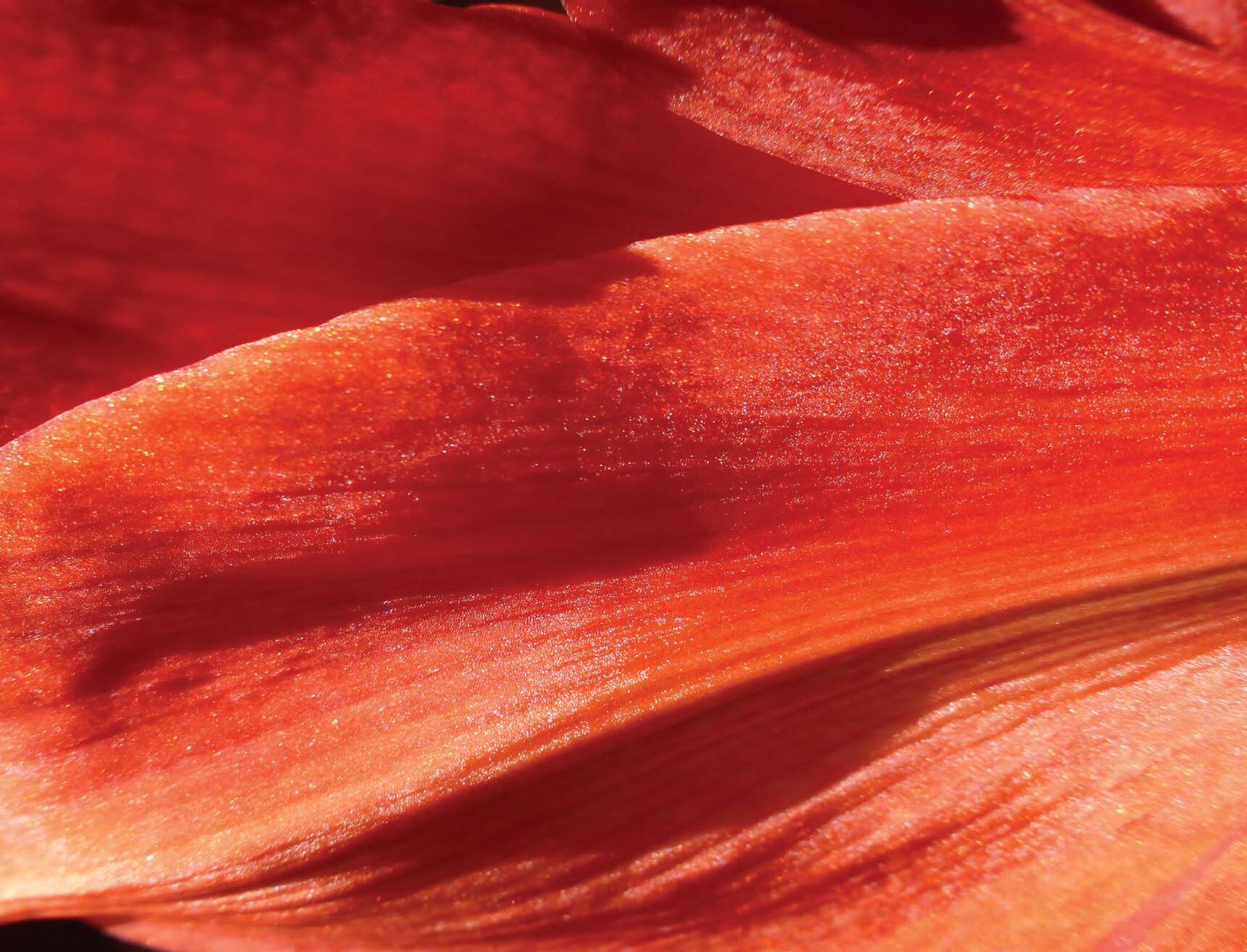 Christmas Present Cheryl Stadig
Christmas Present Cheryl Stadig





 By shauNa PoTocky
By shauNa PoTocky






































 Kleven Michael Burwell Editors & Publishers
Kleven Michael Burwell Editors & Publishers


















 Sandra
Sandra








































 Sandra Kleven Michael Burwell Editors & Publishers
Sandra Kleven Michael Burwell Editors & Publishers











 Vivian Faith Prescott
Vivian Faith Prescott

















 Kathleen Stancik
Kathleen Stancik



 Arctic Fox Monica Devine
Arctic Fox Monica Devine






 Stoned Circles Jill Johnson
Stoned Circles Jill Johnson




 Yellow Chair Jim Thiele
Kemuel DeMoville
Yellow Chair Jim Thiele
Kemuel DeMoville


 Ancient Tools Mandy Ramsey
Ancient Tools Mandy Ramsey






 Jim Thiele
Jim Thiele












































 Kathleen Stancik
Kathleen Stancik











 I Closed the Door Jill Johnson
I Closed the Door Jill Johnson

 Garlic Jim Thiele
Garlic Jim Thiele


































 L. Kashi Attorney at Law
L. Kashi Attorney at Law





 Sandra Kleven
Michael Burwell Editors &
Sandra Kleven
Michael Burwell Editors &



 poems by JOANNE TOWNSEND
poems by JOANNE TOWNSEND






 Christmas Present Cheryl Stadig
Christmas Present Cheryl Stadig